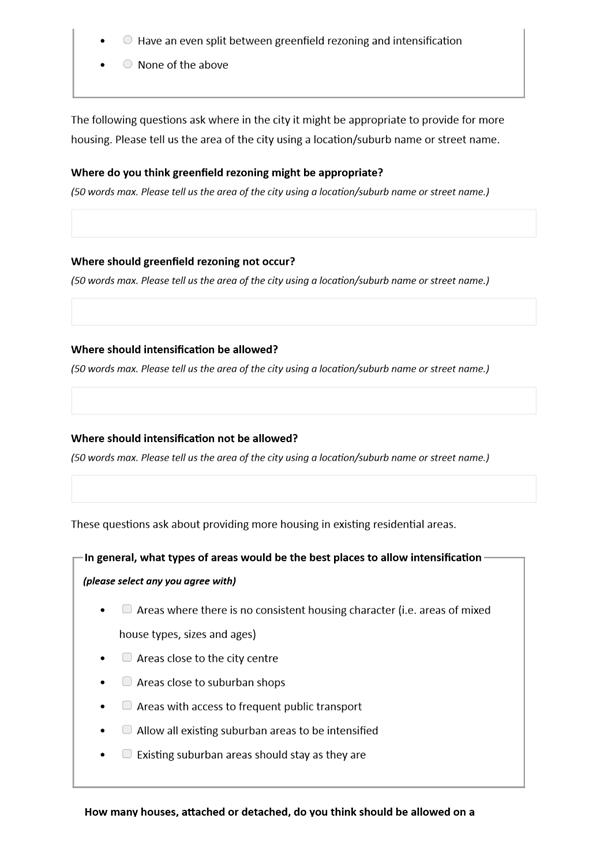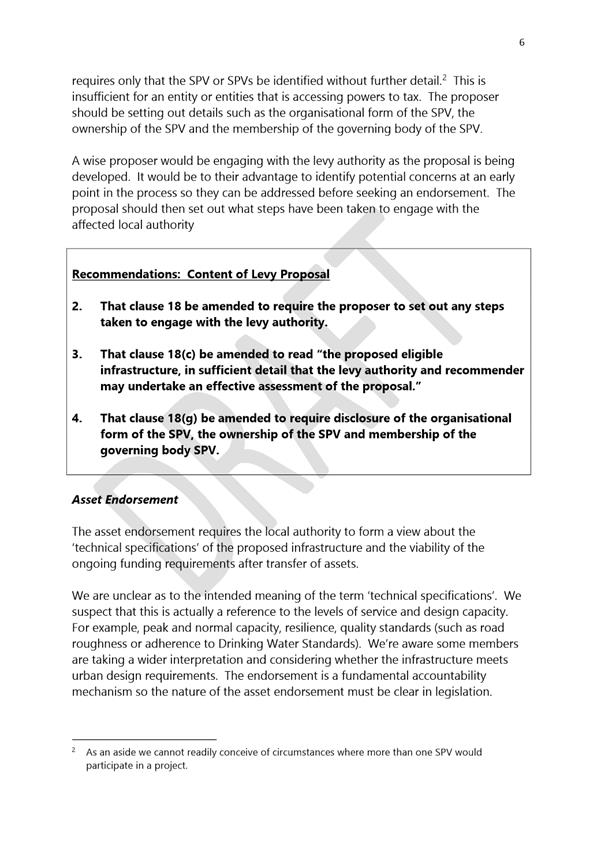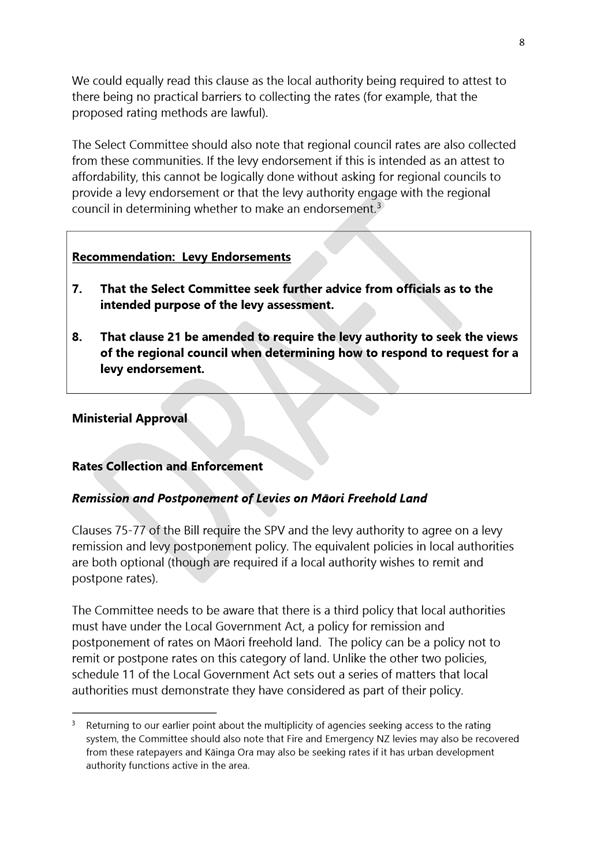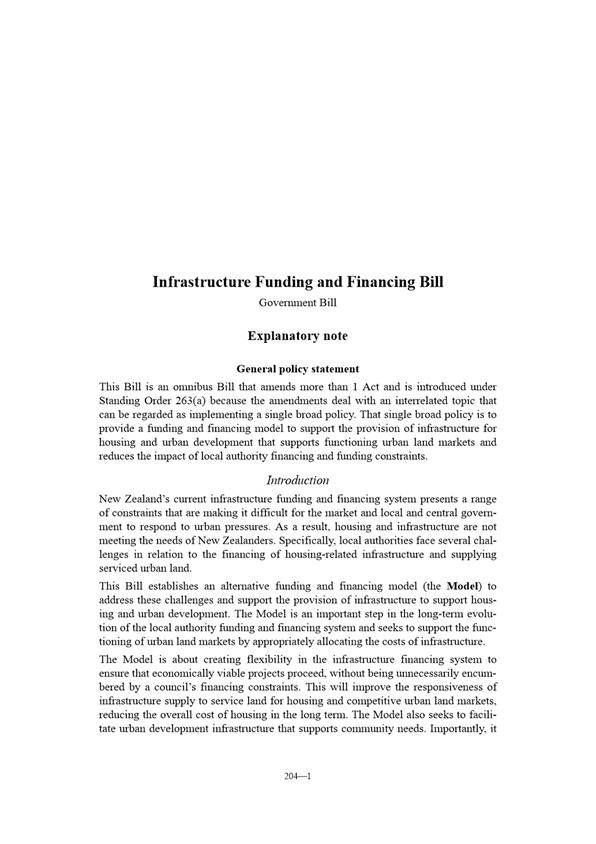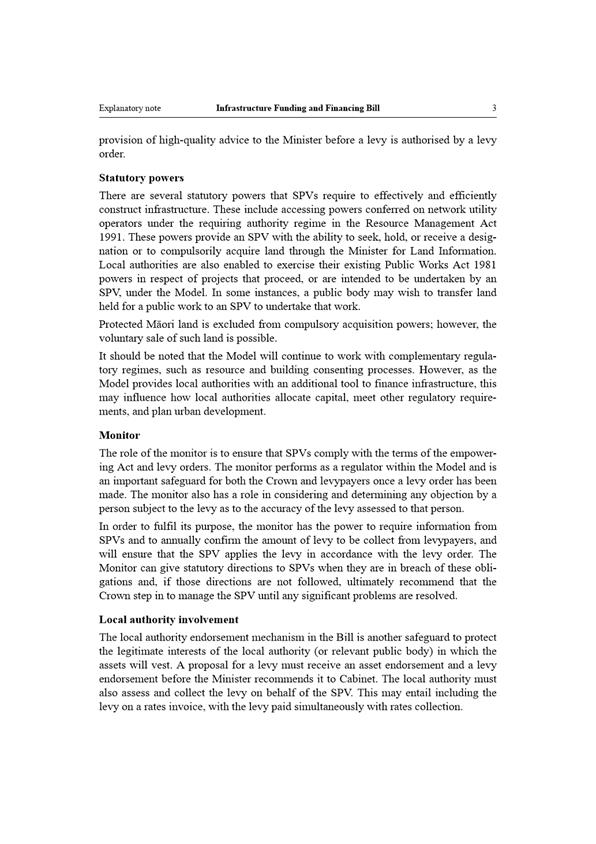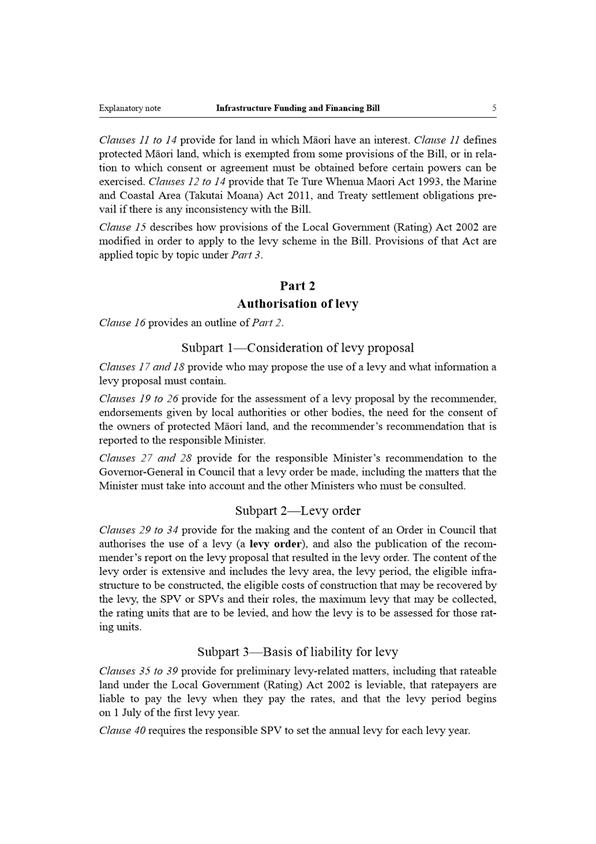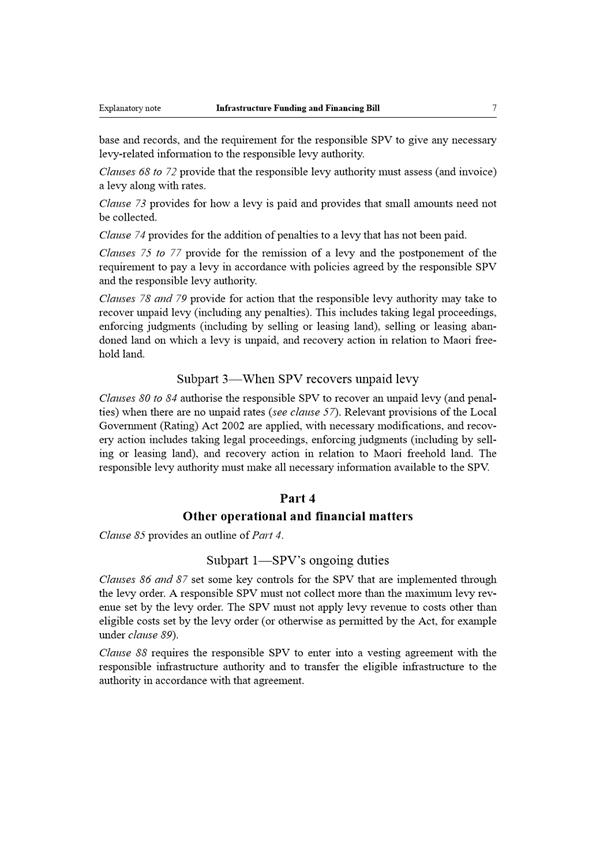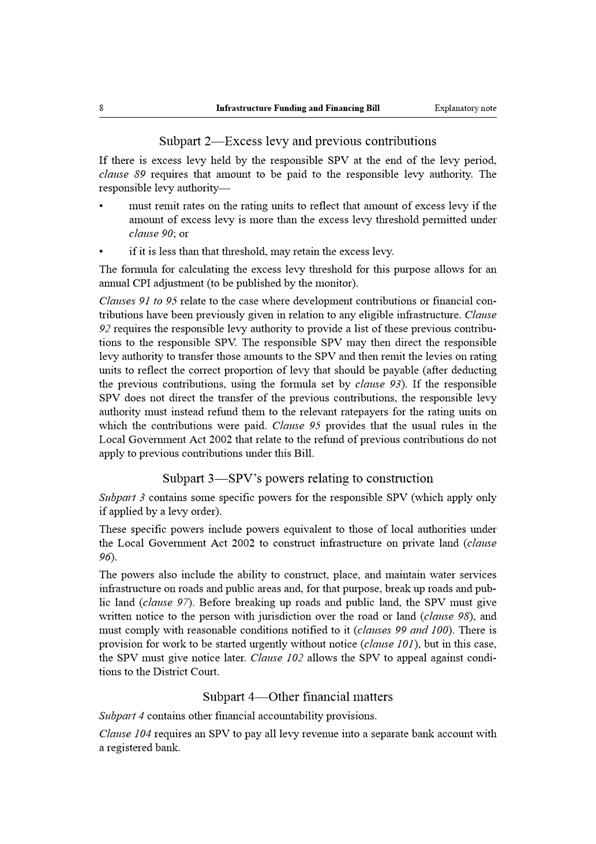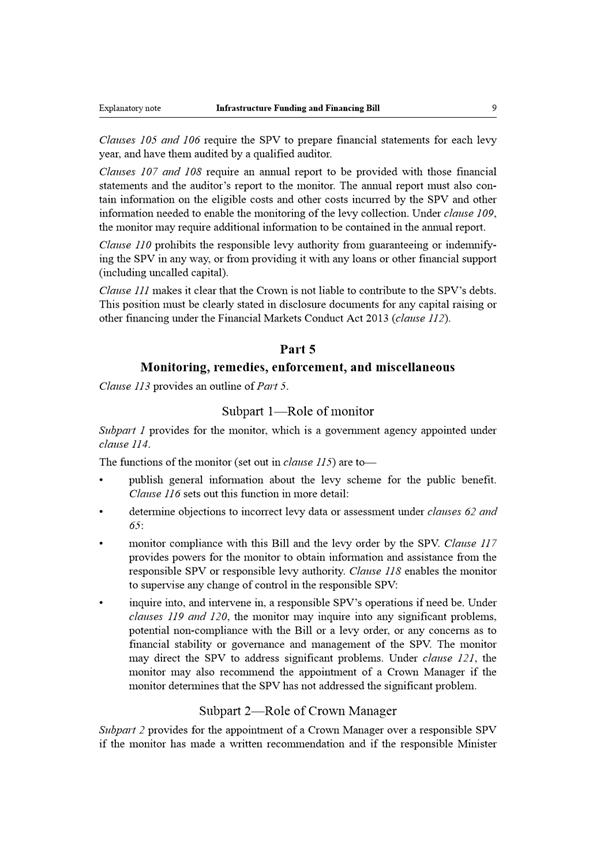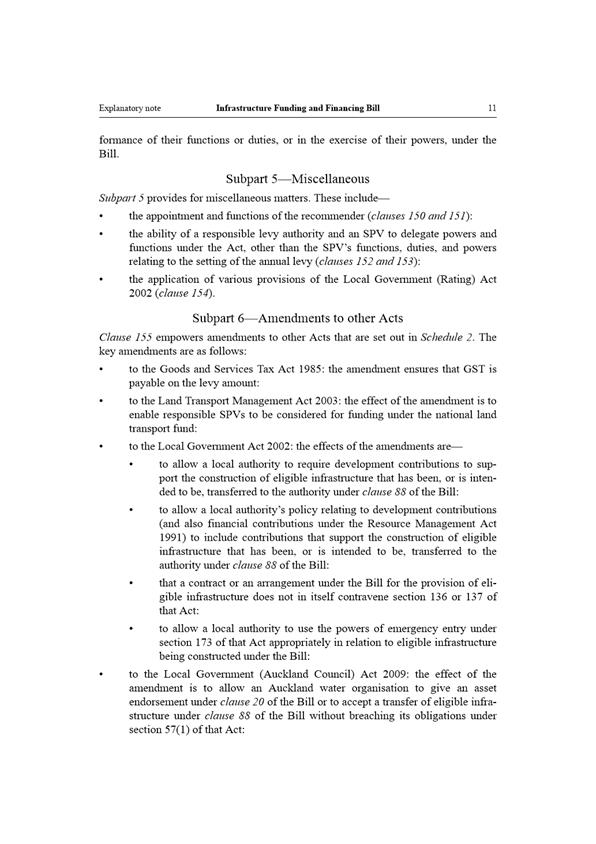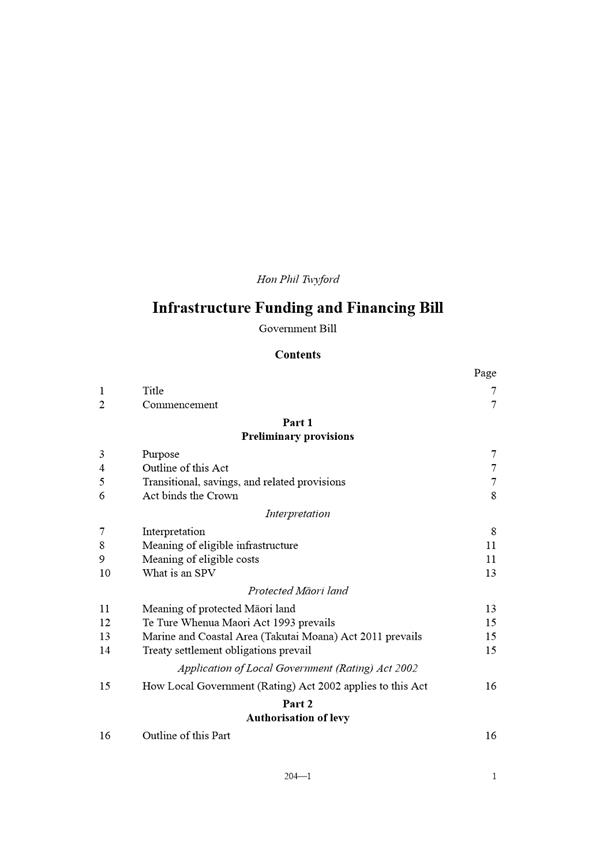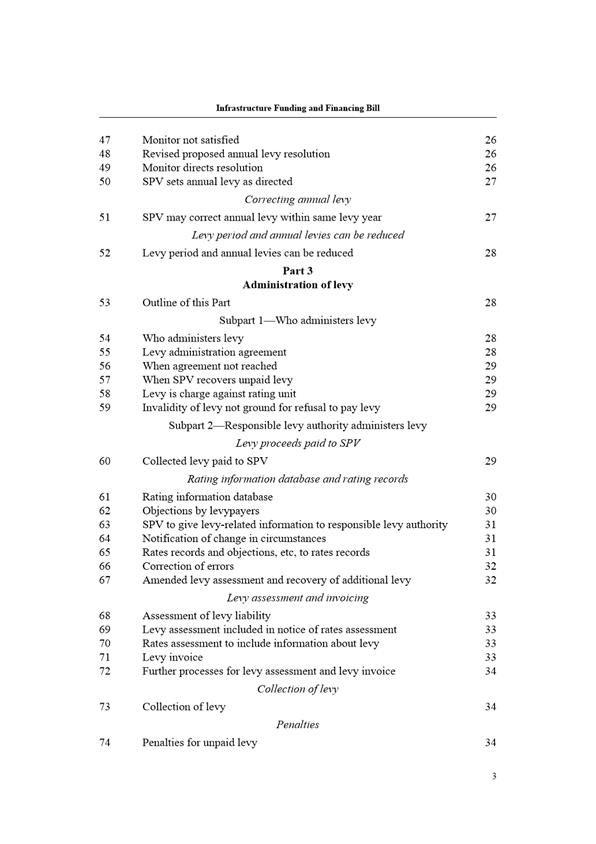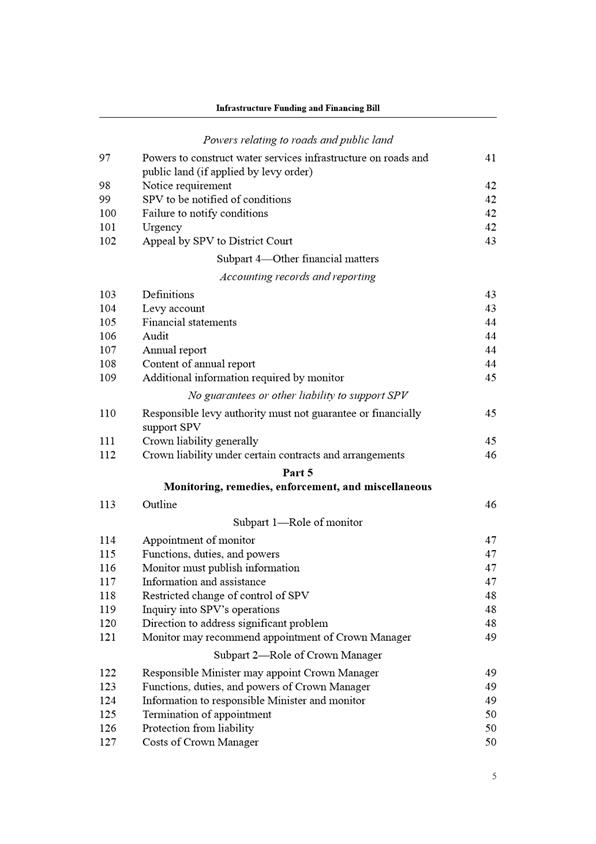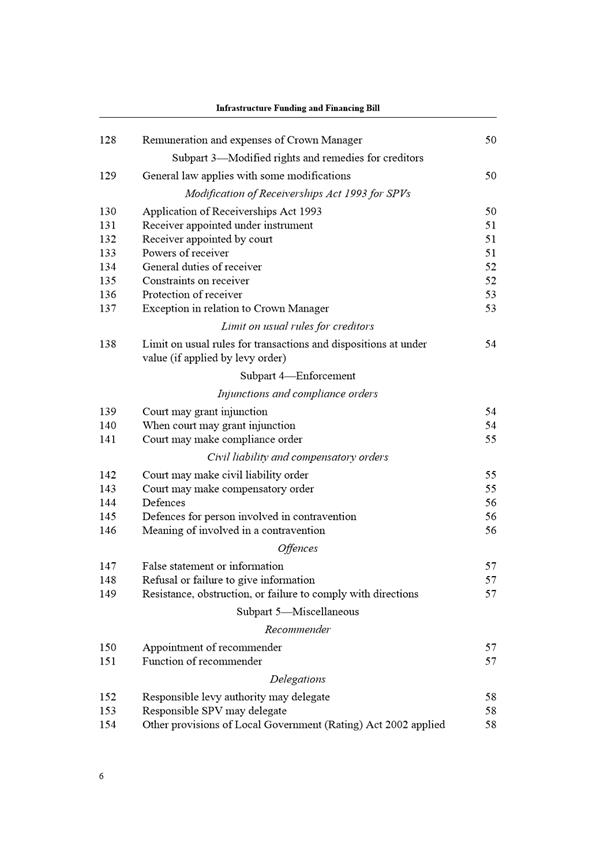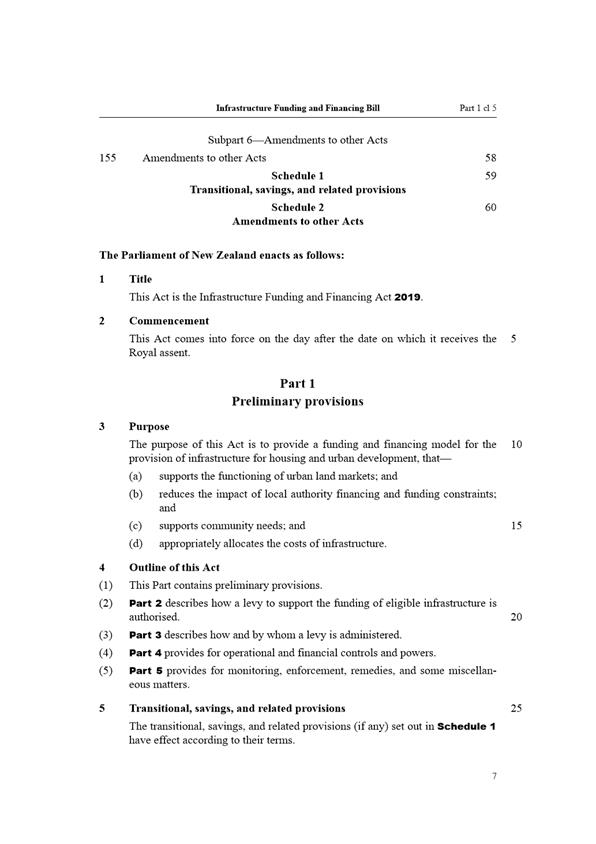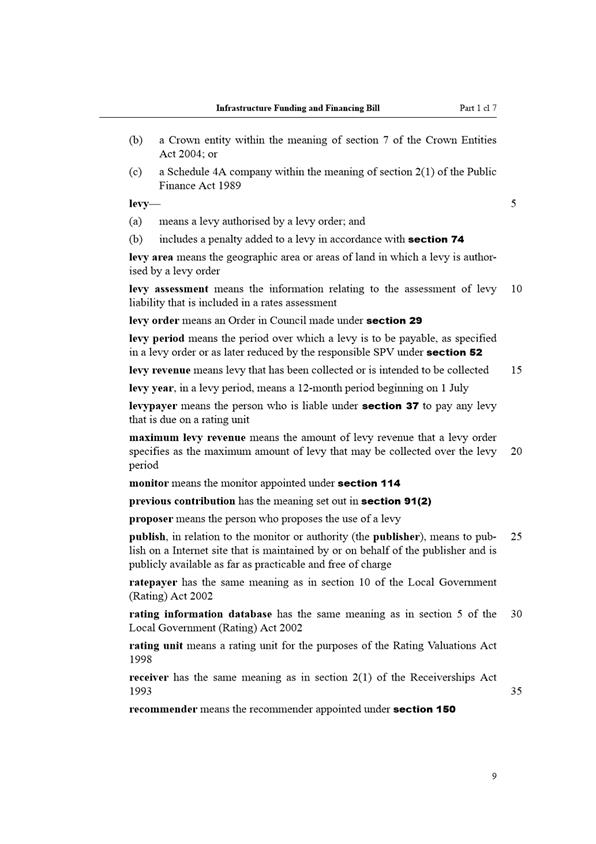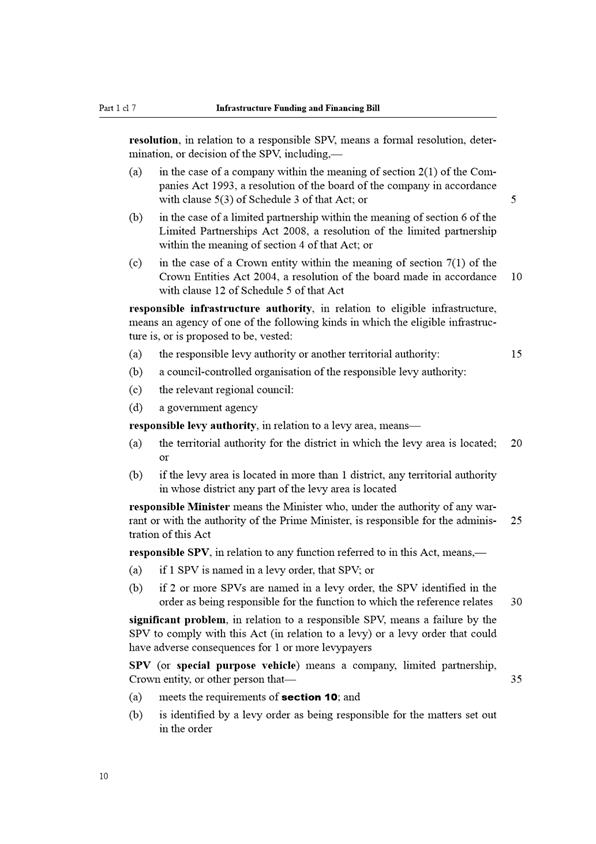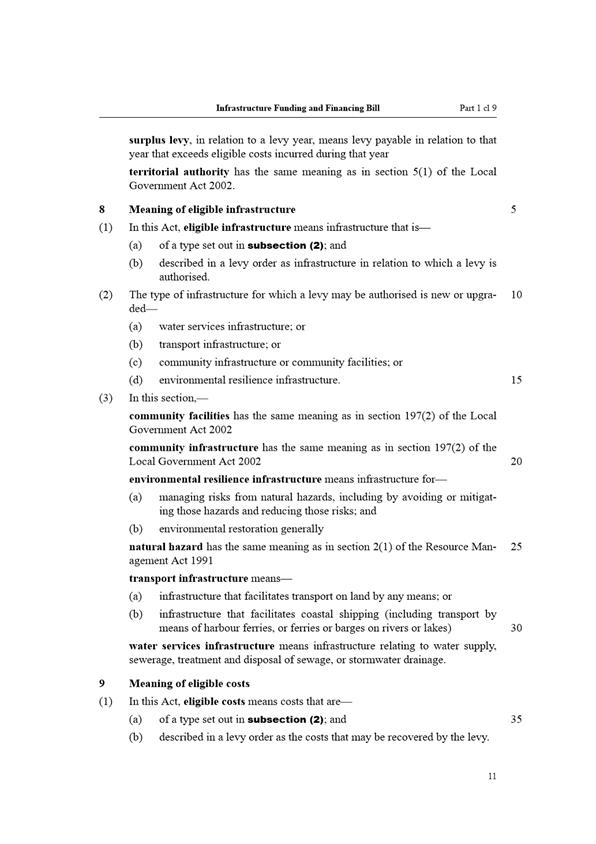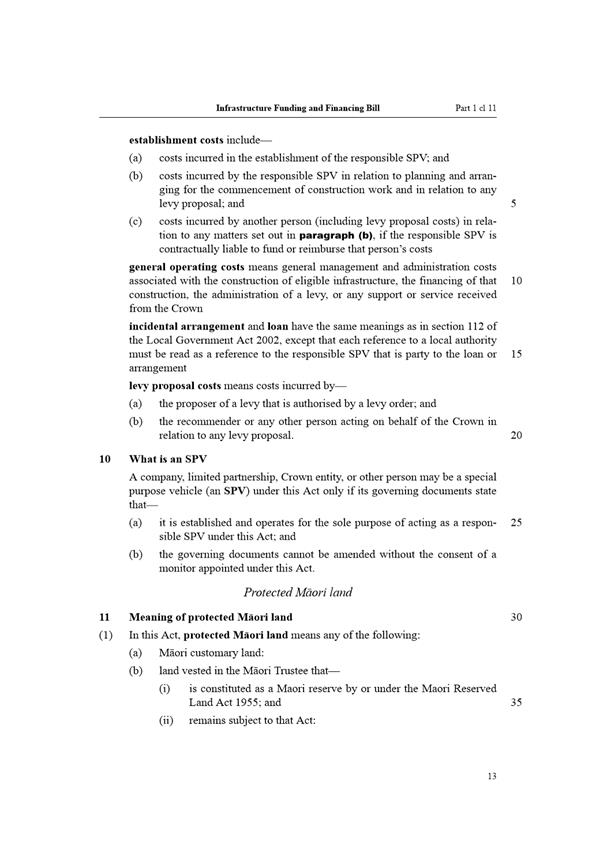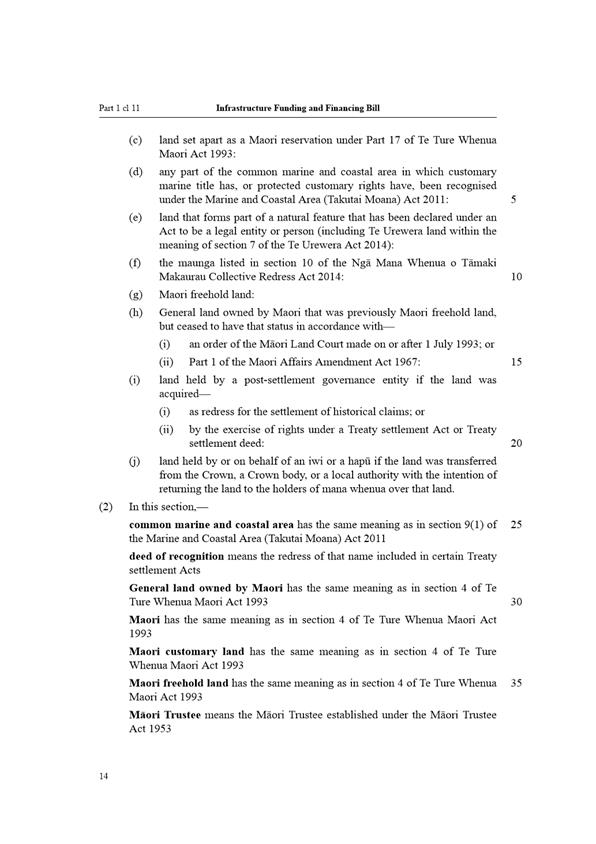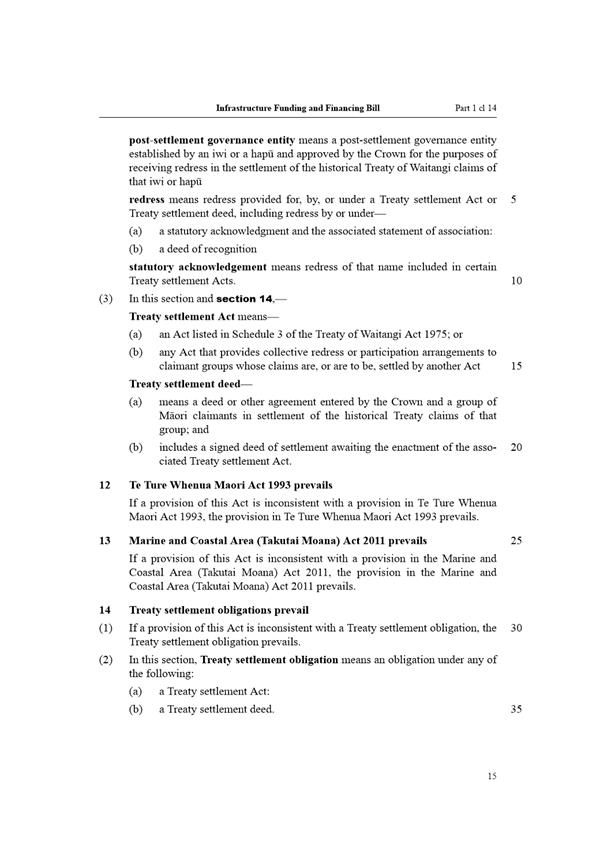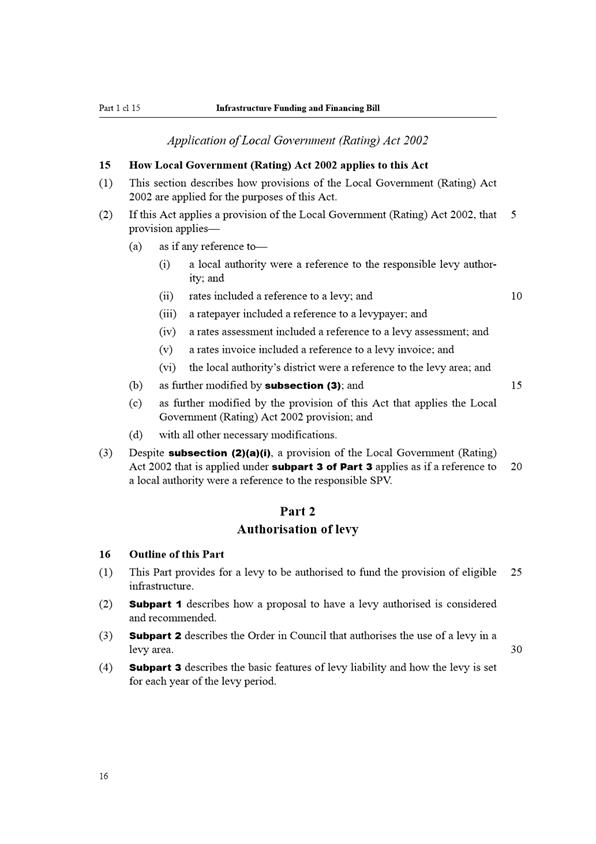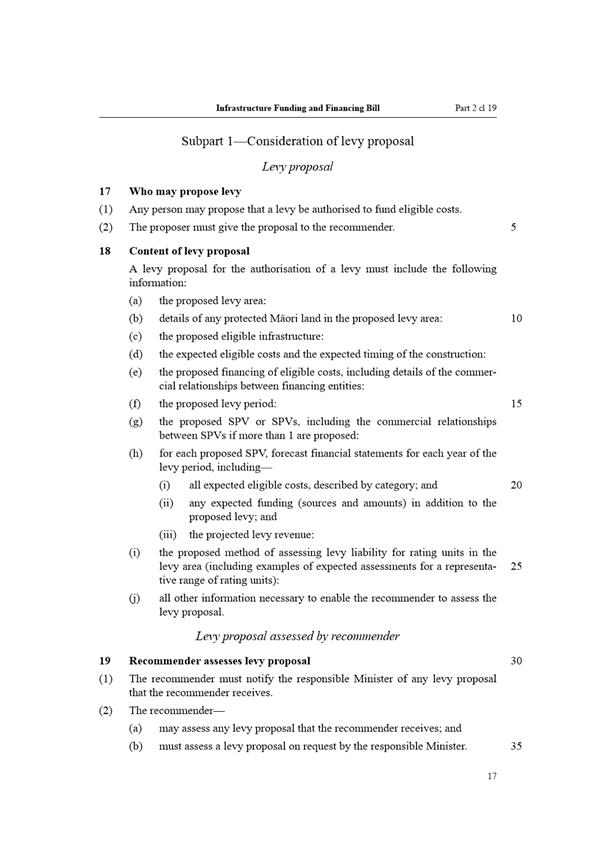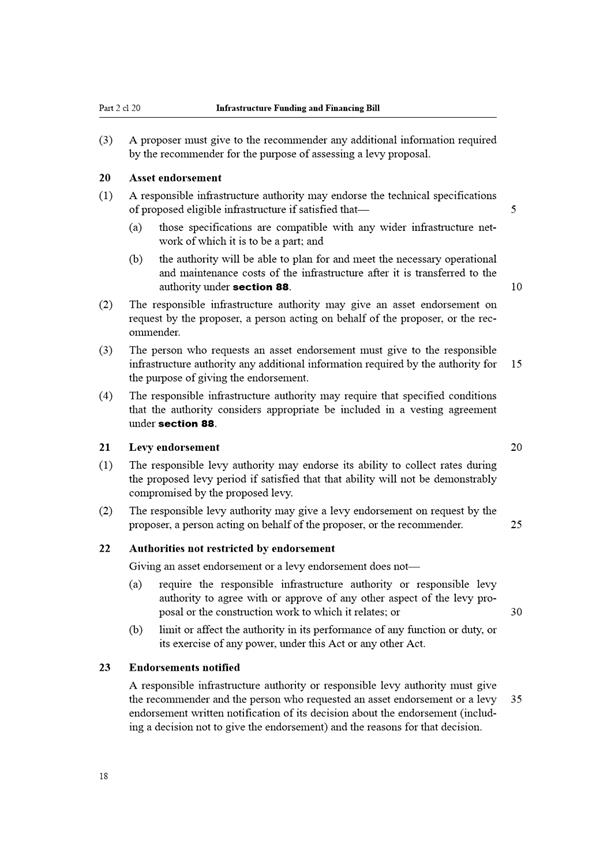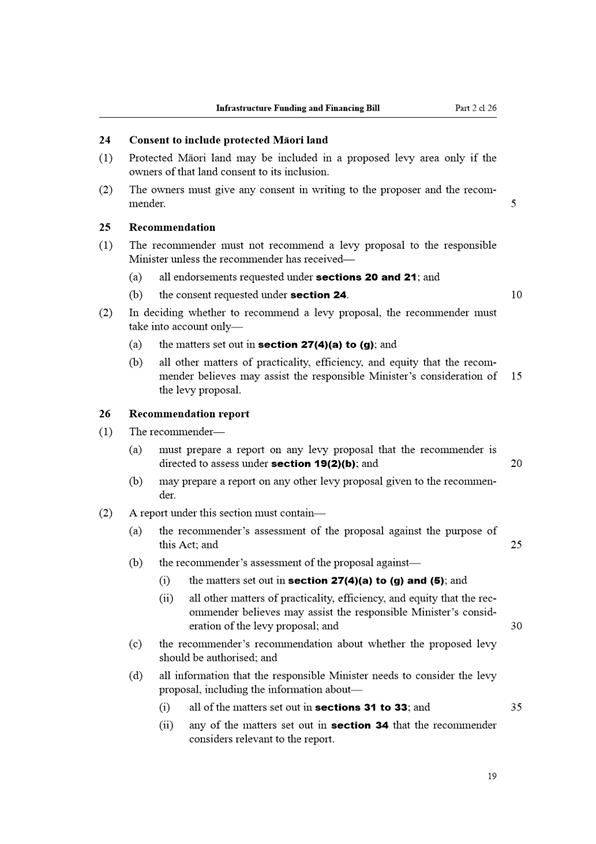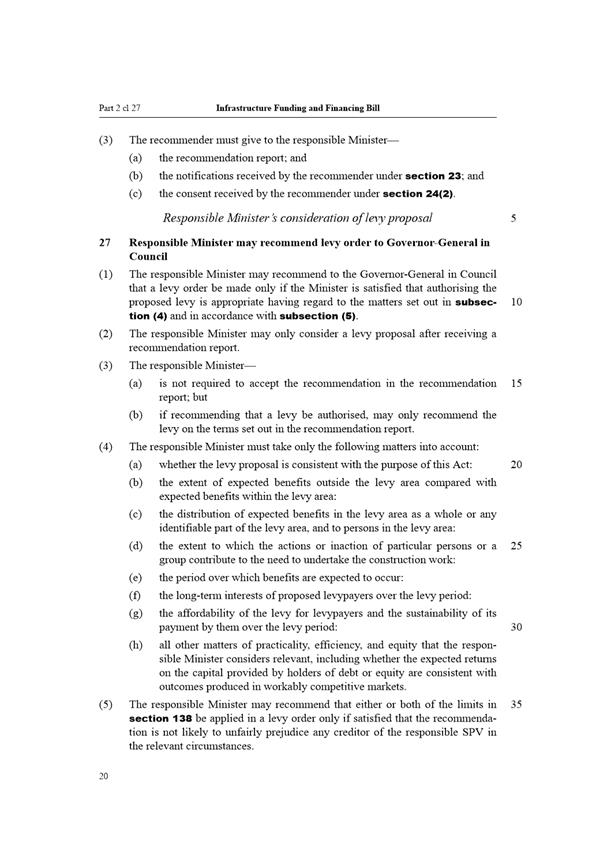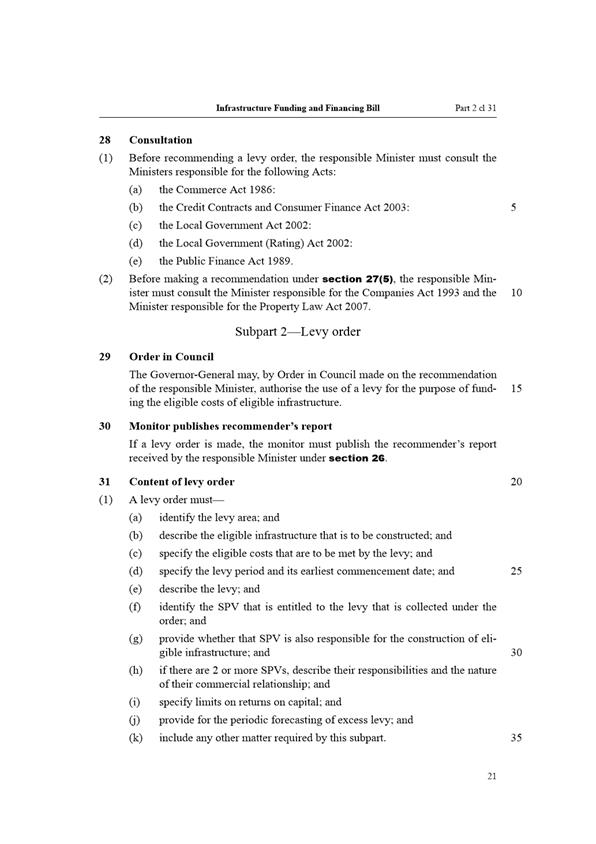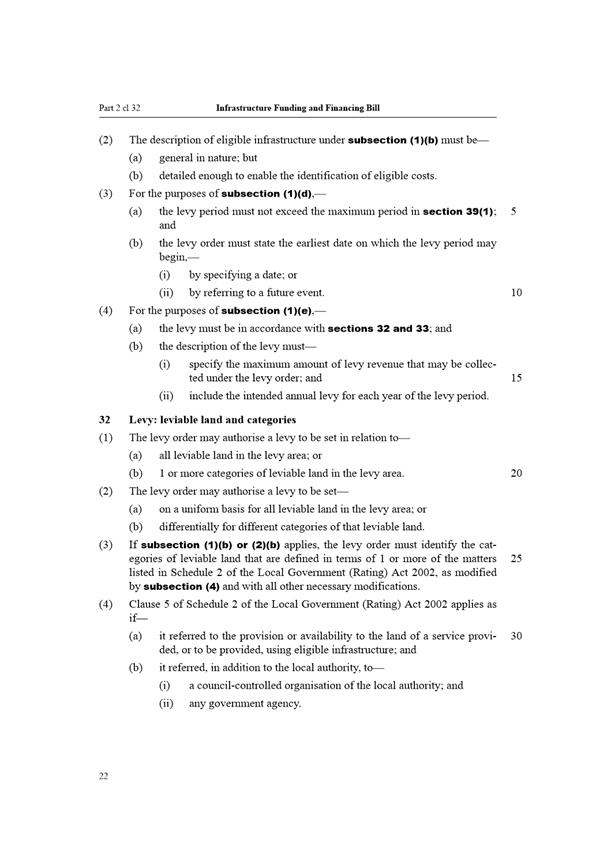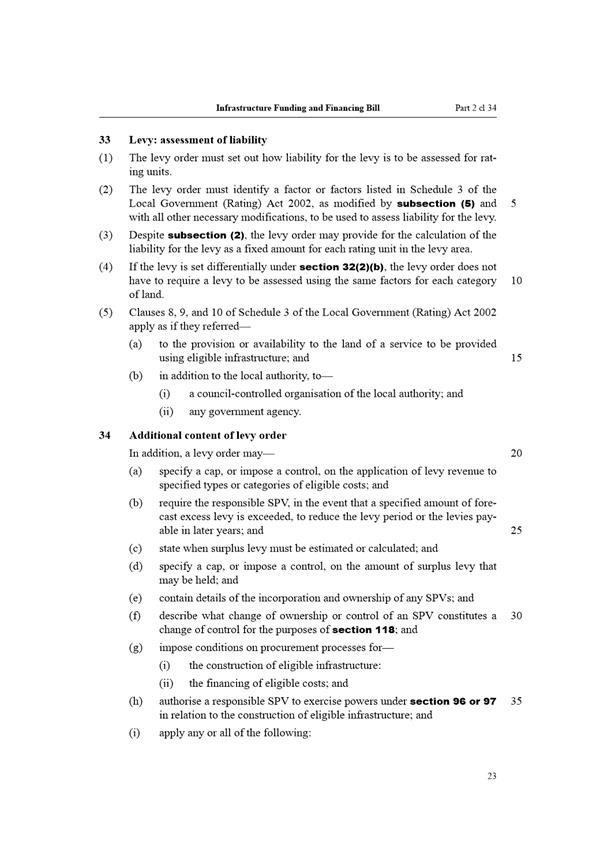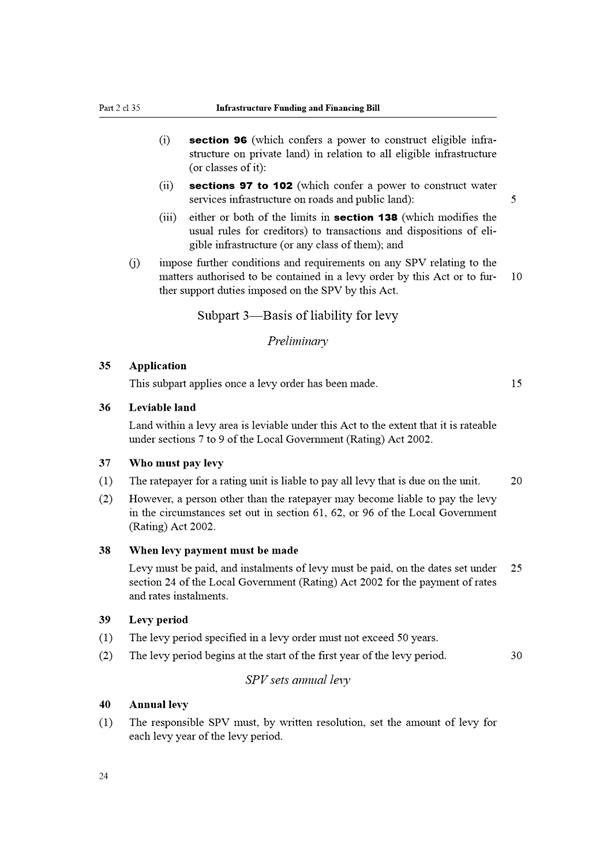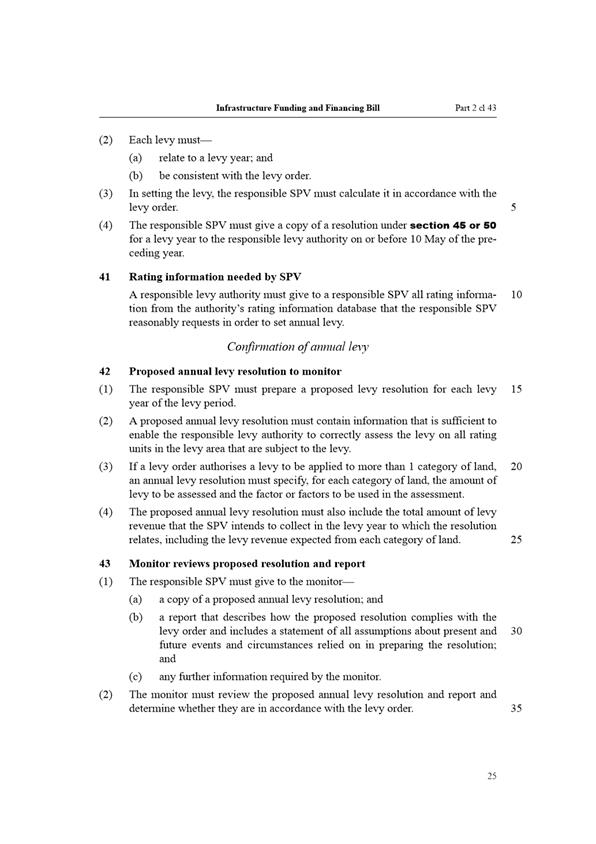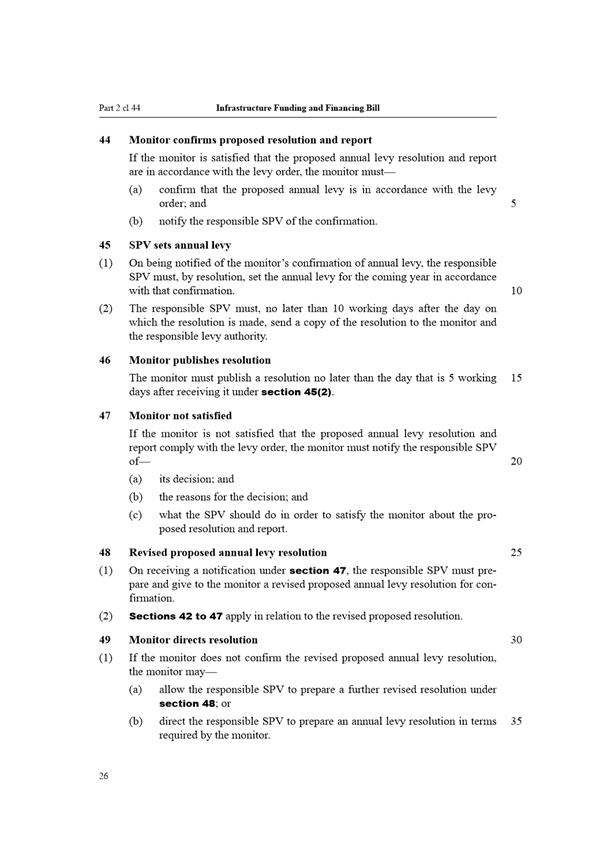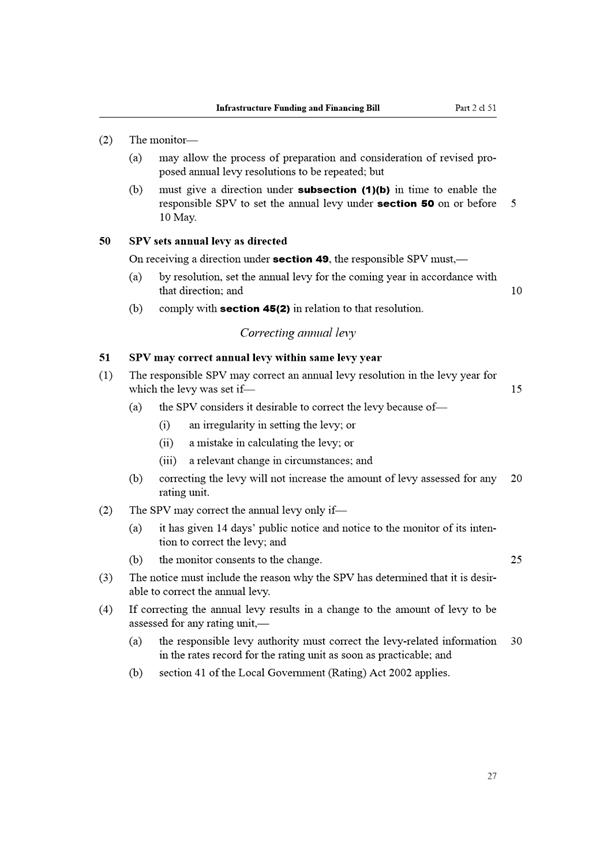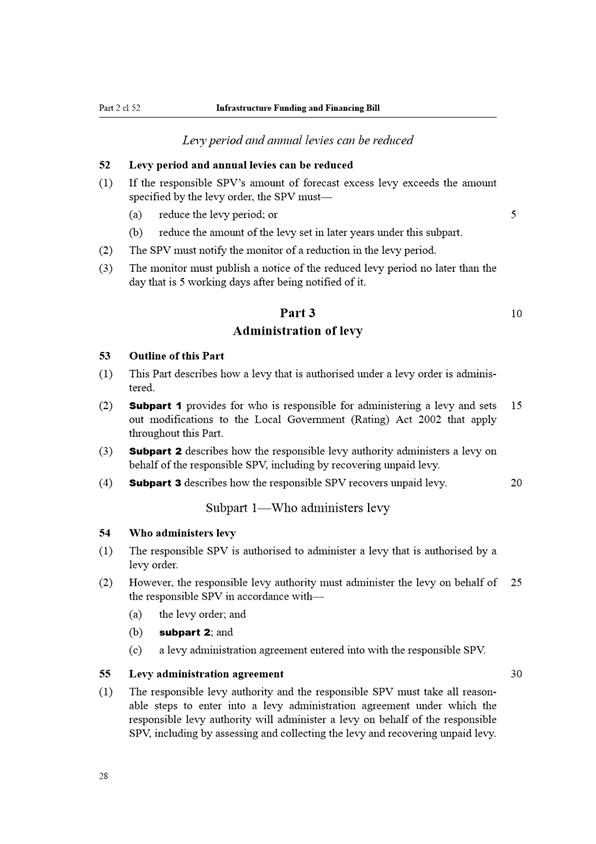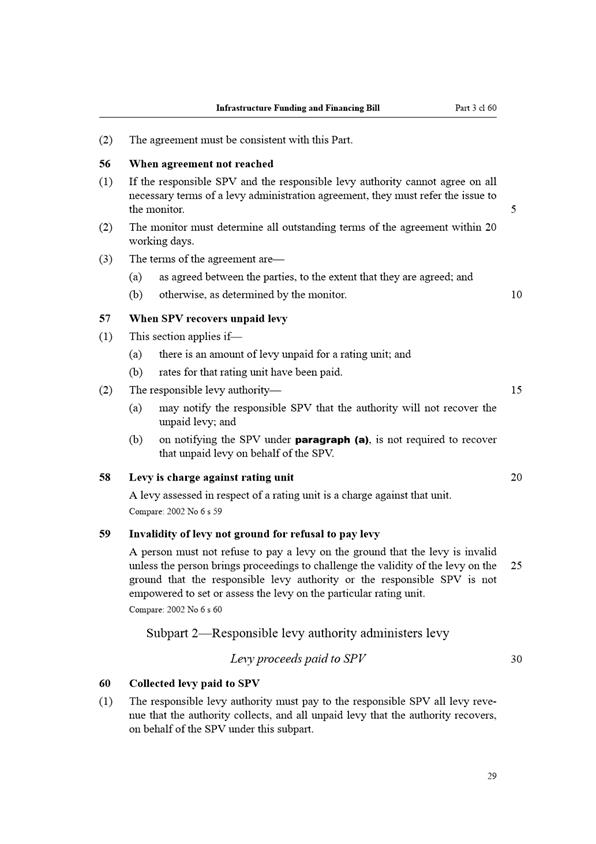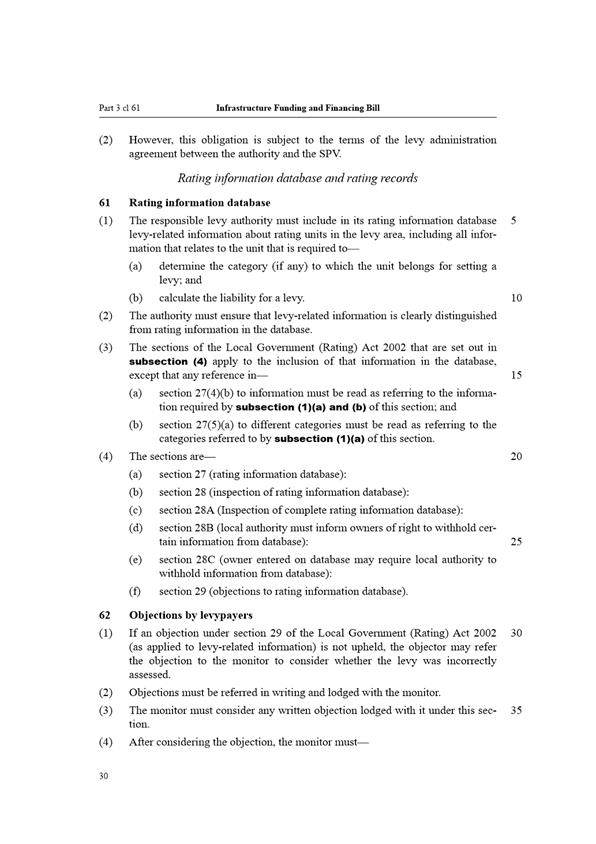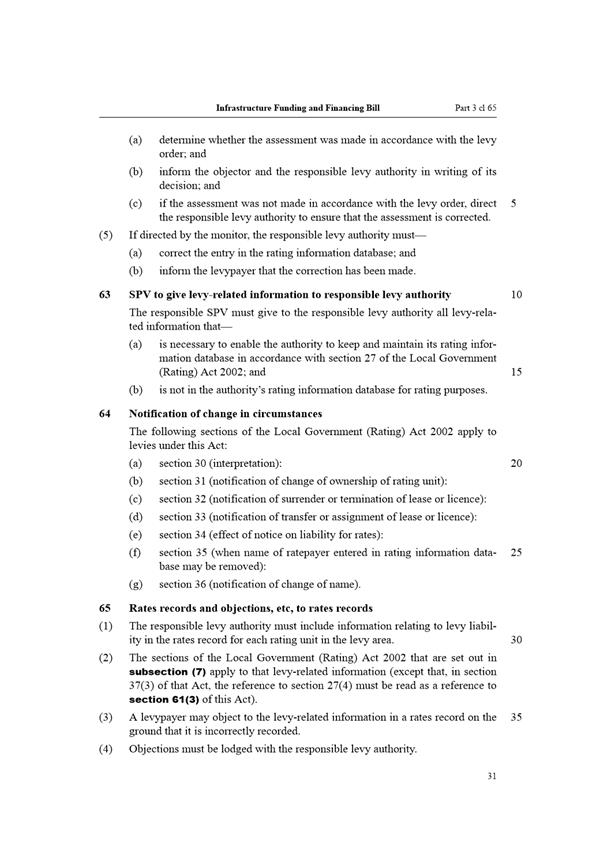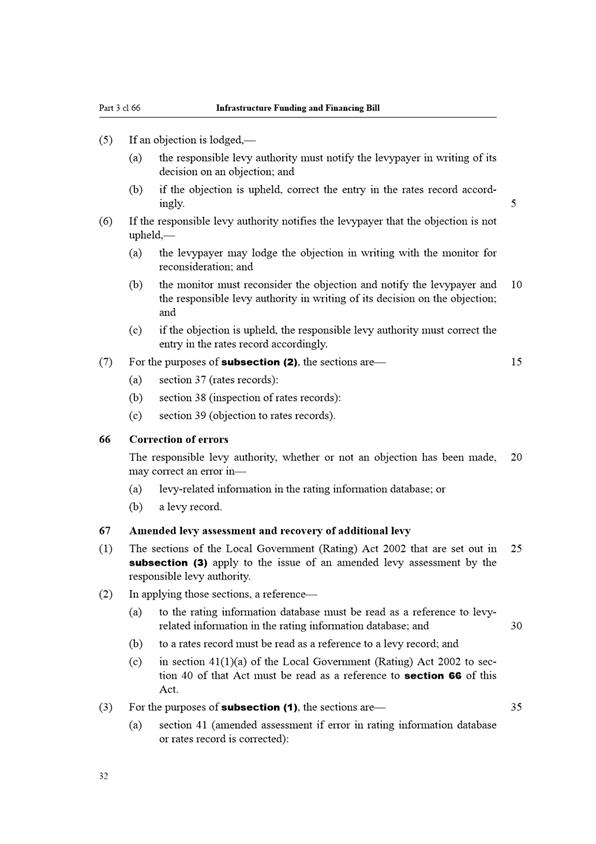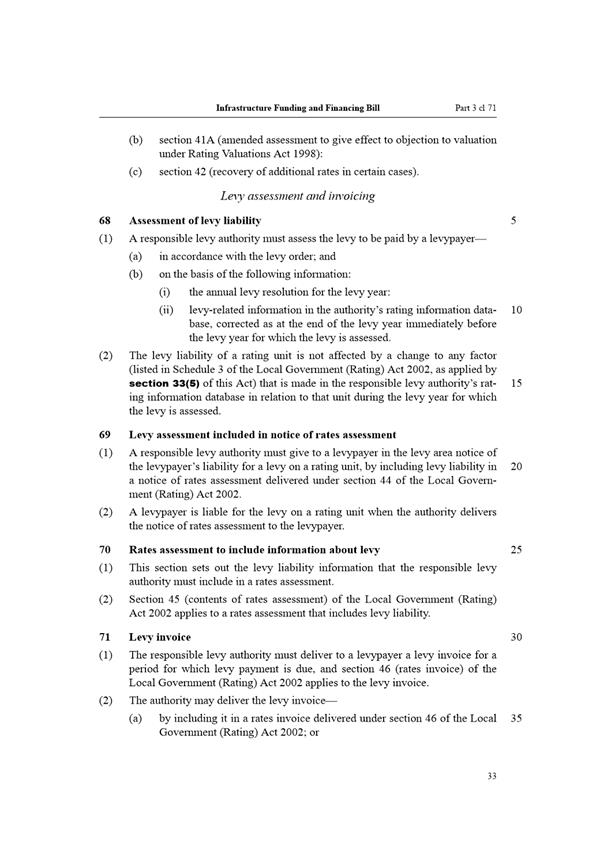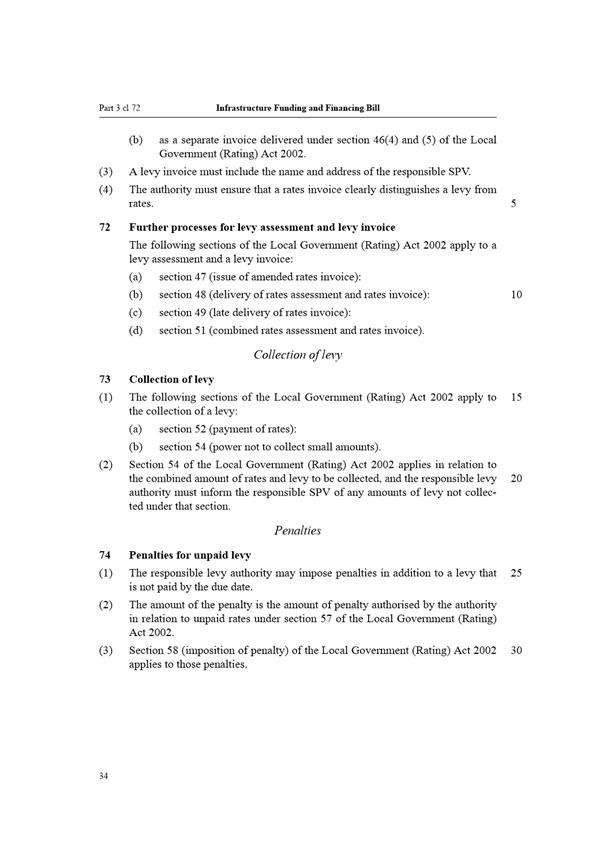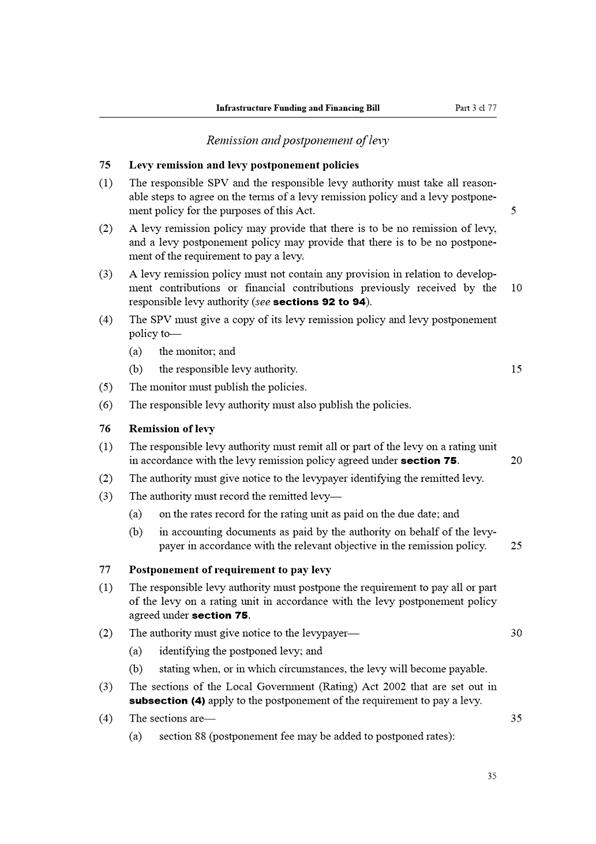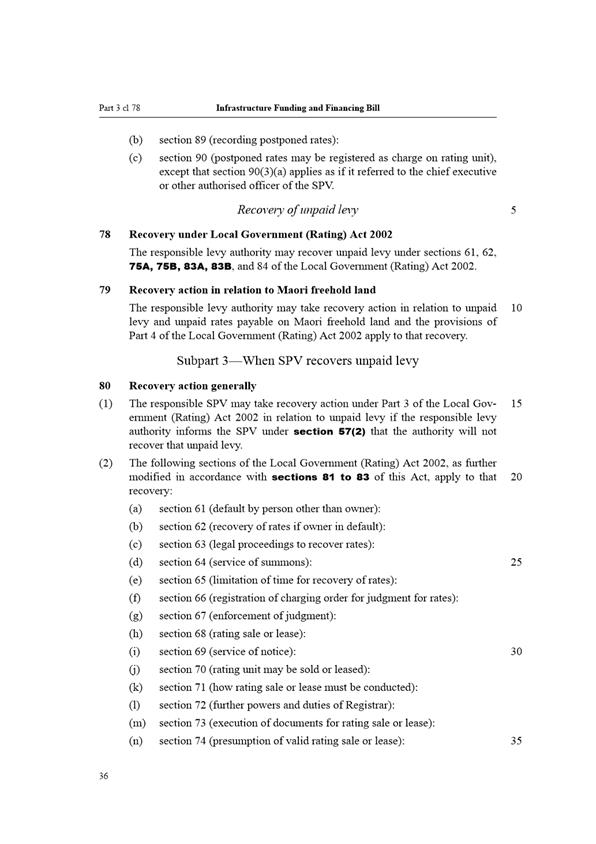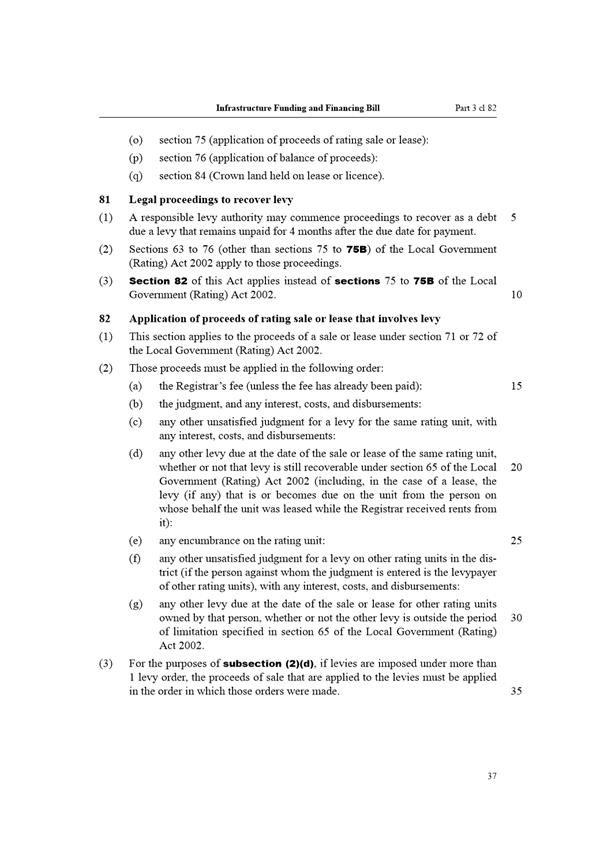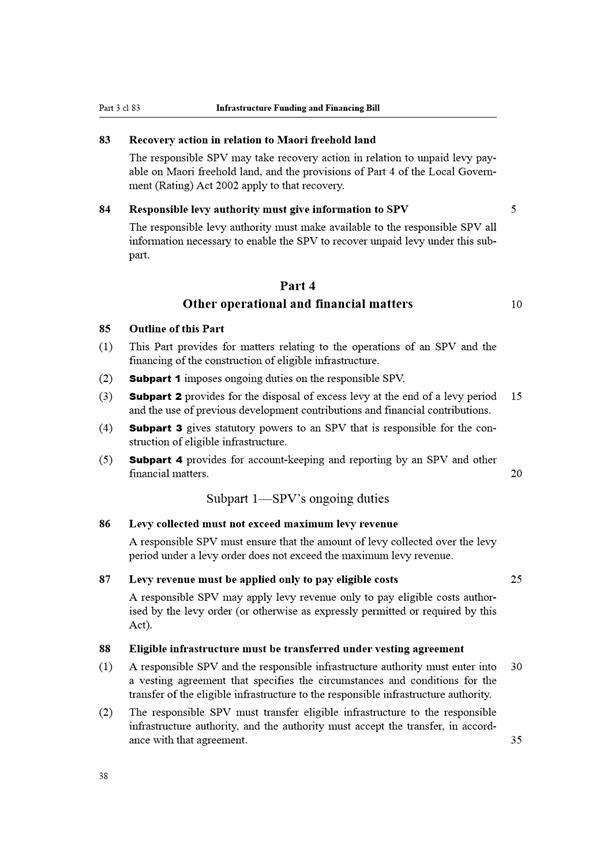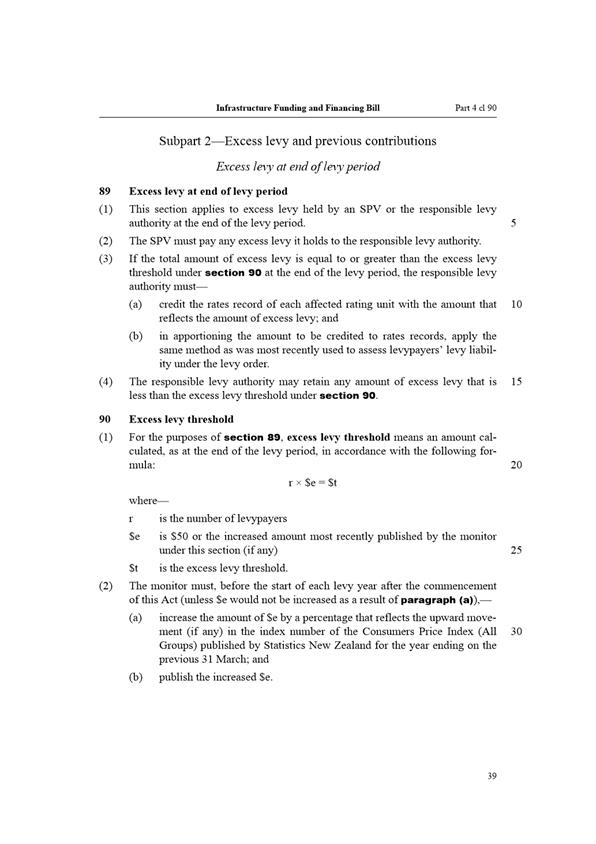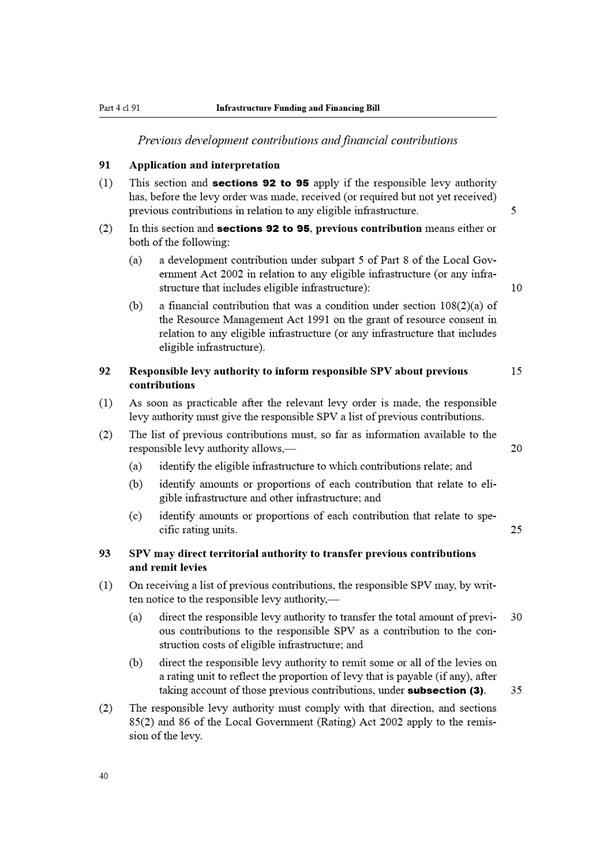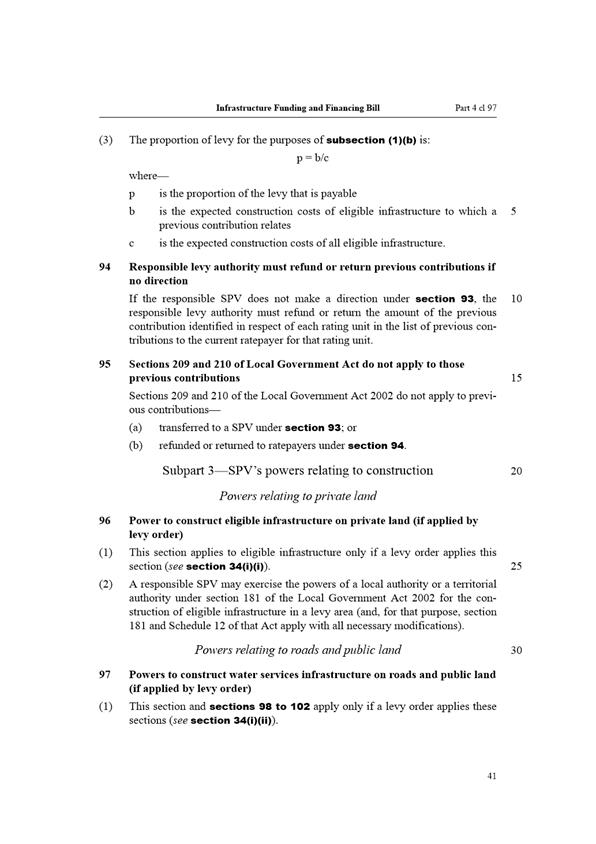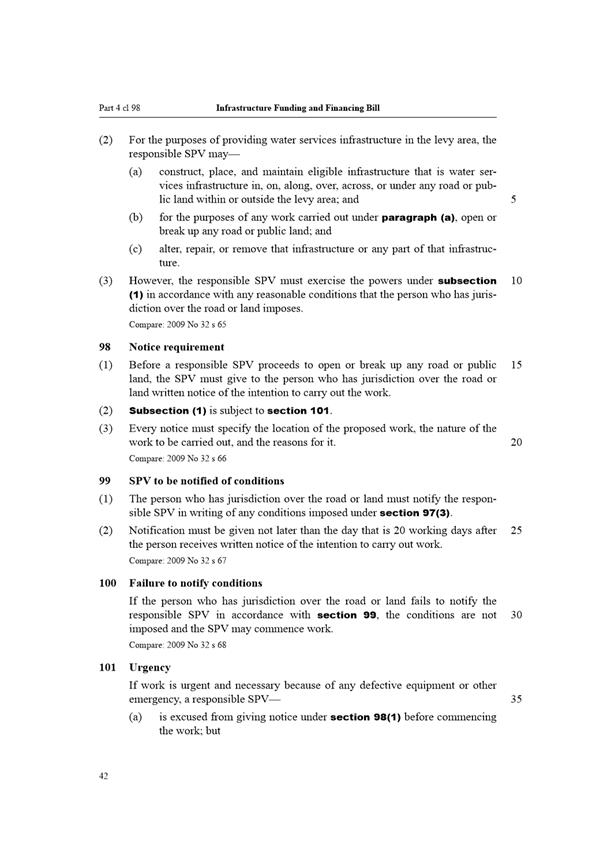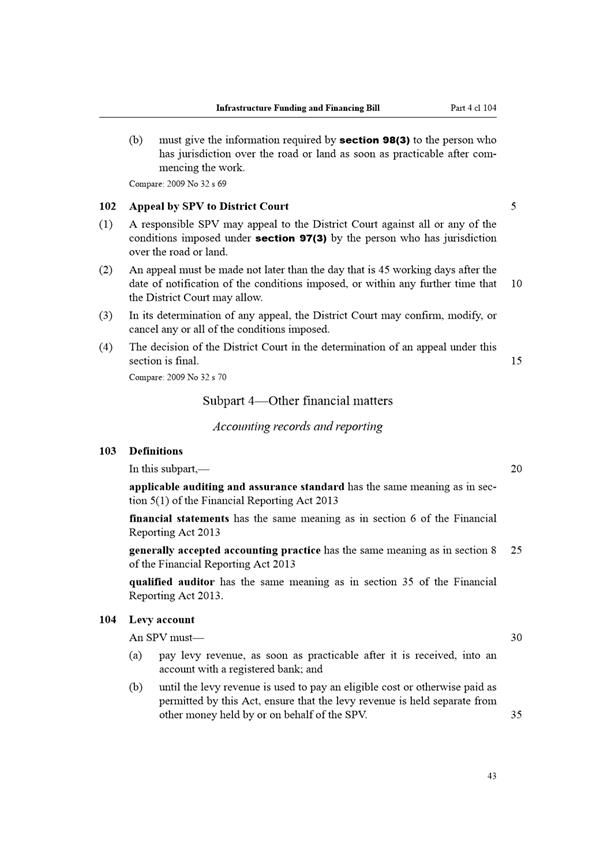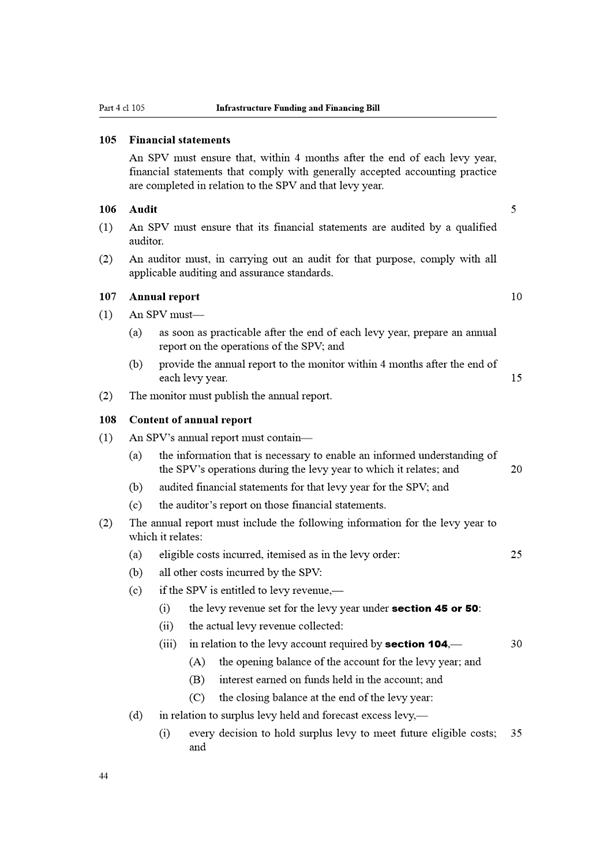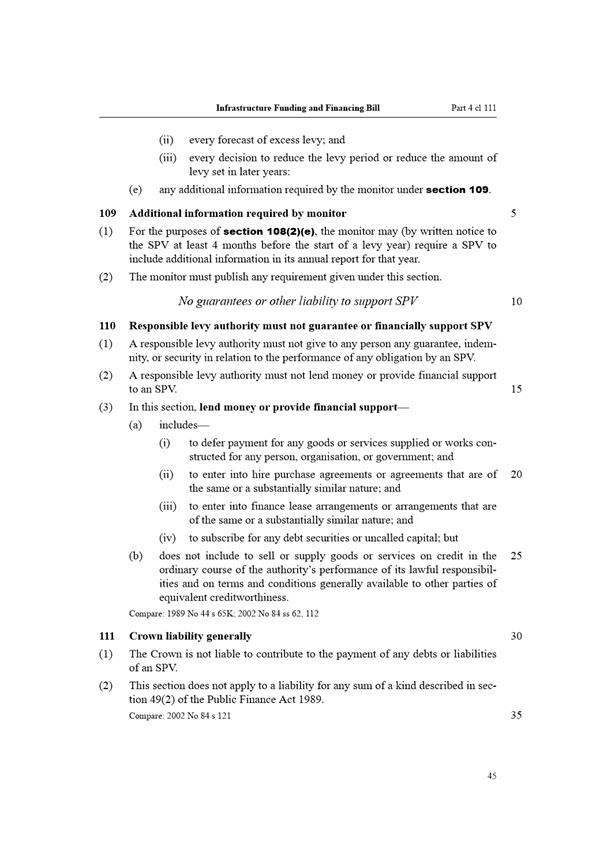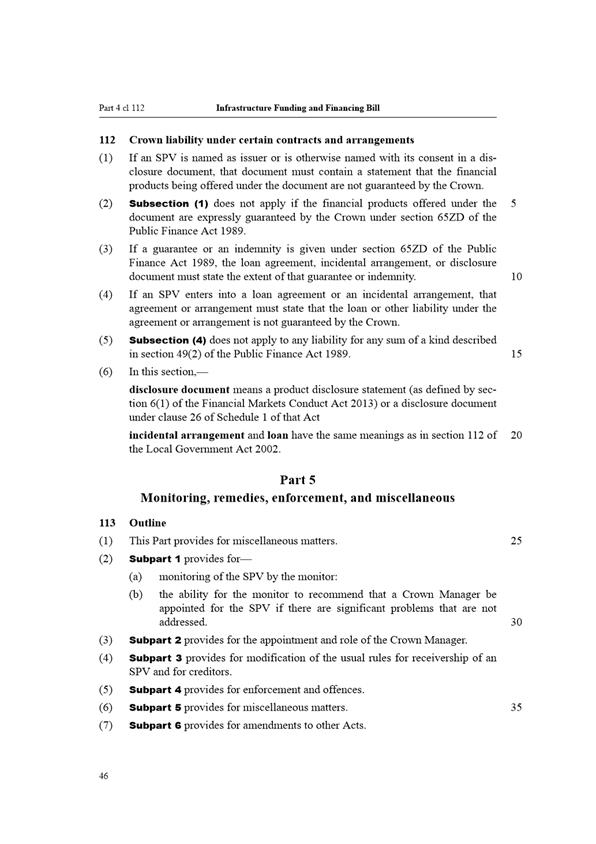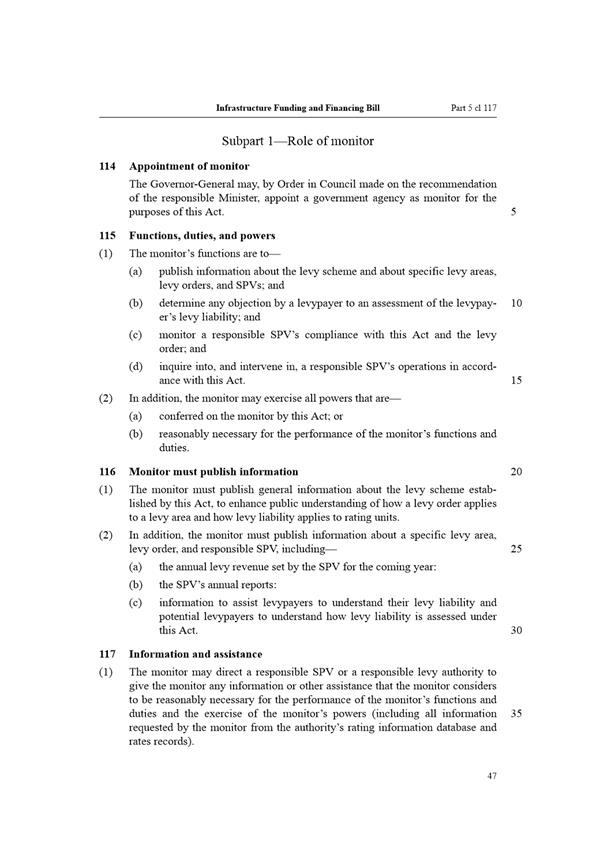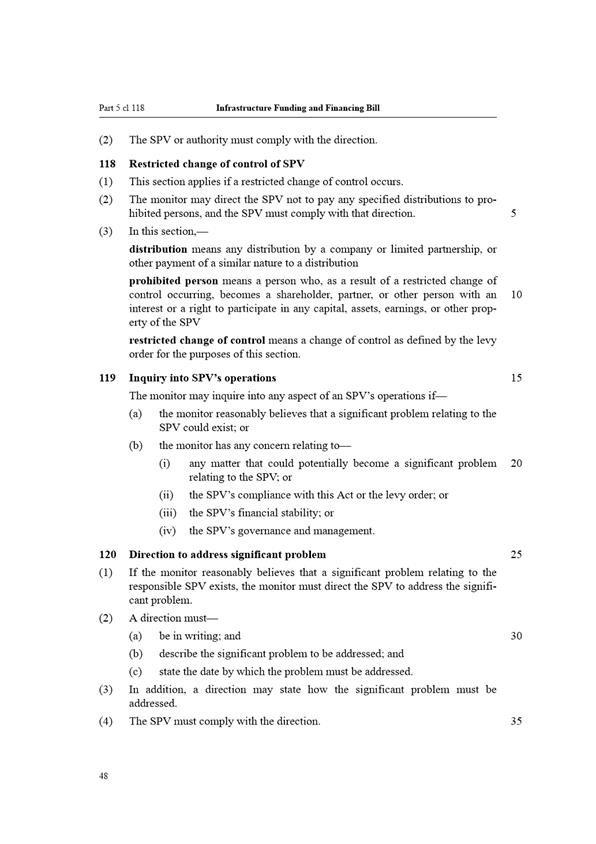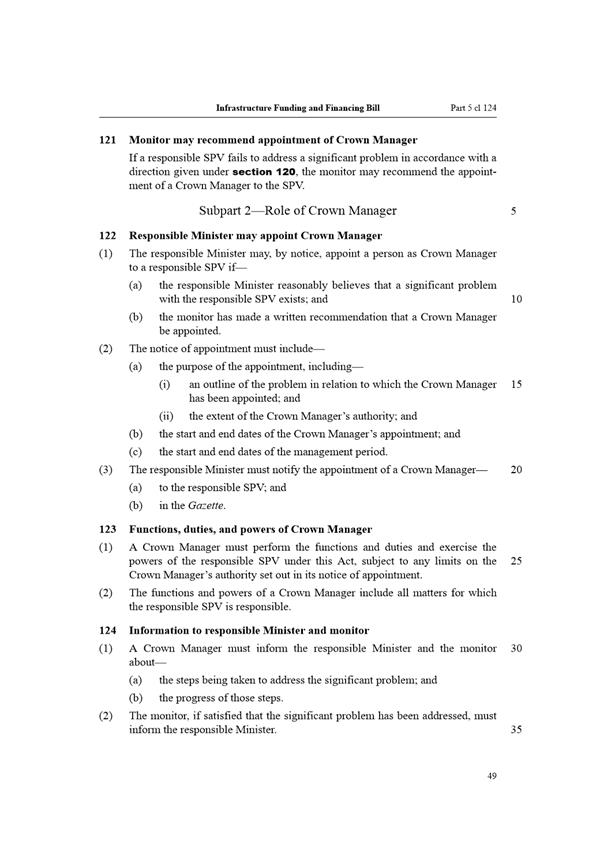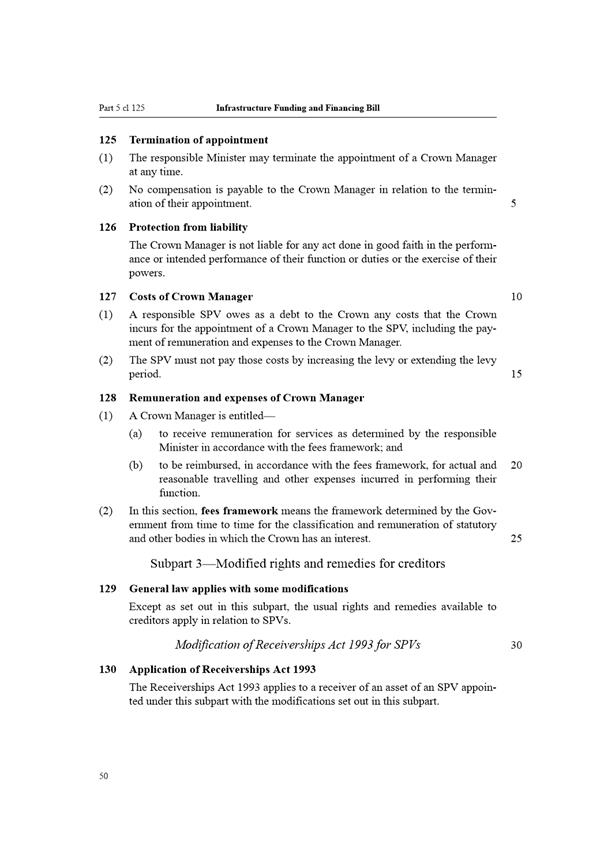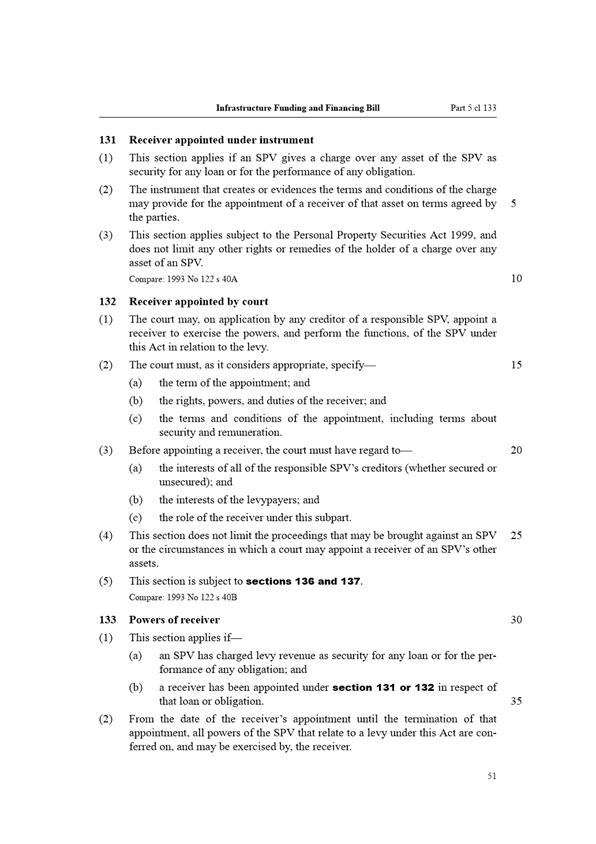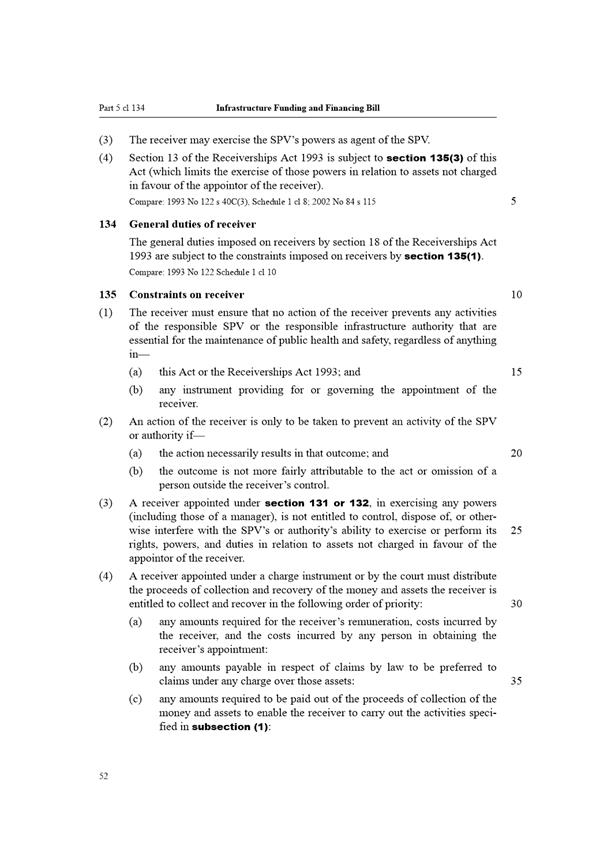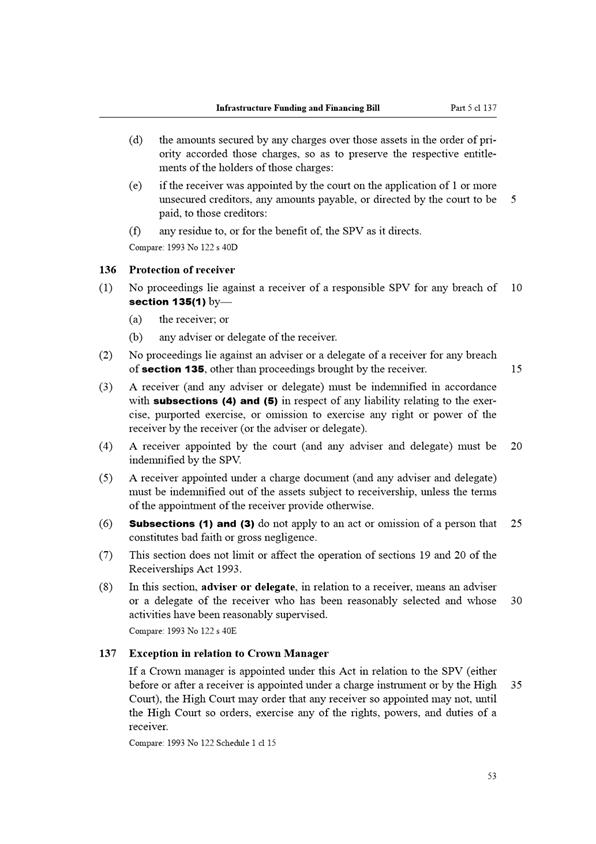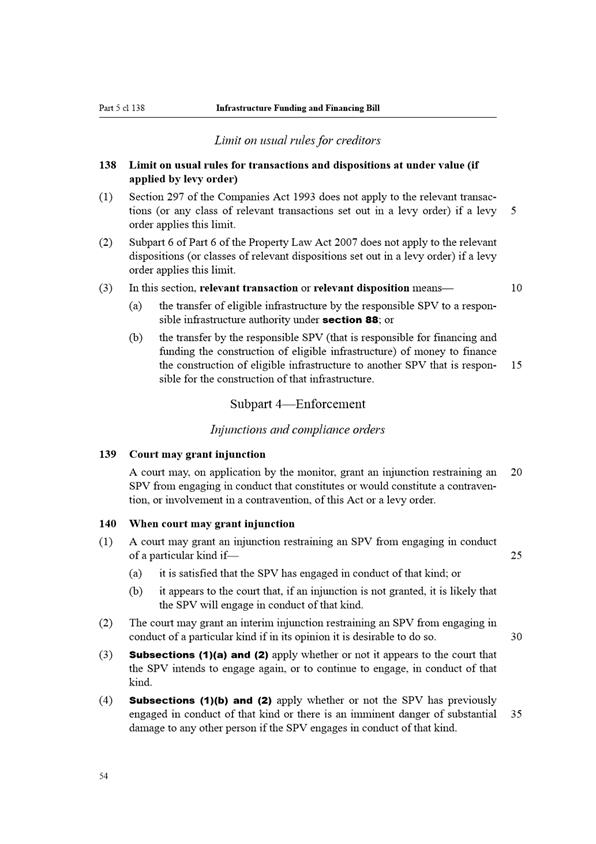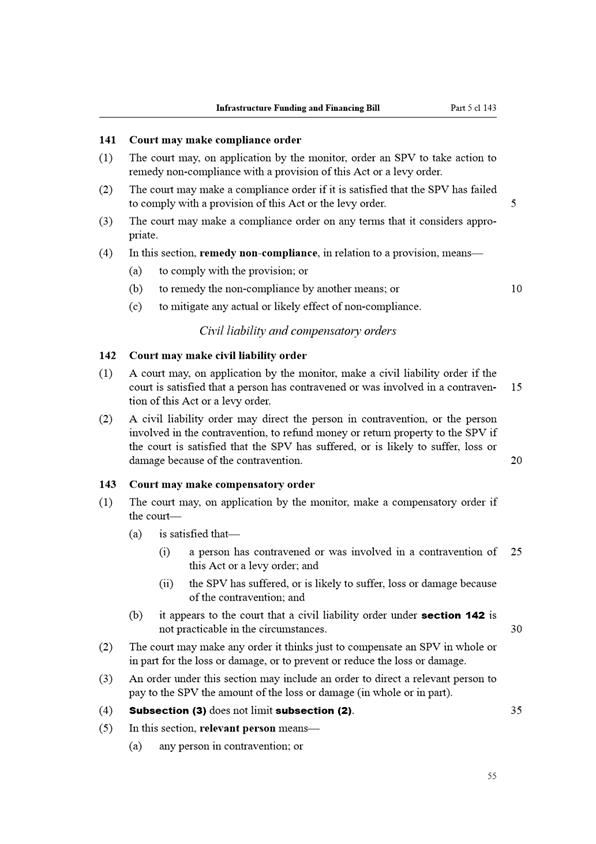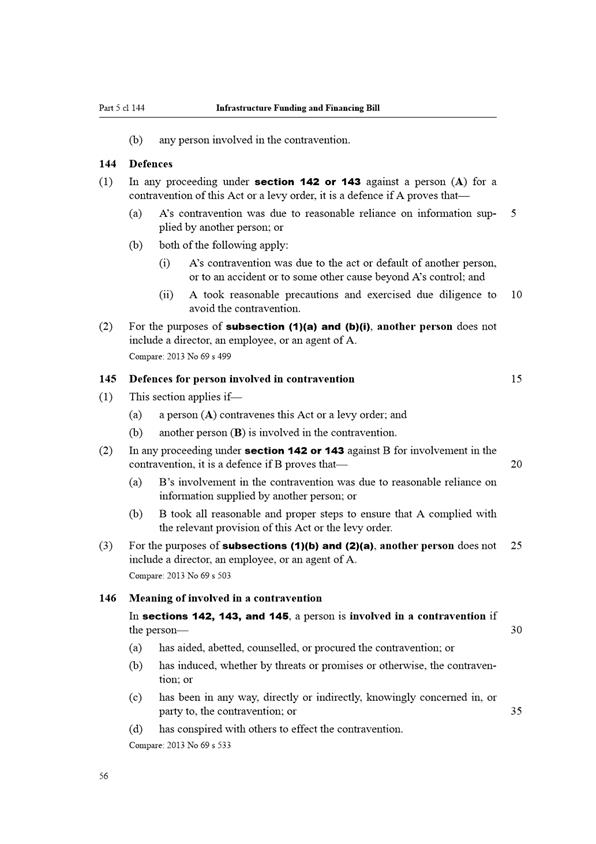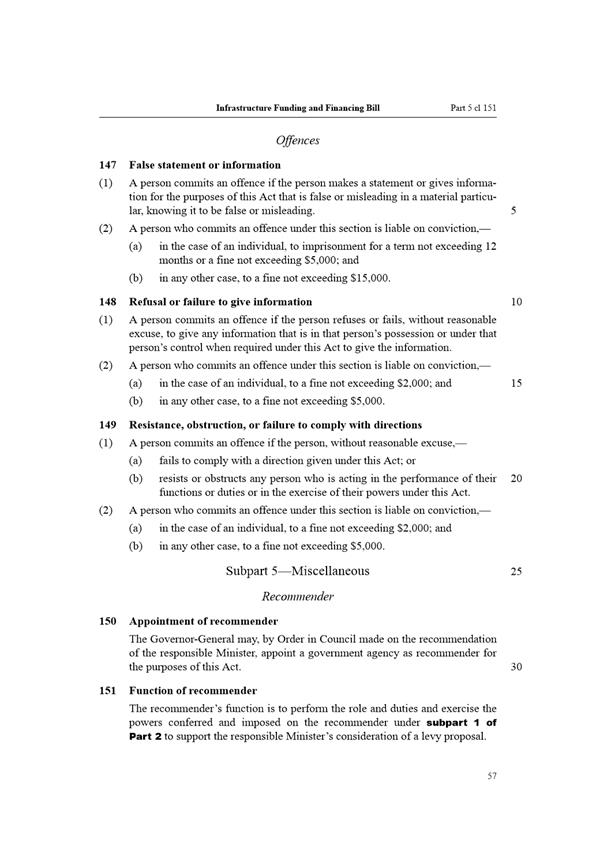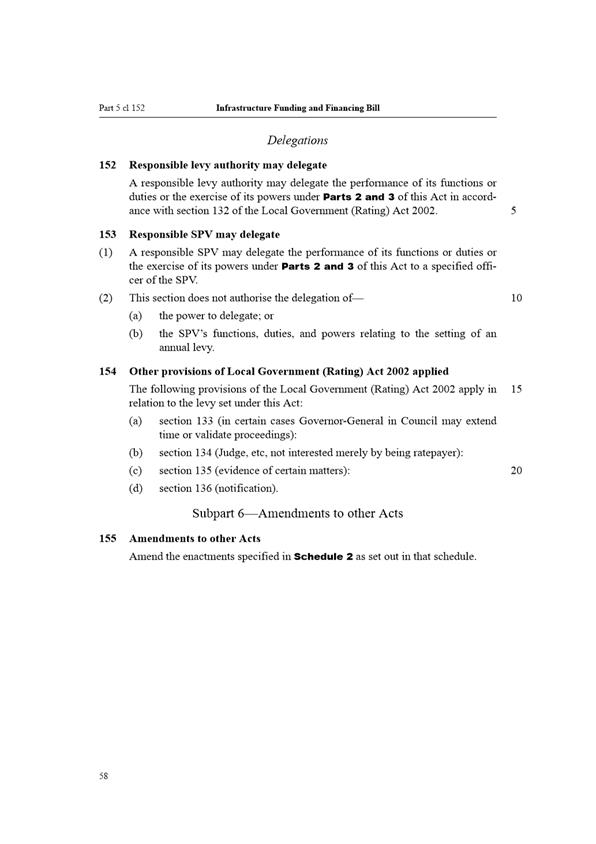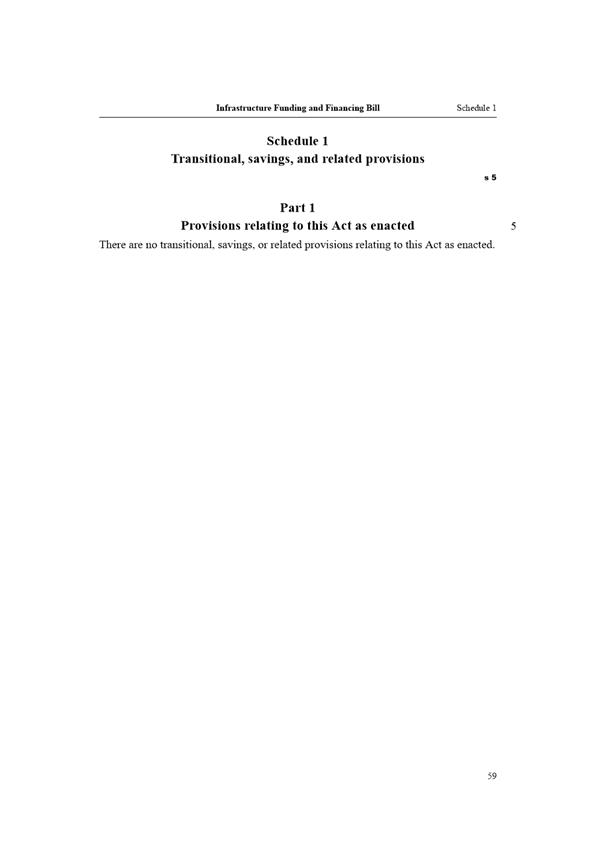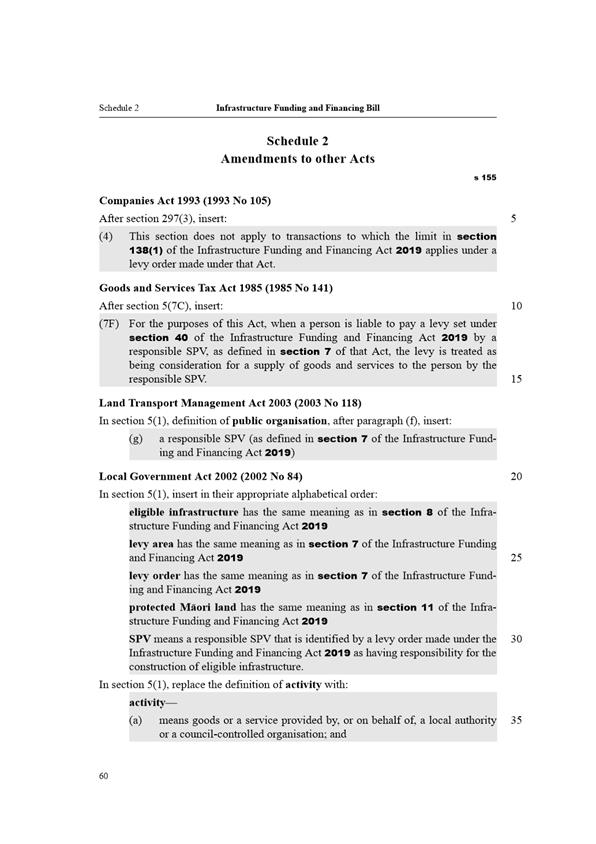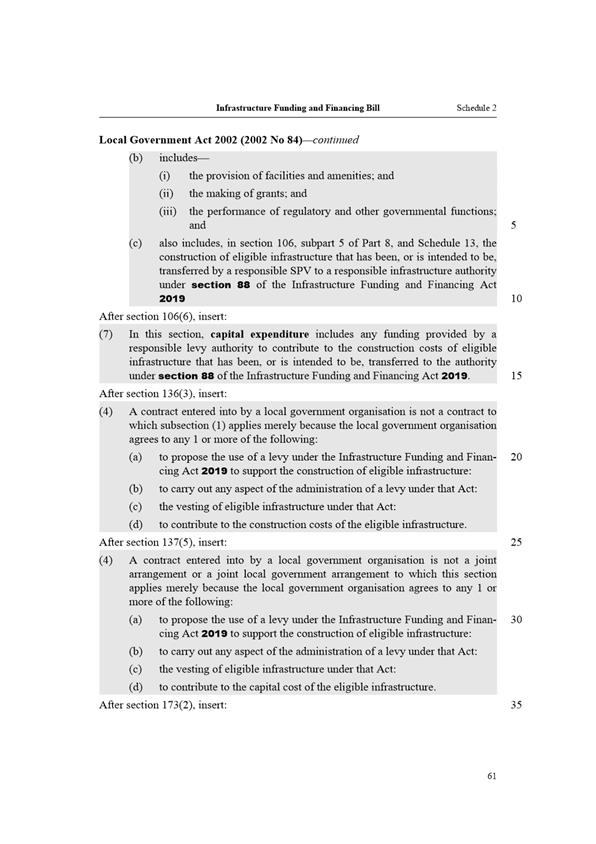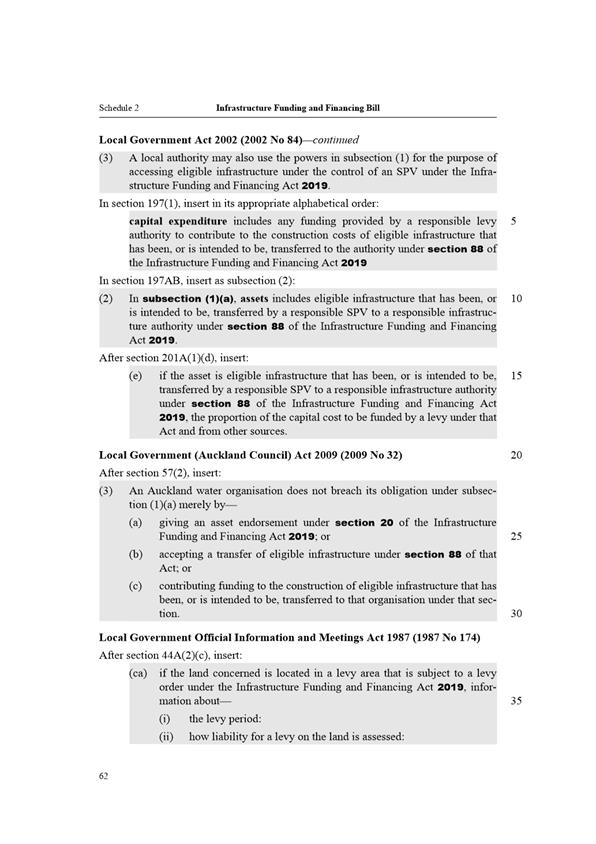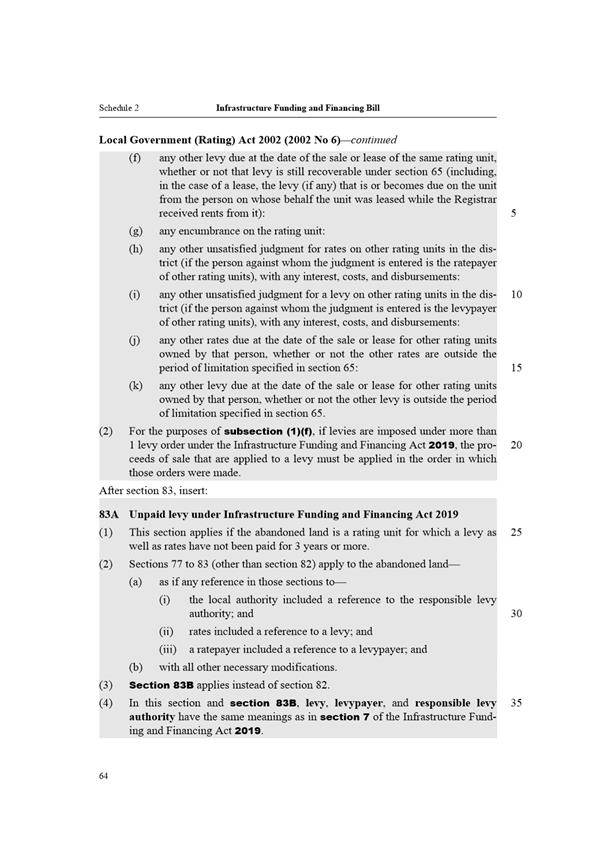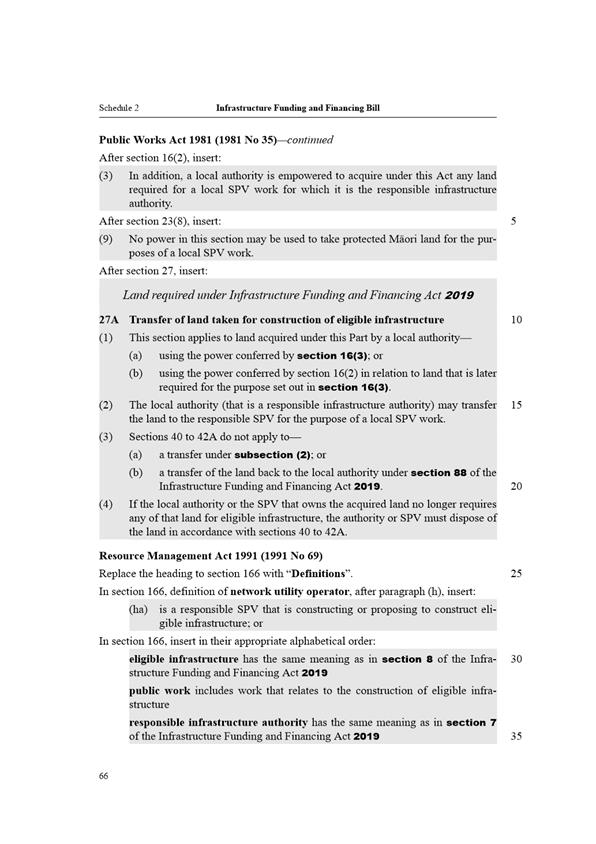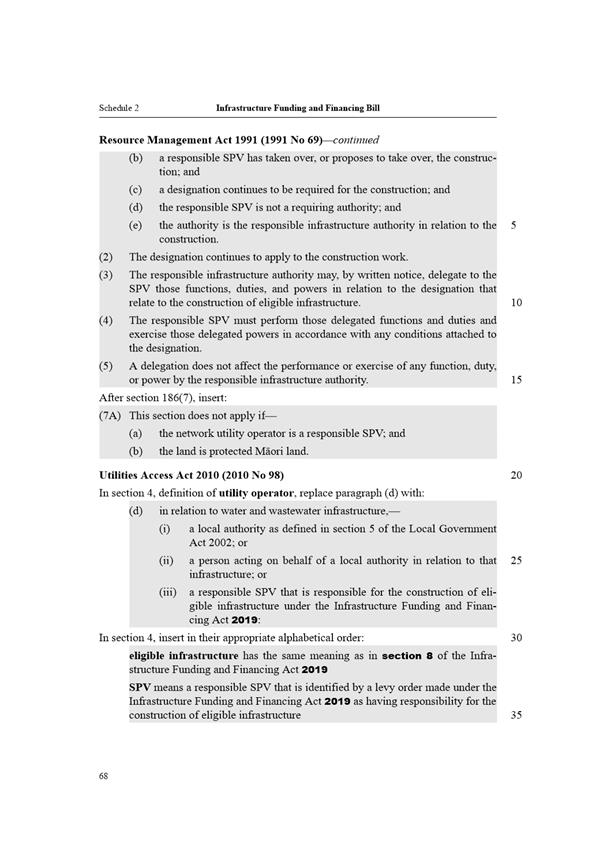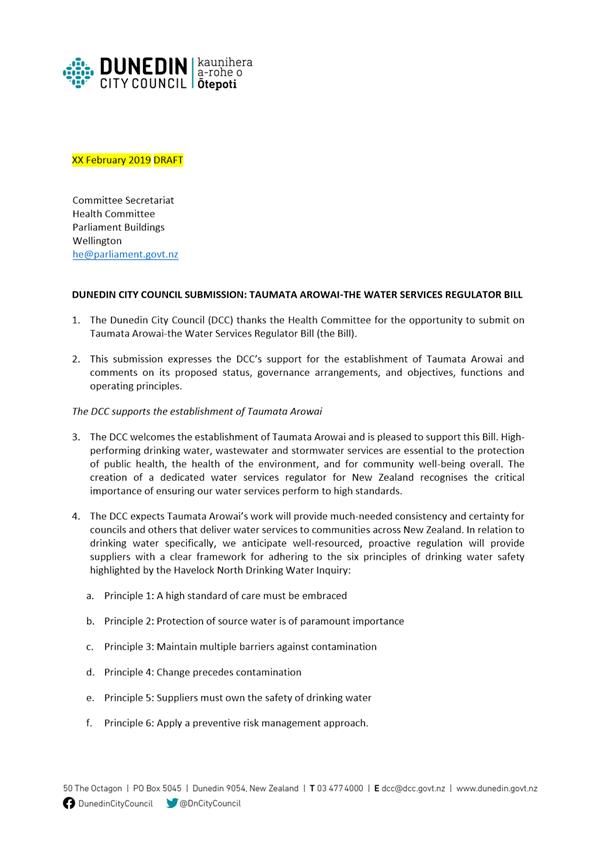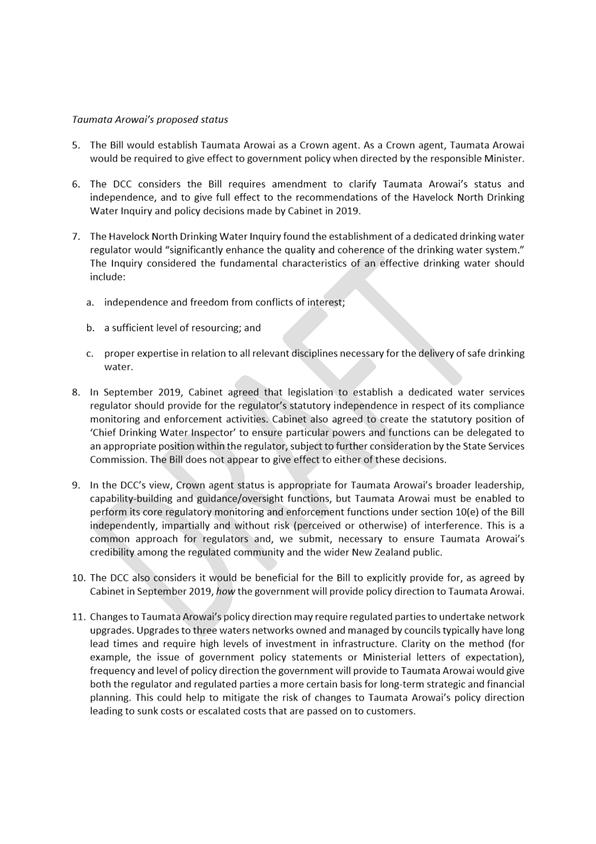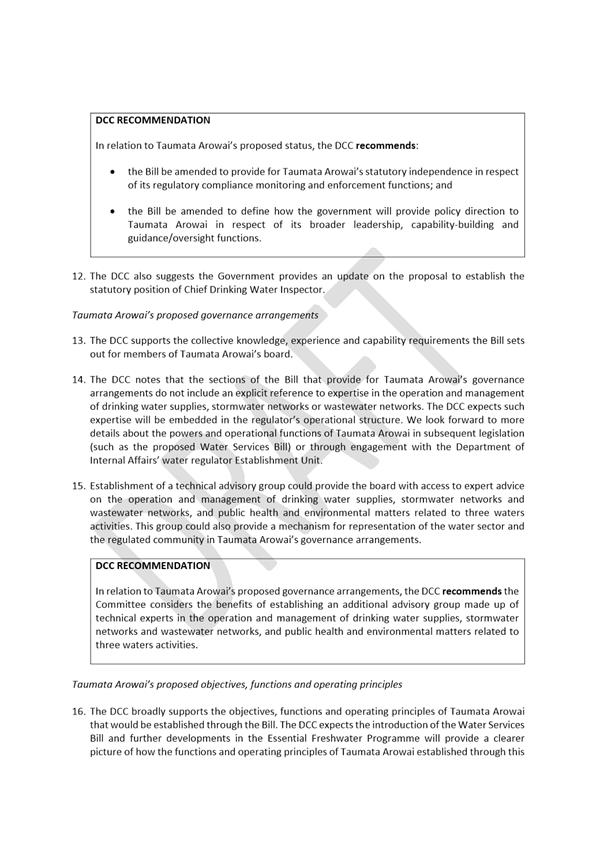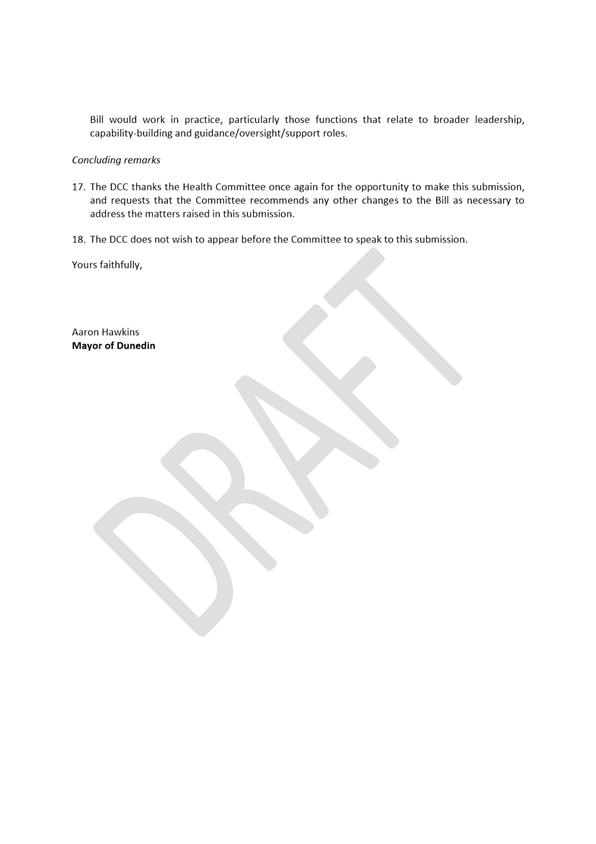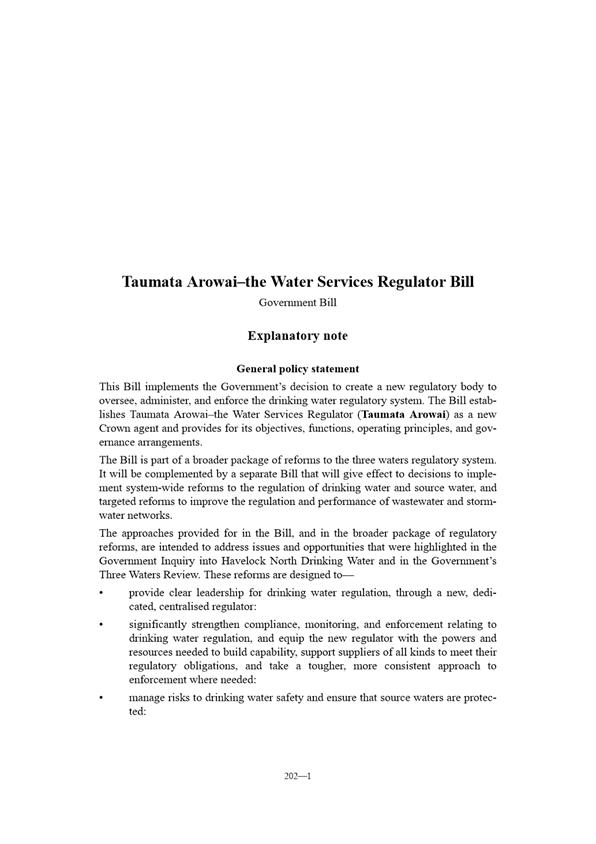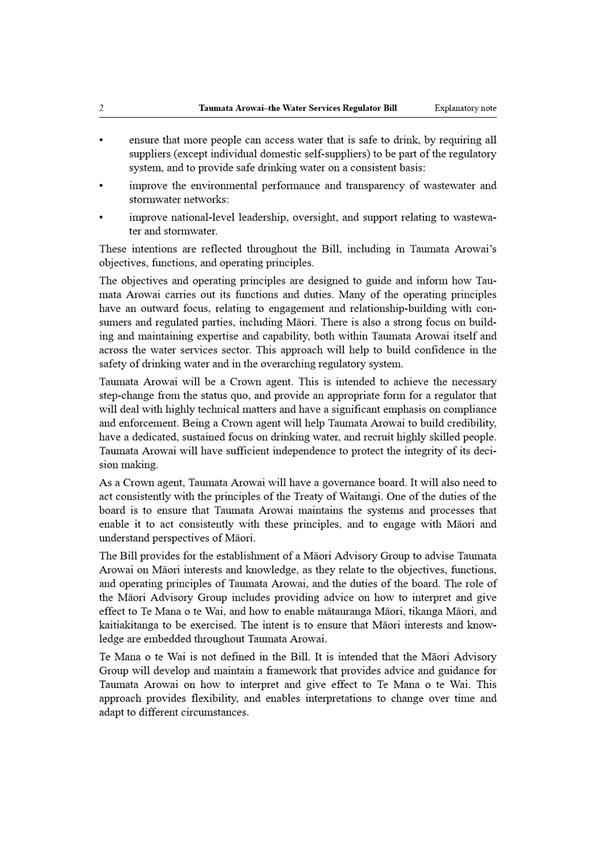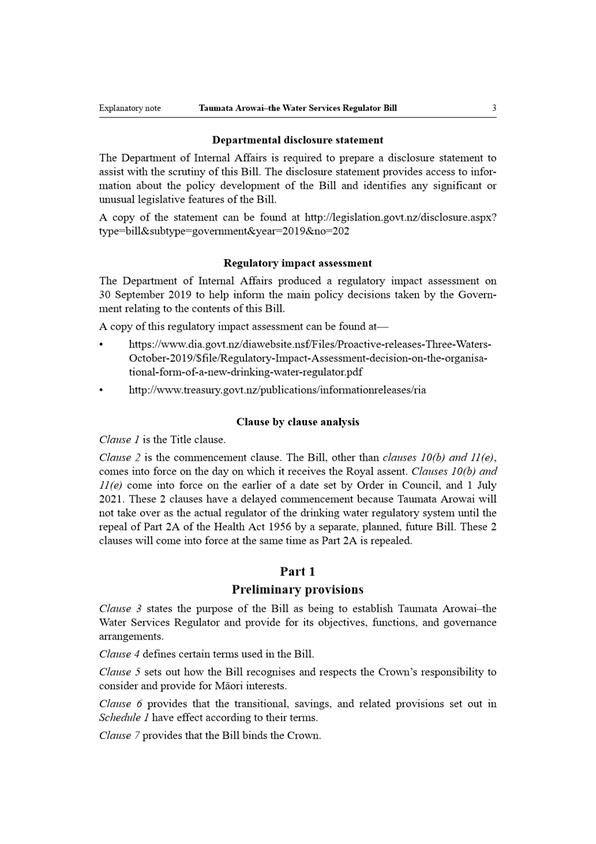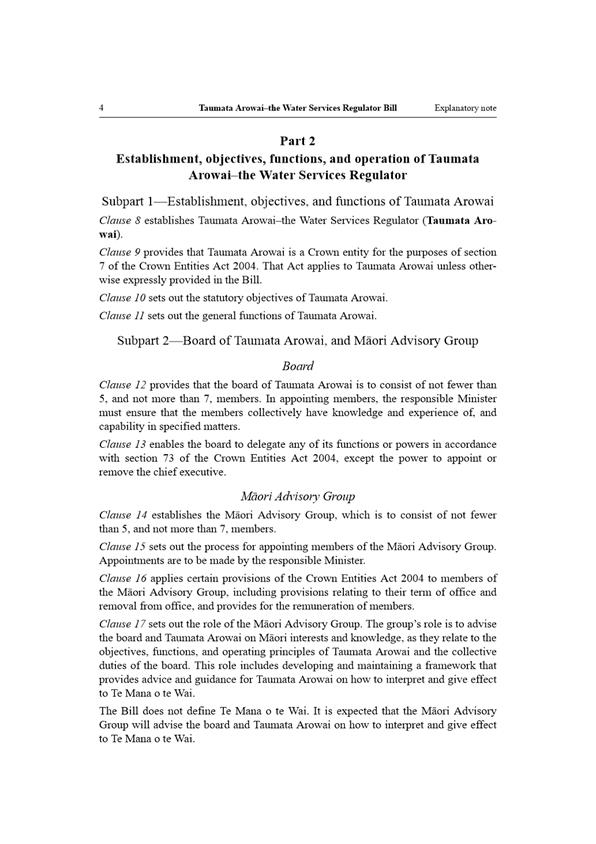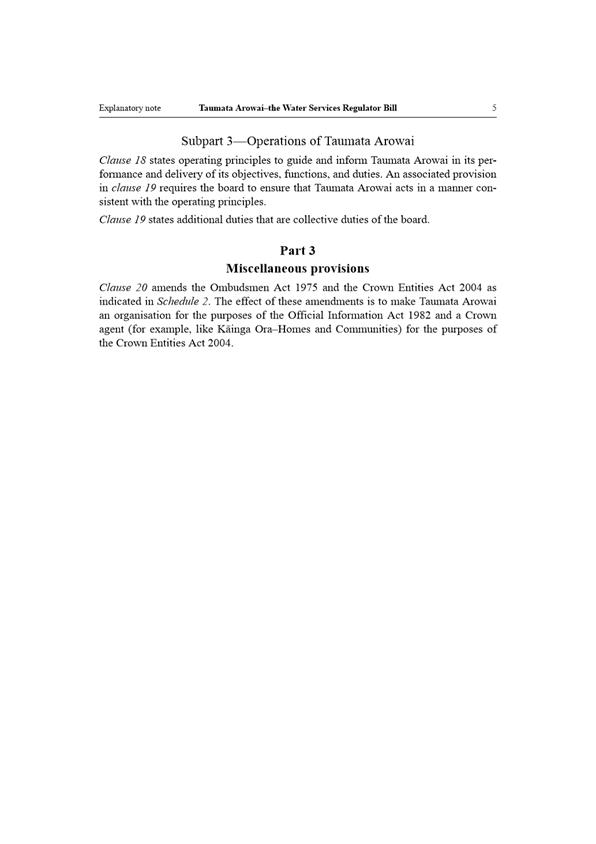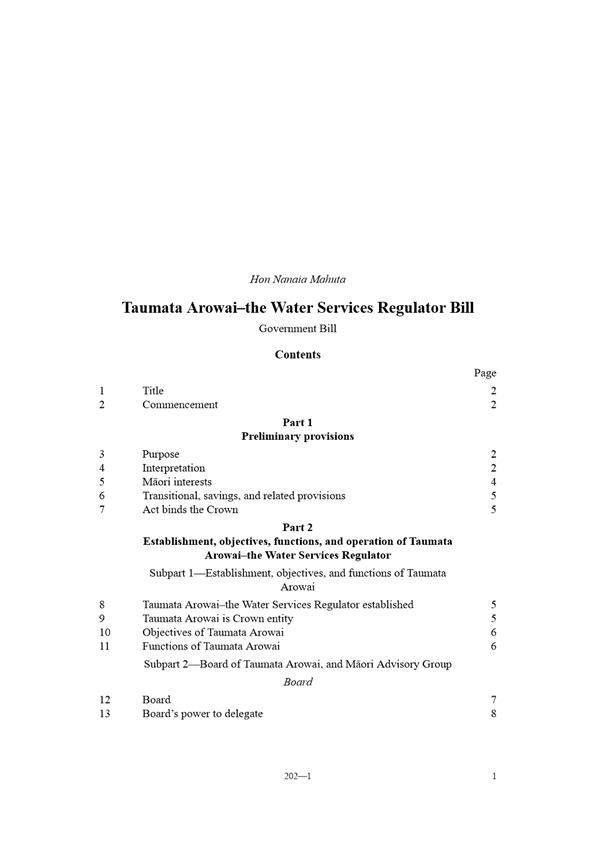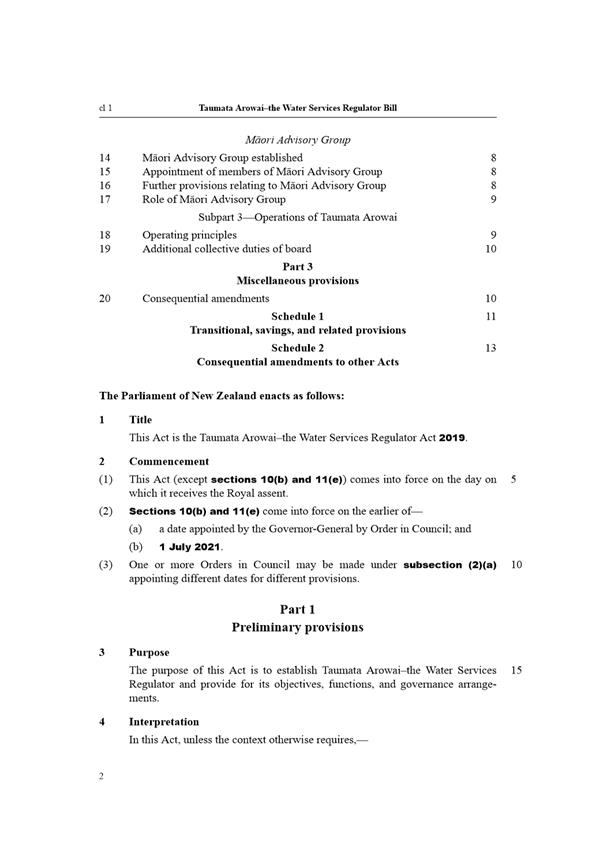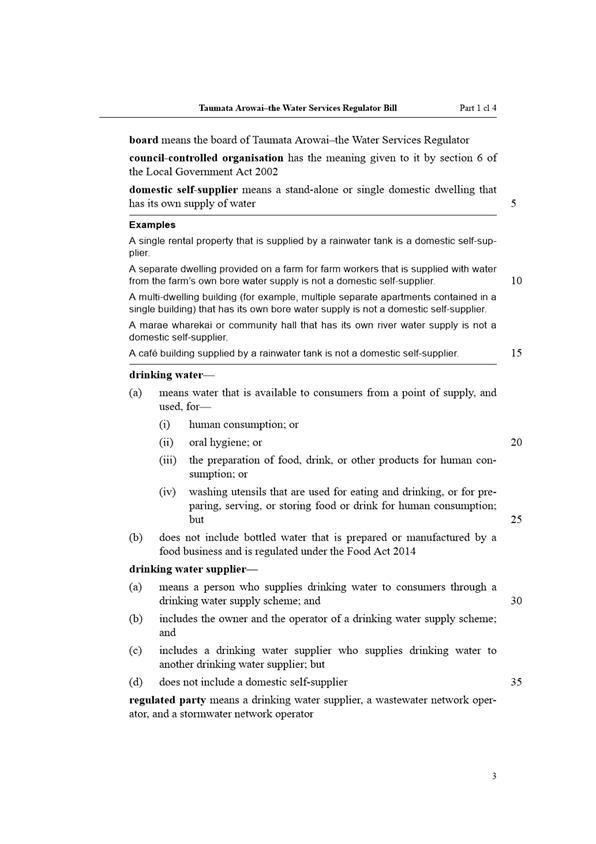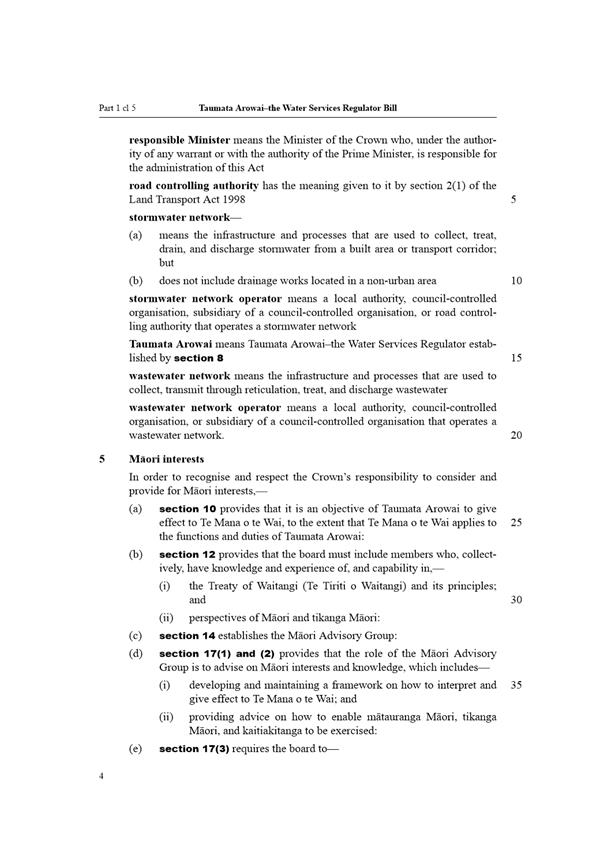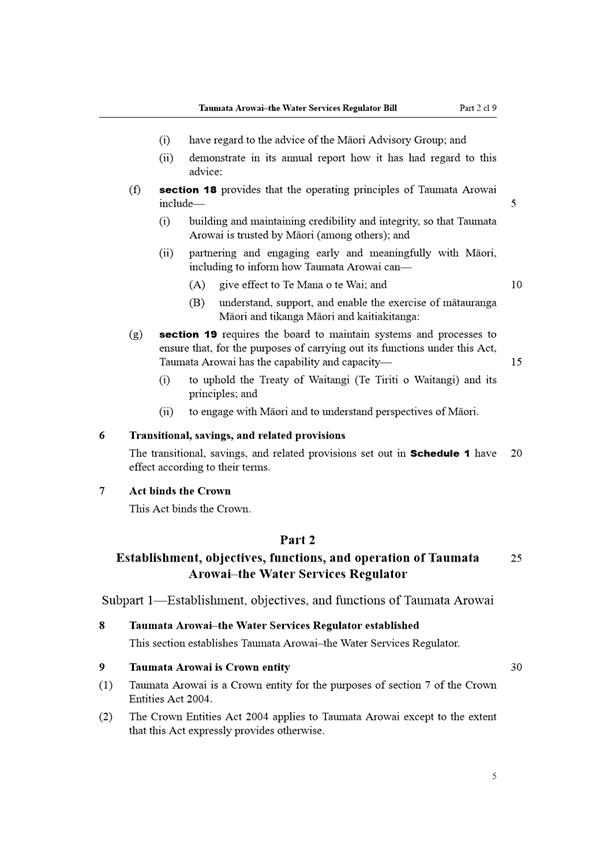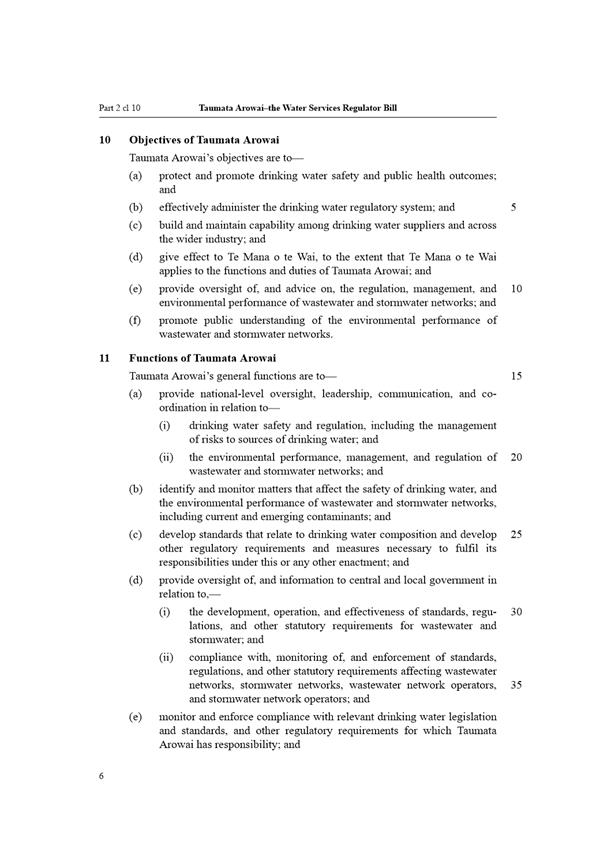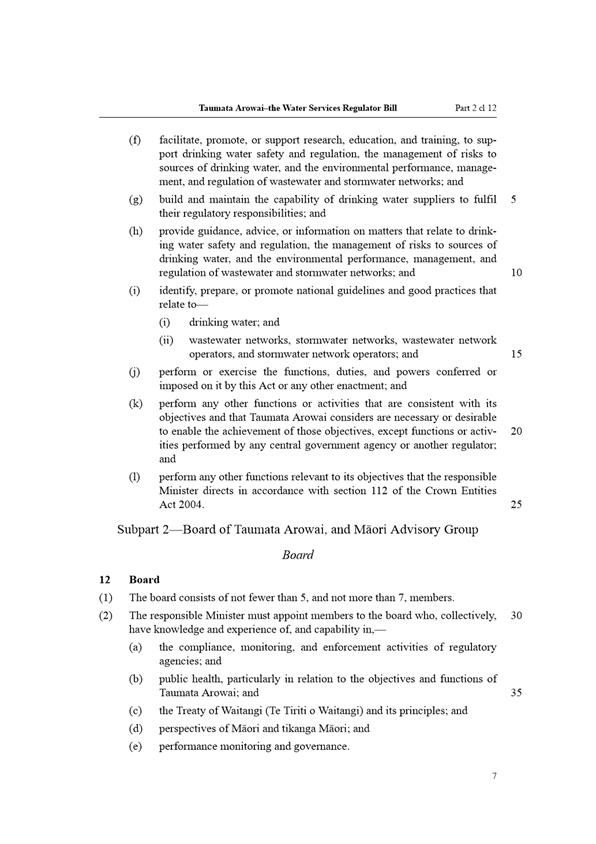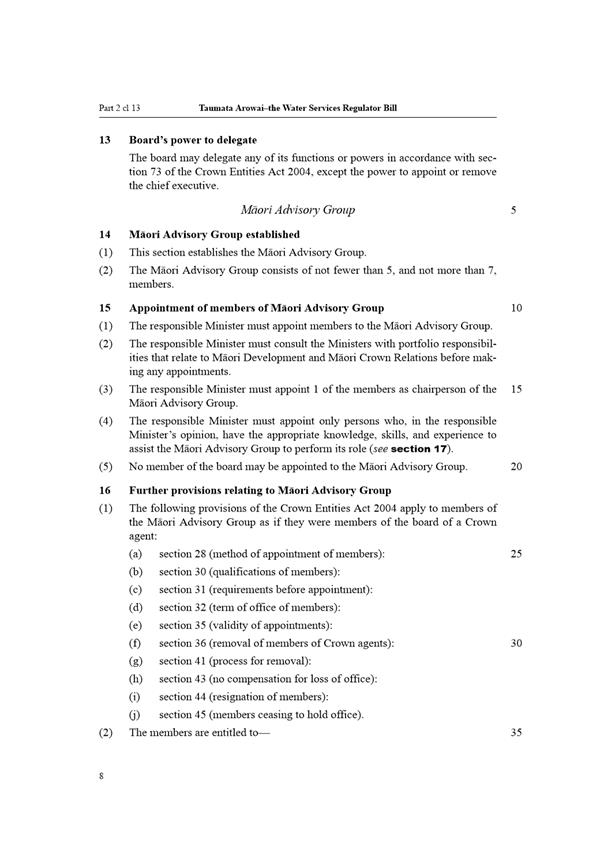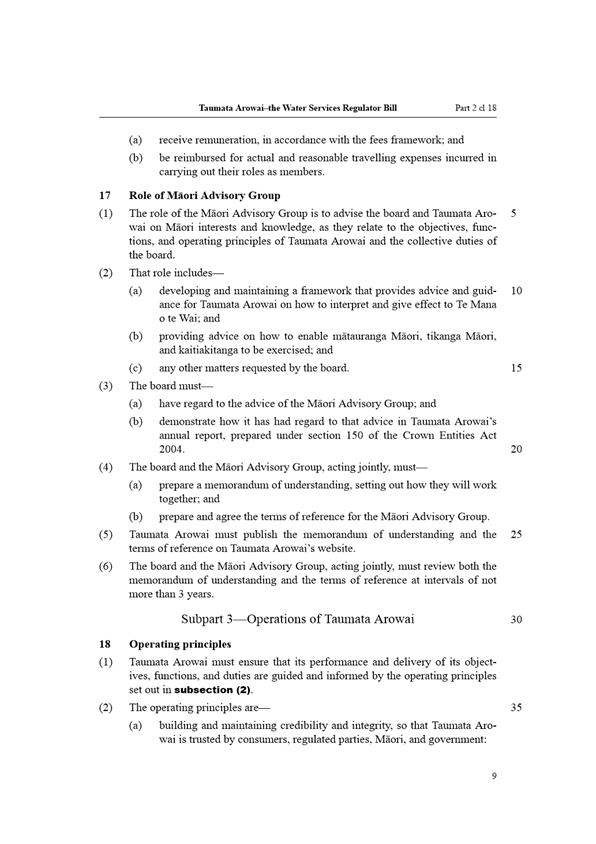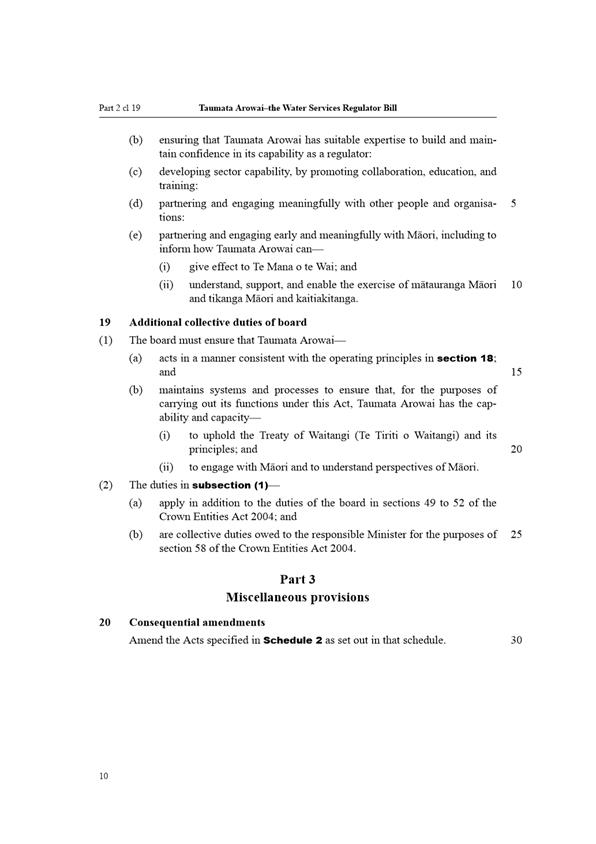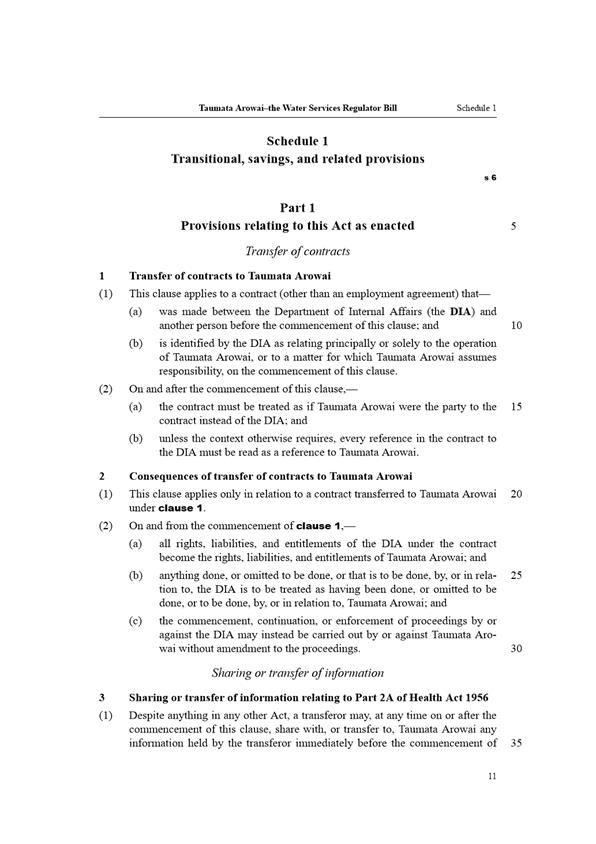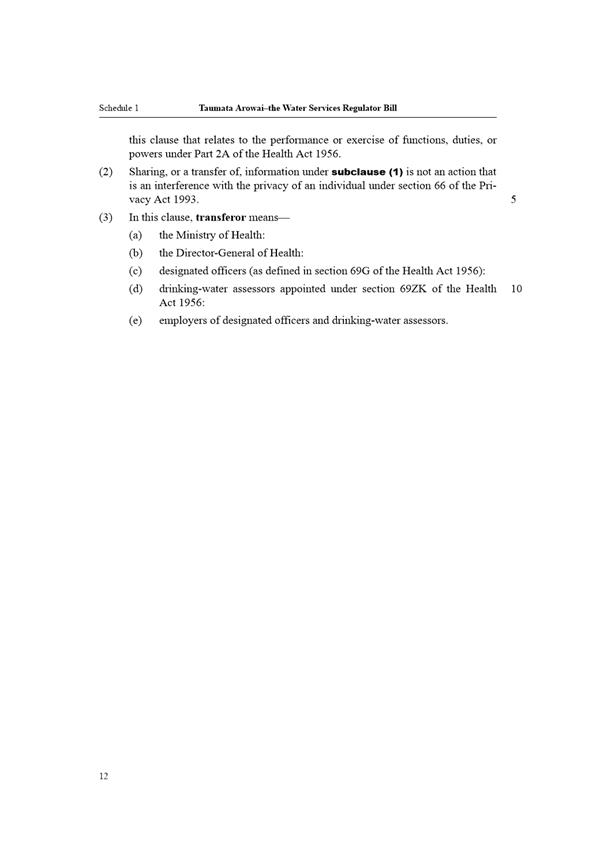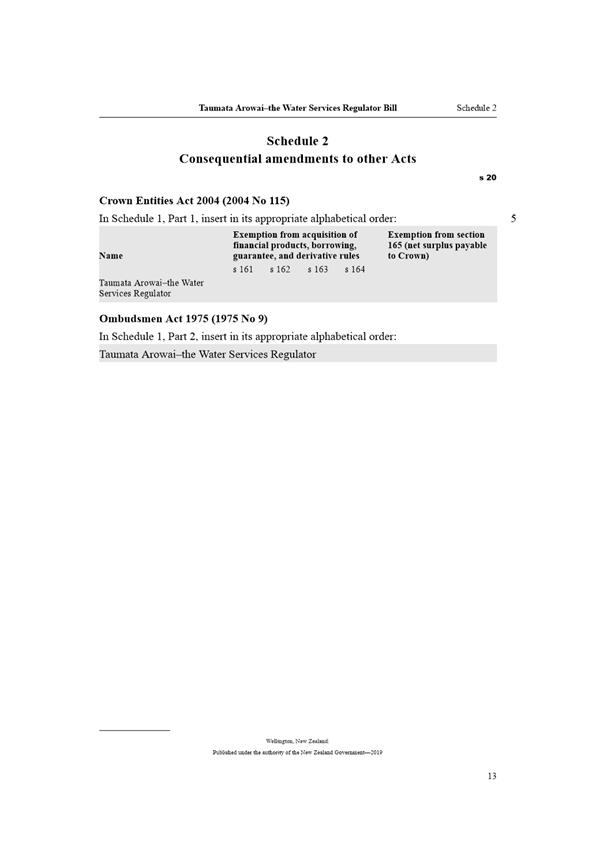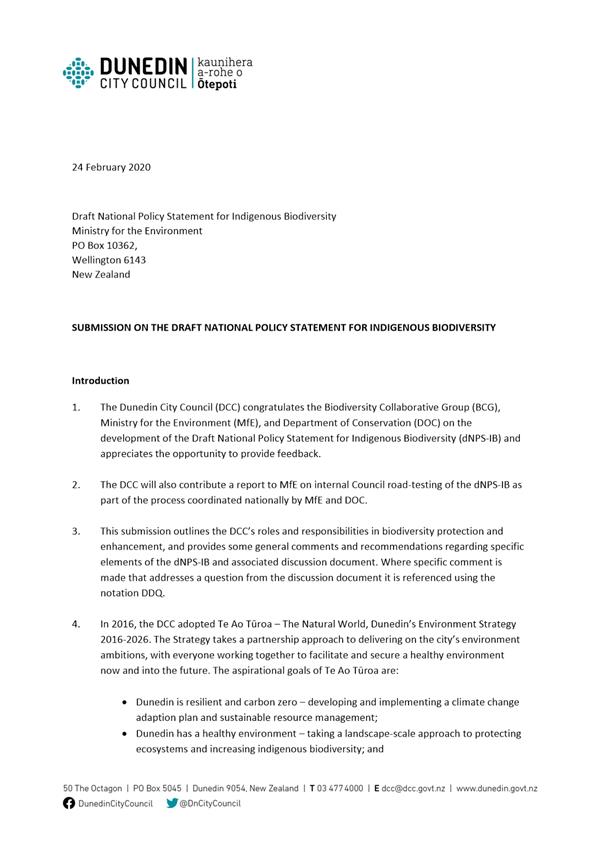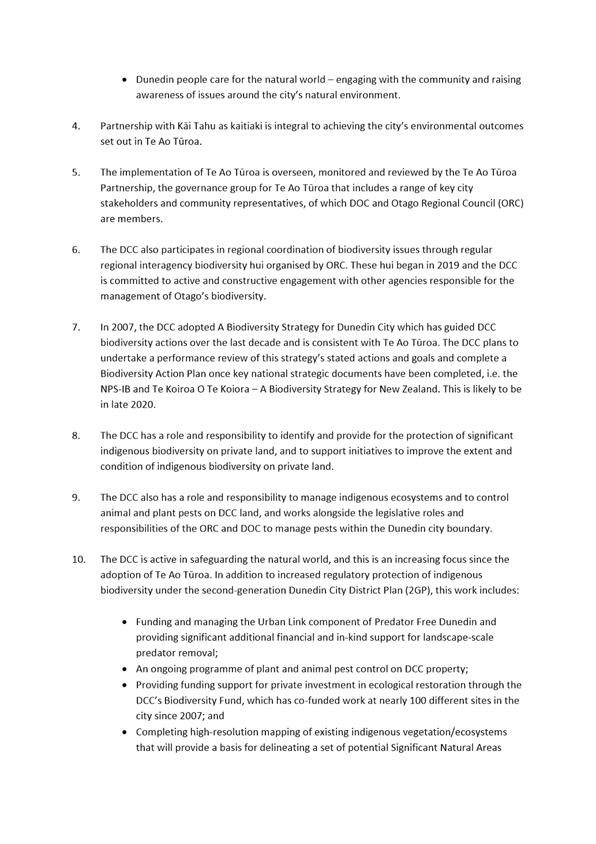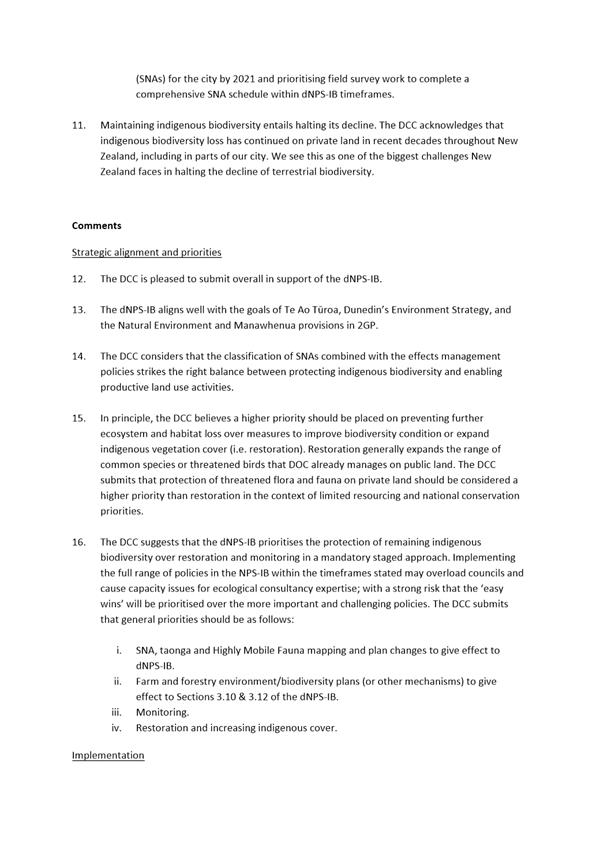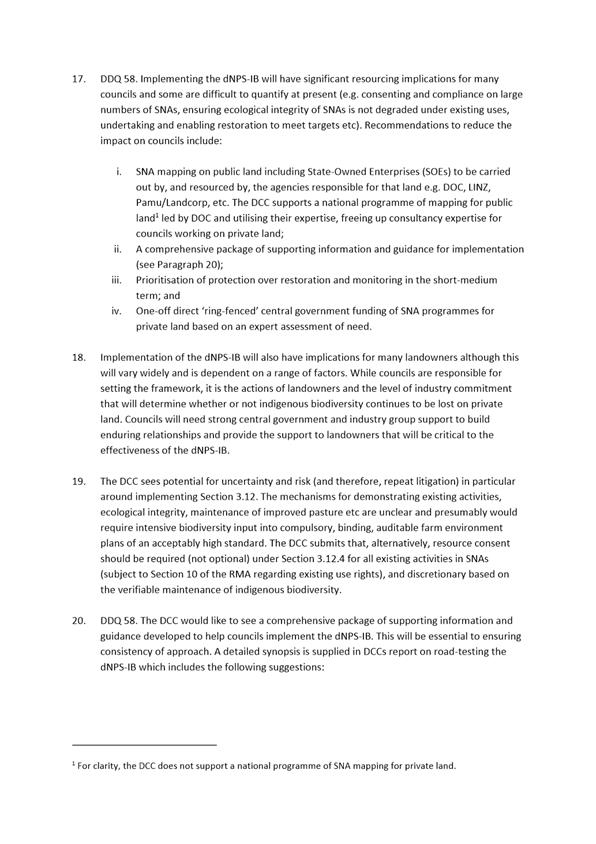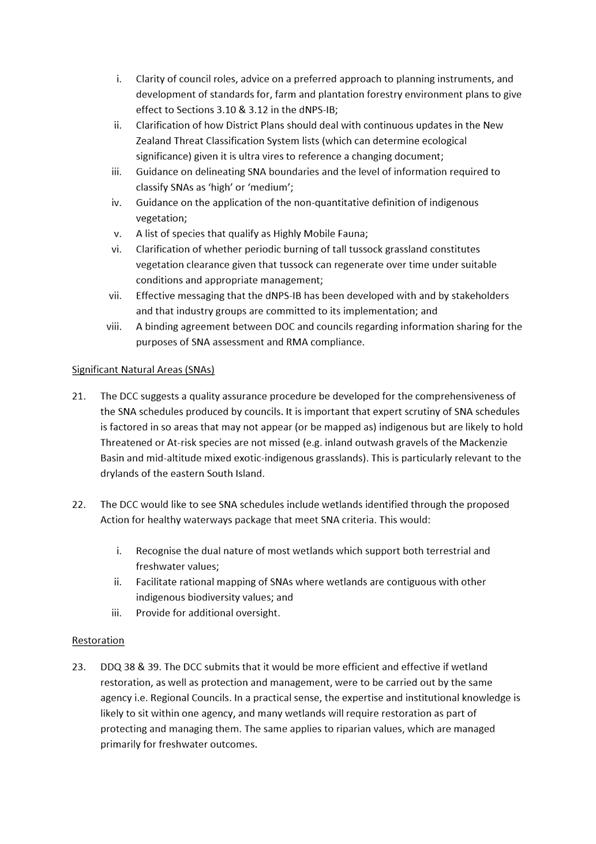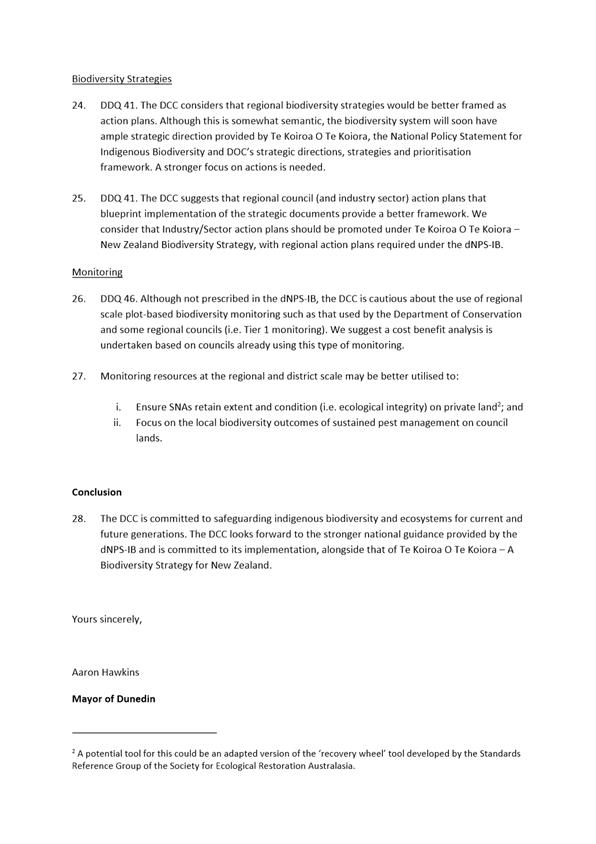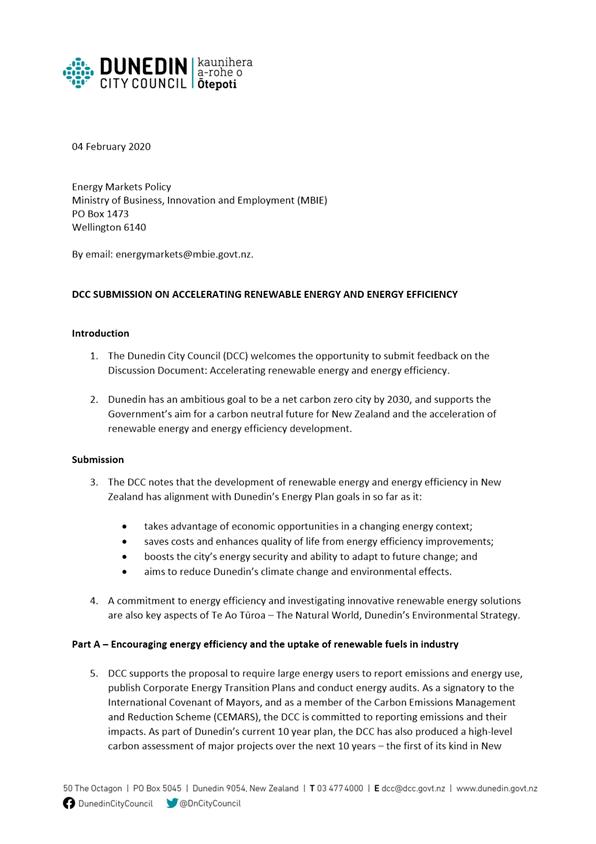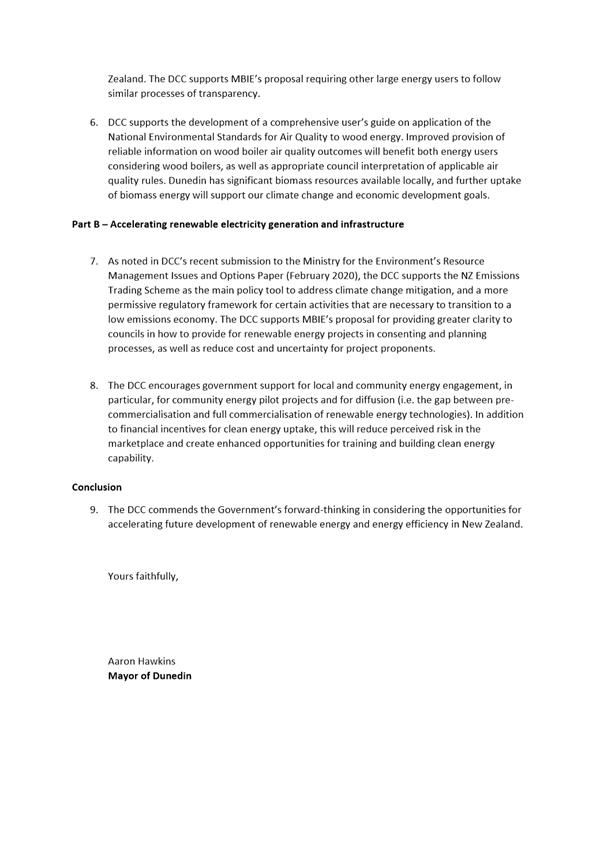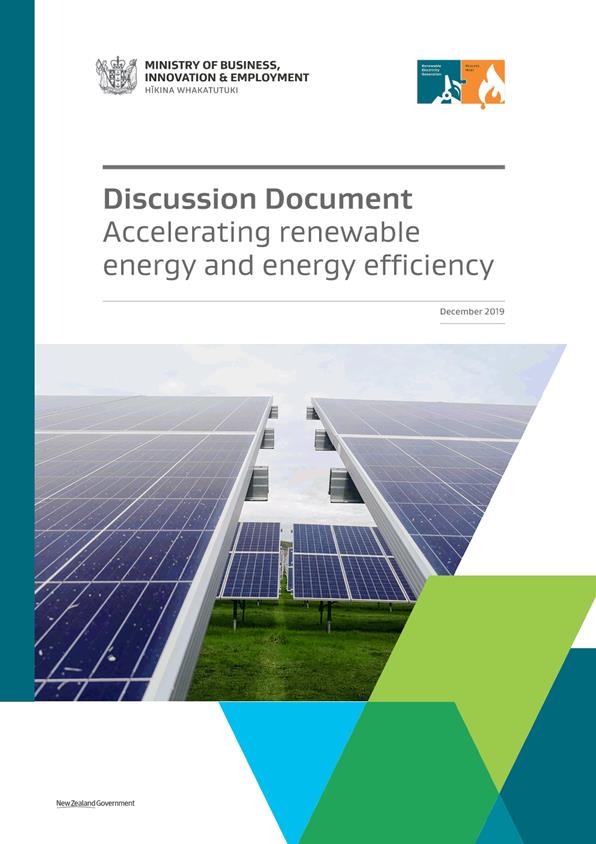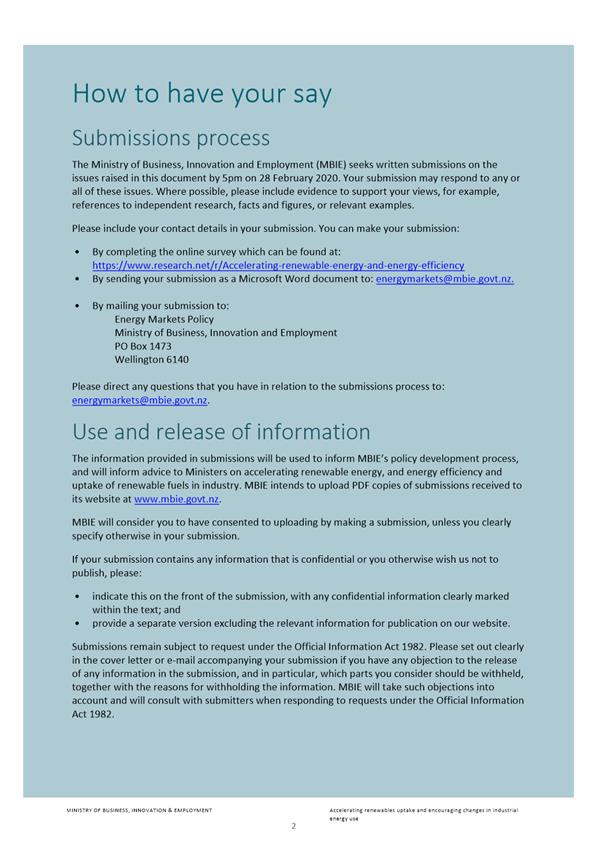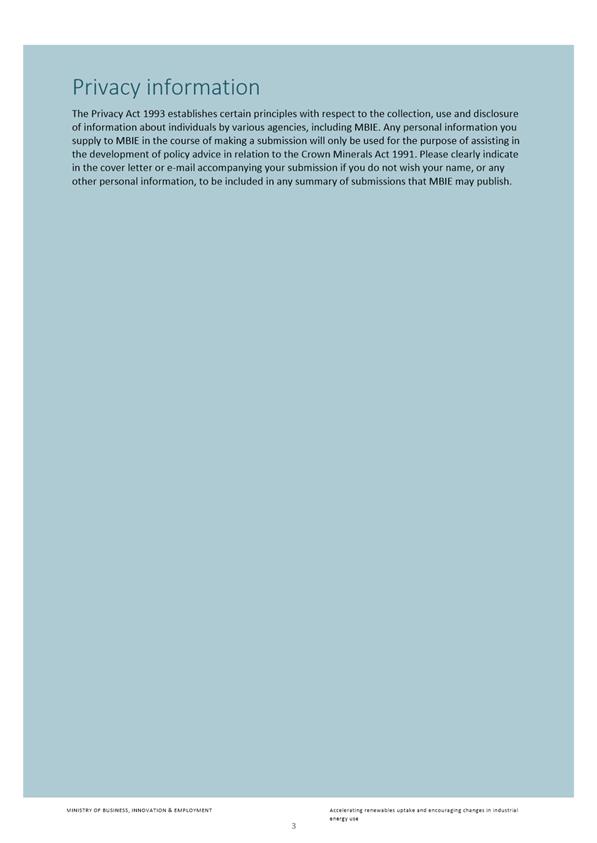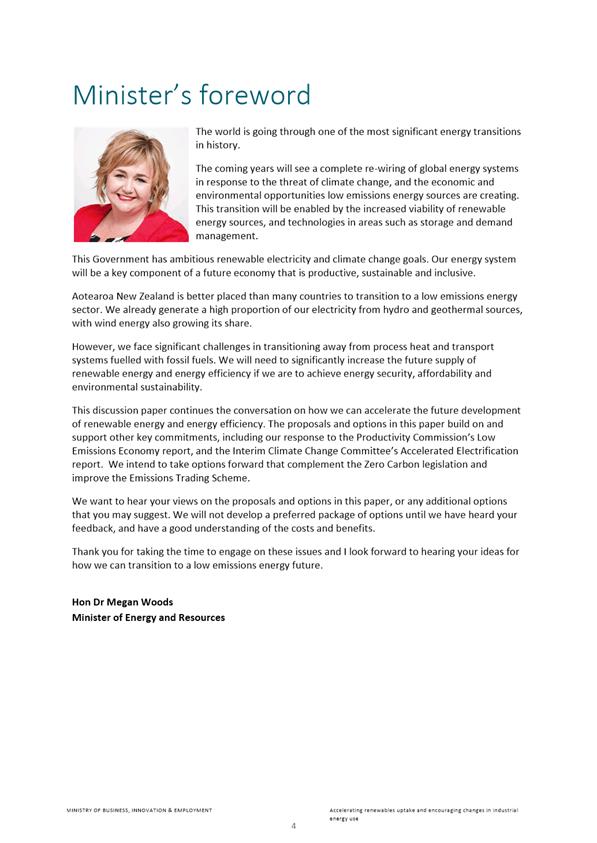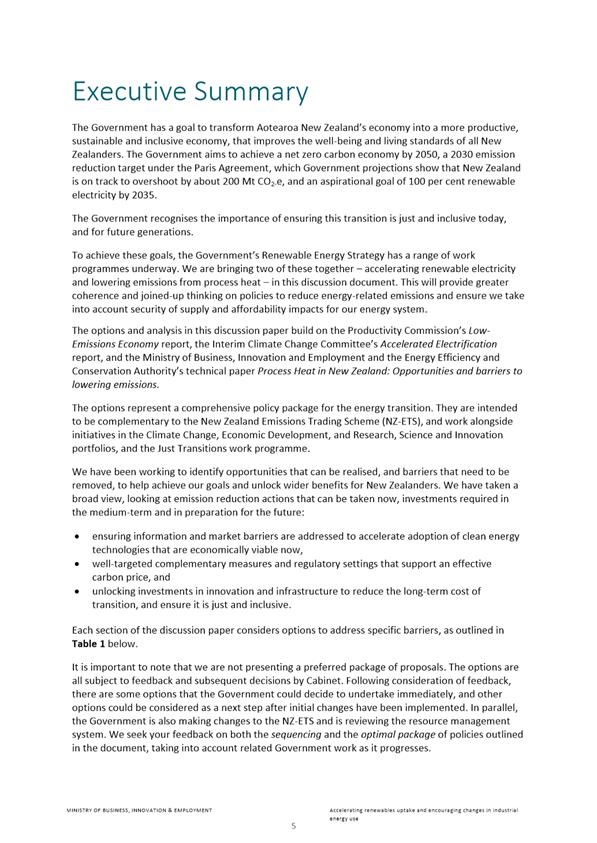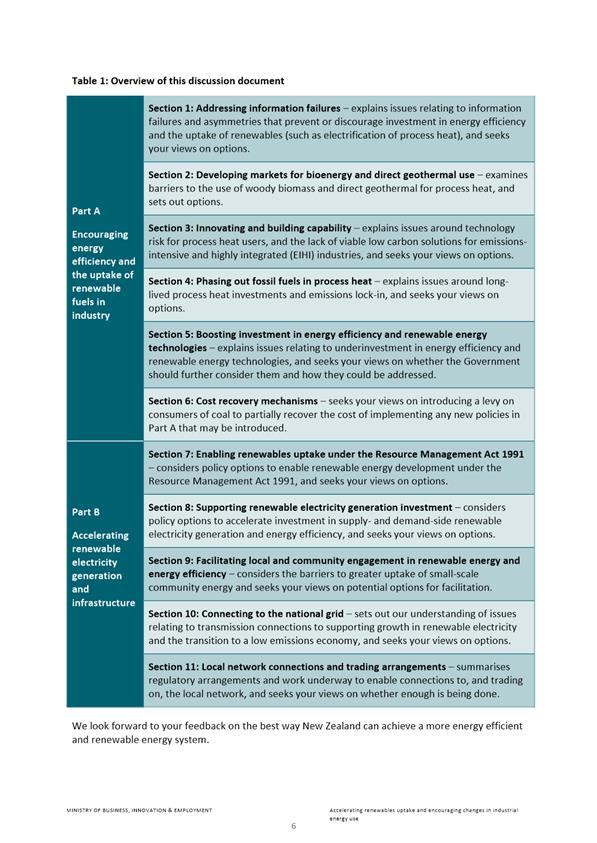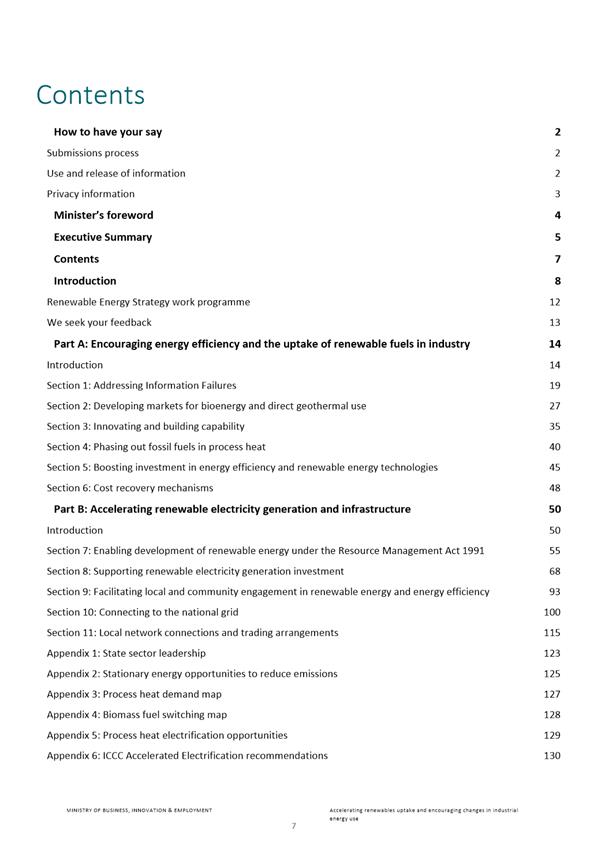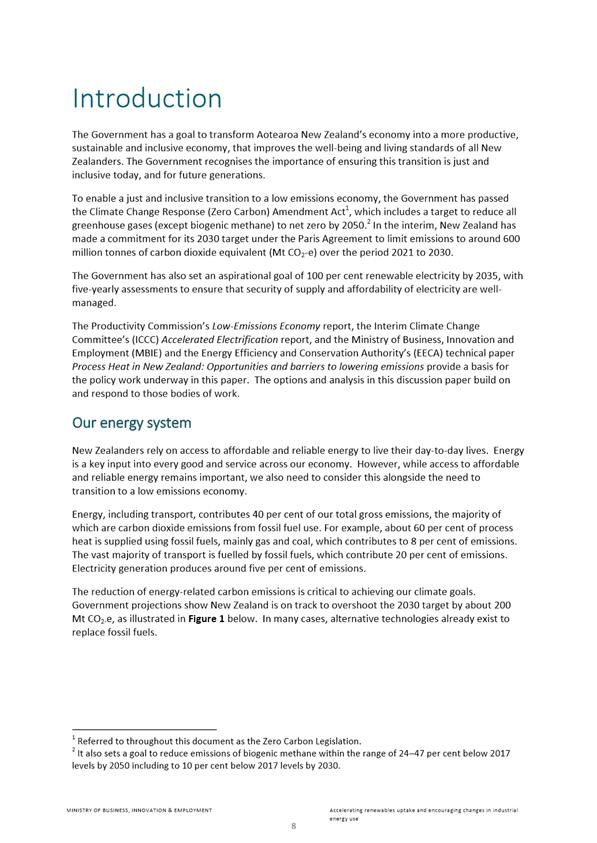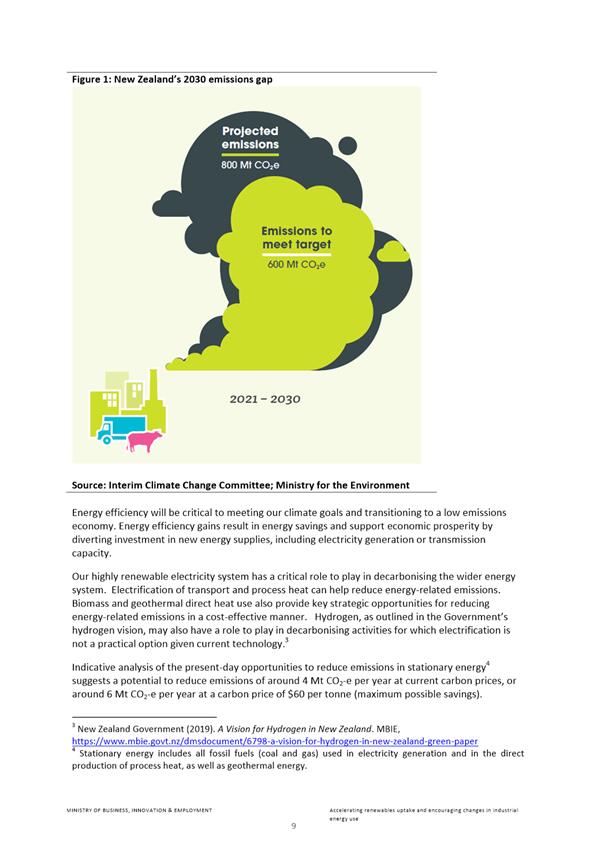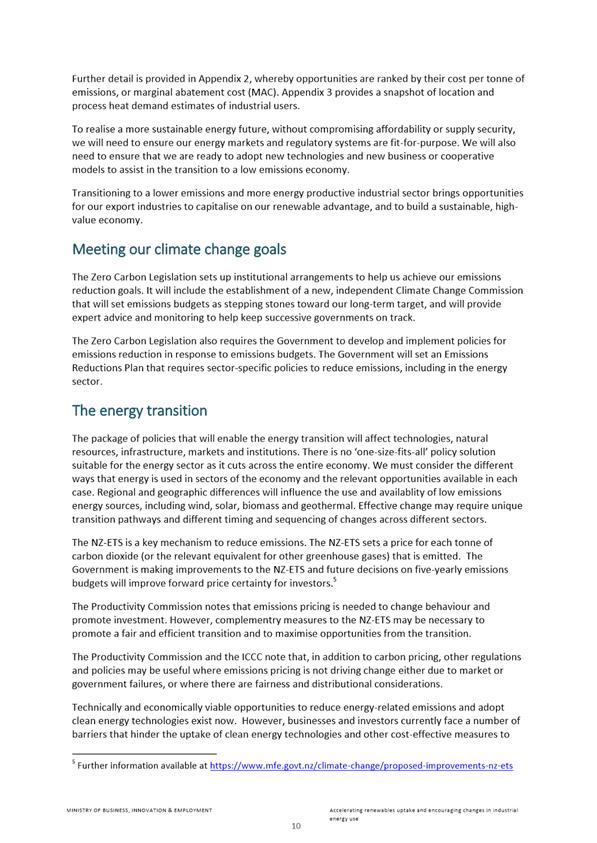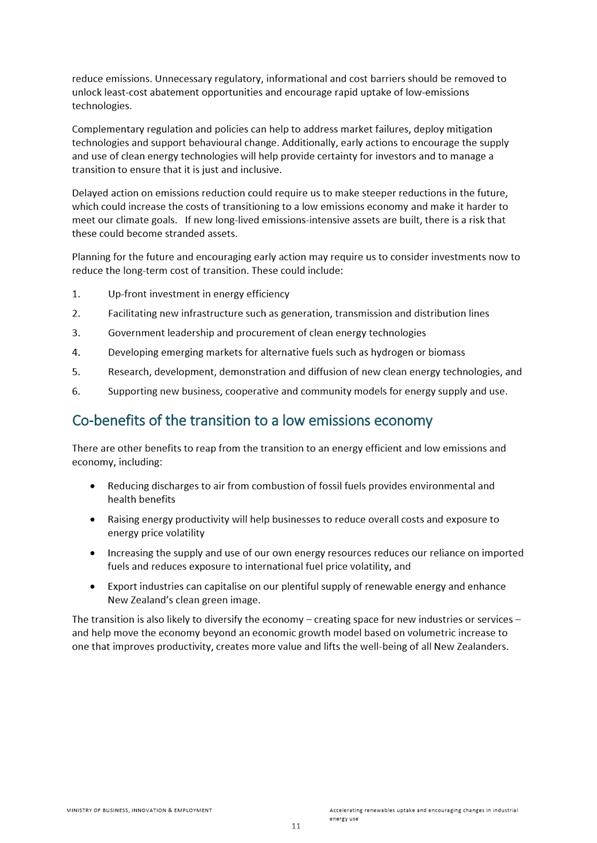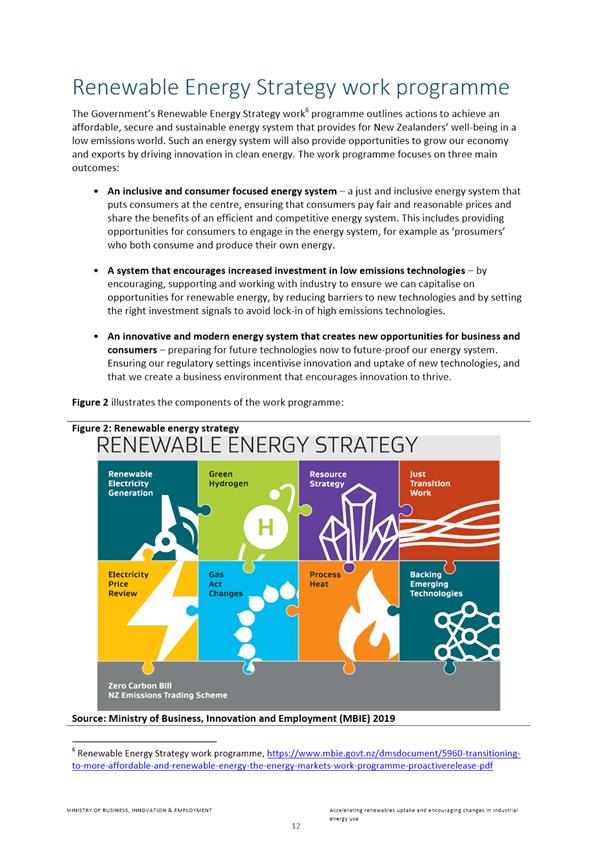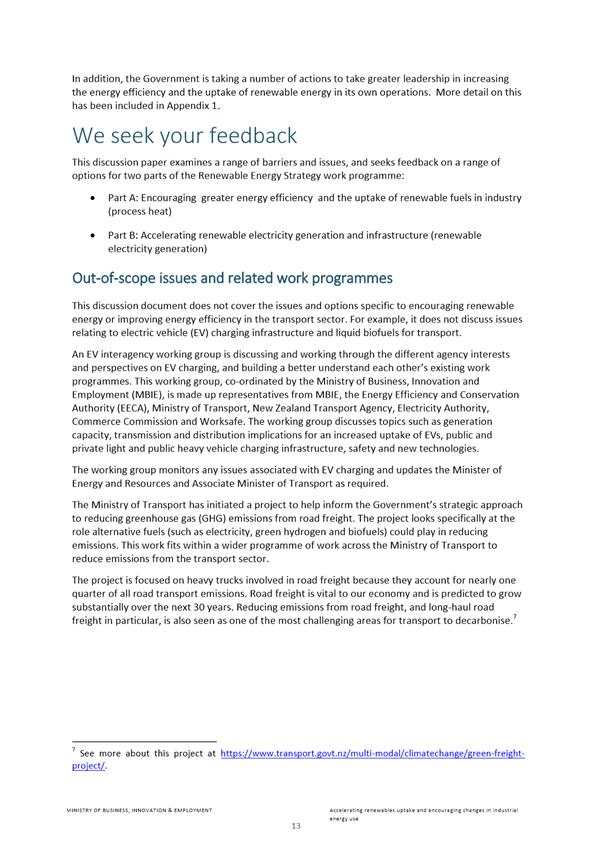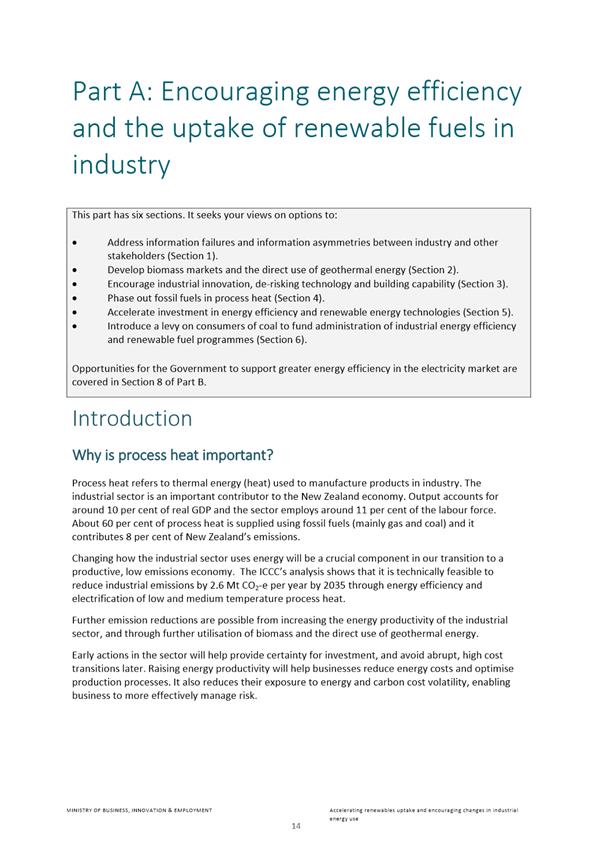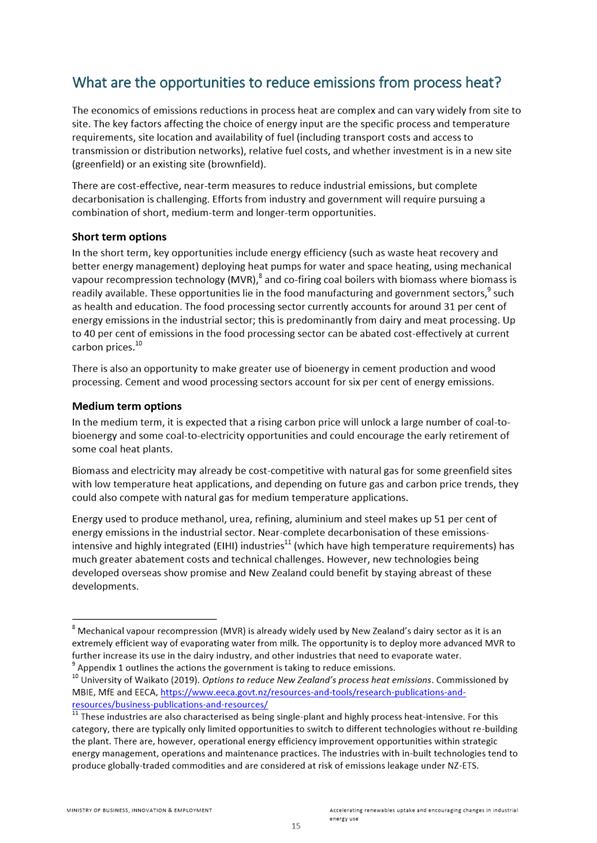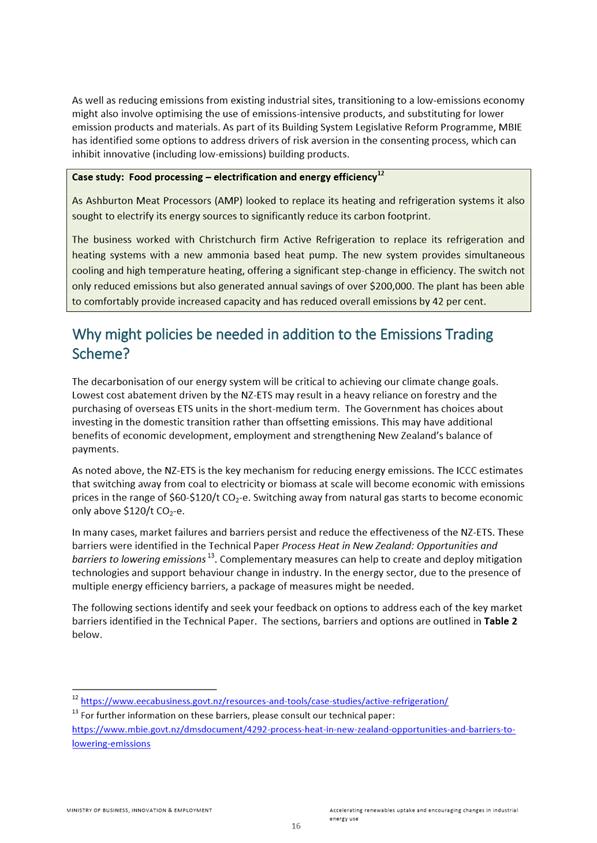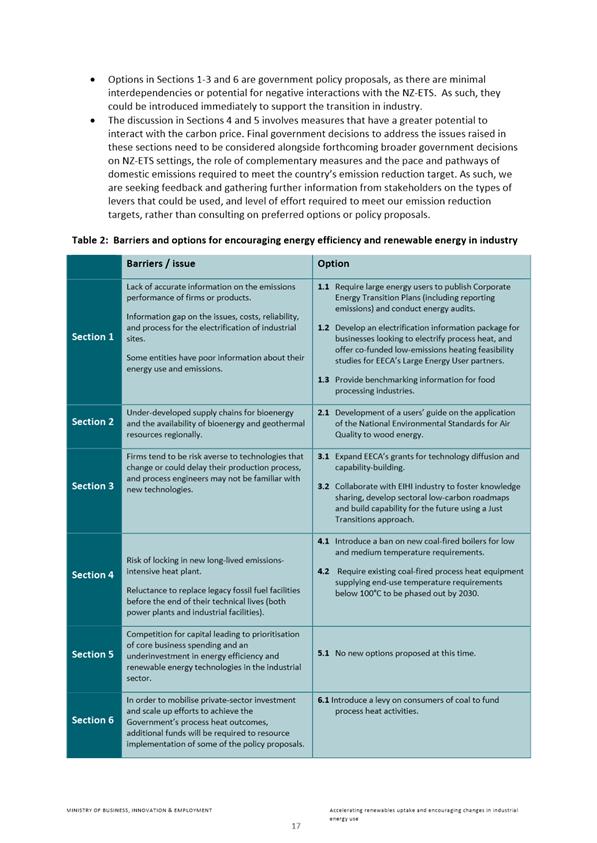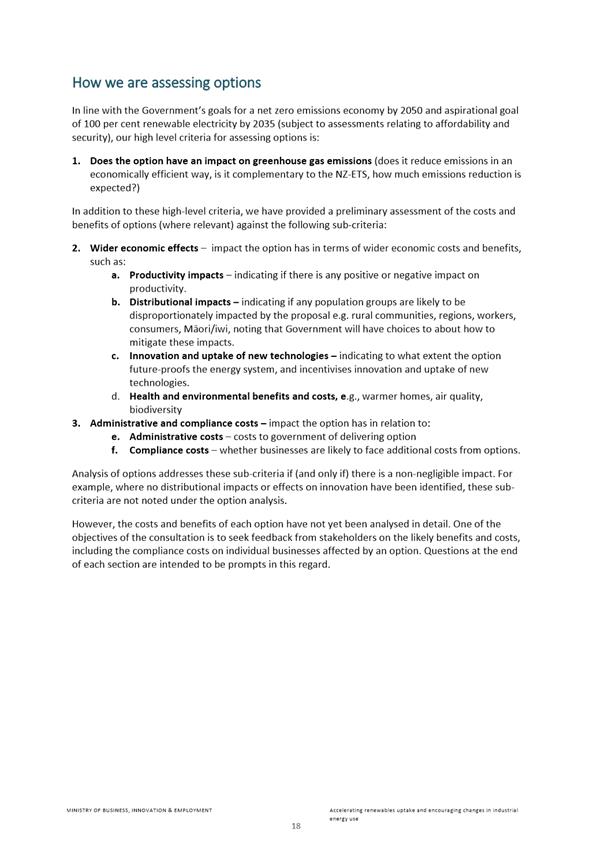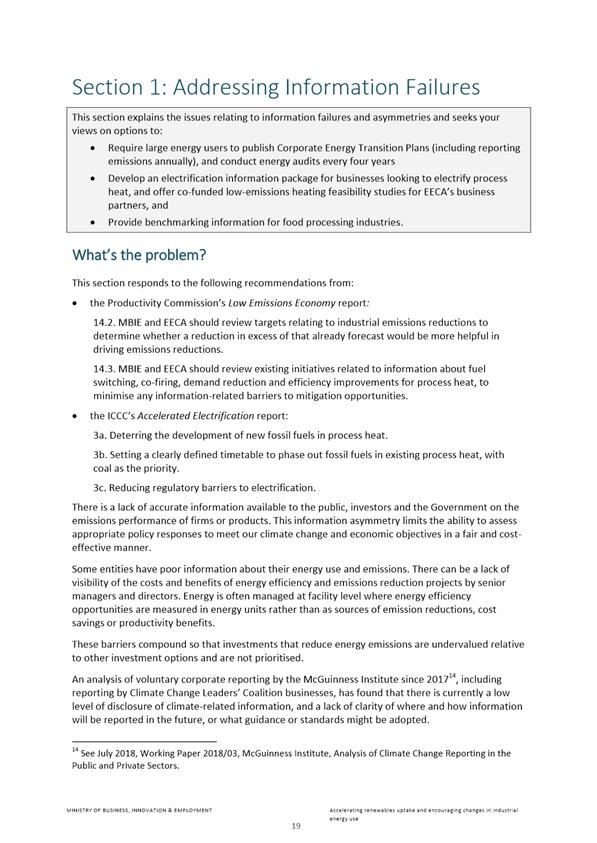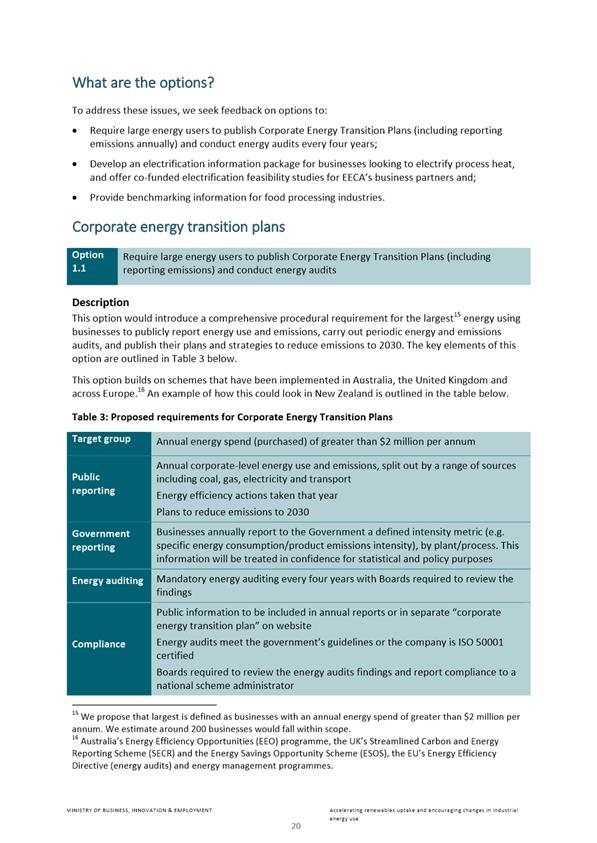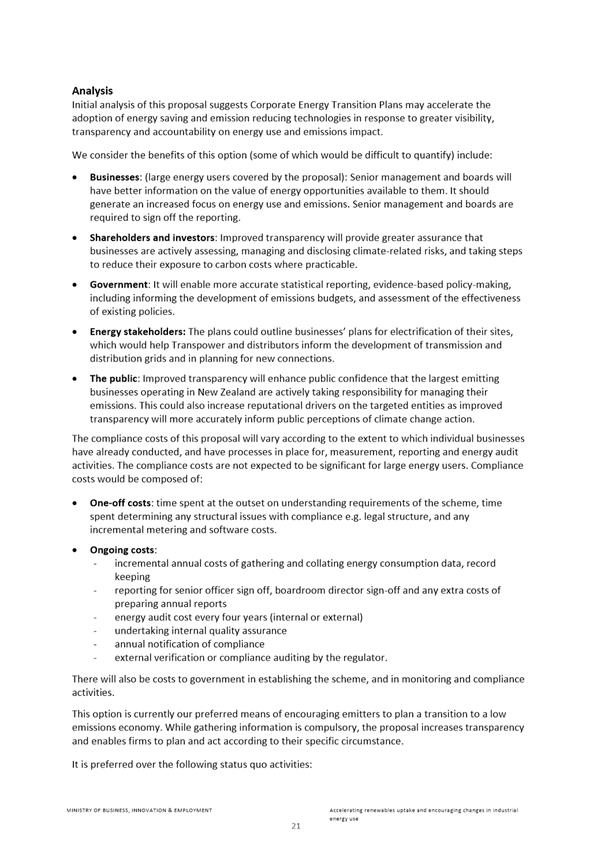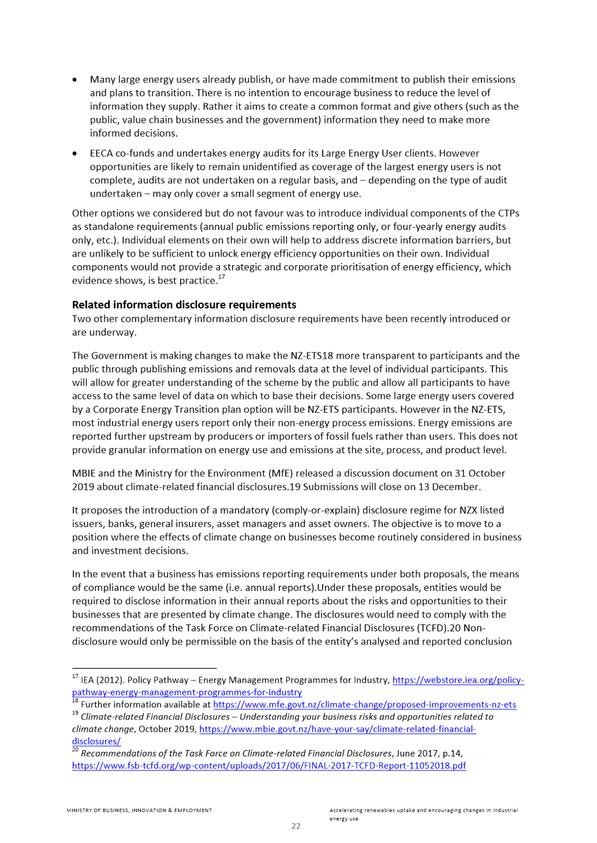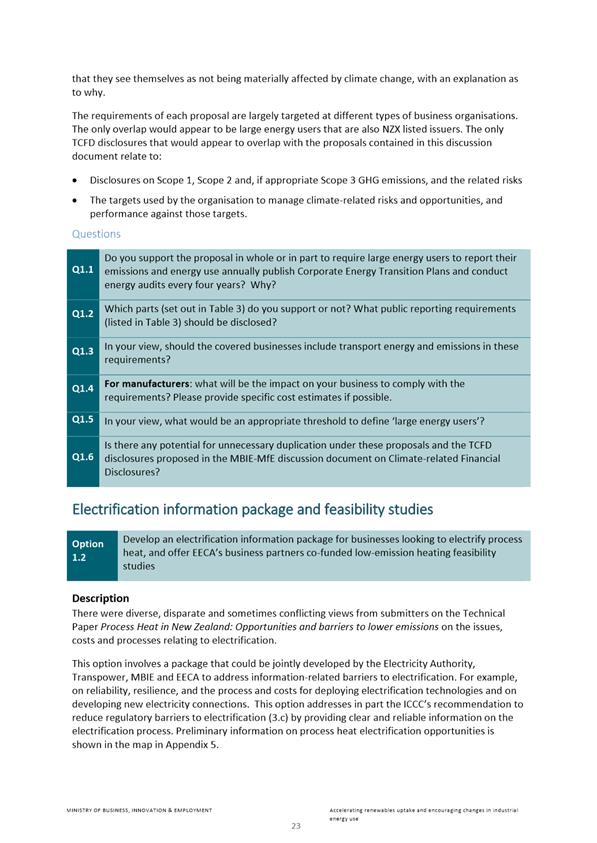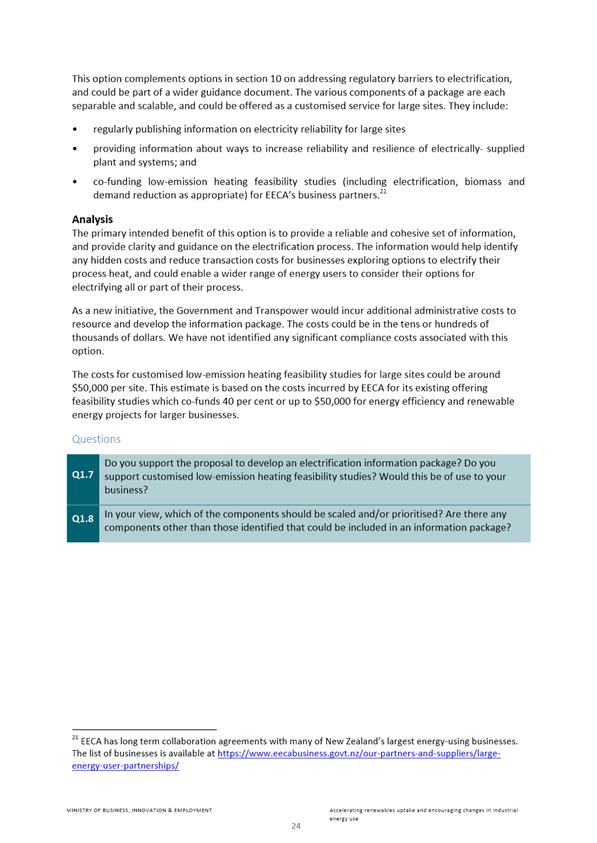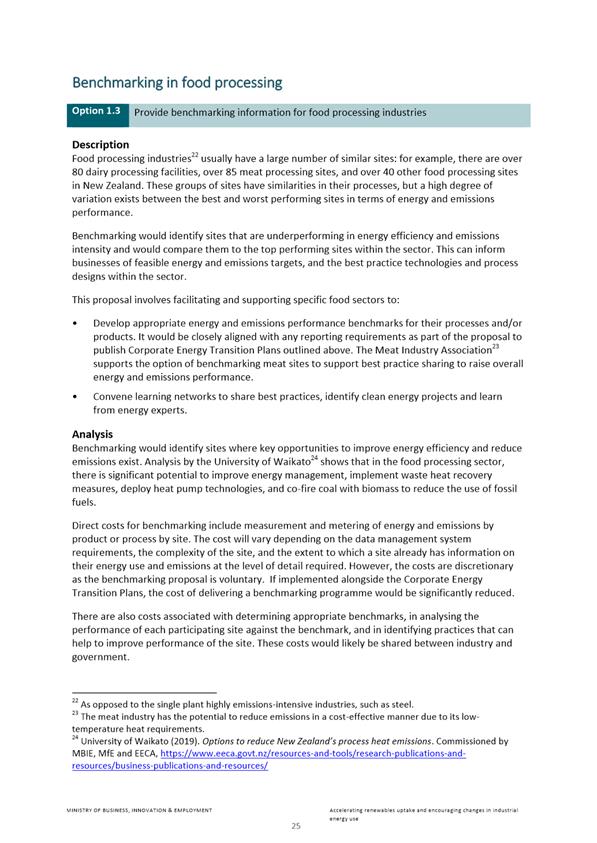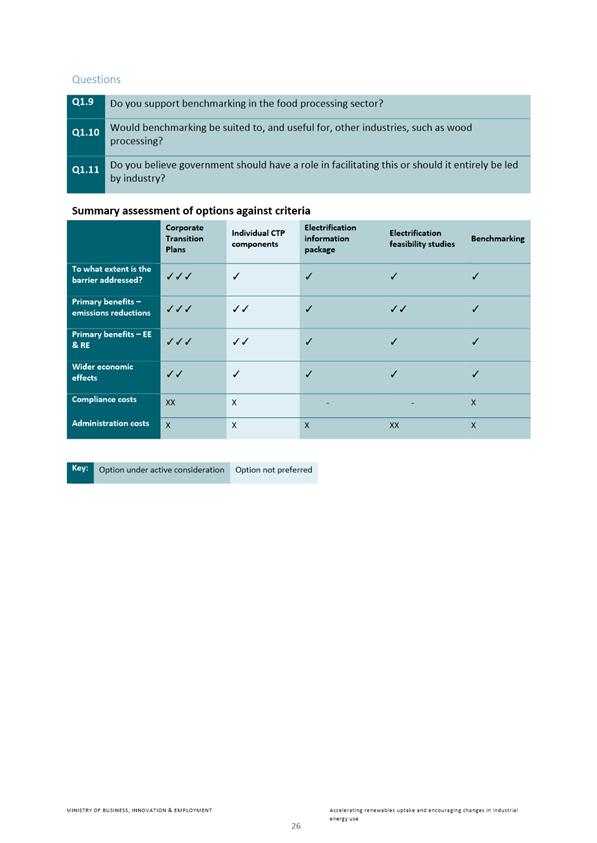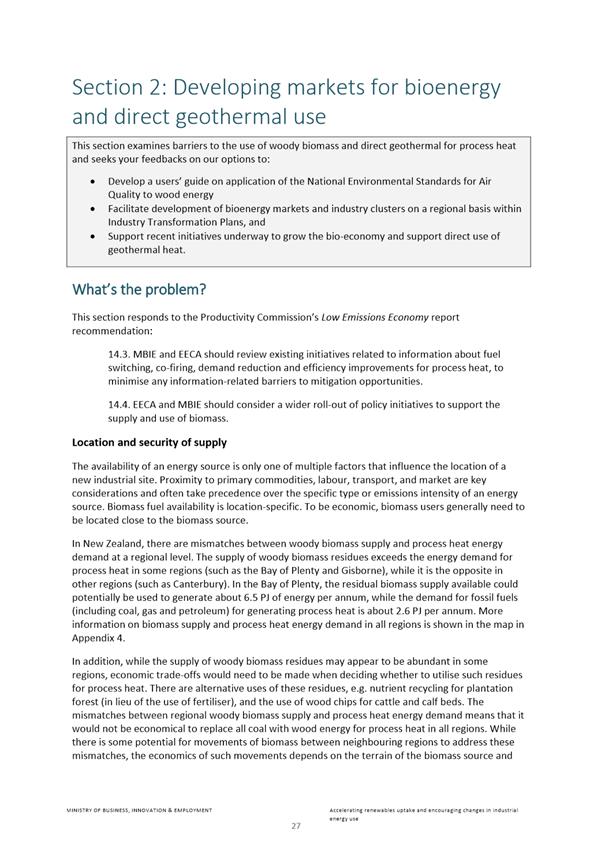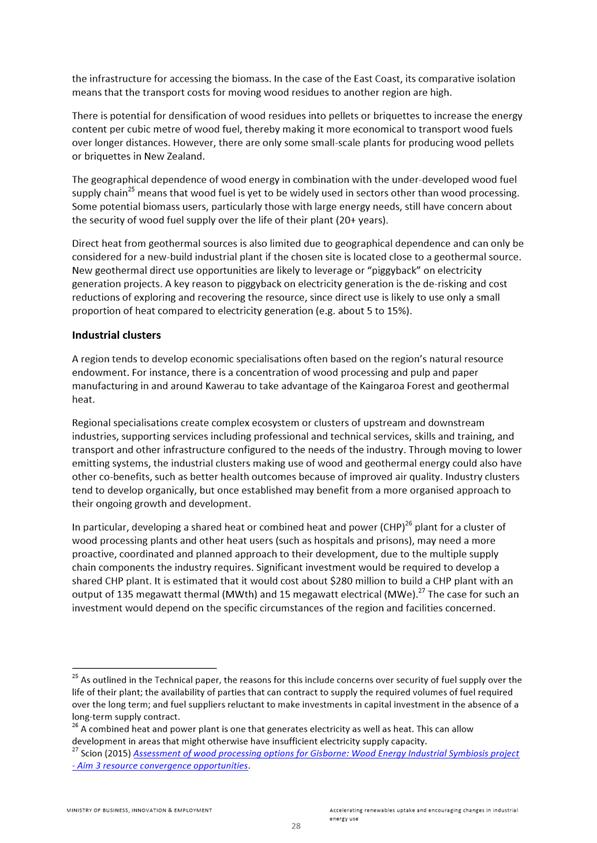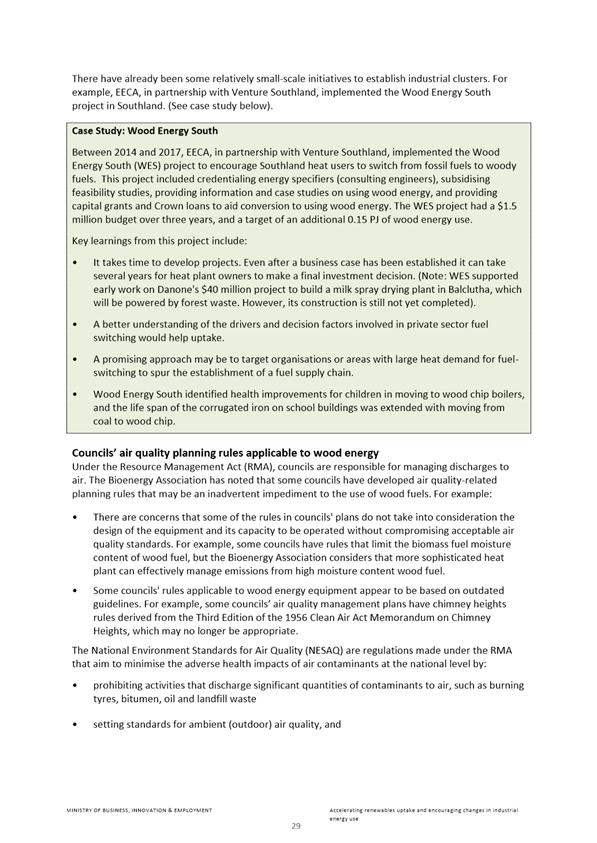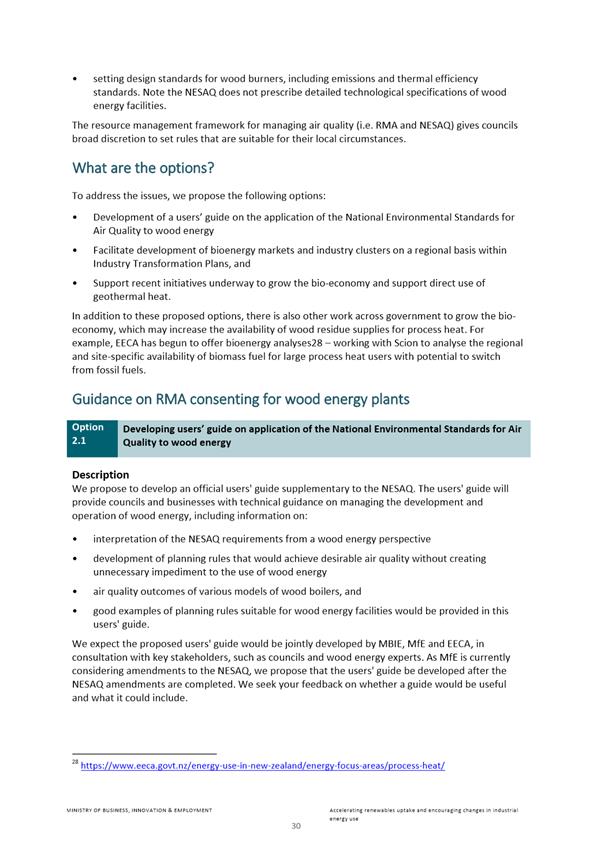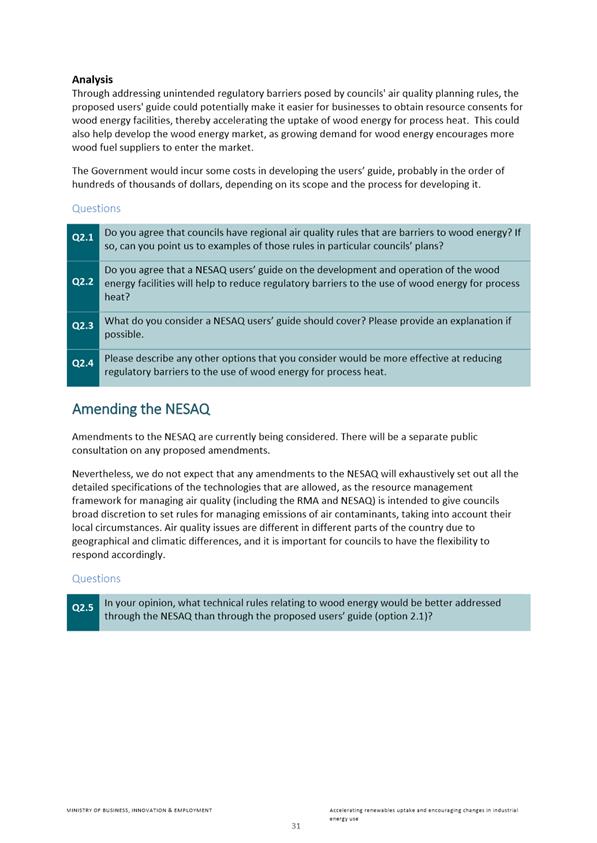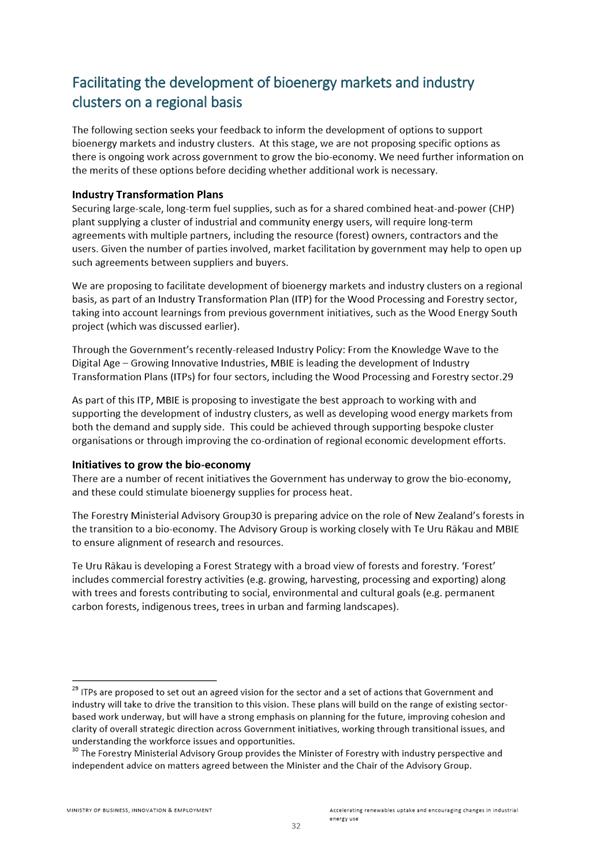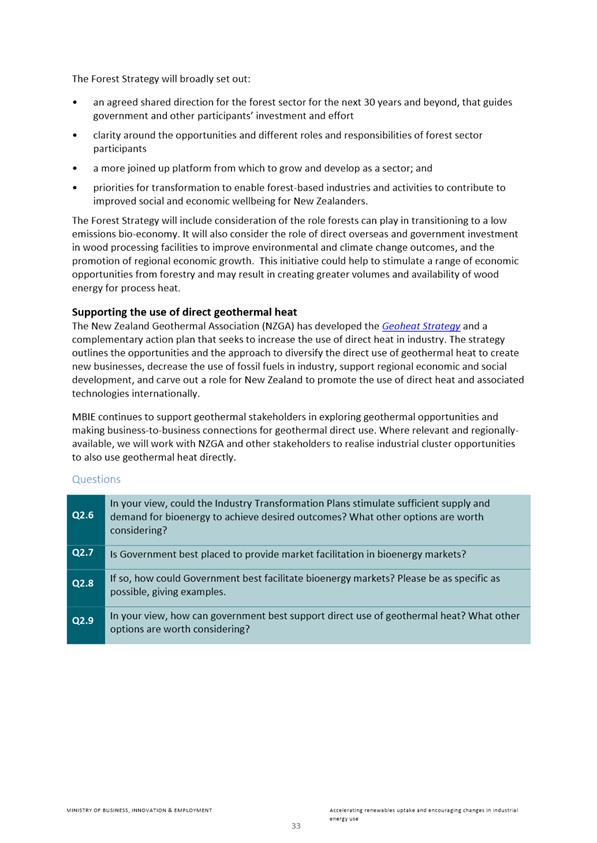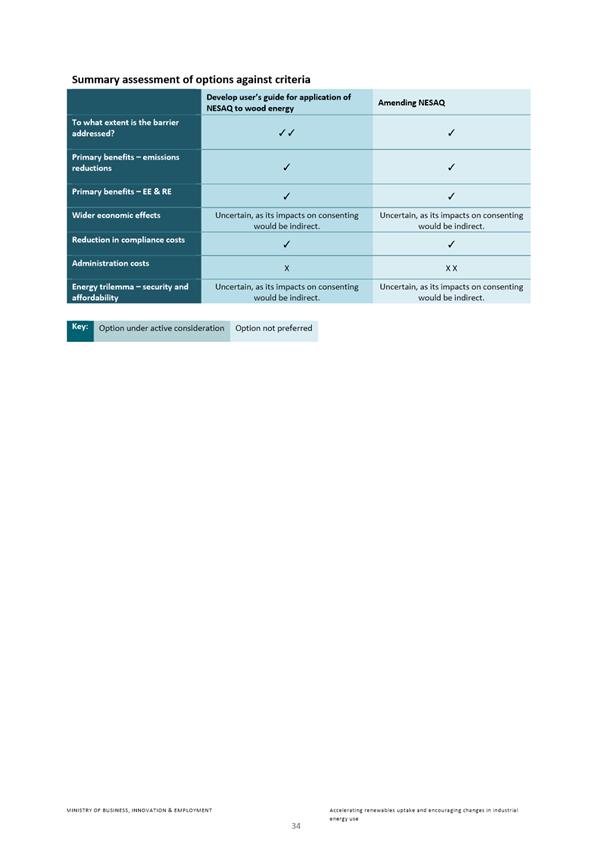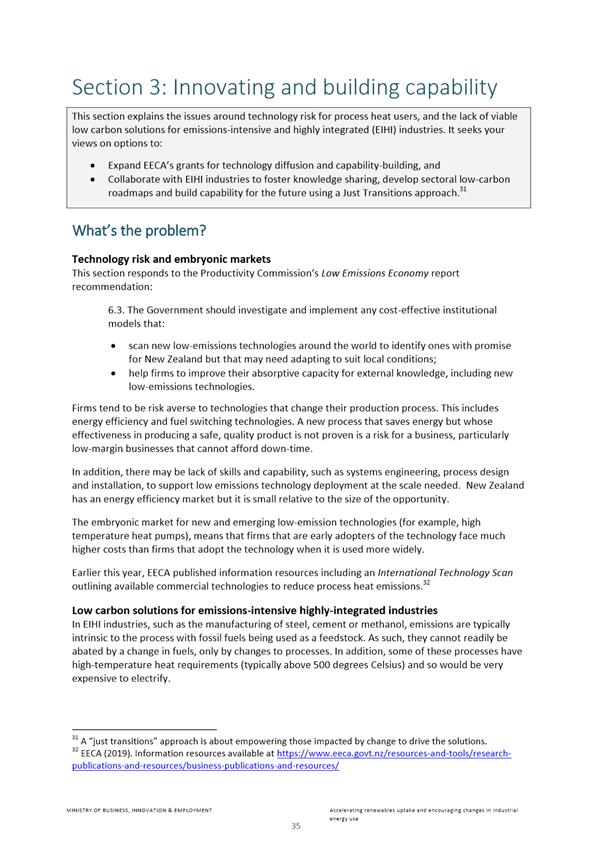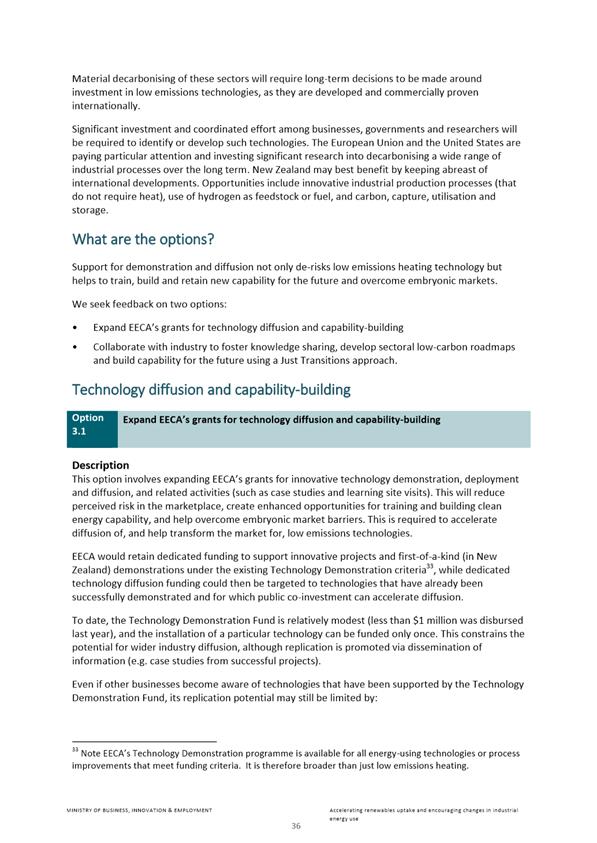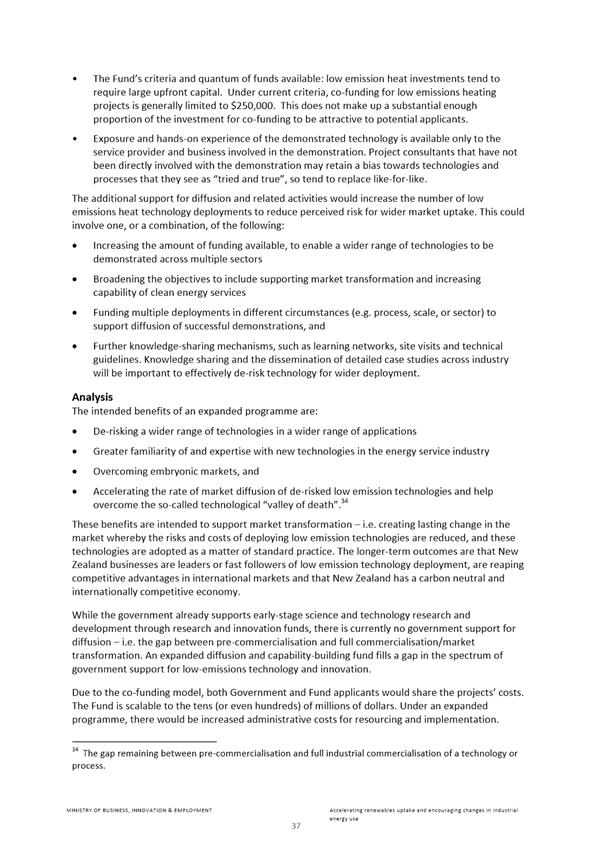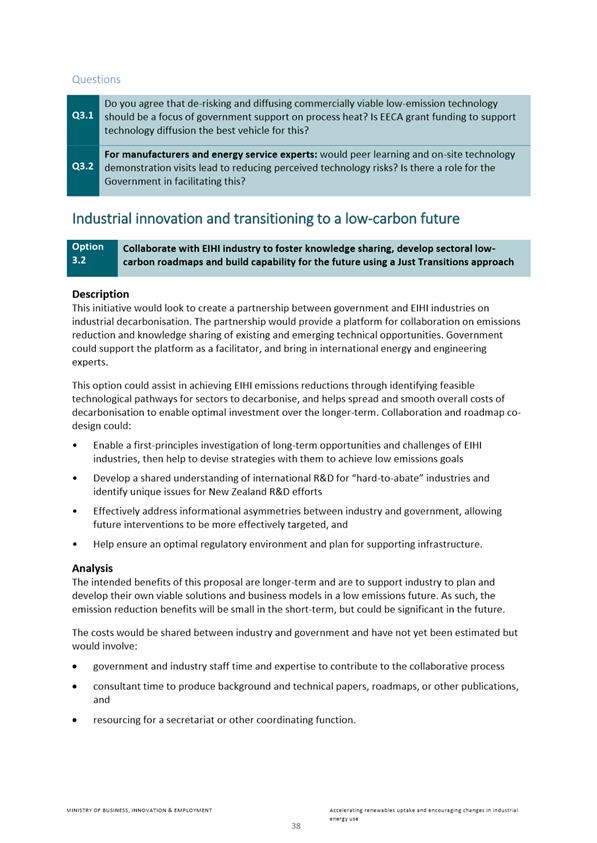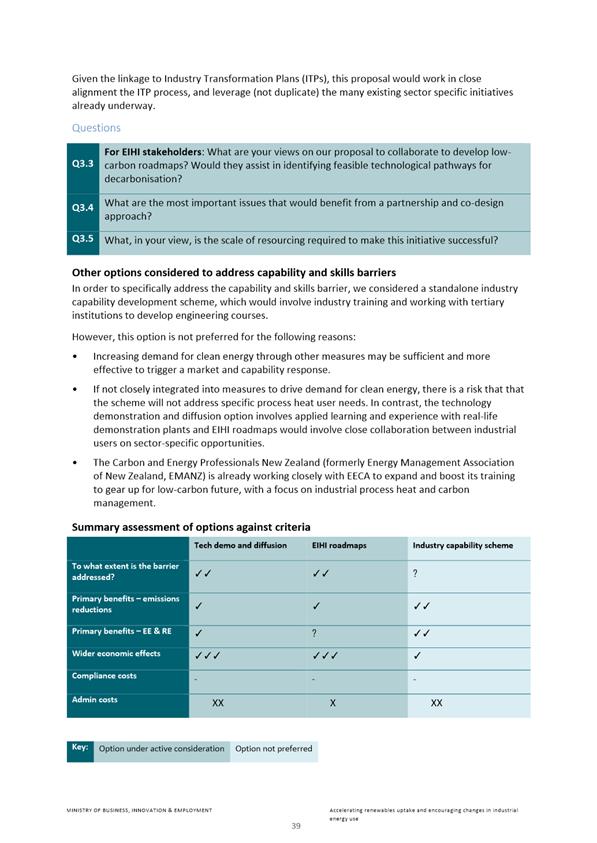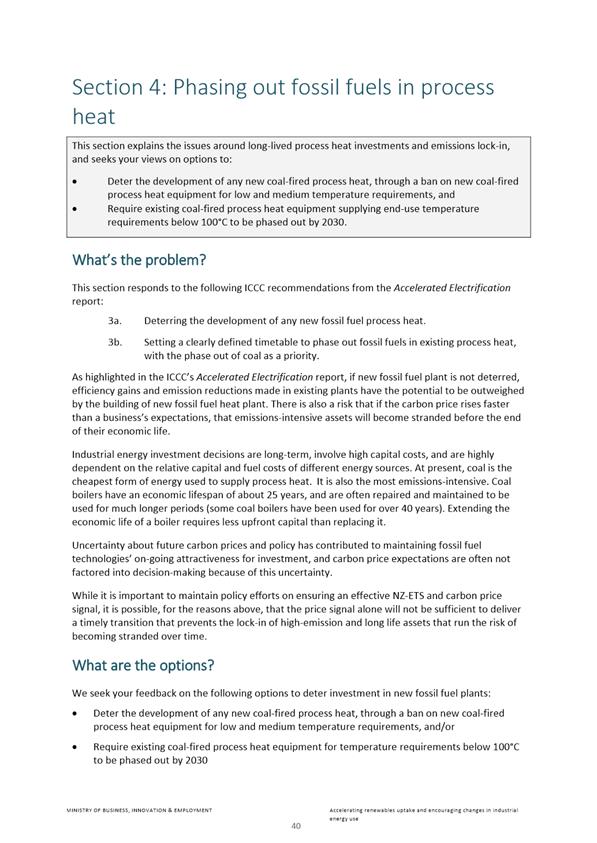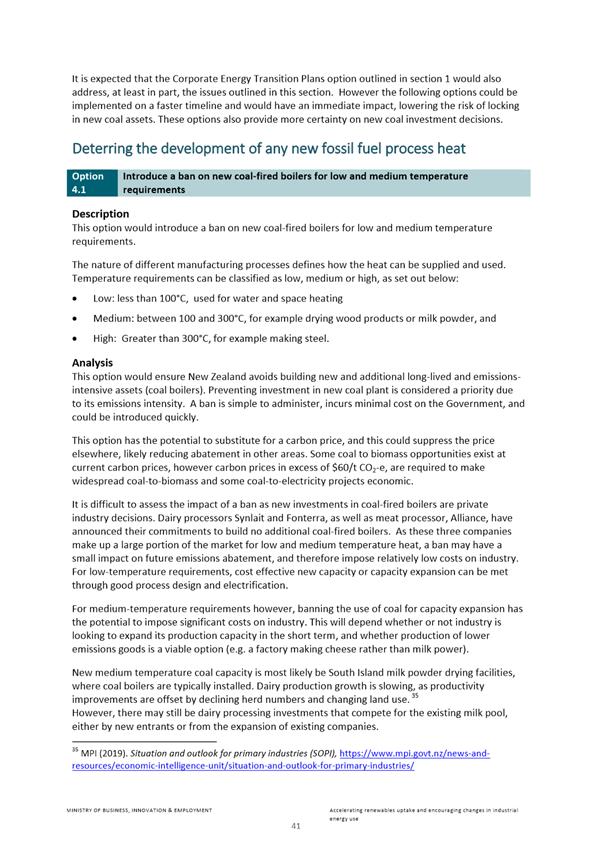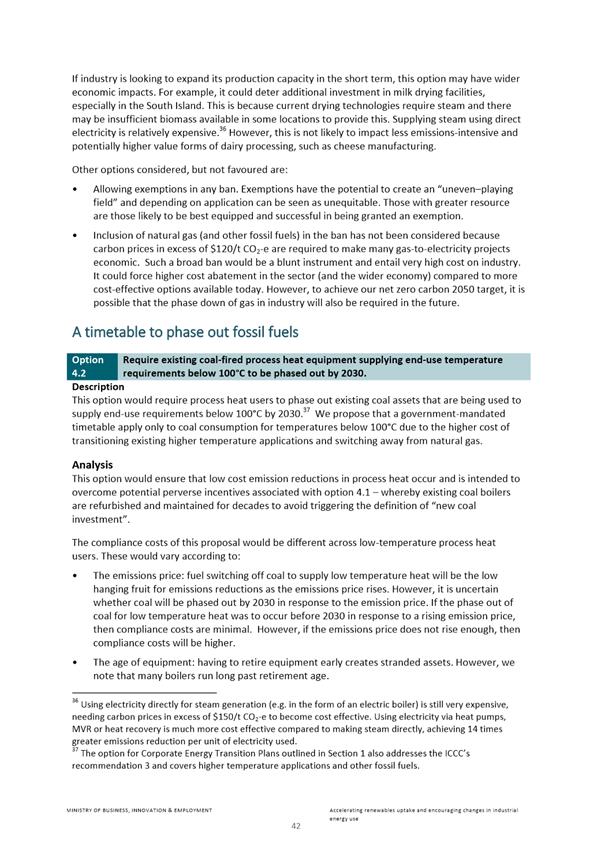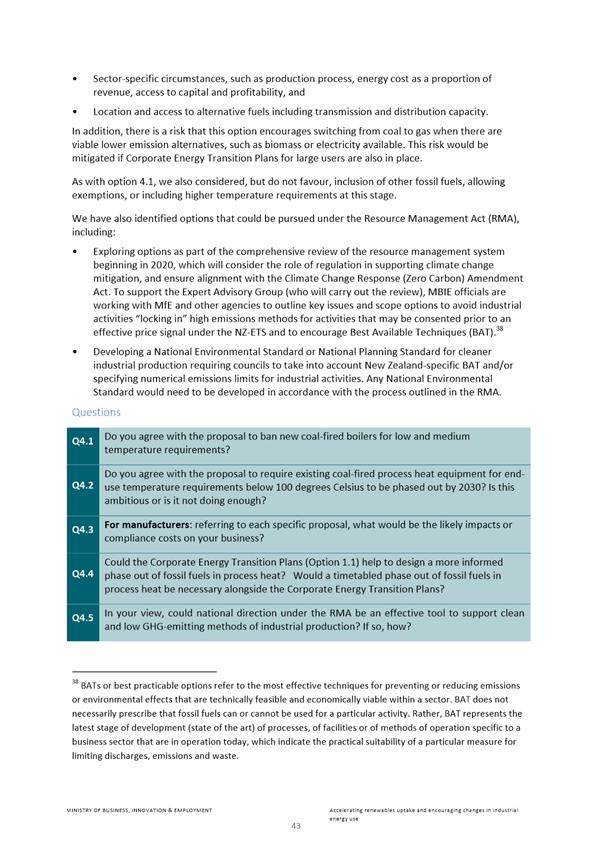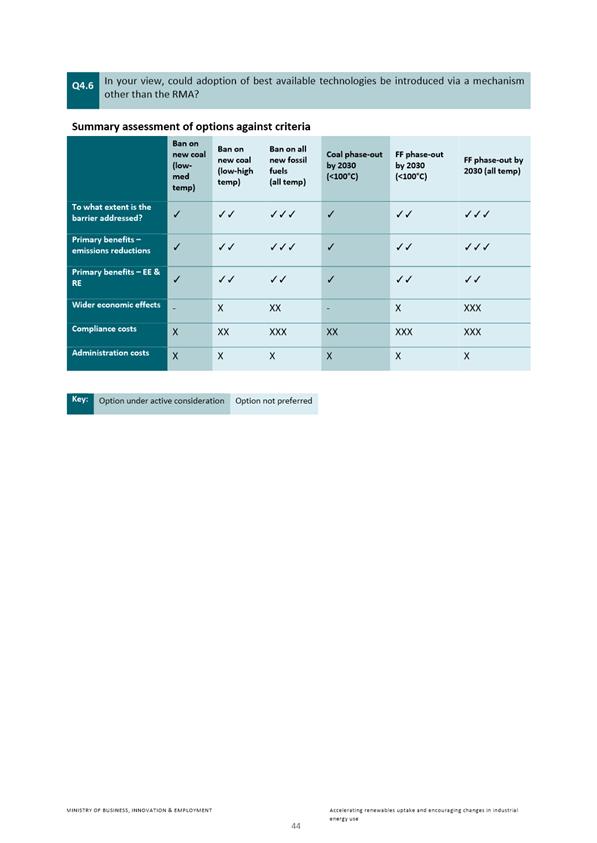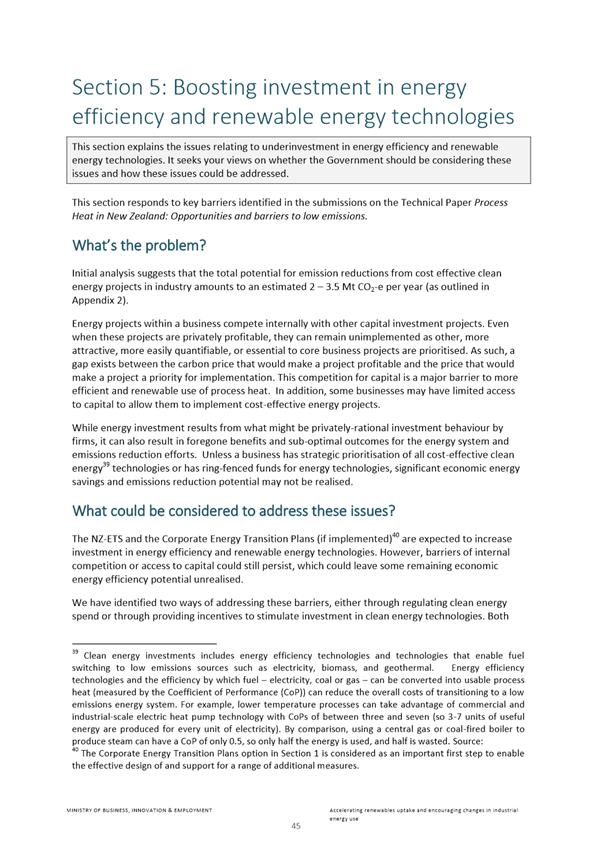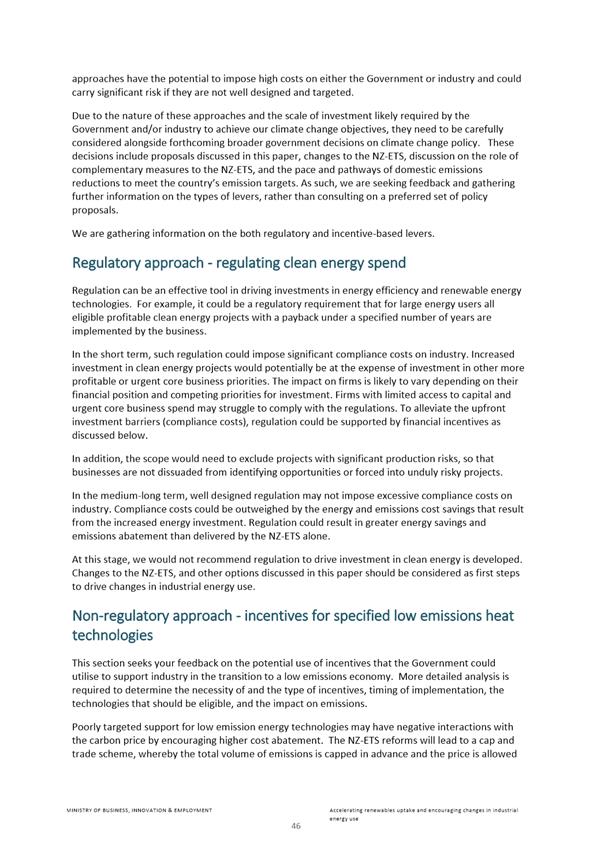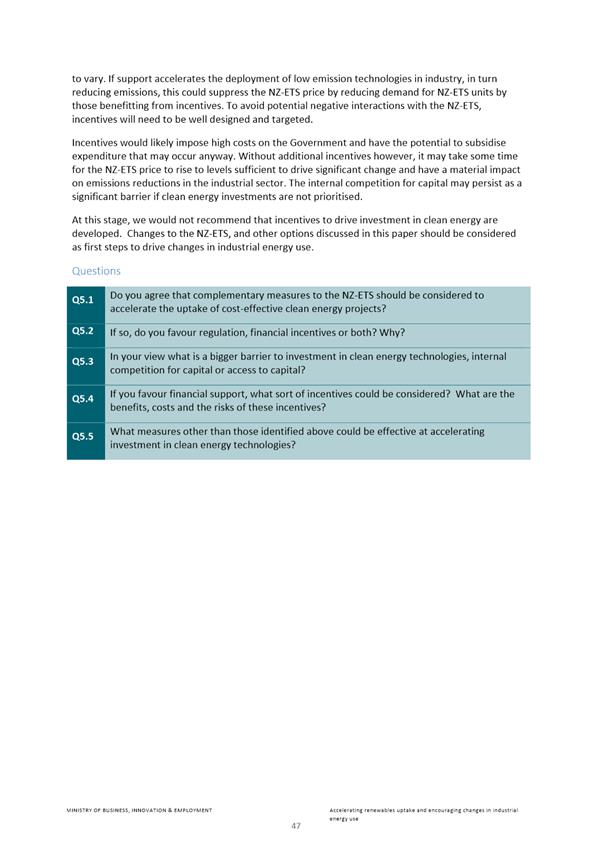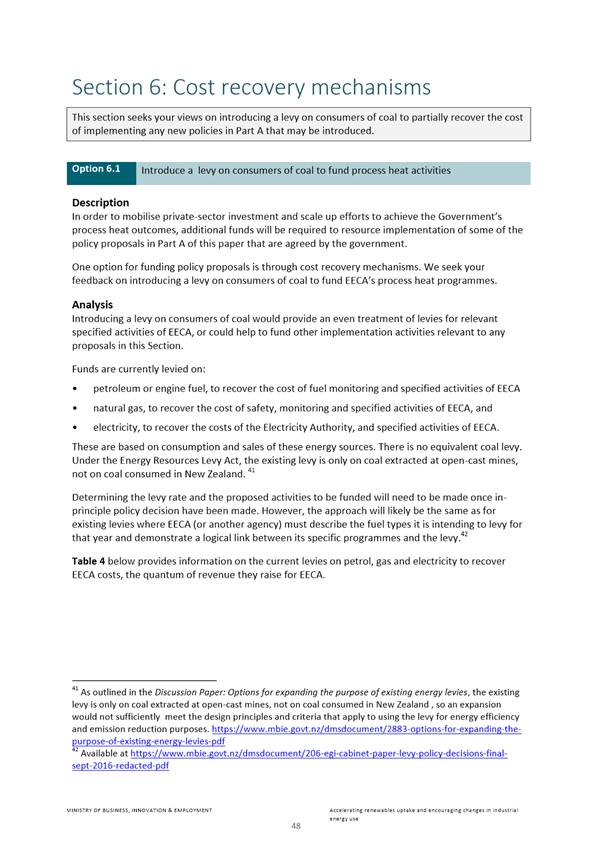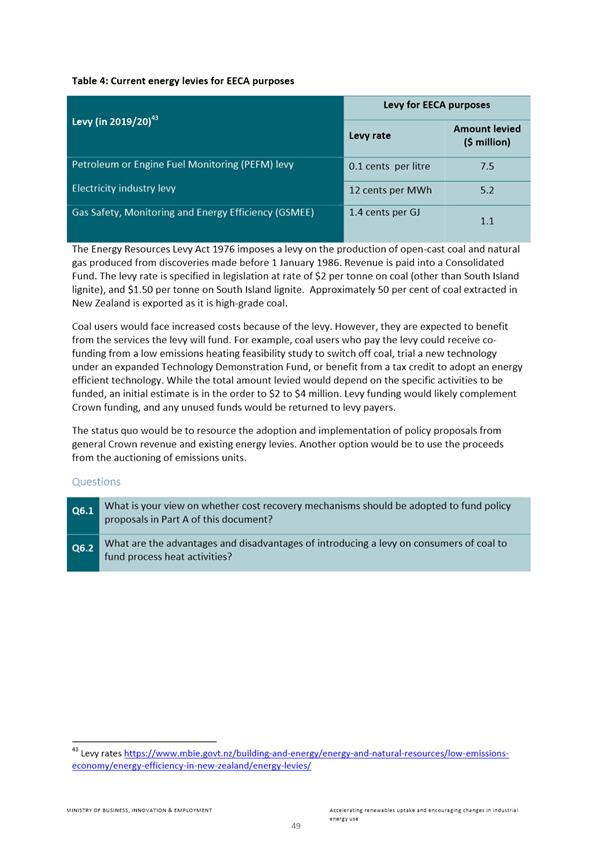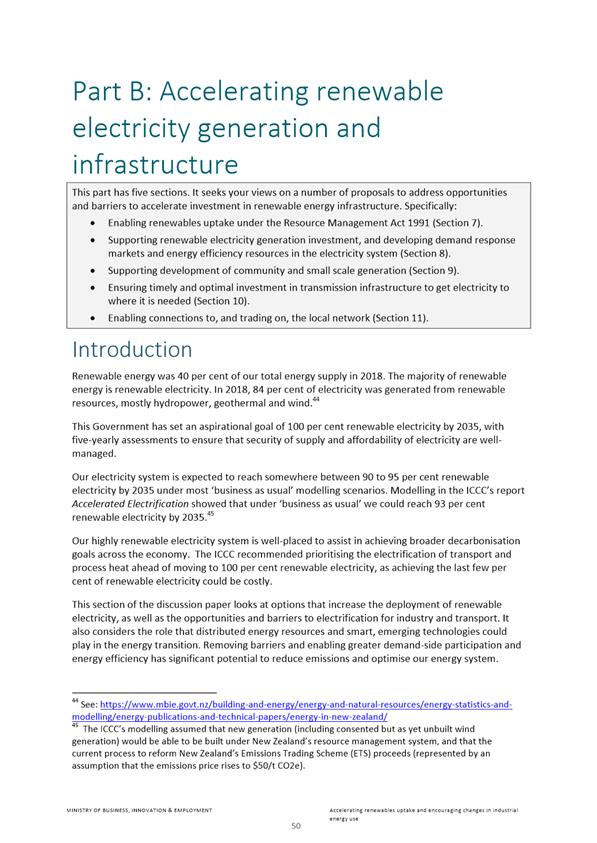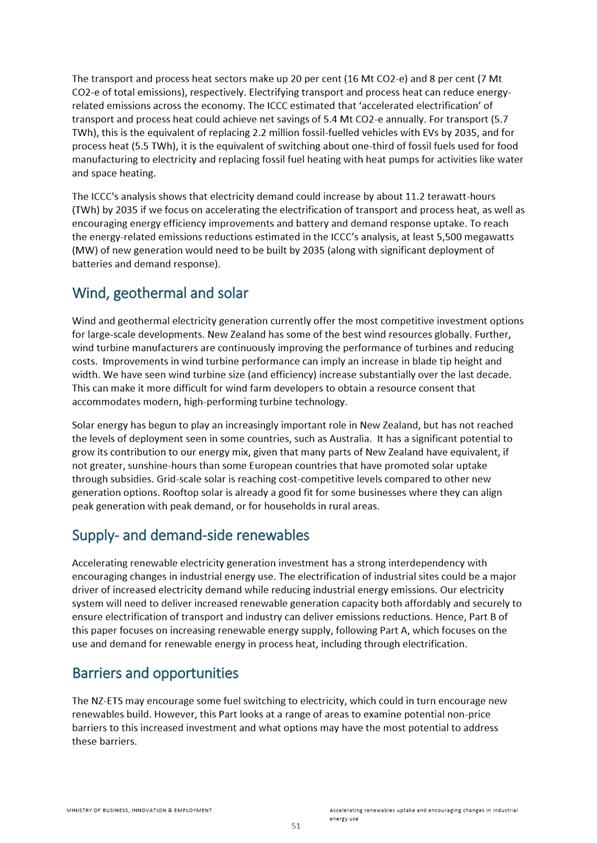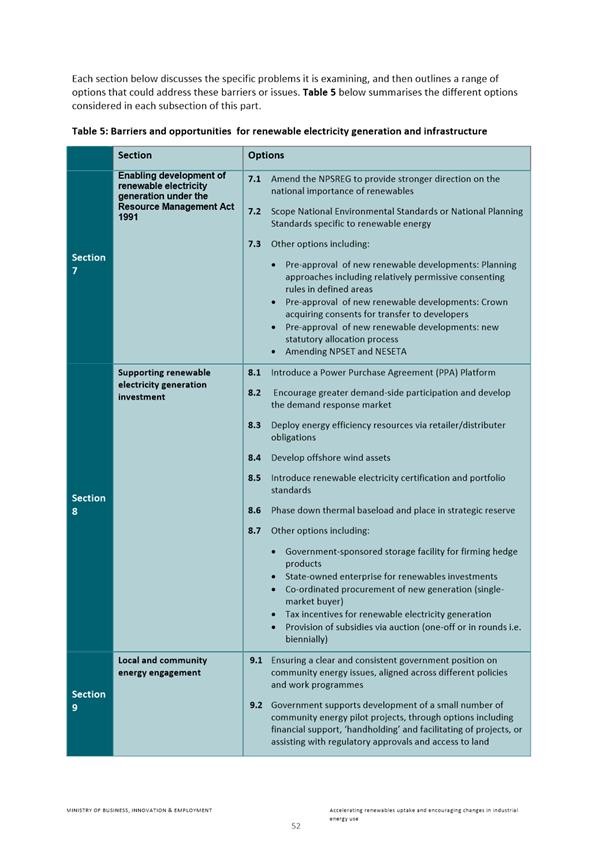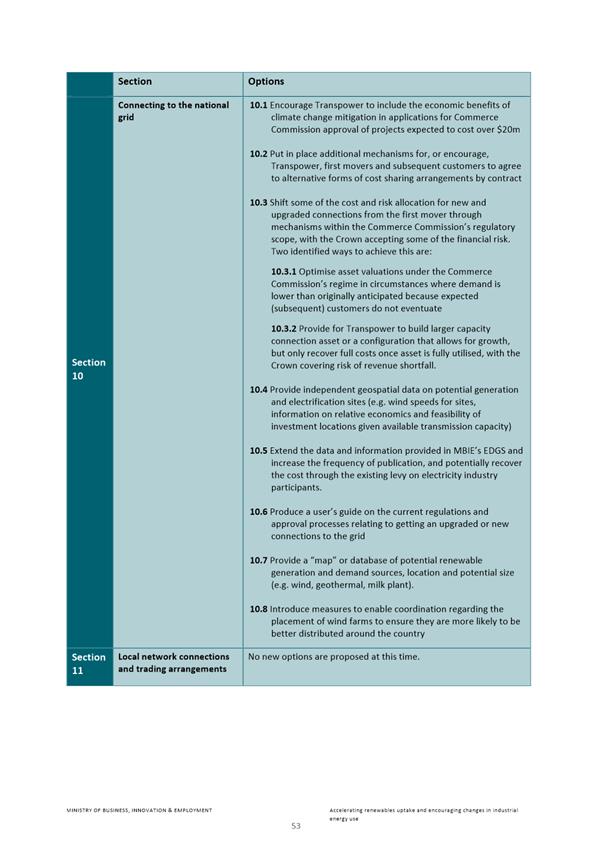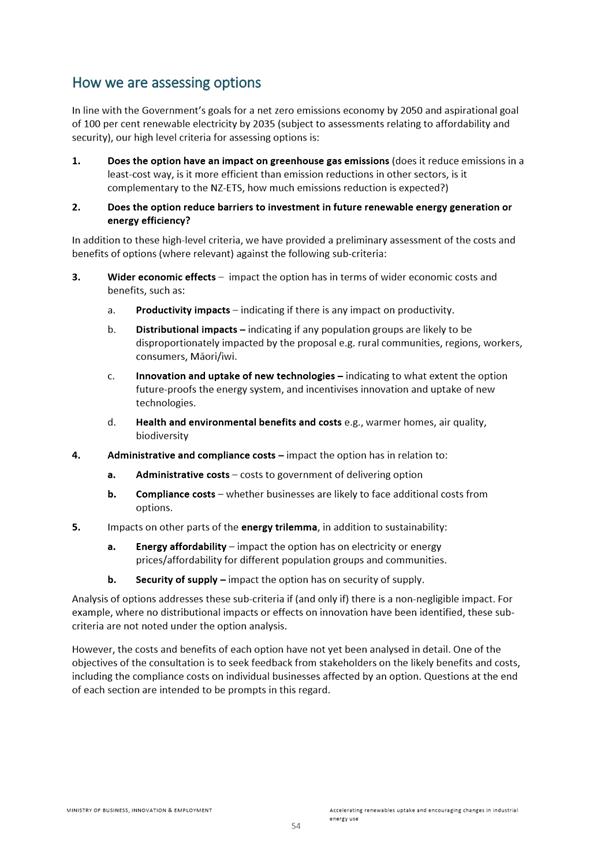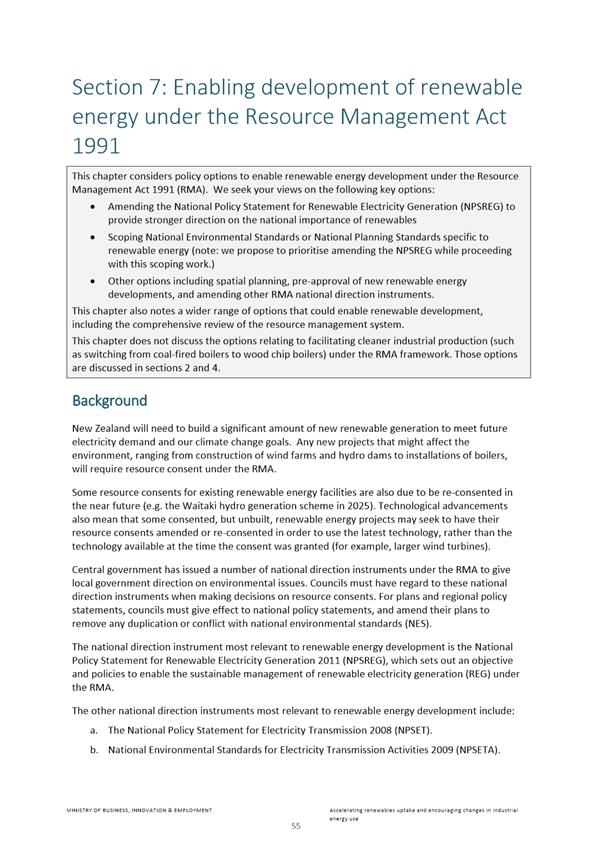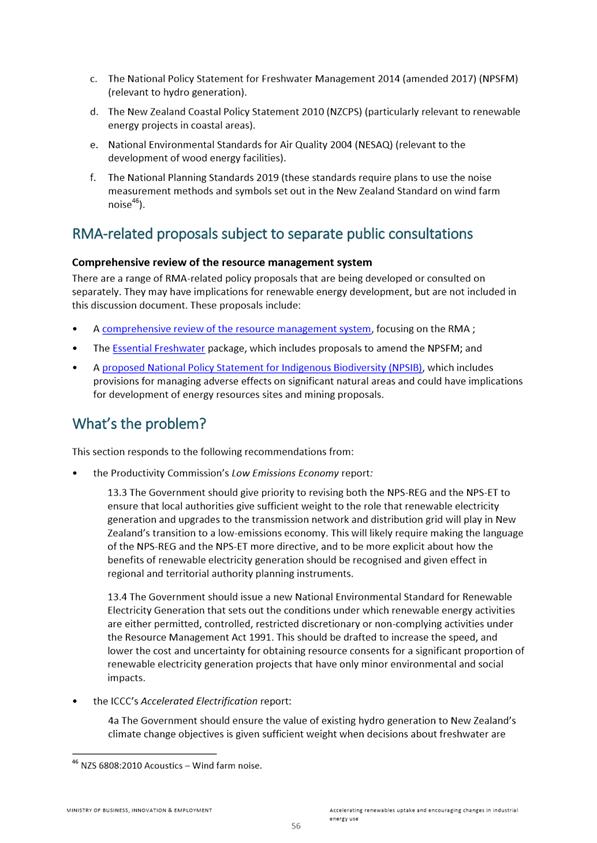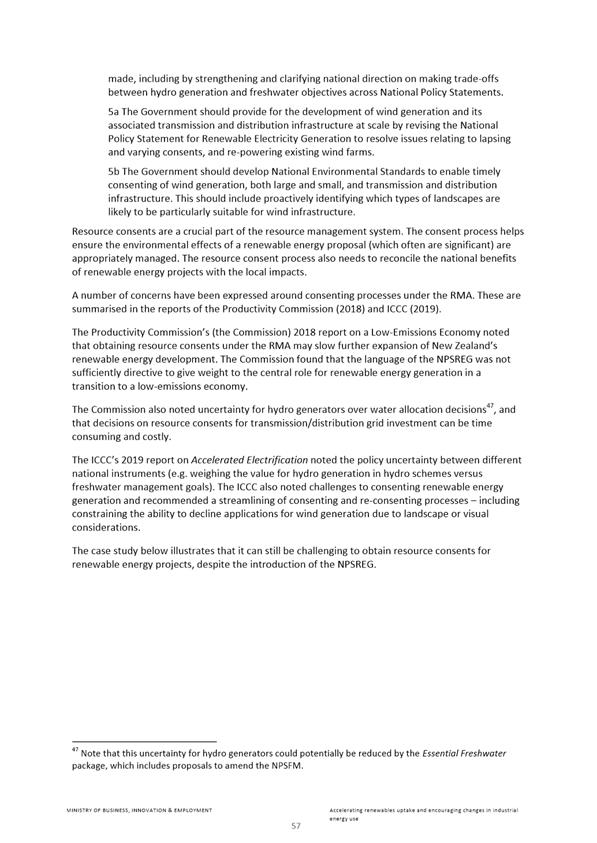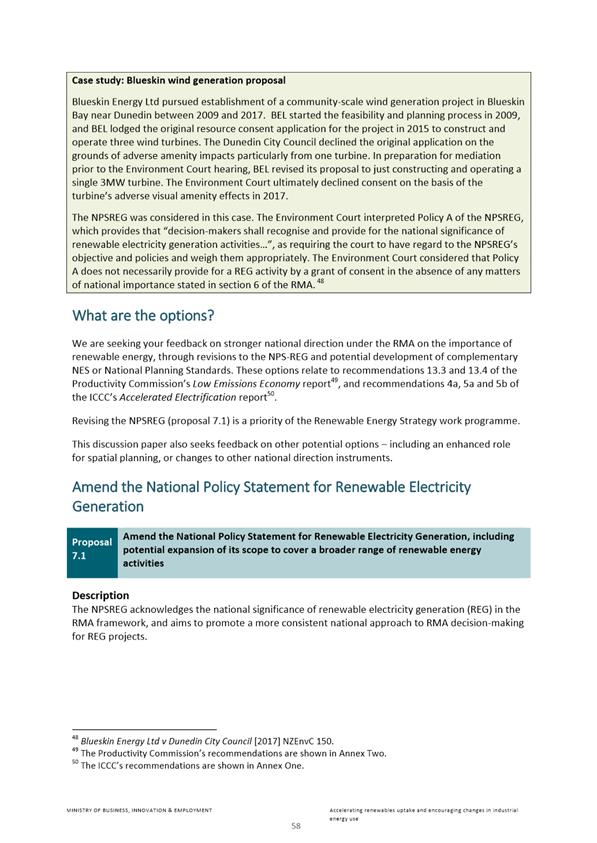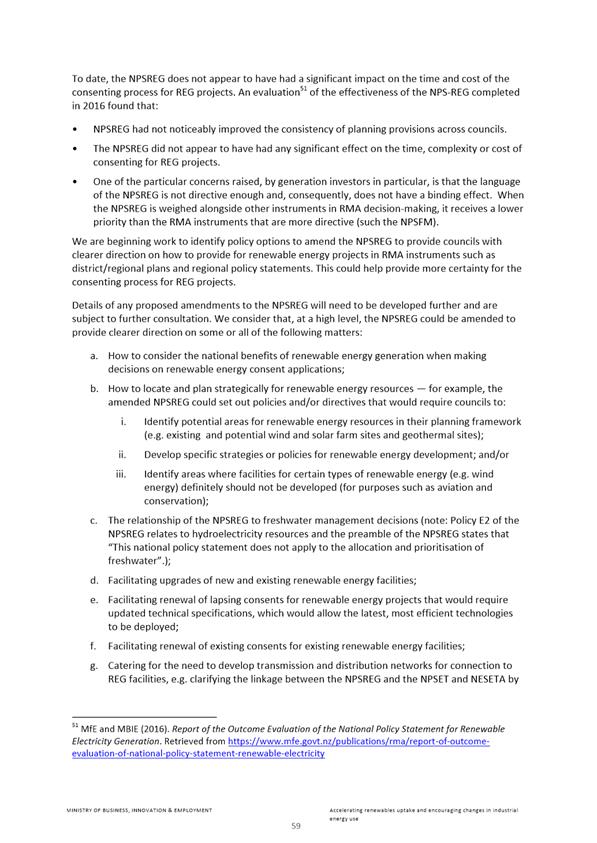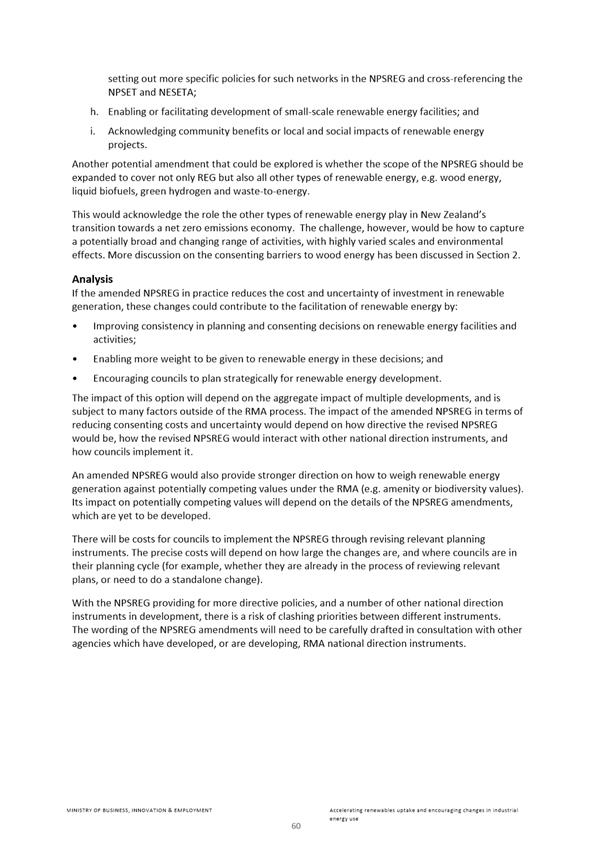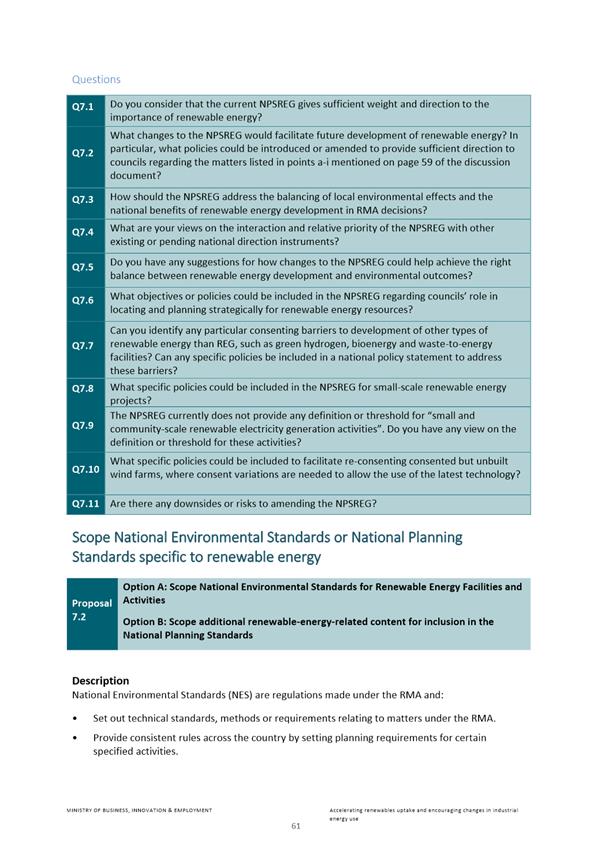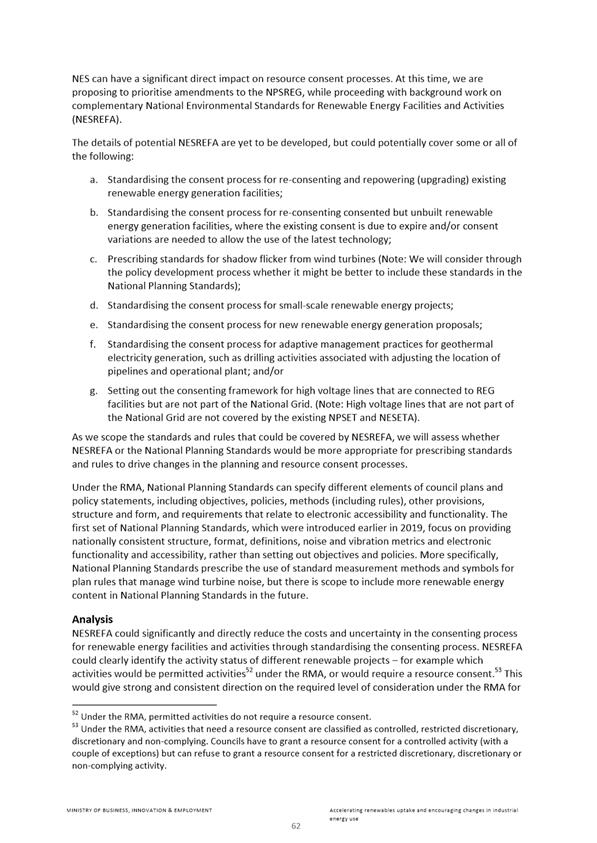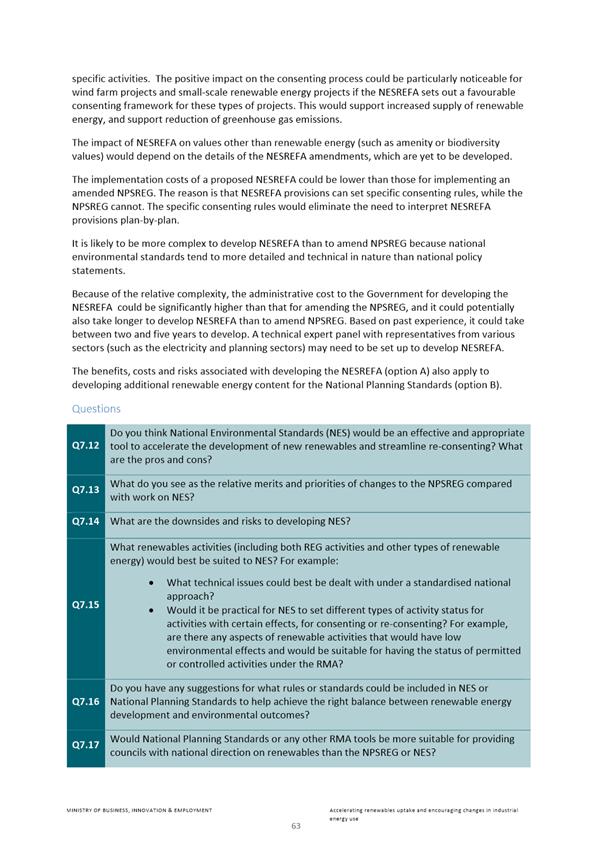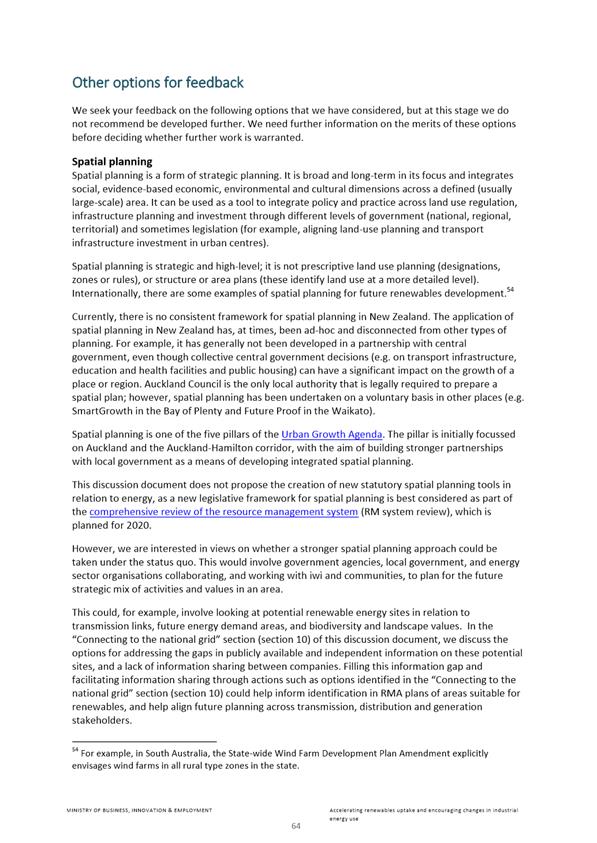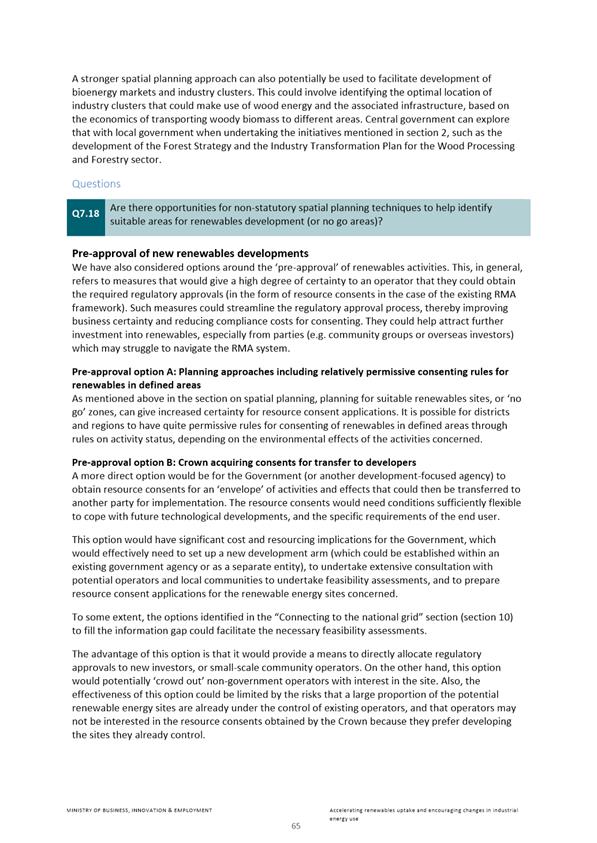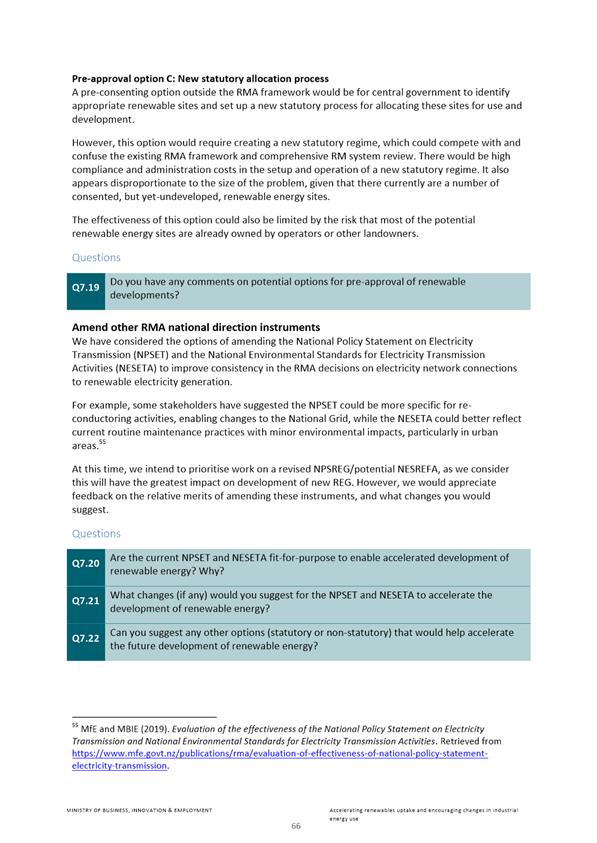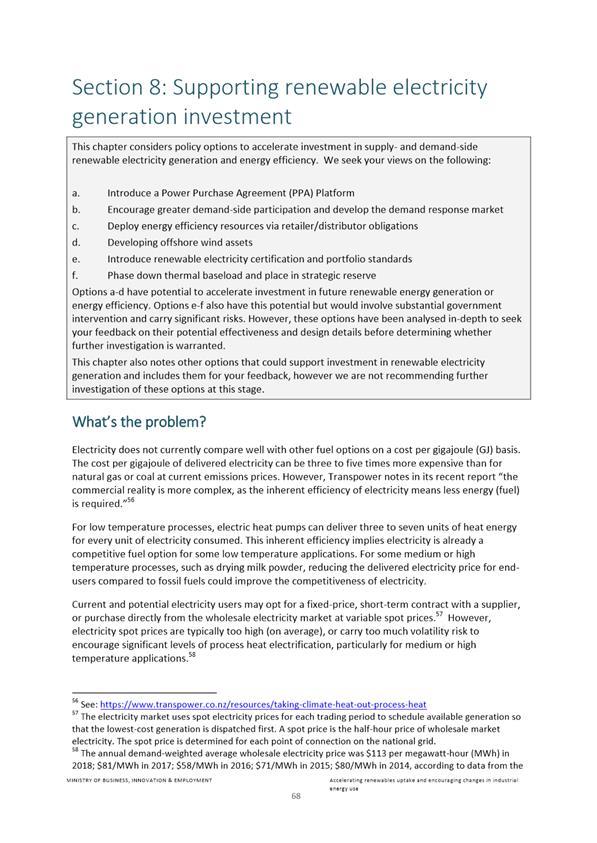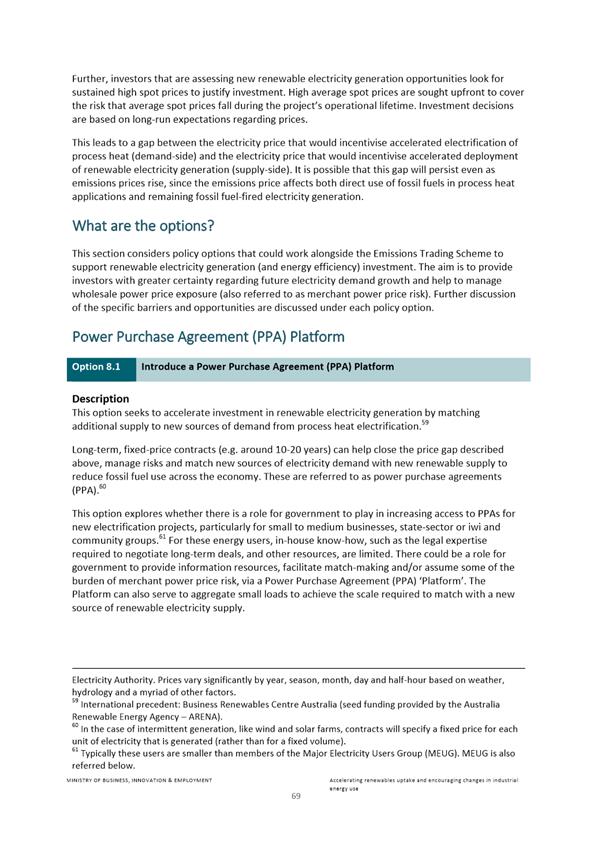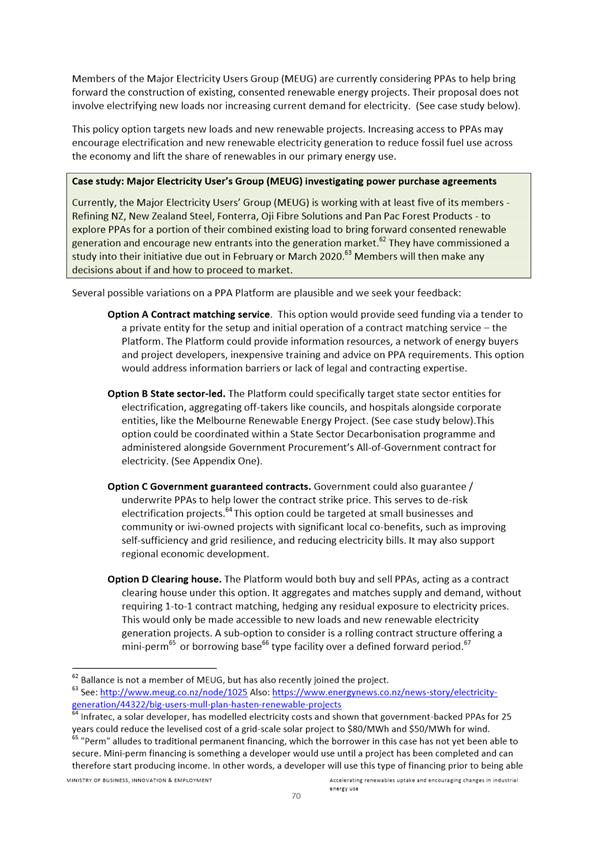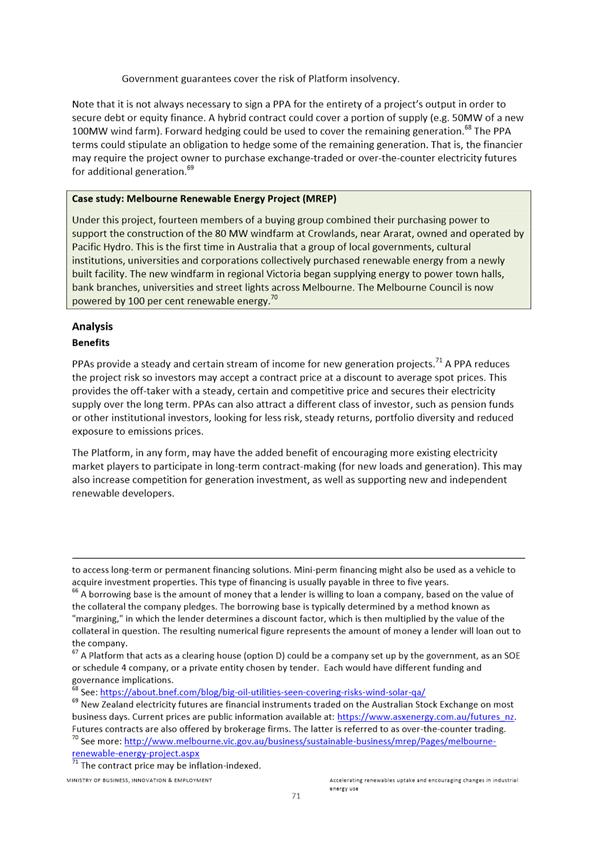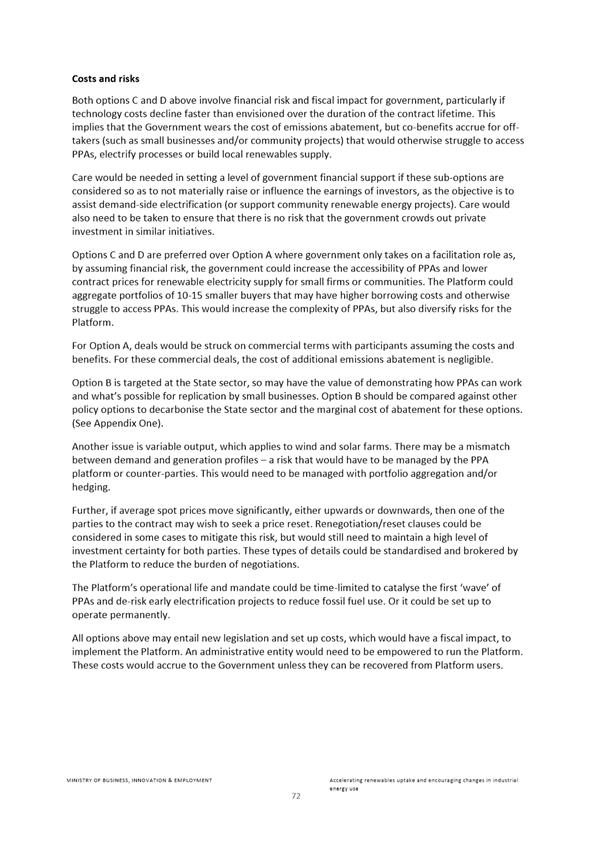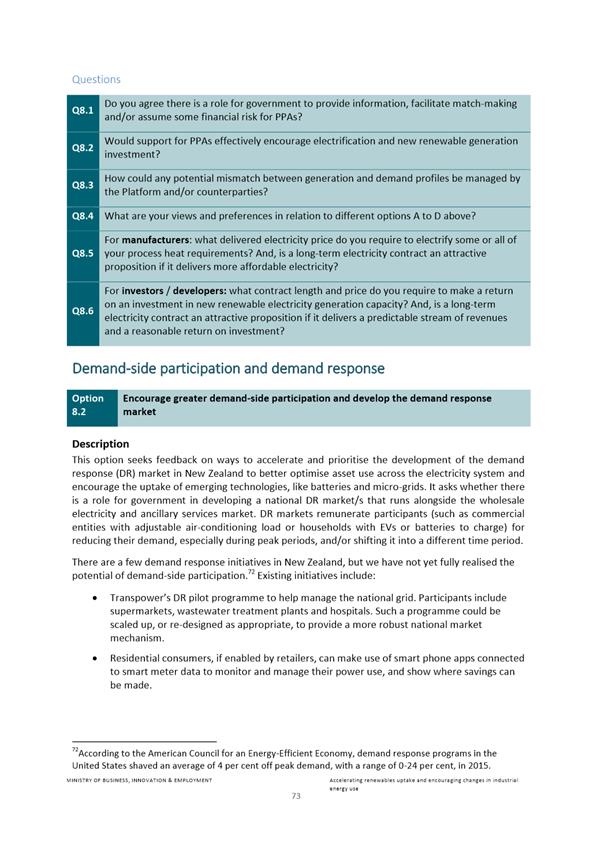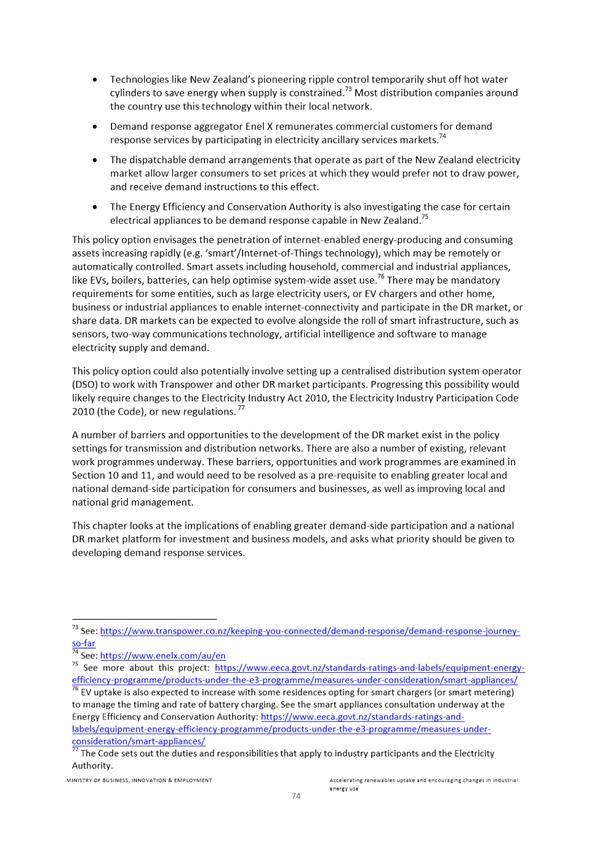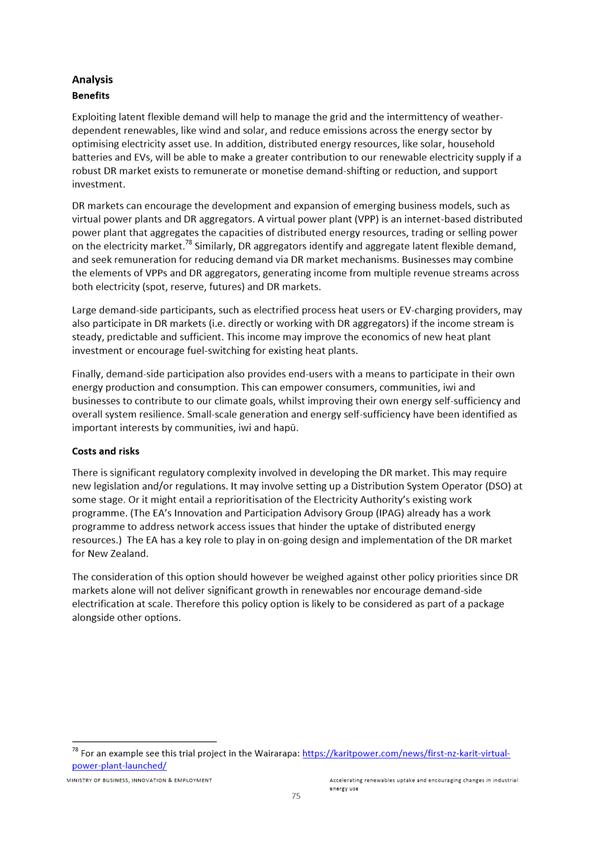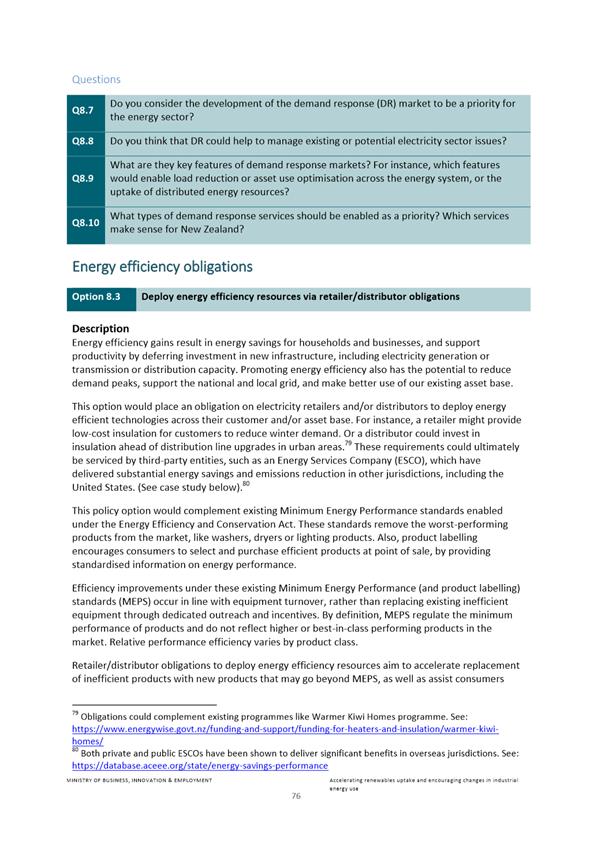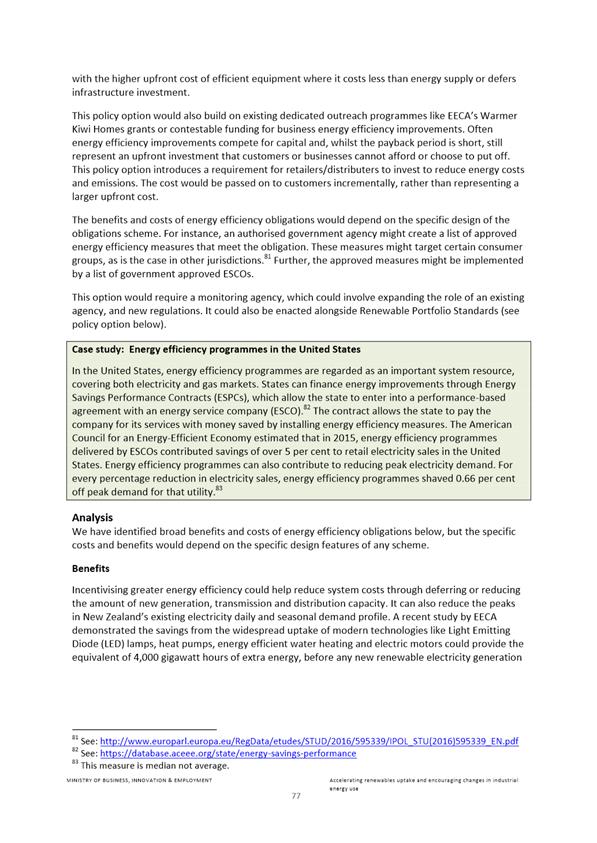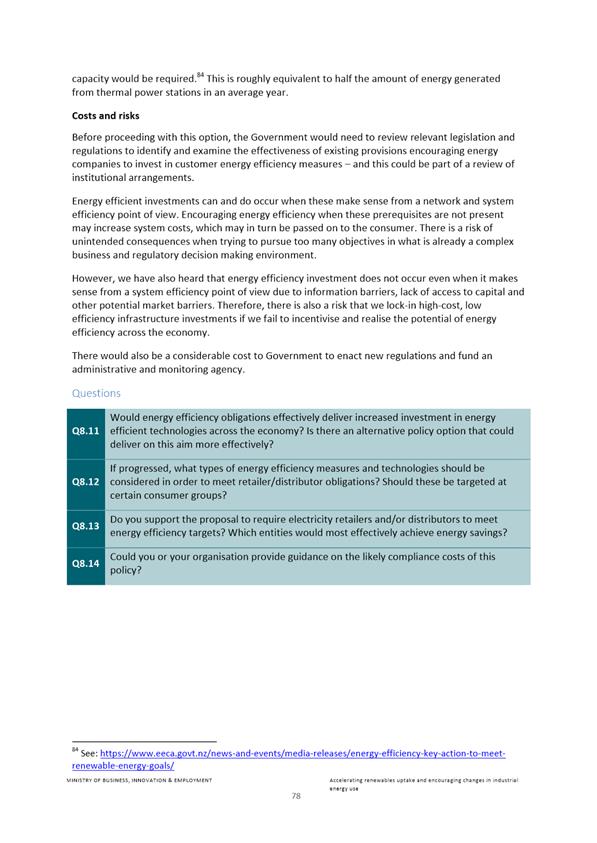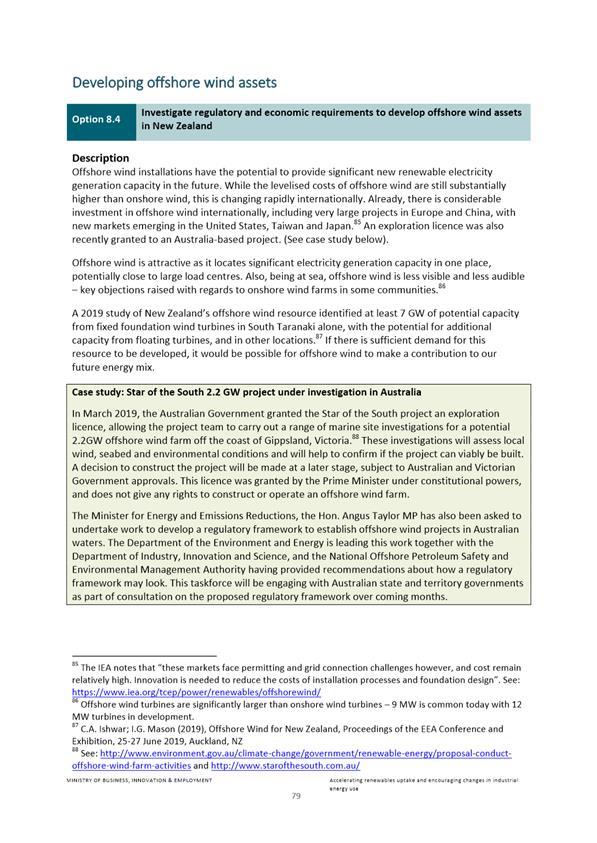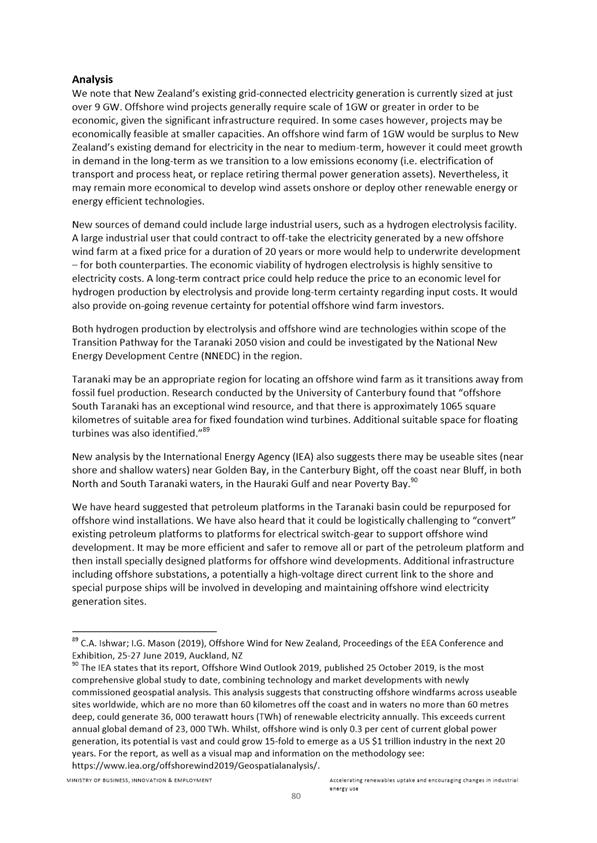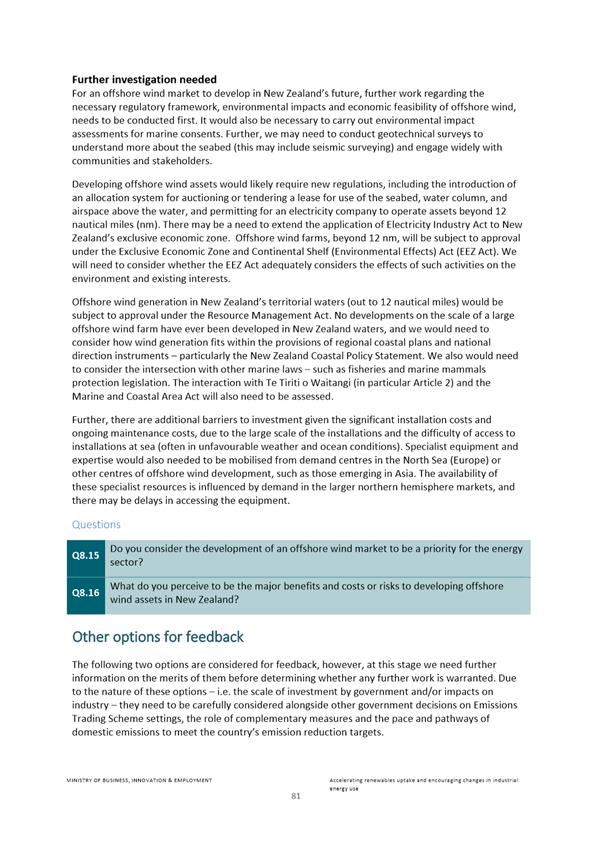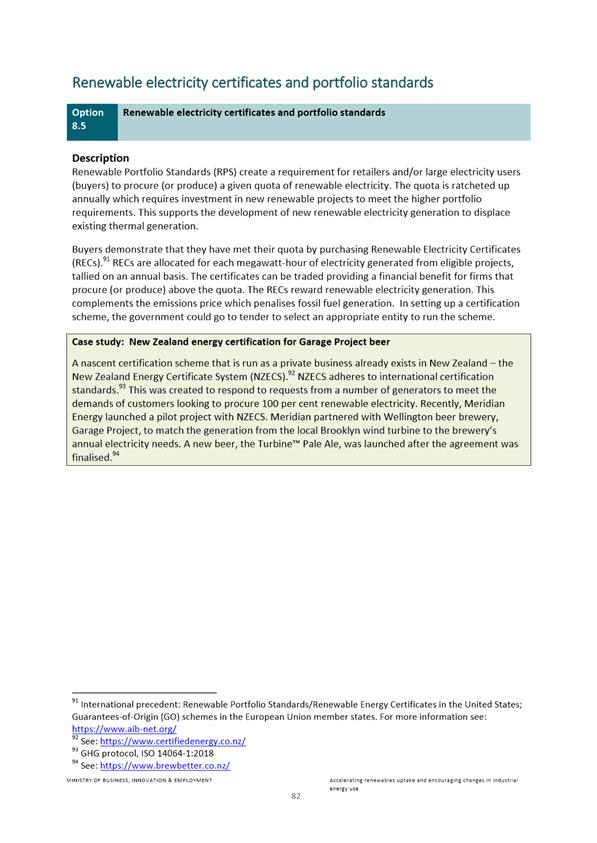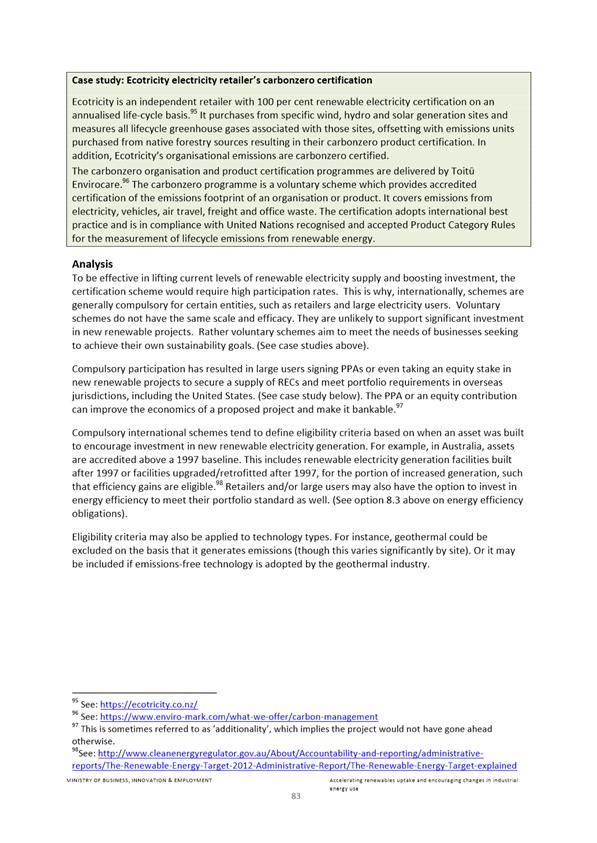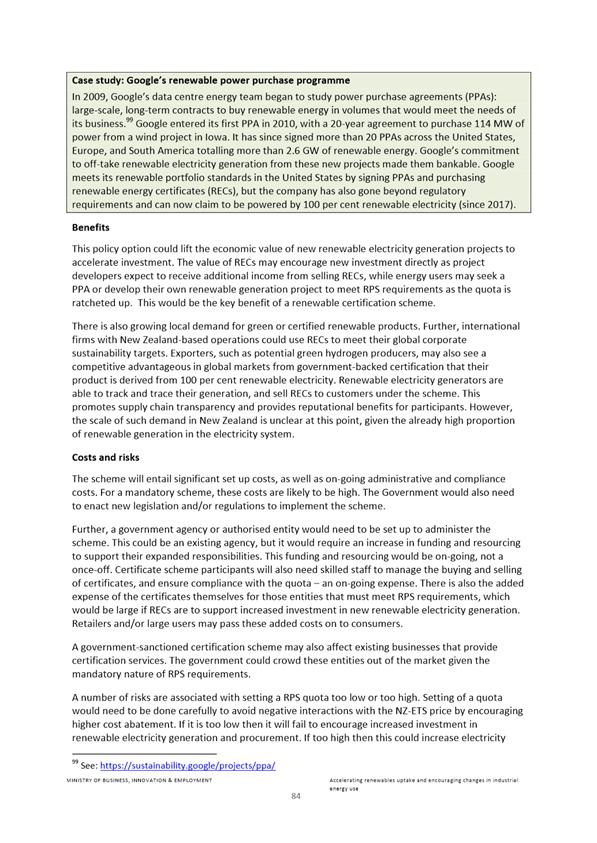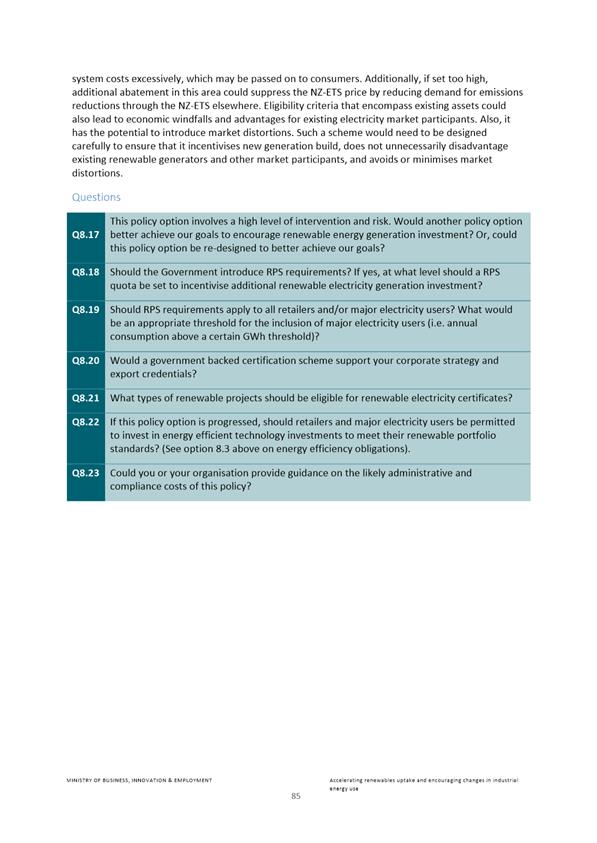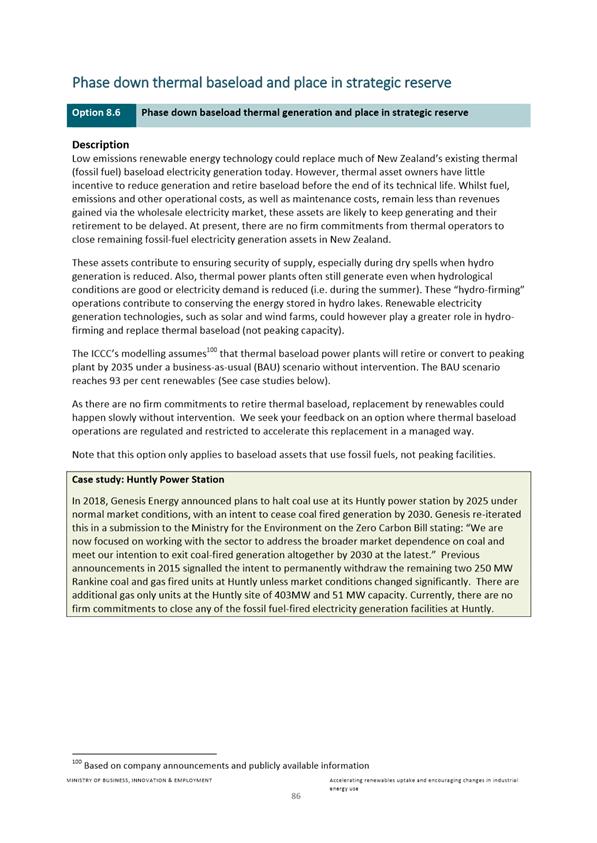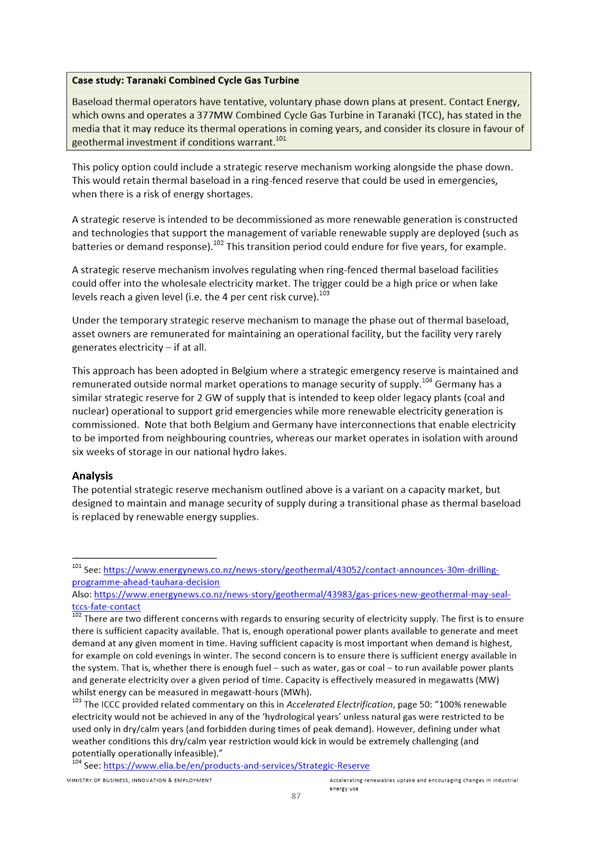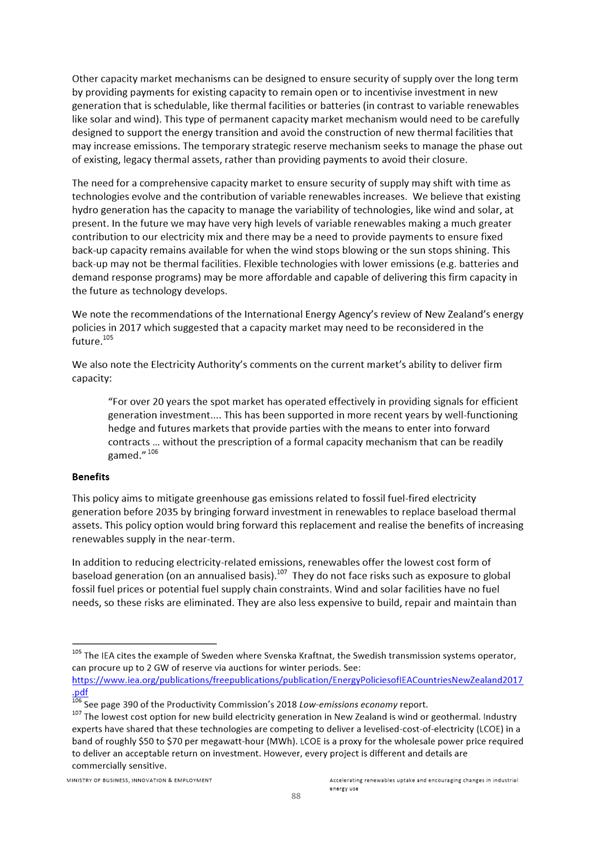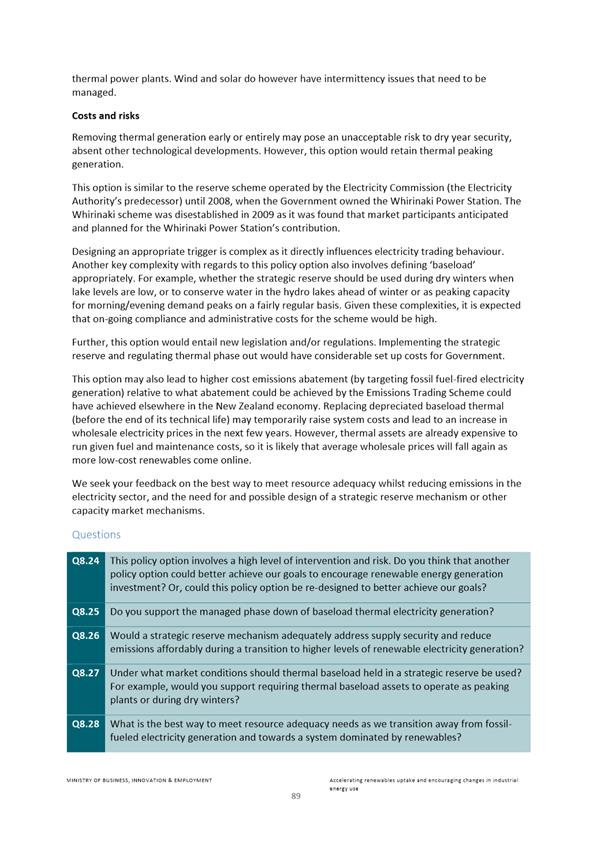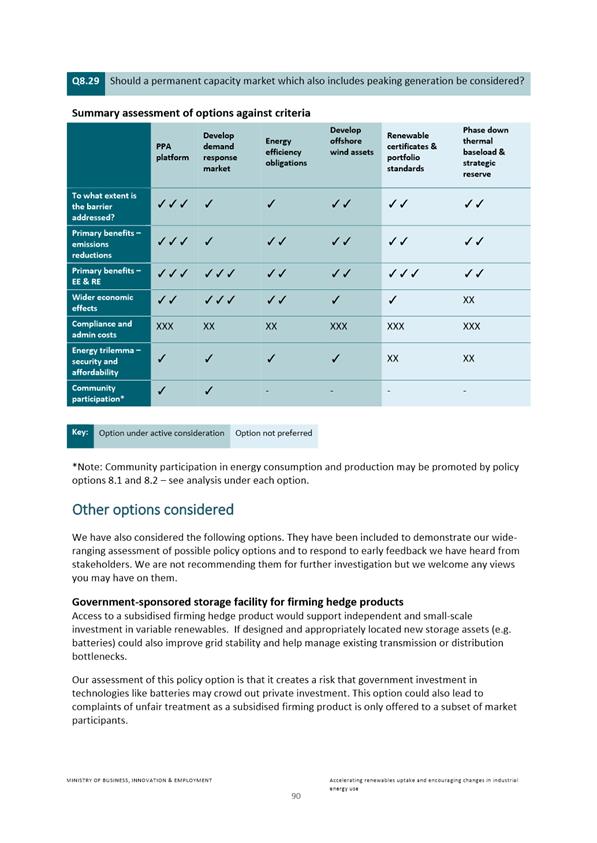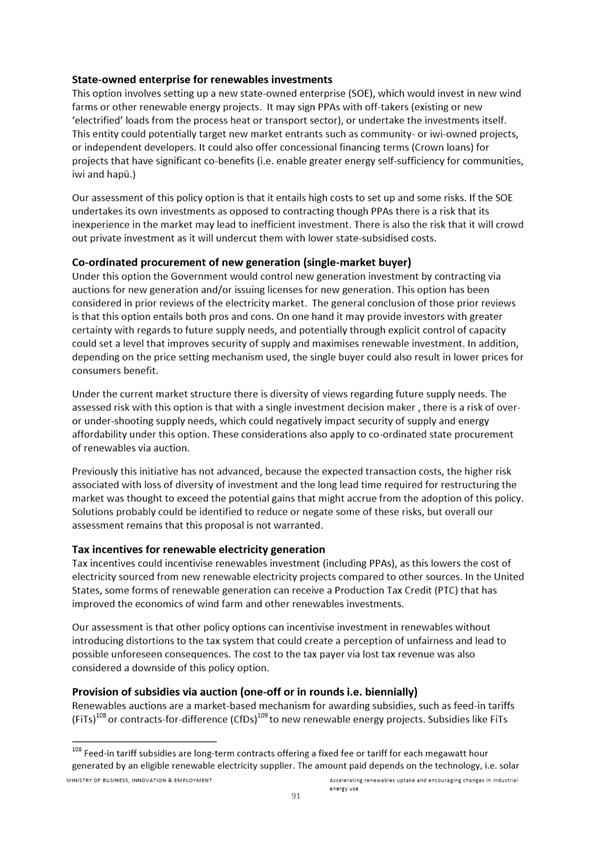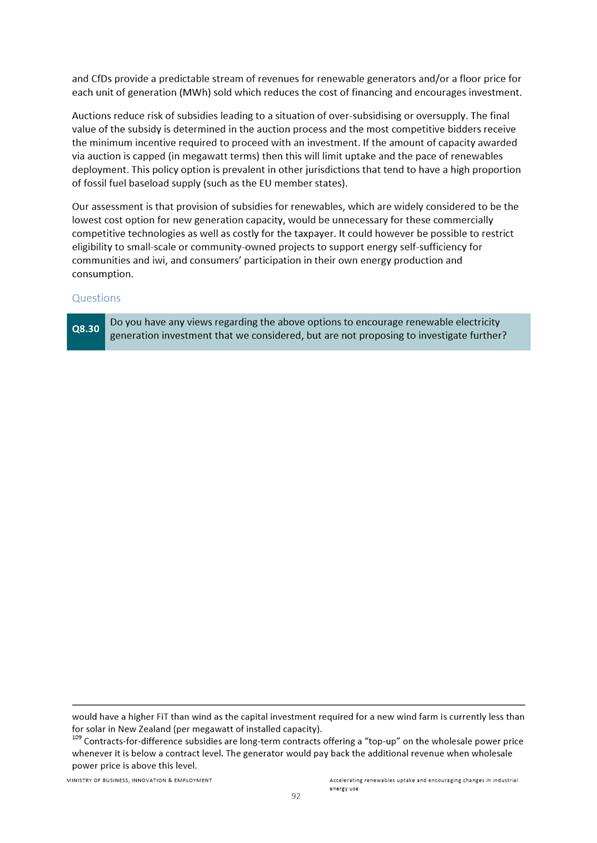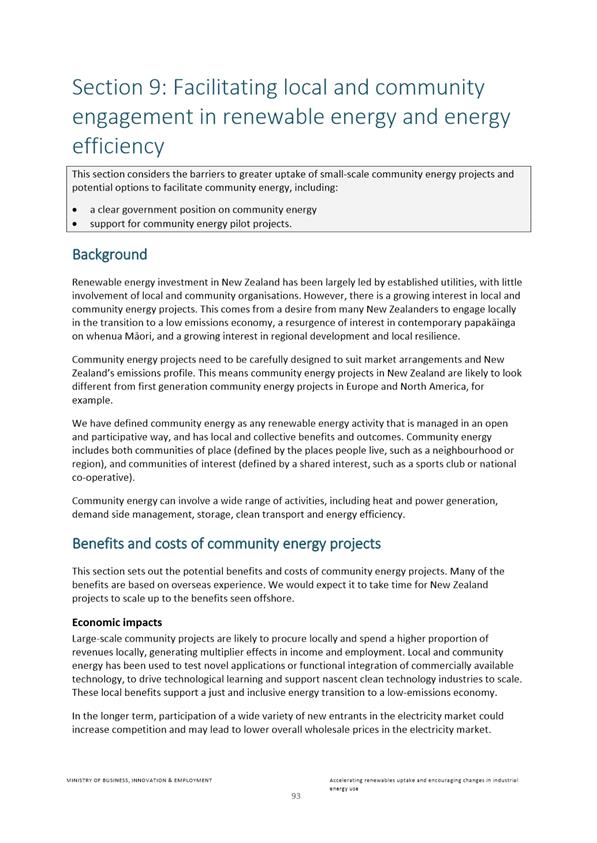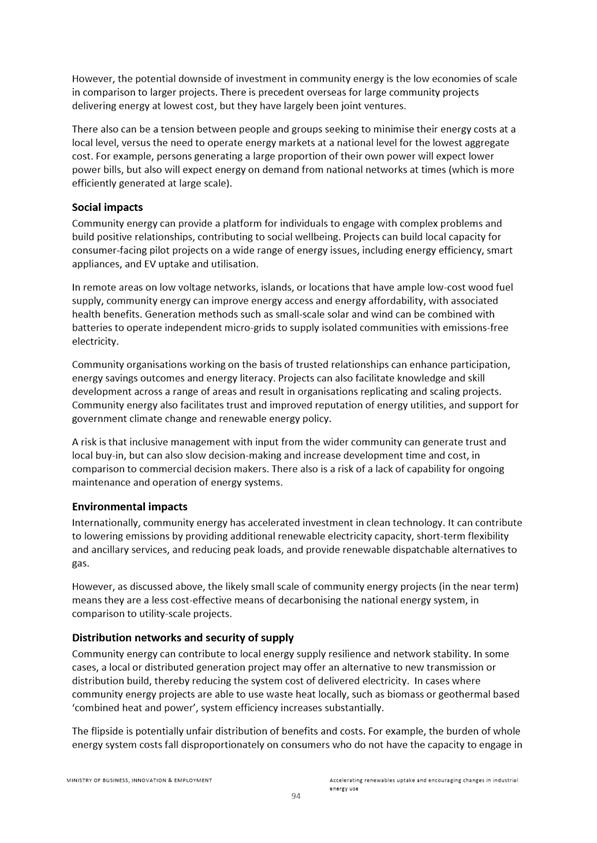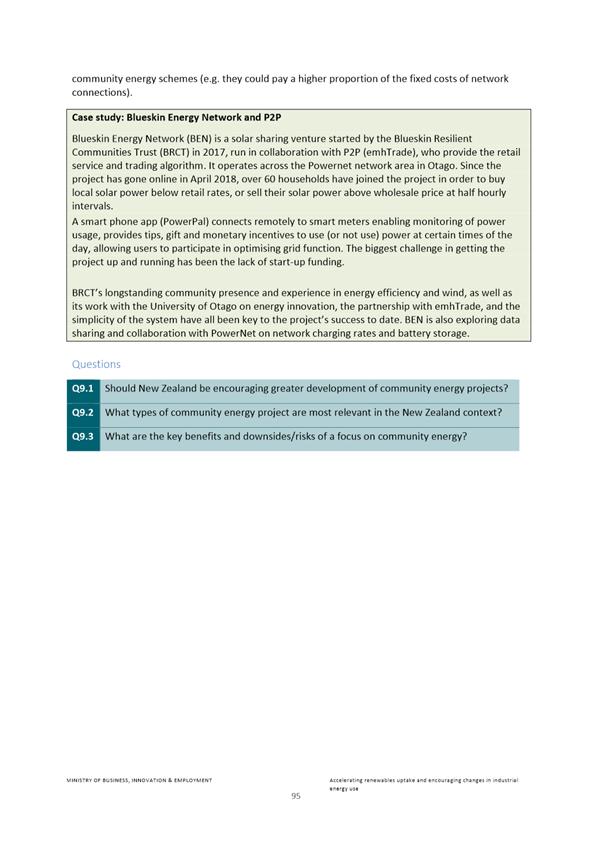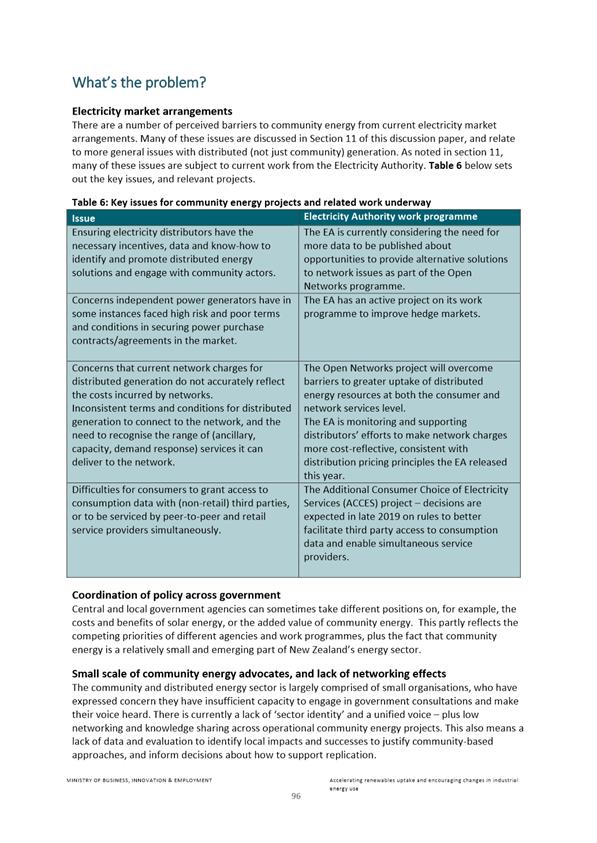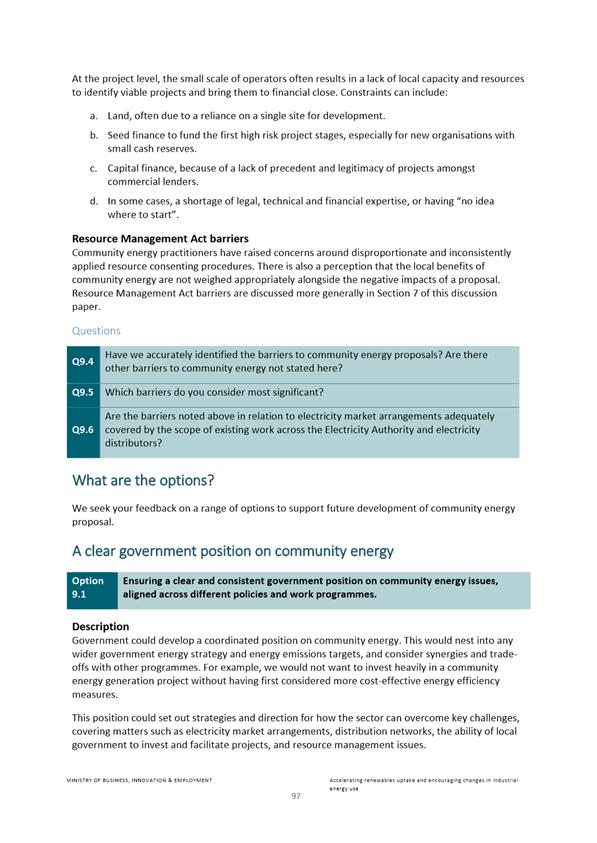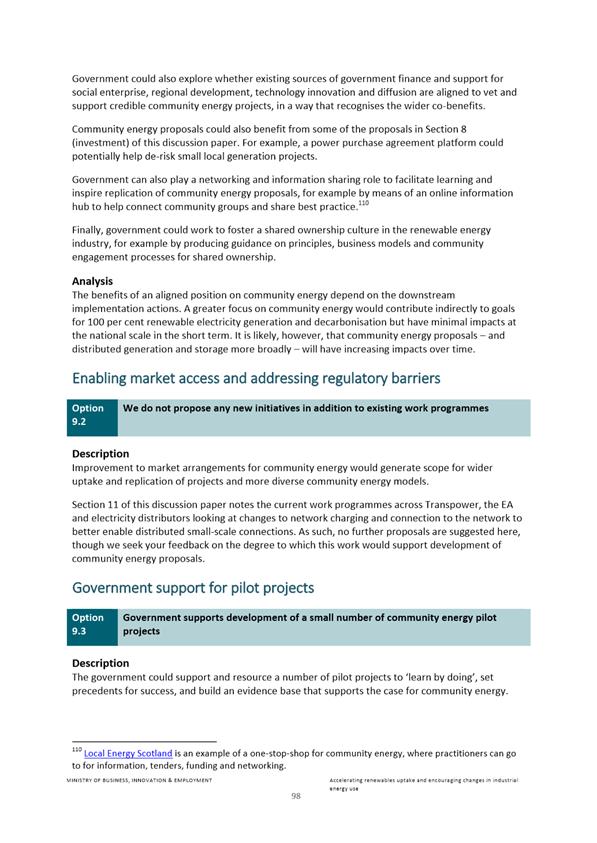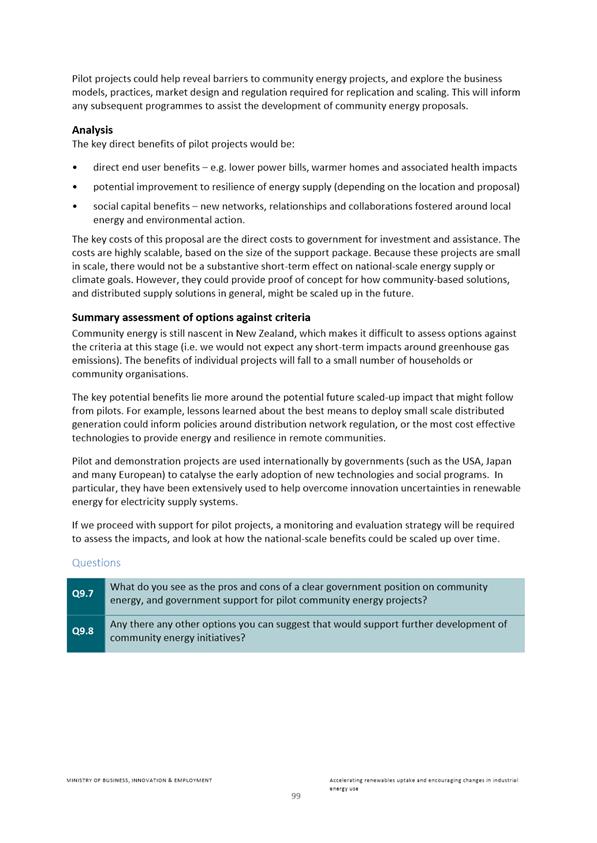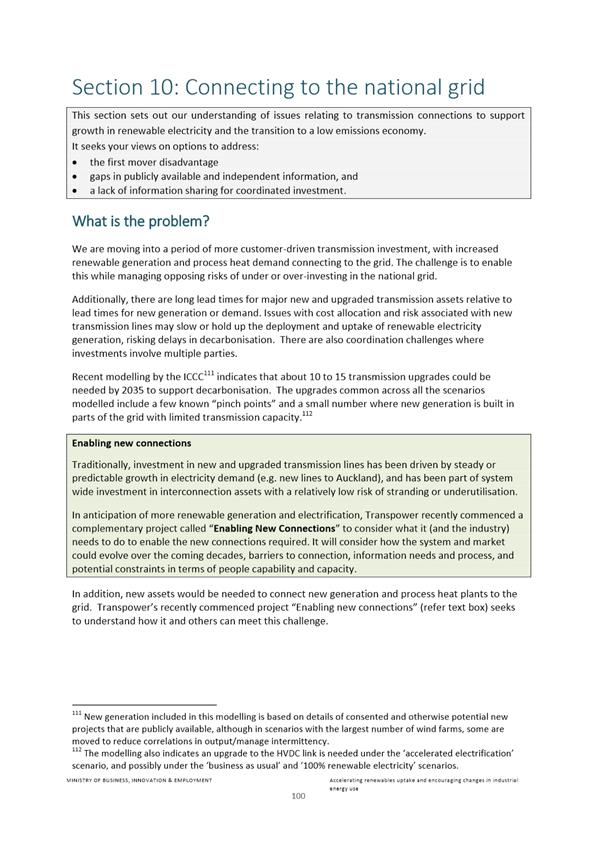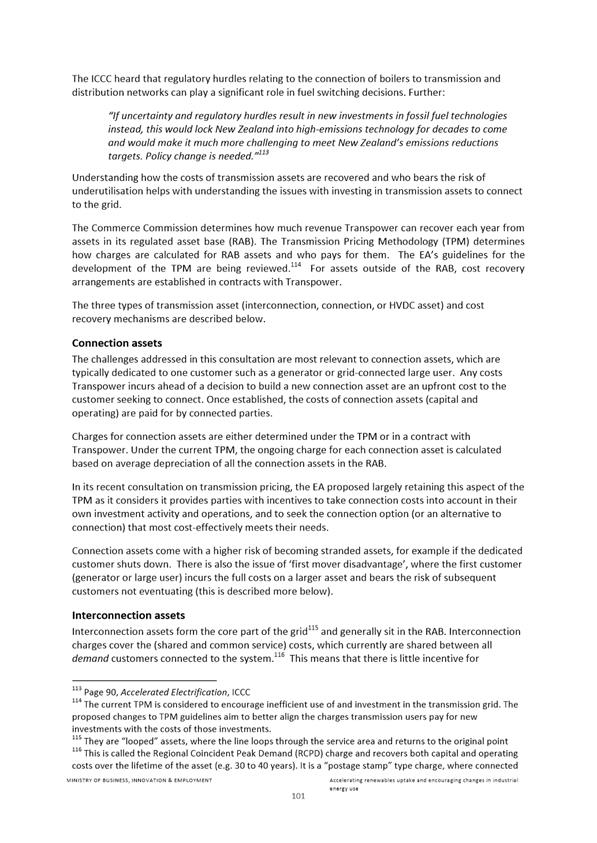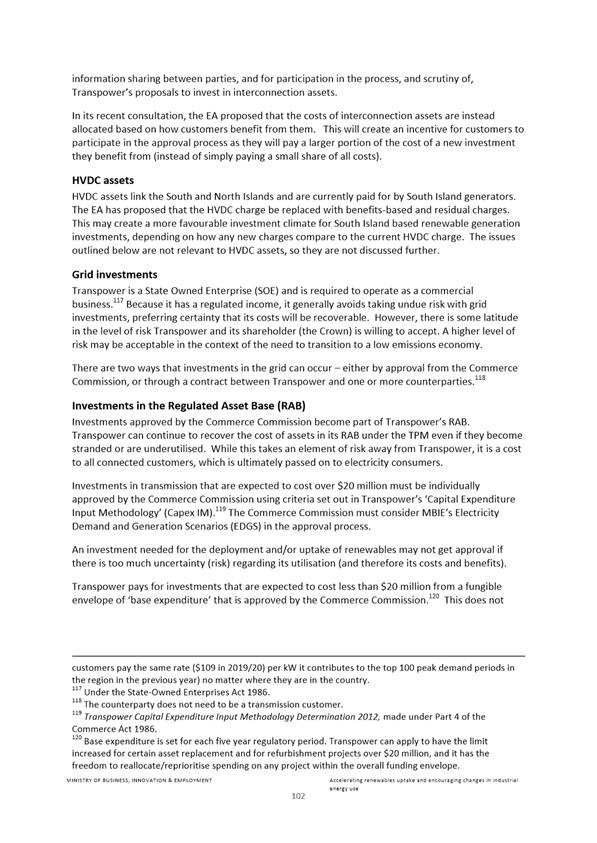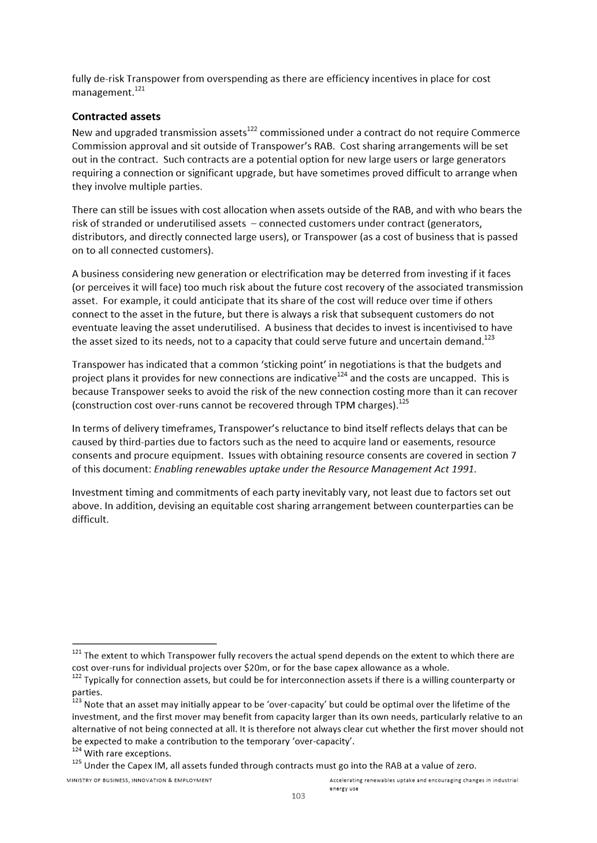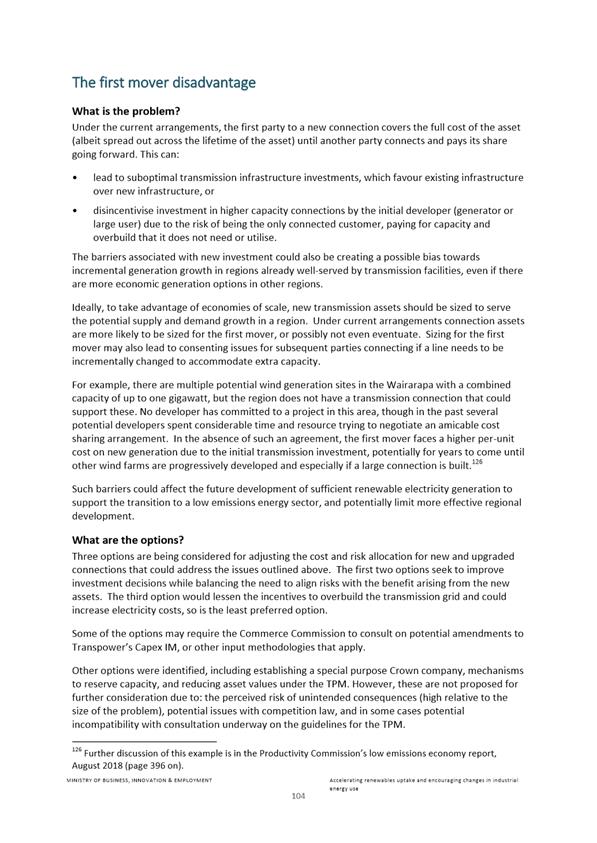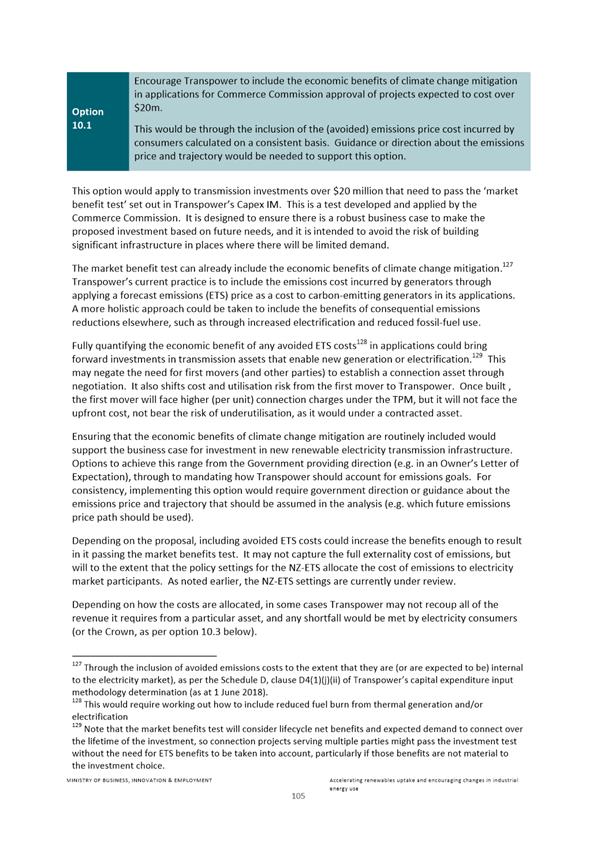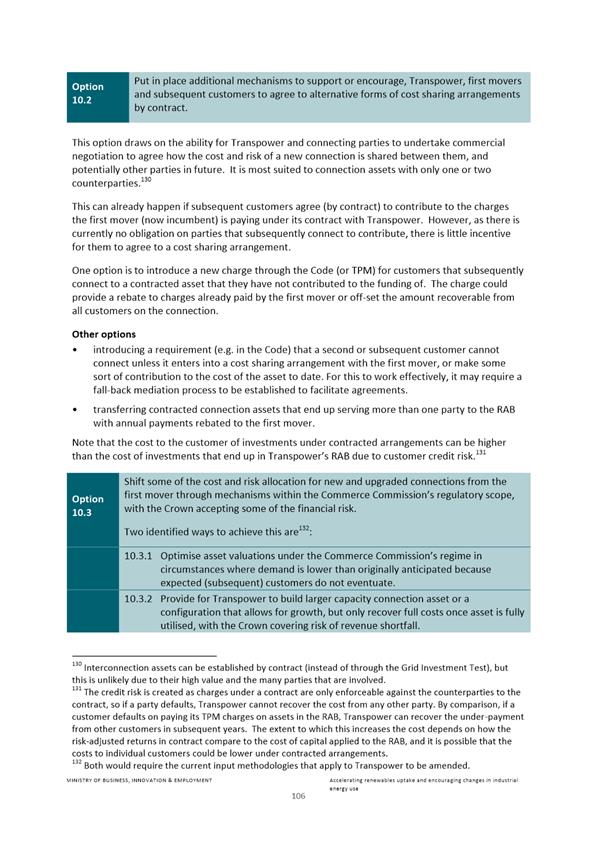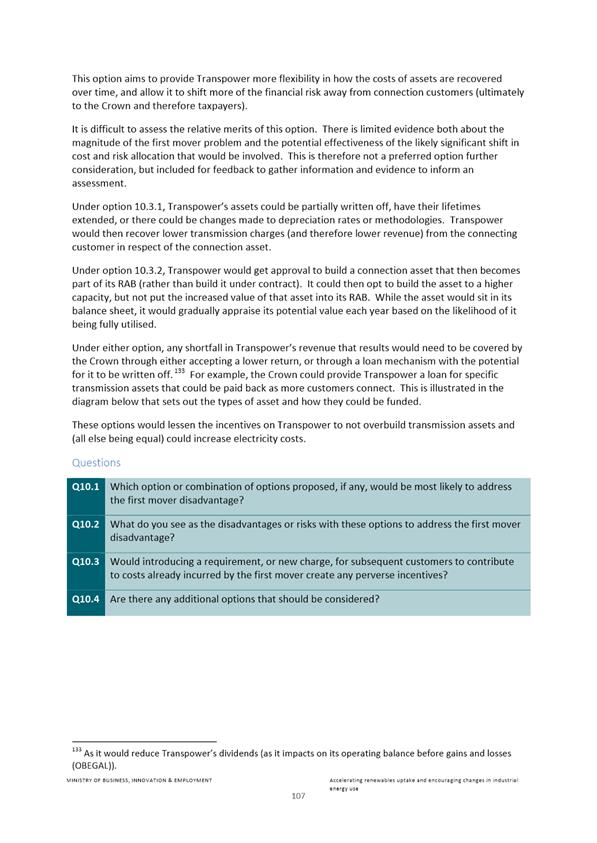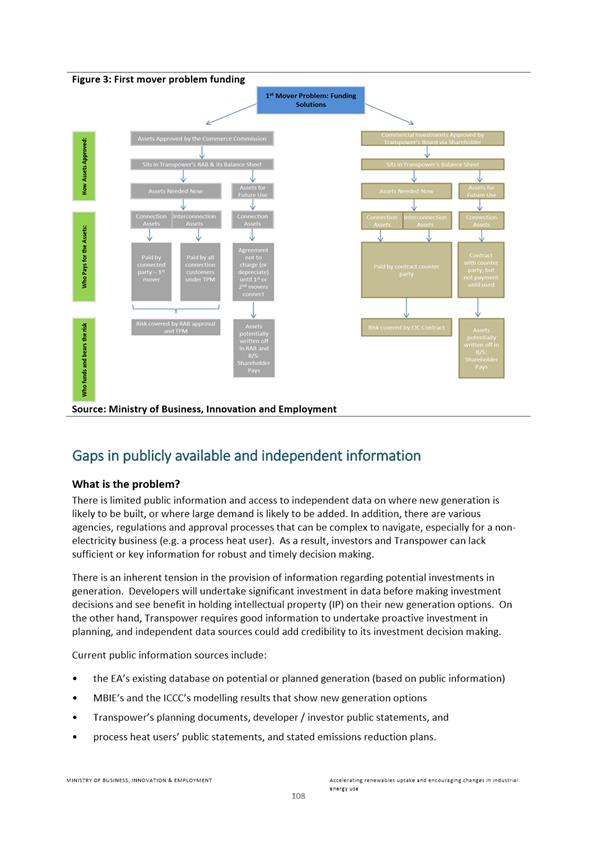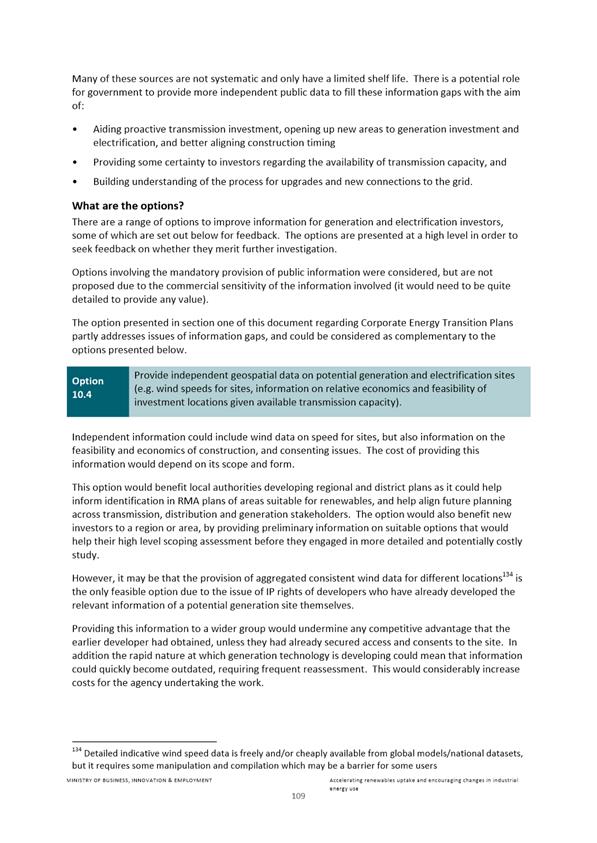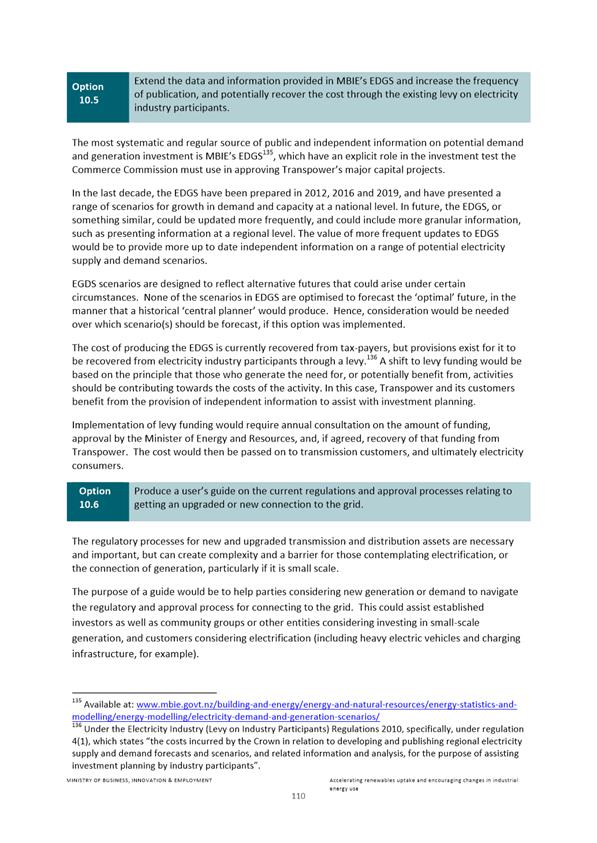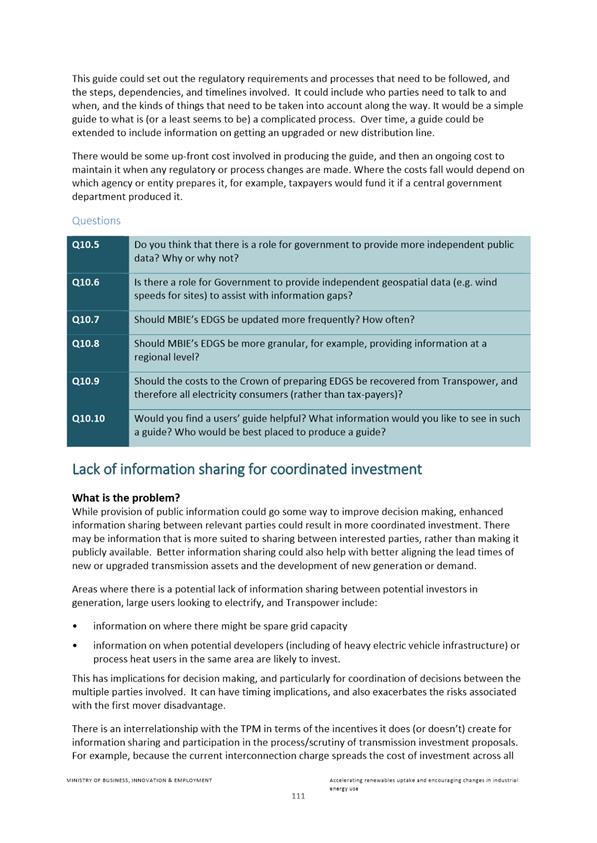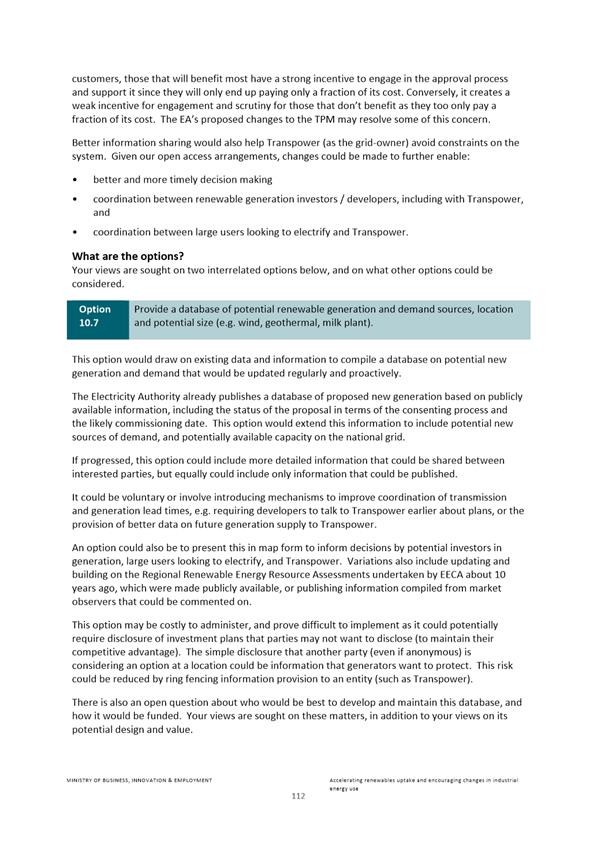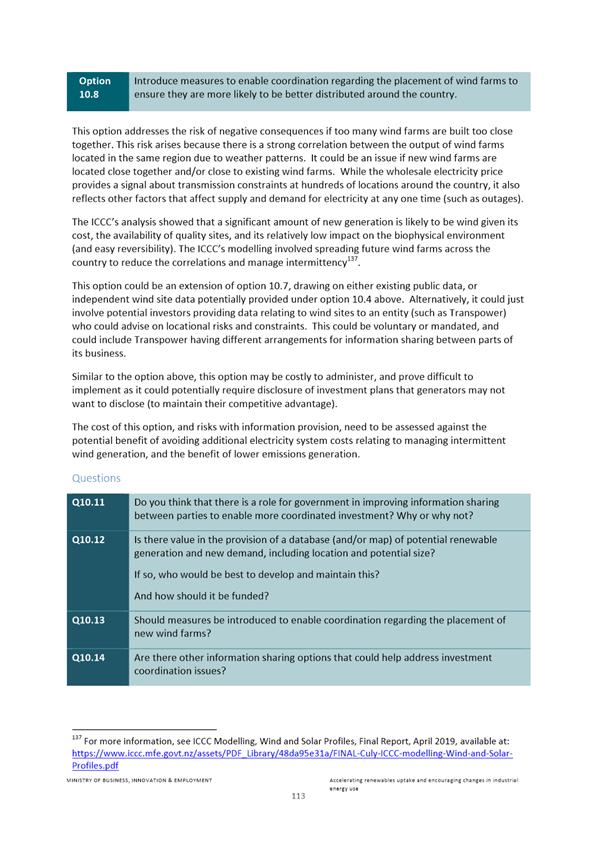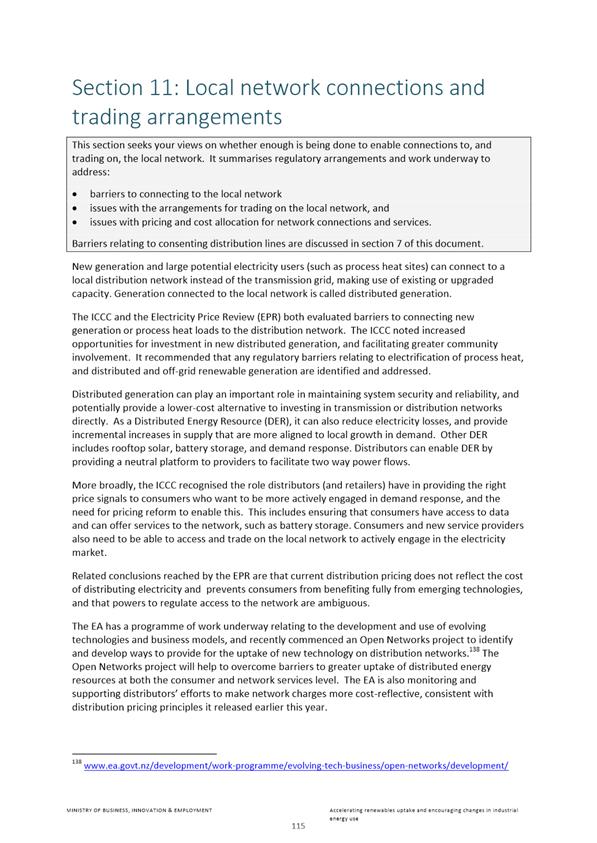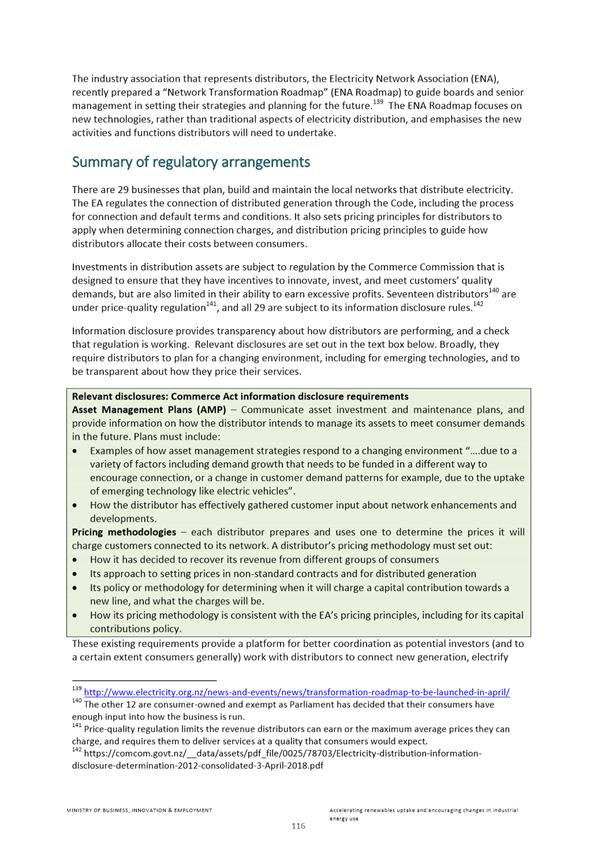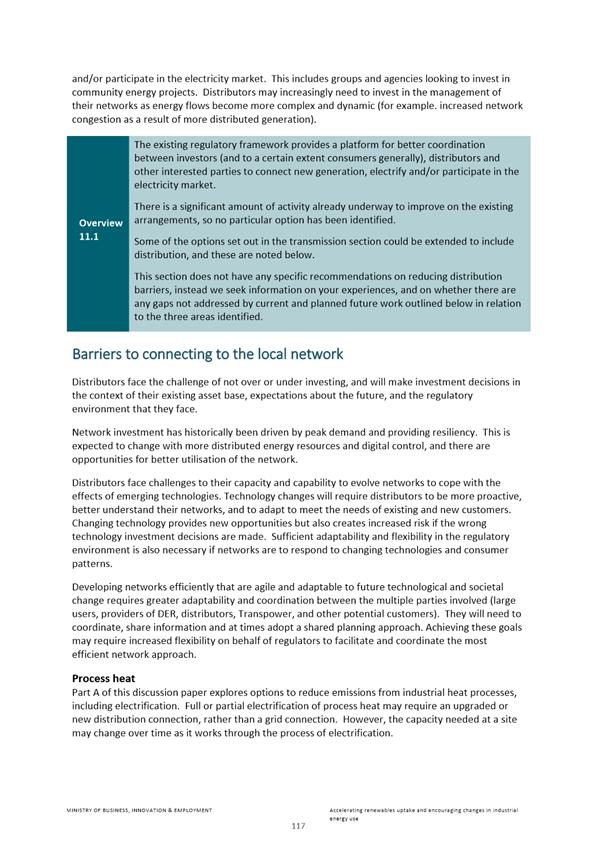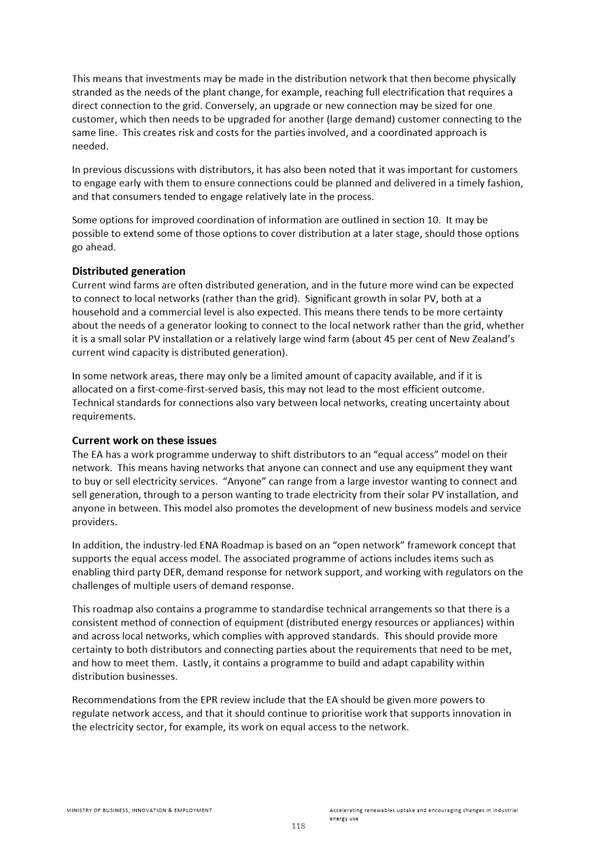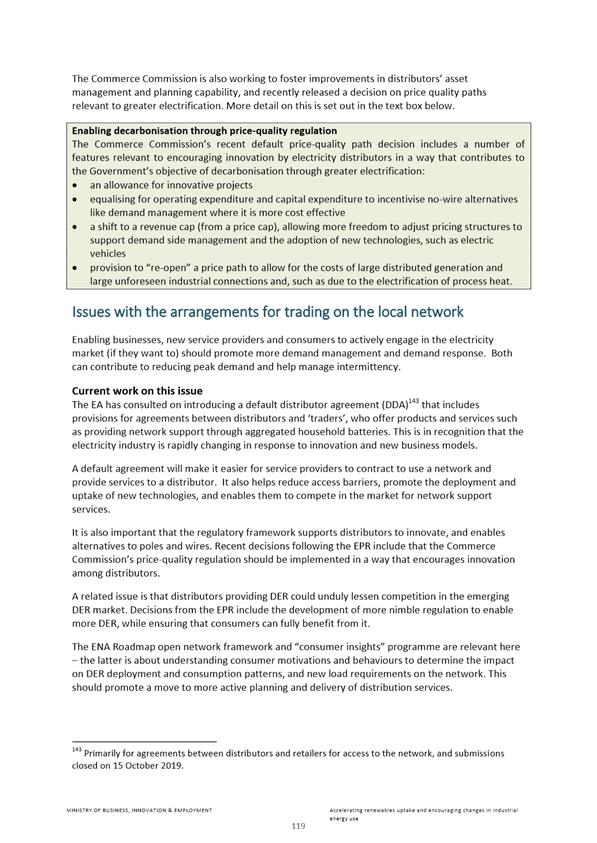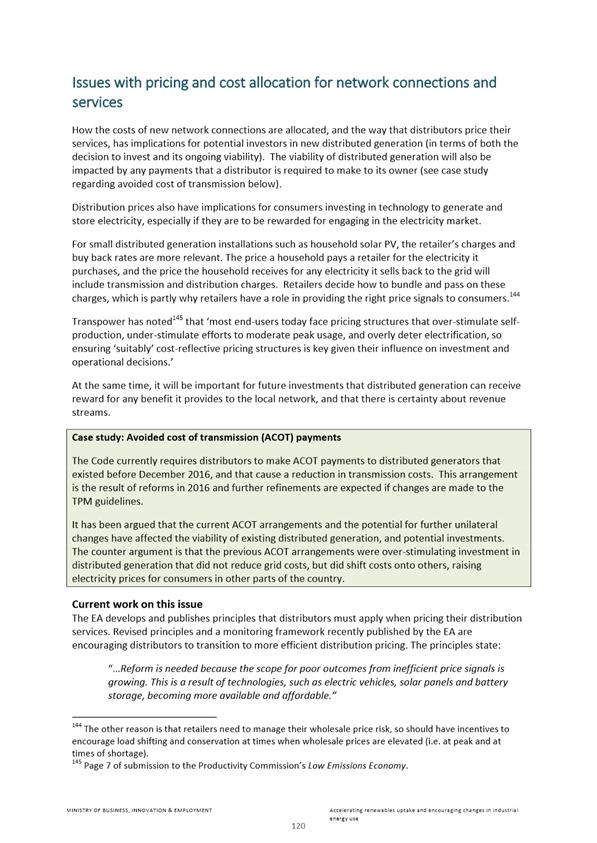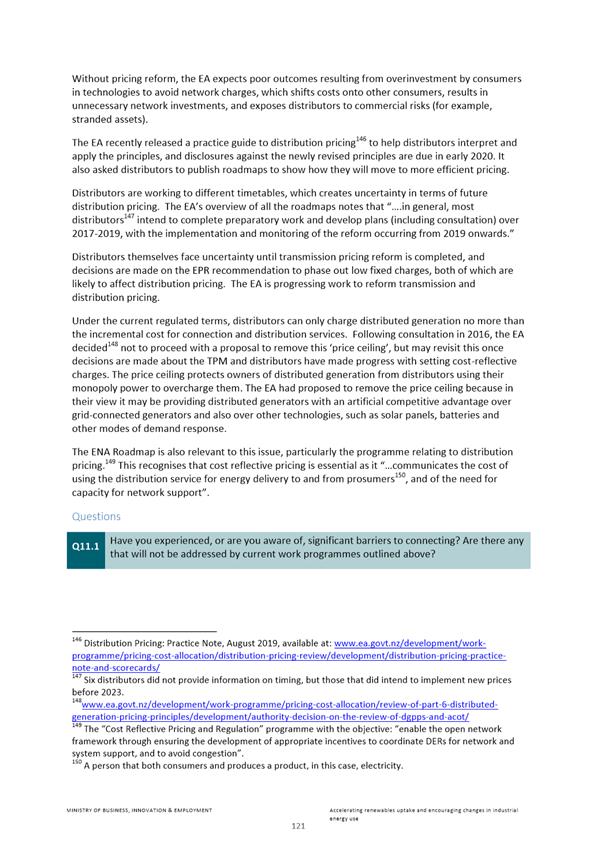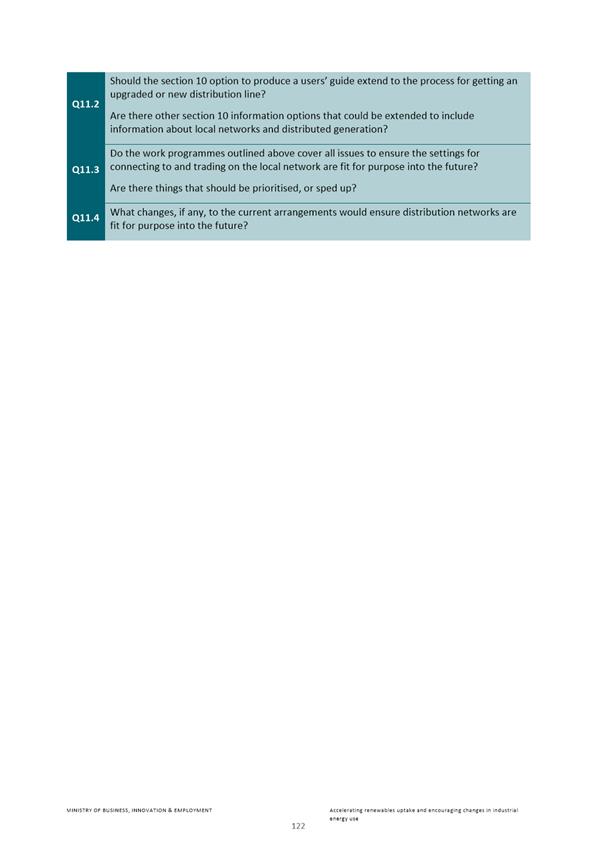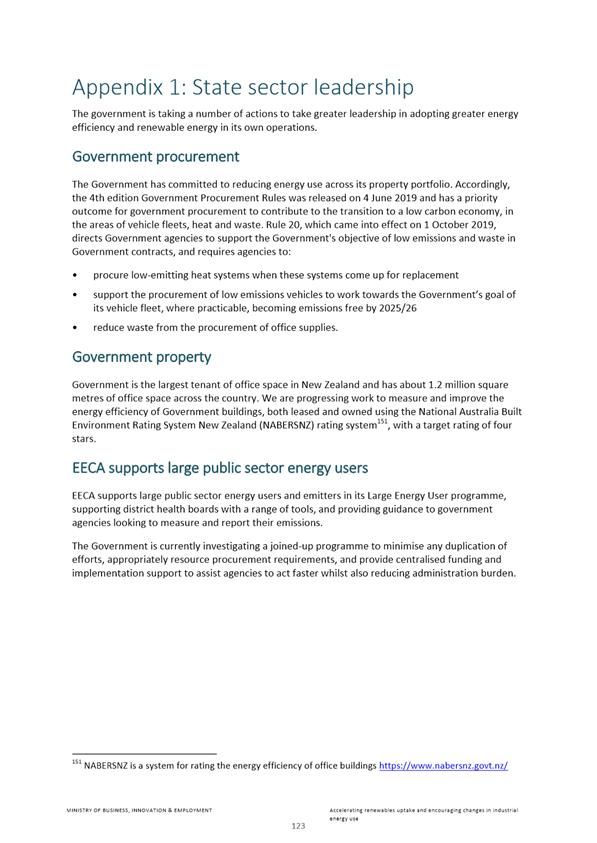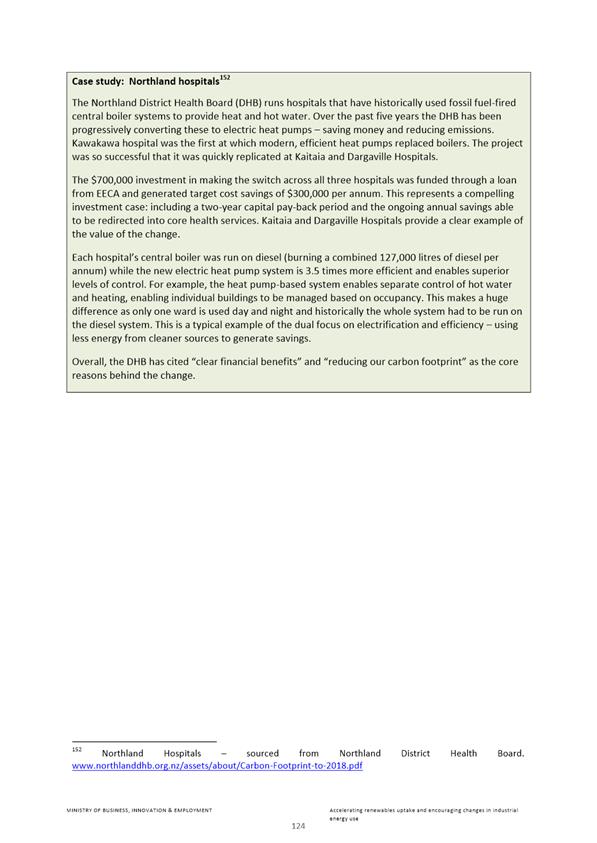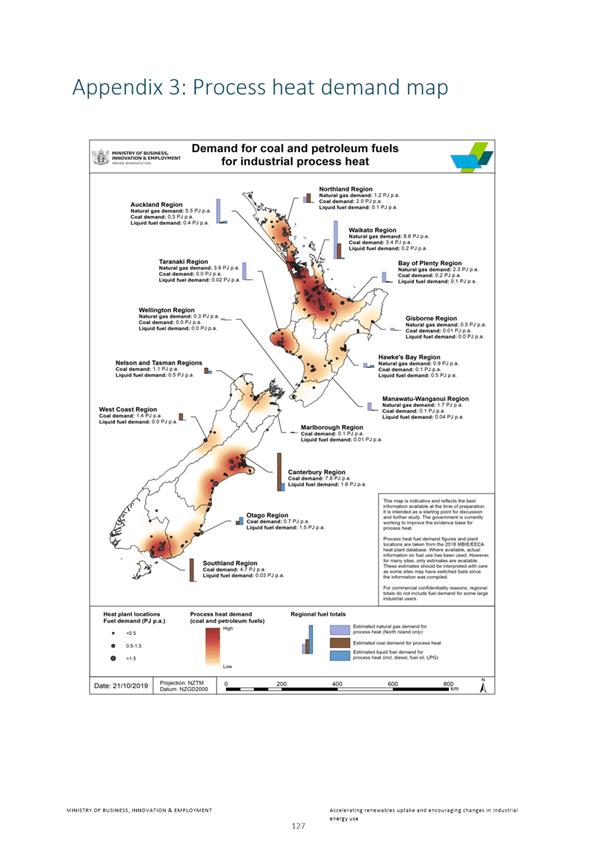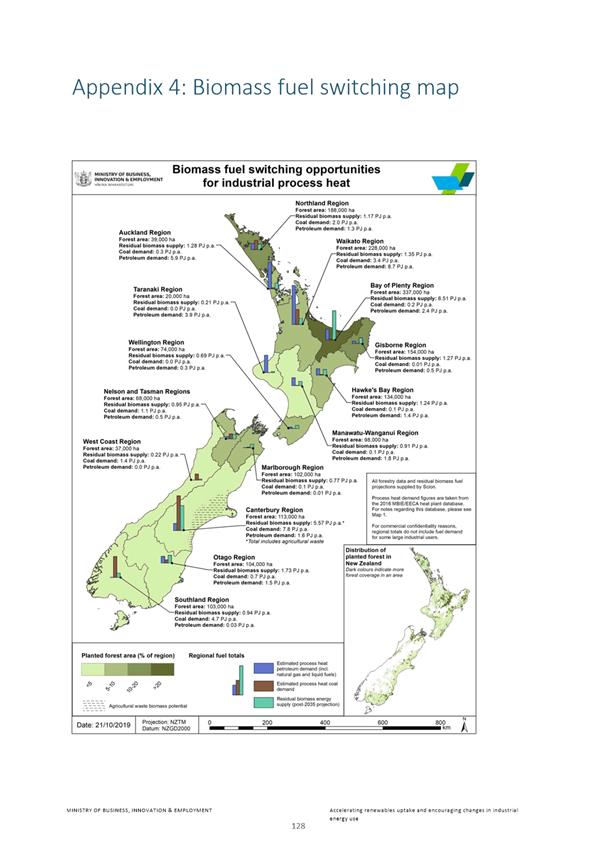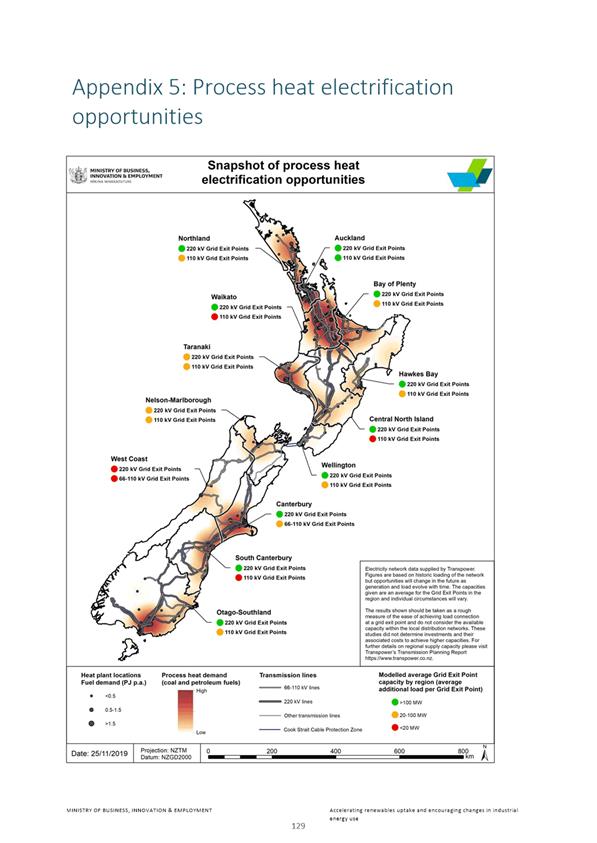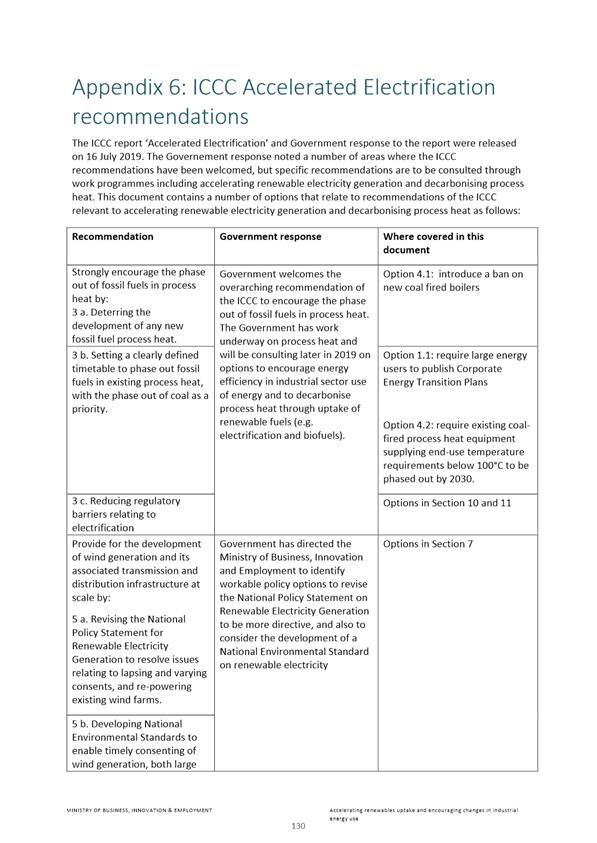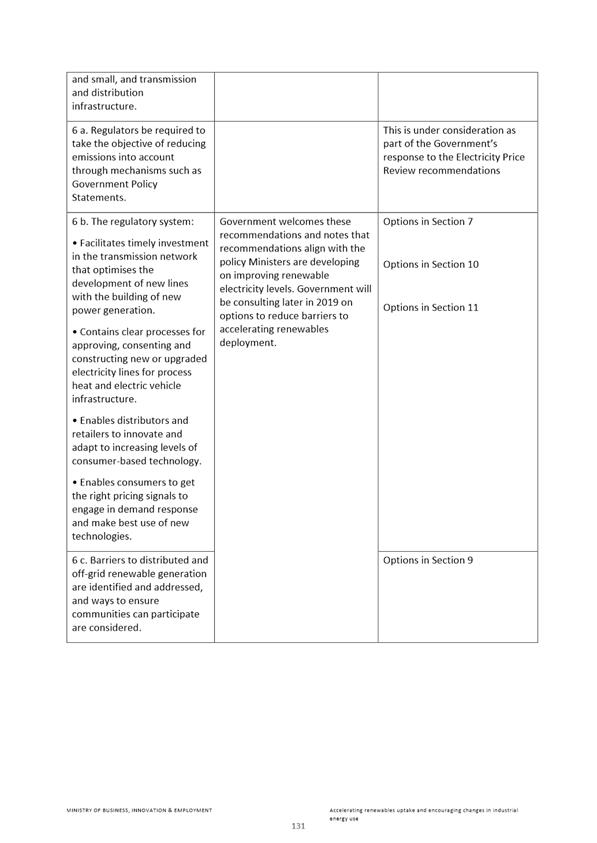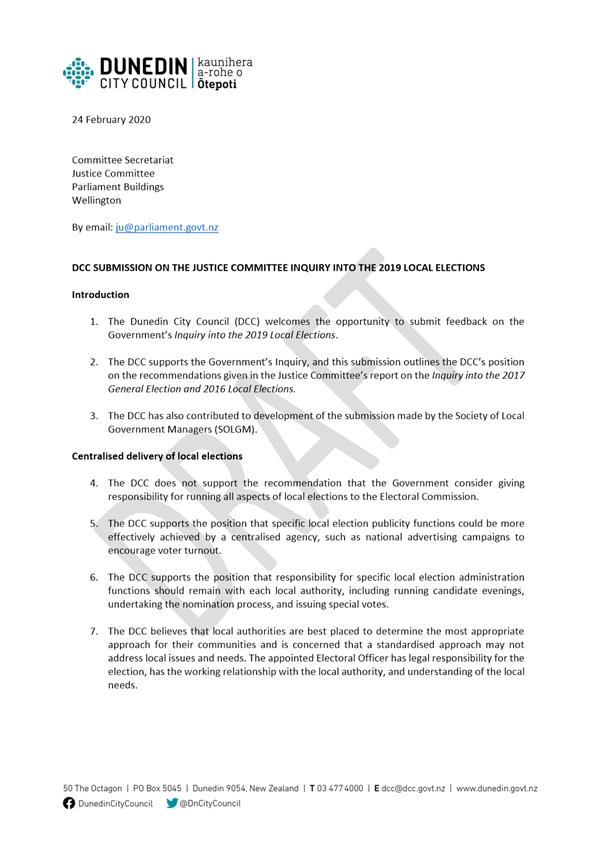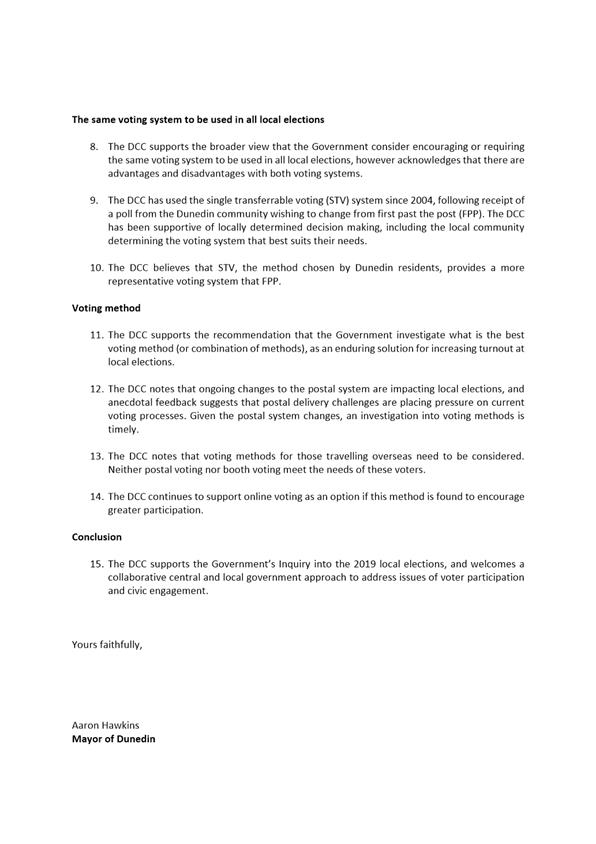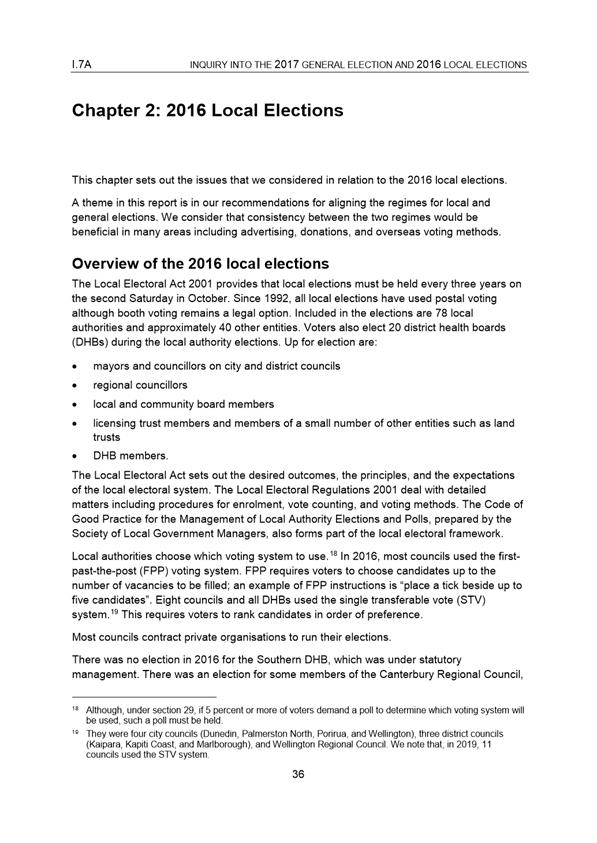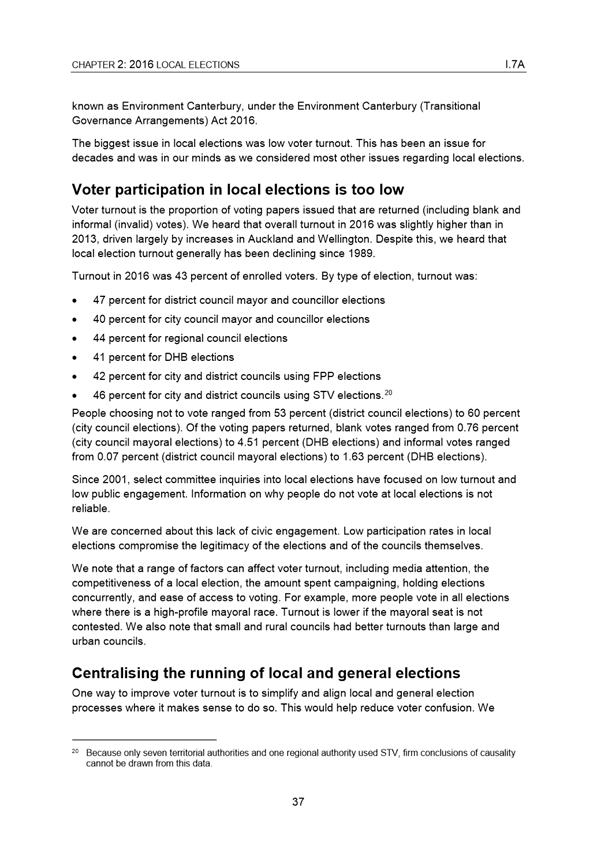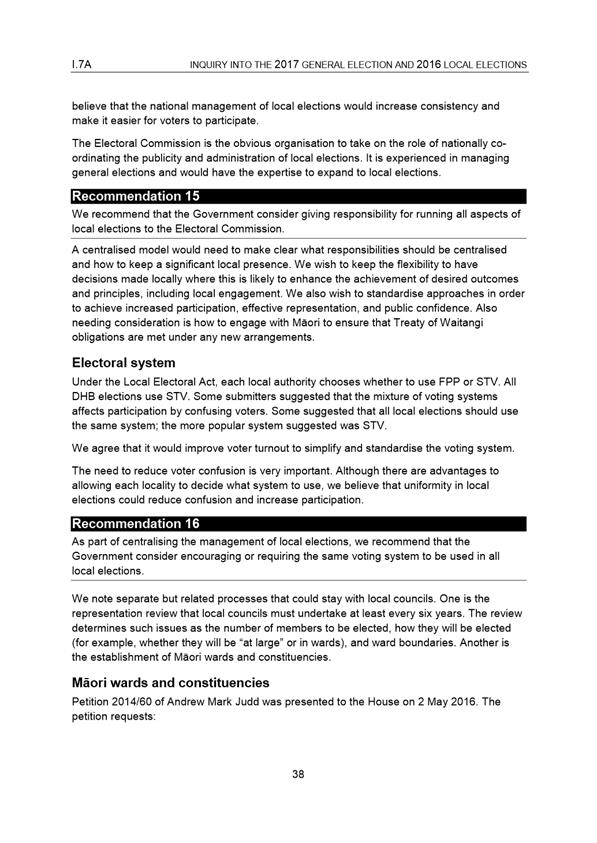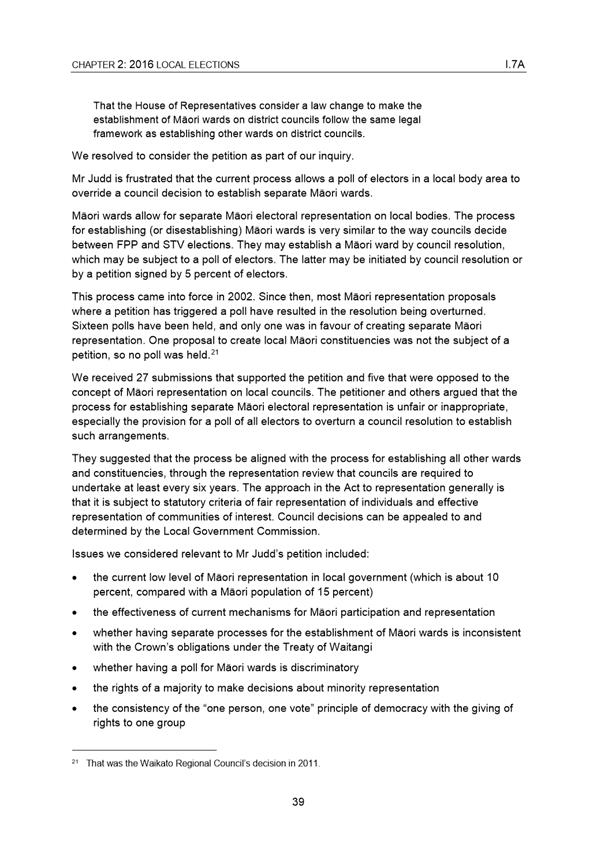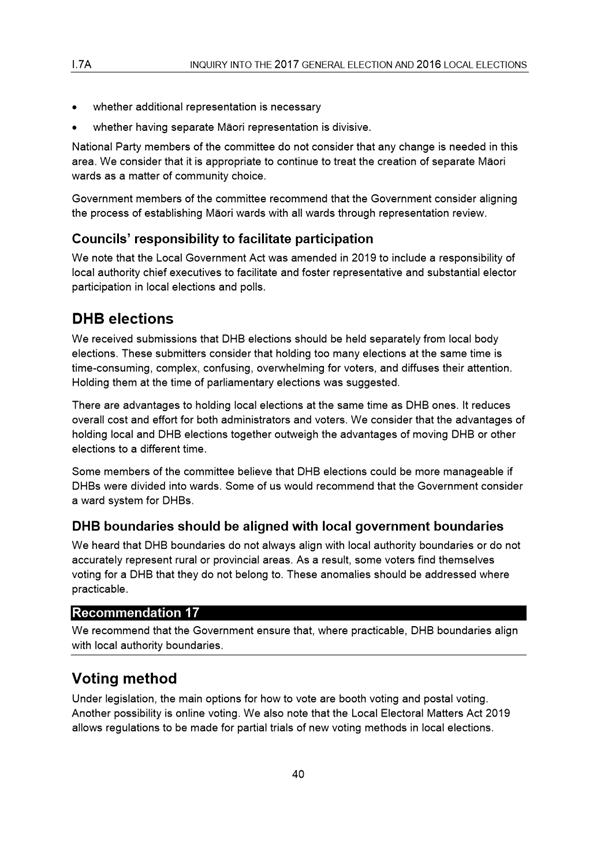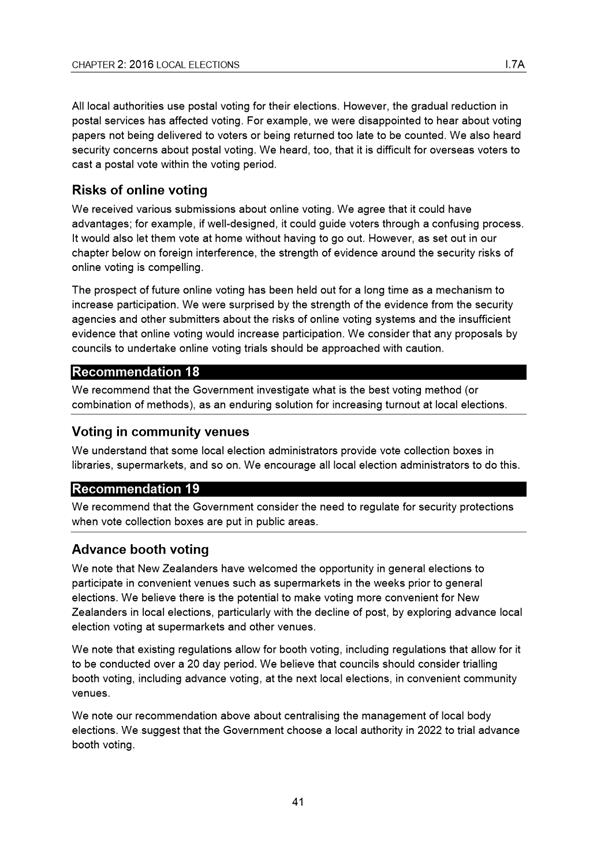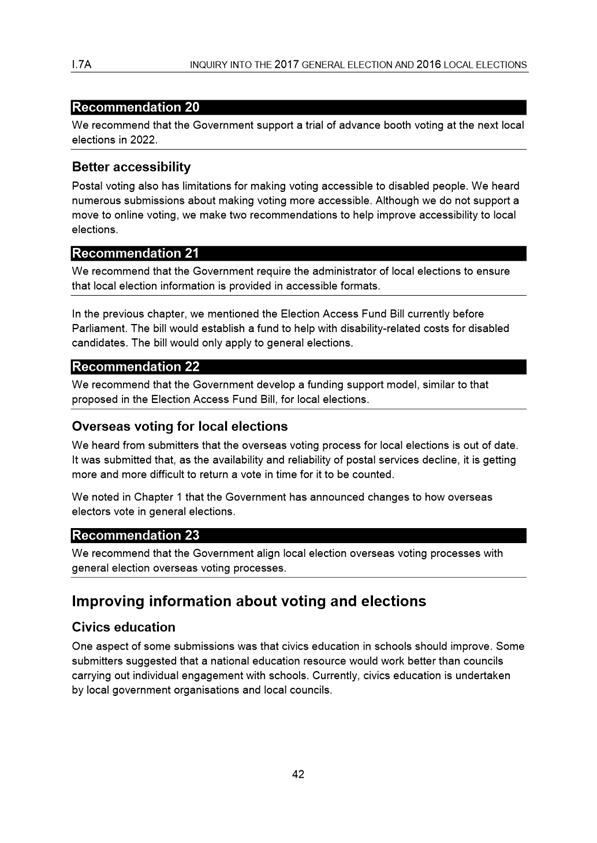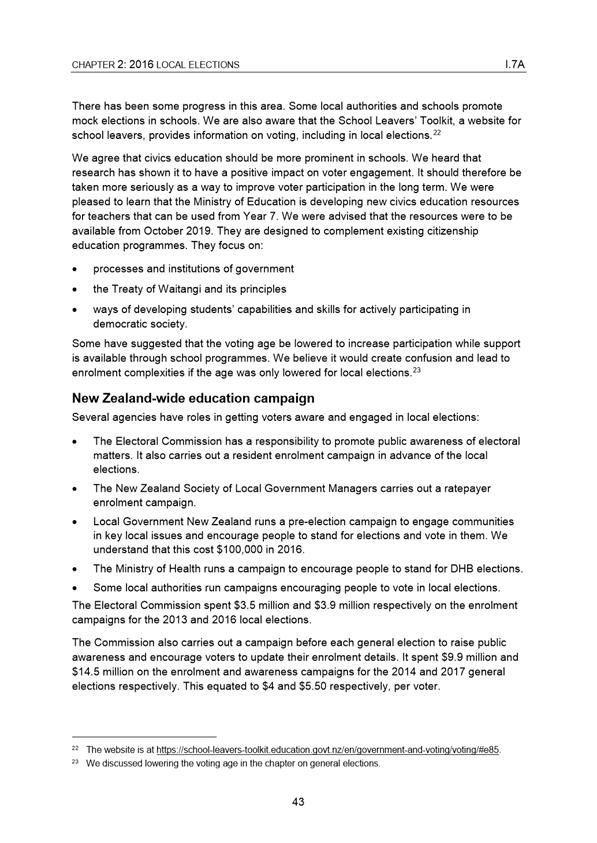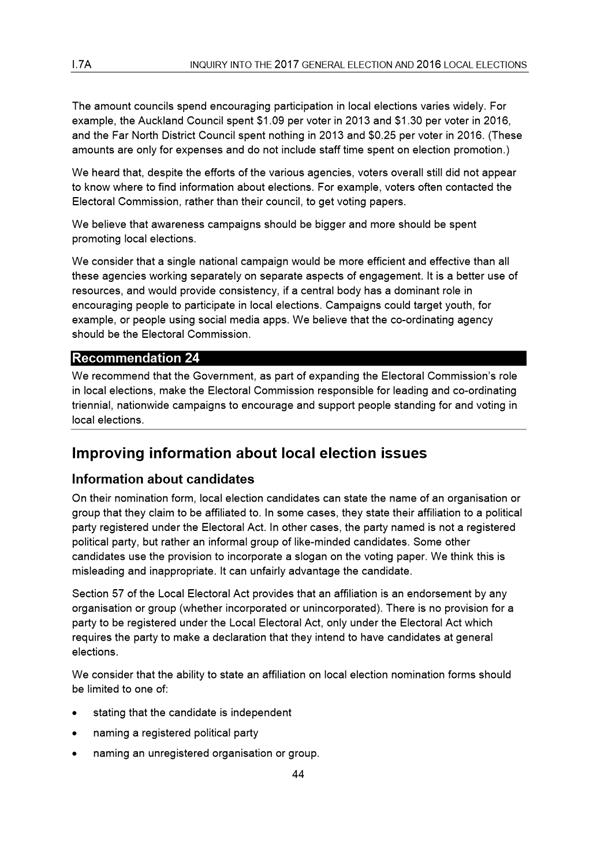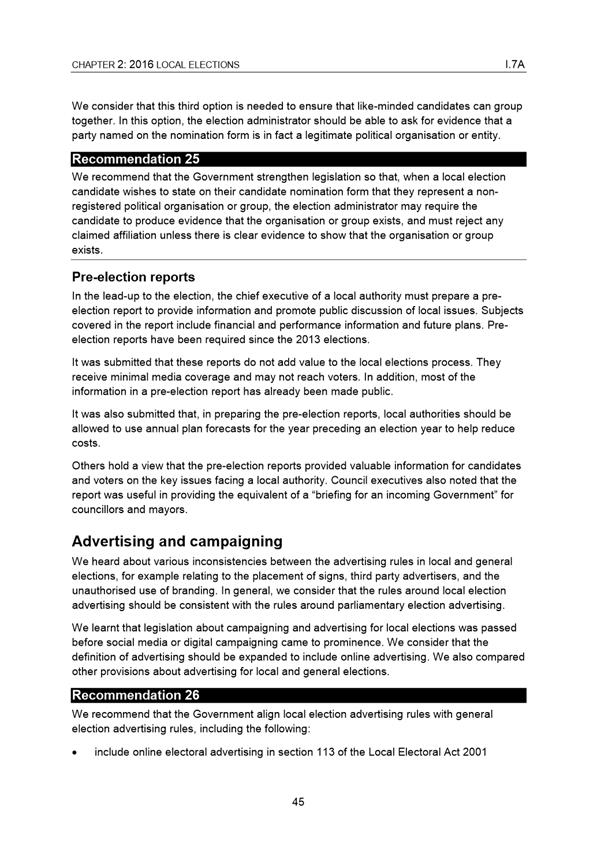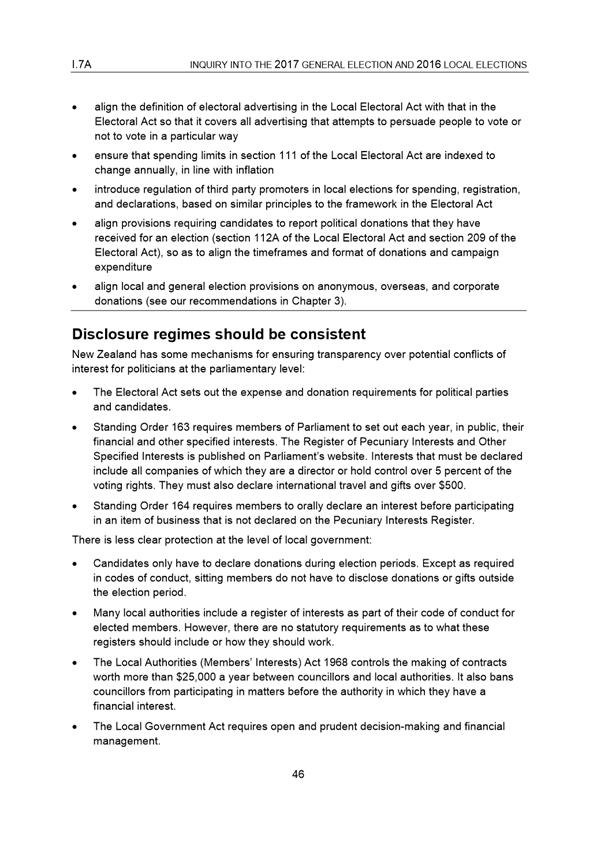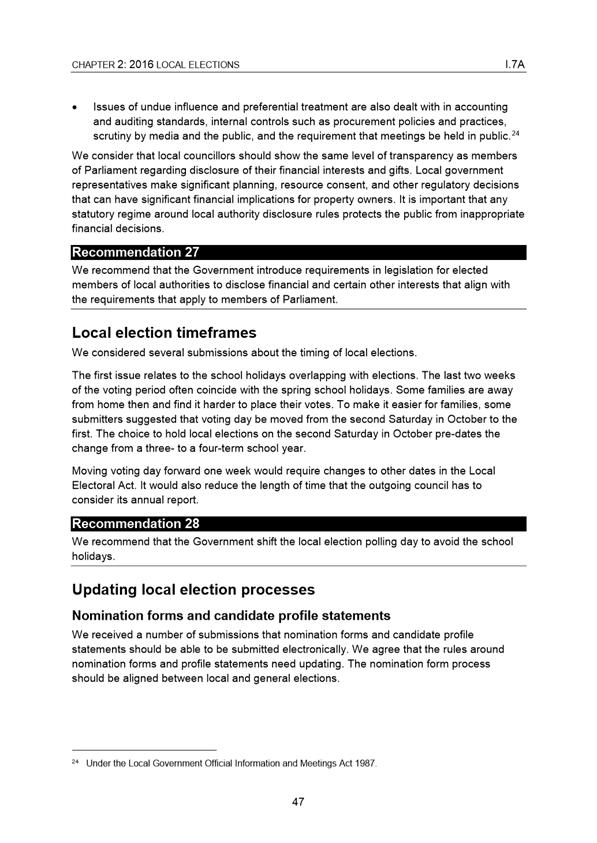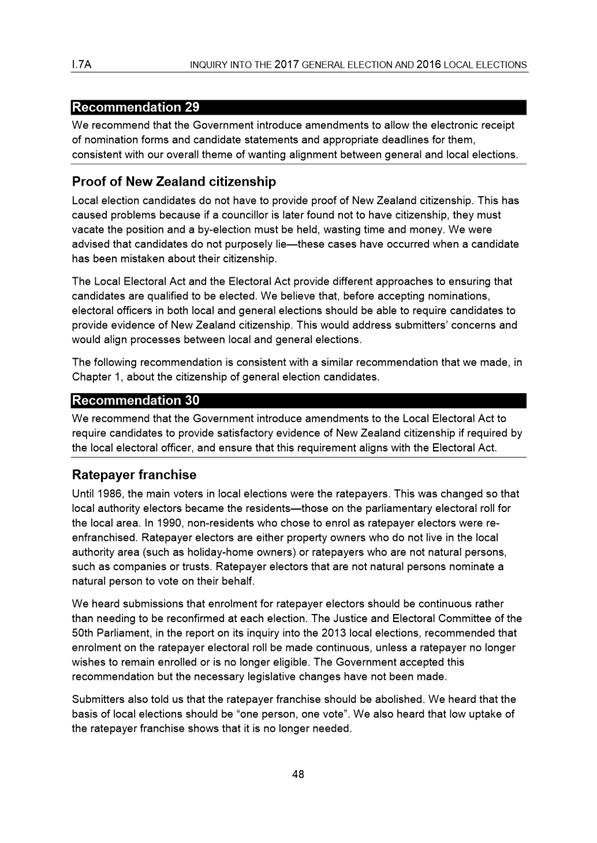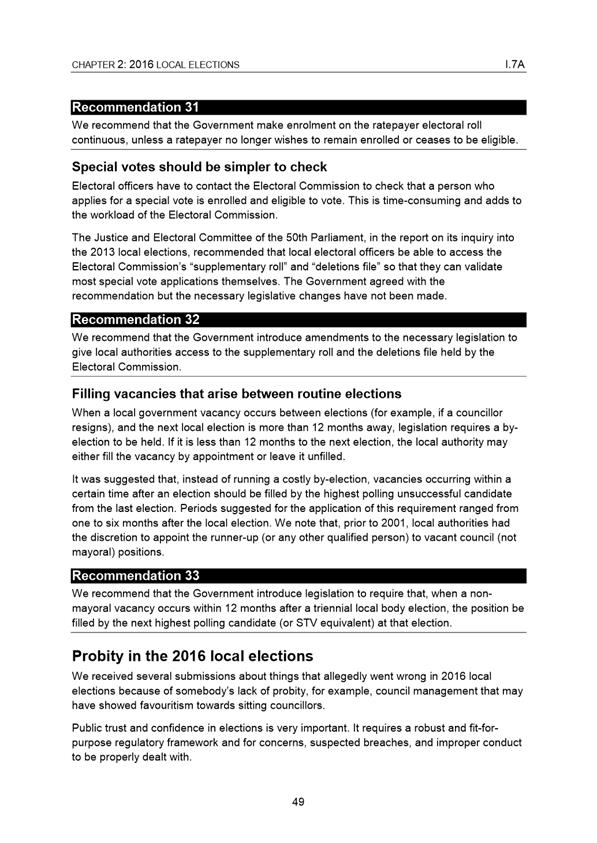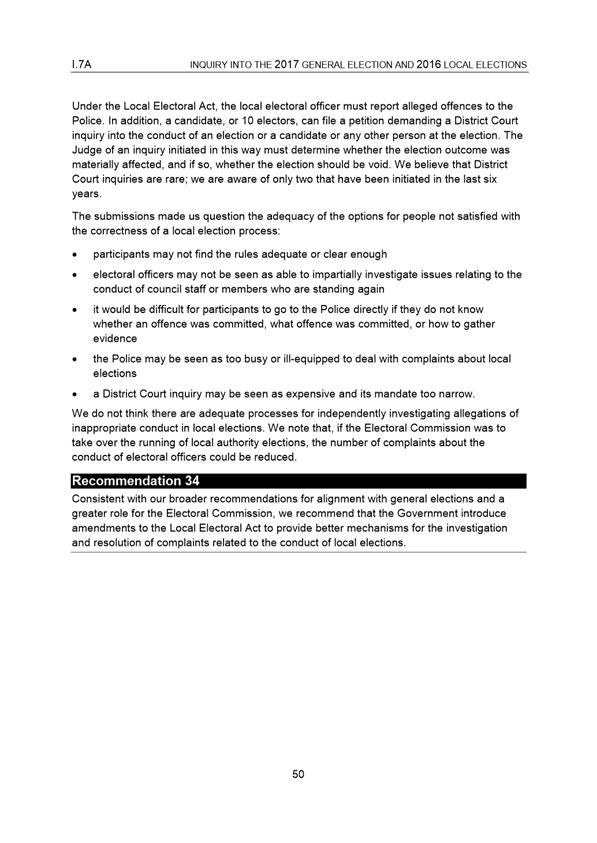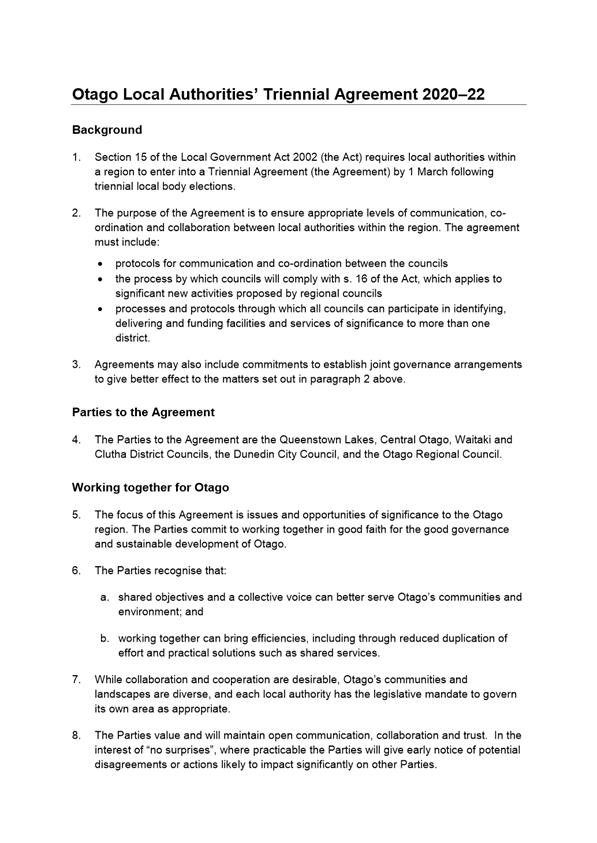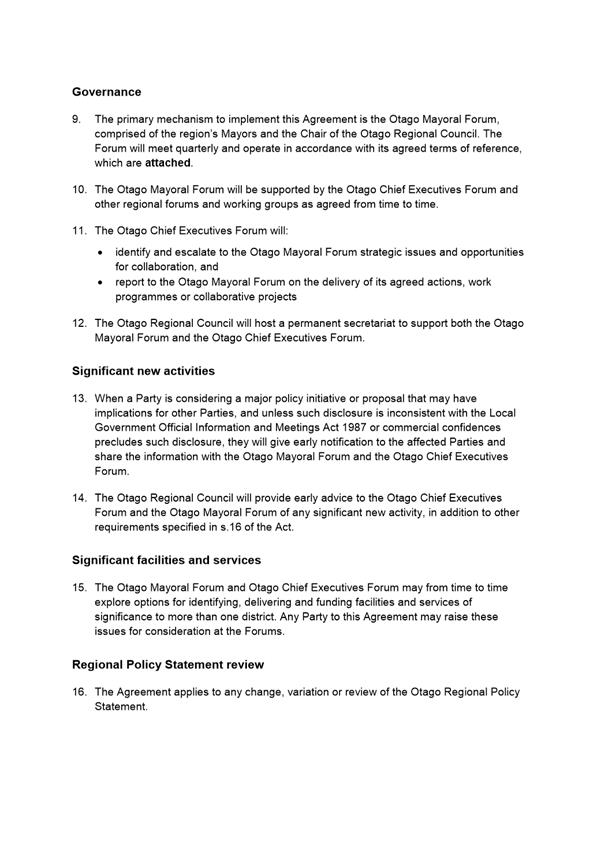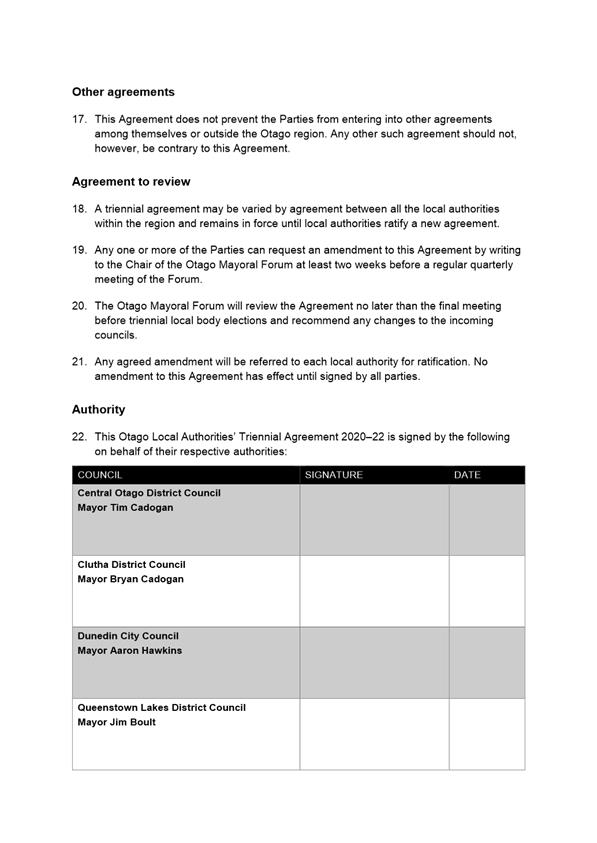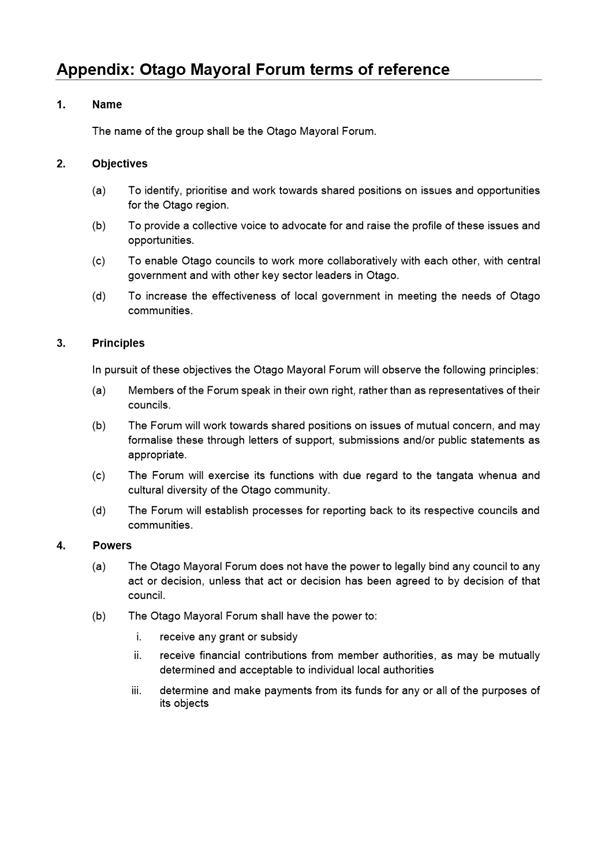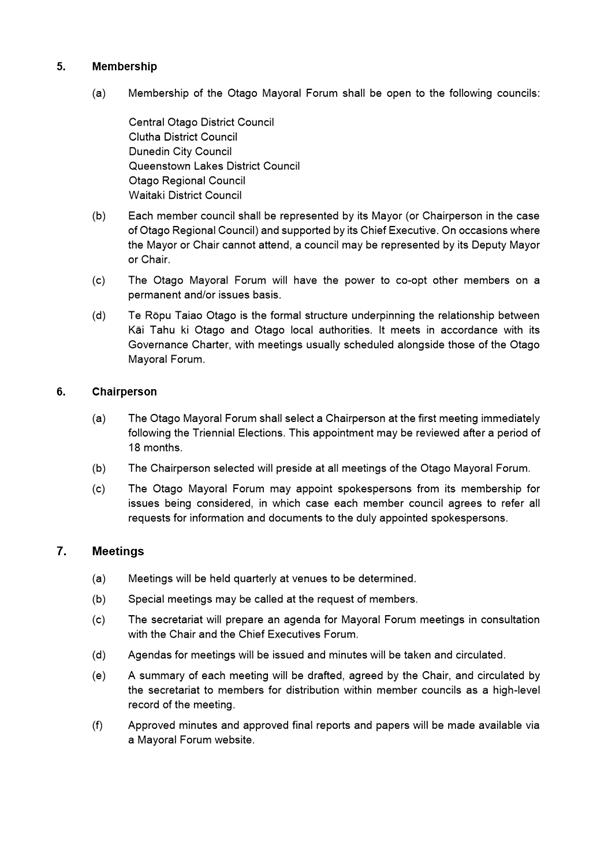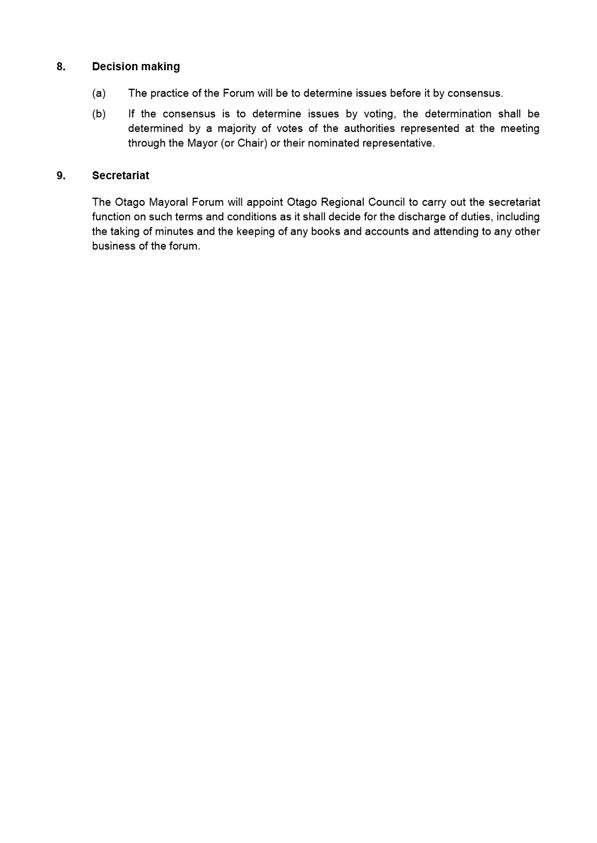Notice of Meeting:
I hereby give notice that an ordinary meeting of the Dunedin
City Council will be held on:
Date: Monday
24 February 2020
Time: 1.00
pm
Venue: Council
Chamber, Municipal Chambers, The Octagon, Dunedin
Sue Bidrose
Council
PUBLIC AGENDA
|
Mayor
|
Mayor Aaron Hawkins
|
|
|
Deputy Mayor
|
Cr Christine Garey
|
|
|
Members
|
Cr Sophie Barker
|
Cr David Benson-Pope
|
|
|
Cr Rachel Elder
|
Cr Doug Hall
|
|
|
Cr Carmen Houlahan
|
Cr Marie Laufiso
|
|
|
Cr Mike Lord
|
Cr Jim O'Malley
|
|
|
Cr Jules Radich
|
Cr Chris Staynes
|
|
|
Cr Lee Vandervis
|
Cr Steve Walker
|
|
|
Cr Andrew Whiley
|
|
Senior Officer Sue
Bidrose, Chief Executive Officer
Governance Support Officer Lynne
Adamson
Lynne Adamson
Governance Support Officer
Telephone: 03 477 4000
Lynne.Adamson@dcc.govt.nz
www.dunedin.govt.nz
Note: Reports
and recommendations contained in this agenda are not to be considered as
Council policy until adopted.
|

|
Council
24 February 2020
|
ITEM TABLE OF CONTENTS PAGE
1 Opening 5
2 Public
Forum 5
2.1 Public Forum -
ŌCASA - Ōtepoti Collective Against Sexual Abuse 5
2.2 Public Forum -
Sims Action Group 5
2.3 Public Forum - Out
of Zone Water Connection 5
2.4 Public Forum - Out
of Zone Water Connection 5
3 Apologies 5
4 Confirmation
of Agenda 5
5 Declaration
of Interest 6
6 Confirmation
of Minutes 19
6.1 Ordinary Council
meeting - 10 December 2019 19
6.2 Ordinary Council
meeting - 31 January 2020 20
6.3 Ordinary Council
meeting - 11 February 2020 21
Minutes
of Committees
7 Infrastructure
Services Committee - 10 February 2020 22
Minutes
of Community Boards
8 Waikouaiti
Coast Community Board - 20 November 2019 23
9 Otago
Peninsula Community Board - 21 November 2019 24
10 Strath
Taieri Community Board - 21 November 2019 25
11 West
Harbour Community Board - 27 November 2019 26
12 Mosgiel-Taieri
Community Board - 28 November 2019 27
13 Saddle
Hill Community Board - 28 November 2019 28
Reports
14 Application
for extraordinary water supply - 64 Scroggs Hill Road 29
15 Application
for extraordinary water supply - 16 Friends Hill Road 50
16 Review
of Mobile Trading and Temporary Stall Bylaw 70
17 Proposed
continuation of the Roading Bylaw 142
18 Independent
Review into Aurora Energy 155
19 Annual
Plan 2020/21 Community Engagement
The report on Community Engagement for the Annual Plan
will be finalised once we have received legal and audit advice which was
required following the Council decision on 11 February 2020 to modify the
Community Services Targeted Rate.
That advice will be received tomorrow at which point the
necessary changes will be made to the document and circulated to Councillors.
This will include the draft of the
consultation document and the options required given that the change in the
Community Services Targeted Rate has triggered an amendment to the Community
Plan.
20 Approval
to Grant Drainage Easements over Part of Ferntree Recreation Reserve 208
21 Update
on Growth Planning Work 223
22 Infrastructure
Funding and Financing Bill submission 278
23 DCC
submission: Taumata Arowai-the Water Services Regulator Bill 373
24 DCC
submission on Draft National Policy Statement for Indigenous Biodiversity 404
25 DCC
submission on Accelerating renewable energy and energy efficiency discussion
paper 415
26 DCC
submission on the Justice Committee Inquiry into the 2019 Local Elections 555
27 Triennial
Agreement 2020-22 577
Resolution to Exclude the Public 587
|

|
Council
24 February 2020
|
1 Opening
Geoff Mitchell from the
Church of Jesus Christ of Latter-Day Saints will open the meeting with a
prayer.
2 Public
Forum
2.1 Public
Forum - ŌCASA - Ōtepoti Collective Against Sexual Abuse
Zoë
Hayes and Larissa Hinds wish to address the meeting on behalf of ŌCASA - Ōtepoti
Collective Against Sexual Abuse (formerly Rape Crisis Dunedin Inc) about
building a stronger relationship with the Dunedin City Council.
2.2 Public
Forum - Sims Action Group
Bill Southworth will be in attendance
to raise matters relating to the Opus Report on the Sims Building.
2.3 Public
Forum - Out of Zone Water Connection
Karen Yeritsyan, wishes to address
the meeting concerning the Out of Zone Water Connection for 64 Scroggs Hill
Road.
2.4 Public
Forum - Out of Zone Water Connection
John Nelson, wishes to address the
meeting concerning the Out of Zone Water Connection for 16 Friends Hill Road.
3 Apologies
An apology has been received from
Cr Andrew Whiley for absence and from Cr Jules Radich for lateness.
That the Council:
Accepts the apologies from
Cr Andrew Whiley for absence and Cr Jules Radich for lateness.
4 Confirmation
of agenda
Note:
Any additions must be approved by resolution with an explanation as to why they
cannot be delayed until a future meeting.
|

|
Council
24 February 2020
|
Declaration of Interest
EXECUTIVE SUMMARY
1. Members
are reminded of the need to stand aside from decision-making when a conflict arises
between their role as an elected representative and any private or other
external interest they might have.
2. Elected
members are reminded to update their register of interests as
soon as practicable, including amending the register at this meeting if
necessary.
3. Staff members are
reminded to update their register of interests as soon as practicable.
|
RECOMMENDATIONS
That the Council:
a) Notes/Amends
if necessary the Elected Members' Interest Register attached as Attachment A;
and
b) Confirms/Amends the proposed management plan for Elected Members' Interests.
c) Notes the
staff members’ Interest Register.
|
Attachments
|
|
Title
|
Page
|
|
⇩a
|
Councillor Register of
Intererst
|
7
|
|
⇩b
|
ELT Register of
Interest
|
16
|
|

|
Council
24 February 2020
|
Confirmation
of Minutes
Ordinary Council meeting - 10 December 2019
|
RECOMMENDATIONS
That the Council:
Confirms the public part of the minutes of
the Ordinary Council meeting held on 10 December 2019 as a correct record.
|
Attachments
|
|
Title
|
Page
|
|
⇨a
|
Minutes of Ordinary
Council meeting held on 10 December 2019 (Under Separate Cover 1)
|
|
|

|
Council
24 February 2020
|
Ordinary Council meeting - 31
January 2020
|
RECOMMENDATIONS
That the Council:
Confirms the public part of the minutes of
the Ordinary Council meeting held on 31 January 2020 as a correct record.
|
Attachments
|
|
Title
|
Page
|
|
⇨a
|
Minutes of Ordinary
Council meeting held on 31 January 2020 (Under Separate Cover 1)
|
|
|

|
Council
24 February 2020
|
Ordinary Council meeting - 11
February 2020
|
RECOMMENDATIONS
That the Council:
Confirms the public part of the minutes of
the Ordinary Council meeting held on 11 February 2020 as a correct record.
|
Attachments
|
|
Title
|
Page
|
|
⇨a
|
Minutes of Ordinary
Council meeting held on 11 February 2020 (Under Separate Cover 1)
|
|
|

|
Council
24 February 2020
|
Minutes
of Committees
Infrastructure Services Committee - 10 February 2020
gg
|
RECOMMENDATIONS
That the Council:
a) Notes the
minutes of the Infrastructure Services
Committee meeting held on 10 February 2020.
|
Attachments
|
|
Title
|
Page
|
|
⇨a
|
Minutes of
Infrastructure Services Committee held on 10 February 2020 (Under Separate
Cover 1)
|
|
|

|
Council
24 February 2020
|
Minutes
of Community Boards
Waikouaiti Coast Community Board - 20 November 2019
gg
|
RECOMMENDATIONS
That the Council:
a) Notes the
minutes of the Waikouaiti Coast Community
Board meeting held on 20 November 2019.
|
Attachments
|
|
Title
|
Page
|
|
⇨a
|
Minutes of Waikouaiti
Coast Community Board held on 20 November 2019 (Under Separate Cover 1)
|
|
|

|
Council
24 February 2020
|
Otago Peninsula Community
Board - 21 November 2019
gg
|
RECOMMENDATIONS
That the Council:
a) Notes the
minutes of the Otago Peninsula
Community Board meeting held on 21 November 2019.
|
Attachments
|
|
Title
|
Page
|
|
⇨a
|
Minutes of Otago
Peninsula Community Board held on 21 November 2019 (Under Separate Cover
1)
|
|
|

|
Council
24 February 2020
|
Strath Taieri Community Board
- 21 November 2019
gg
|
RECOMMENDATIONS
That the Council:
a) Notes the
minutes of the Strath Taieri Community
Board meeting held on 21 November 2019.
|
Attachments
|
|
Title
|
Page
|
|
⇨a
|
Minutes of Strath
Taieri Community Board held on 21 November 2019 (Under Separate Cover 1)
|
|
|

|
Council
24 February 2020
|
West Harbour Community Board
- 27 November 2019
gg
|
RECOMMENDATIONS
That the Council:
a) Notes the
minutes of the West Harbour Community
Board meeting held on 27 November 2019.
|
Attachments
|
|
Title
|
Page
|
|
⇨a
|
Minutes of West Harbour
Community Board held on 27 November 2019 (Under Separate Cover 1)
|
|
|

|
Council
24 February 2020
|
Mosgiel-Taieri Community
Board - 28 November 2019
gg
|
RECOMMENDATIONS
That the Council:
a) Notes the
minutes of the Mosgiel-Taieri Community
Board meeting held on 28 November 2019
|
Attachments
|
|
Title
|
Page
|
|
⇨a
|
Minutes of
Mosgiel-Taieri Community Board held on 28 November 2019 (Under Separate
Cover 1)
|
|
|

|
Council
24 February 2020
|
Saddle Hill Community Board -
28 November 2019
gg
|
RECOMMENDATIONS
That the Council:
a) Notes the
minutes of the Saddle Hill Community
Board meeting held on 28 November 2019.
|
Attachments
|
|
Title
|
Page
|
|
⇨a
|
Minutes of Saddle Hill
Community Board held on 28 November 2019 (Under Separate Cover 1)
|
|
|

|
Council
24 February 2020
|
Reports
Application for extraordinary water supply -
64 Scroggs Hill Road
Department: 3 Waters and City Development
EXECUTIVE SUMMARY
1 This
report seeks the Council’s decision on an application for an
‘extraordinary’ water supply for 64 Scroggs Hill Road, Brighton.
2 Under
the terms of the Dunedin City Council Water Bylaw 2011 (the Bylaw), 64 Scroggs
Hill Road is not automatically entitled to a reticulated water supply because
it is outside of the defined water supply area.
3 The
analysis in this report found that providing an extraordinary water supply
connection to 64 Scroggs Hill Road would not be consistent with the
objectives of Dunedin’s strategic framework, the Bylaw and the
DCC’s Second Generation District Plan (2GP), would have several technical
disadvantages, and would risk setting a precedent and having a cumulative
impact.
|
RECOMMENDATIONS
That the Council:
a) Declines the
application for an ‘extraordinary’ water supply for 64 Scroggs
Hill Road.
|
BACKGROUND
Water Bylaw 2011 and Council policies
and processes
4 The
Bylaw is the key regulatory tool for managing Dunedin’s water supply
system. The Bylaw provides for reticulated water supply to properties within
defined water supply areas, or beyond those areas to properties with
residential zoning (where supply is possible). Clause 2 of the Bylaw provides
for the Council, at its discretion and under certain conditions, to approve an
existing or new water supply connection for a property outside the boundary of
the water supply area as an ‘extraordinary supply’.
5 On
26 July 2011, after the Council adopted the Bylaw, the Infrastructure Services
Committee (ISCOM) adopted a process for considering applications for new
extraordinary (out of water supply area) water supply connections and to
formalise existing extraordinary (out of water supply area) water connections
to properties that had not previously been paying for water services. For new
applications, the feasibility and benefit to the city must be considered in
terms of the following key factors:
a) Strategic;
b) Technical;
c) Cumulative
impact; and
d) Commercial.
Historical approaches
6 Water
supply arrangements across Dunedin vary, due in part to different historical
approaches to water infrastructure management by the DCC and previous local
authorities within the present-day territorial boundaries of the DCC (for
example, the Silverpeaks County Council). Some properties located outside of
the water supply areas defined by the Bylaw have long-standing water supplies
that were established by agreement with the relevant local authority at the
time and subsequently paid for in accordance with the terms of that
agreement.
Council decisions on new
extraordinary water supply connections since 2011
7 Since
2011, the Council has considered nine applications for new extraordinary (out
of water supply area) water connections. Several applications sought multiple
connections. Out of 15 connections requested by applicants, the Council
declined seven and approved eight.
8 Eight
of the nine applications were made during the period 2011 to 2014. More
recently, in October 2019, the Council declined an application to extend the
water supply area boundary and provide an ‘extraordinary’ water
supply to a property on Portobello Road. The staff
assessment of the application found that approving the application would not
meet the DCC’s strategic direction, would risk setting a precedent and
having a cumulative impact, would not be technically feasible, and would not be
commercially feasible and beneficial for Dunedin or the DCC.
Property and application
9 The
property at 64 Scroggs Hill Road is zoned Rural Residential 1 under the 2GP,
has an area of 2.0019ha and an existing dwelling. The 2GP does not provide for
any additional residential units to be built on sites of this size when zoned
Rural Residential 1.
10 The
property is located adjacent to, but outside, the boundary of the water supply
area defined in the Bylaw. The property does not receive a water supply from
the DCC and is also self-servicing for wastewater treatment and disposal. The
differential category ‘lifestyle’ is applied to the property for
rating purposes. The DCC does not charge the property any rates for water
supply or drainage.
11 A
map showing the property, the boundary of the water supply area and water supply
infrastructure is attached to this report as Attachment A. As shown on the map,
a 200mm diameter water main for transporting bulk water (distribution main)
runs past the property boundary in the road reserve. The map at Attachment B
shows the 2GP zoning of the property.
12 On
22 November 2019, the property owner applied to the DCC for an extraordinary
water supply for domestic purposes at 64 Scroggs Hill Road. The application
outlines the current water supply system at 64 Scroggs Hill Road, which involves
rainwater collection, a 25000-litre storage tank and an electric pump.
Disadvantages of this system identified in the application include reliance on
electricity, the cost of maintaining the system, and public health concerns
arising from issues with quantity and quality of the water supplied by the
private system.
Neighbouring properties
13 There
are four existing extraordinary water supplies fed from direct connections to
the distribution main in Scroggs Hill Road. These extraordinary supplies
service properties with rural and rural residential zoning that are located
outside of the water supply area. These connections were established before the
introduction of the Bylaw.
14 In
2019, the DCC granted resource consent to subdivide 24B and 54 Scroggs Hill
Road into 26 residential lots and roading (SUB-2019-84). Some of the lots will
share boundaries with 64 Scroggs Hill Road. The subdivision is zoned Township
and Settlement under the 2GP and is located within the boundary of the water
supply area. Each residential lot will be entitled to a reticulated water
supply.
DISCUSSION
15 This
application is for a new extraordinary water supply connection to a rural
residential property located outside of (but bordering) the water supply area
defined in the Bylaw. The analysis in this report applies the four key factors
considered for new connections.
Strategic
considerations
16 Providing
a new extraordinary connection for a rural residential property that would not
otherwise be entitled to a reticulated water supply from the DCC does not align
with the objectives of Dunedin’s strategic
framework as outlined below.
Spatial Plan and 2GP
17 Ad-hoc
connections of individual properties to reticulated services do not align with
the overall urban form objective of Dunedin’s Spatial Plan or the zoning
intent of the 2GP. The overall urban form objective of the Spatial Plan is a
“compact city with resilient townships”. The 2GP endeavours to
protect the environment while providing for the social, cultural and economic
well-being of current and future generations. Land use is controlled through
zoning. Zoning identifies suitable locations for different types of activities
to be established subject to meeting appropriate performance standards,
including infrastructure requirements.
18 Rural
and Rural Residential zone requirements seek to protect rural productivity and
amenity. No connection to the DCC’s water or wastewater infrastructure is
required for properties in these zones as self-servicing is considered
appropriate in the rural environment. In general, provision of a reticulated
water supply can lead to intensification of development and expectations for
additional services.
19 The
zoning approach ensures the DCC’s investment in infrastructure is
concentrated in specific areas, enabling a cost-effective and sustainable
approach to managing infrastructure while curbing inappropriate expansion.
Fringe development puts unplanned pressure on existing infrastructure and
diverts capacity allocated for development on appropriately zoned land.
20 Variation
2 to the 2GP was initiated by Council on 12 February 2019. Variation 2 is
focused on the provision of additional urban development capacity areas
(serviced land) to meet Dunedin’s future housing needs. This will
require an infrastructure capacity assessment and the identification of future
infrastructure works to enable urban development. Any expansion of
residential zoned land, which would require the water supply area boundary to
be extended will be considered through this process.
3 Waters Strategy
21 The
3 Waters Strategic Direction Statement 2010-2060 (3 Waters Strategy) identifies
seven key strategic priorities, including: “We will meet the water needs
of the city for the next 50 years from existing water sources.” The
ability of the DCC to achieve this priority was based on forecast demand within
the boundaries of the water supply areas defined in the Bylaw. New
extraordinary water supplies are unanticipated and, cumulatively, may
compromise the DCC’s ability to meet the city’s water needs from
existing sources.
Other strategic
considerations
22 A
holistic, city-wide assessment of where the DCC might expand provision of 3
Waters services is the fairest and most appropriate way to address new requests
for servicing, and supports the DCC to deliver services to communities in a
cost-effective, sustainable and coordinated manner.
23 Scoping
work has begun on a water and sanitary services assessment, the purpose of
which is to strategically assess the adequacy of current servicing arrangements
across the entire city. The assessment will include consideration of Government
proposals emerging from water-related reform initiatives. In addition,
extraordinary connections to properties outside the boundary of the water
supply area are being considered as part of the review of the Water Bylaw
2011.
Technical considerations
24 Providing
an extraordinary water supply to 64 Scroggs Hill Road would have technical
disadvantages.
Availability of appropriate
infrastructure to establish a connection
25 Water
supply connections for individual properties are typically made to a DCC
reticulation main located in road reserve adjacent to the property boundary. As
64 Scroggs Hill Road is outside of the water supply area, there is no DCC
reticulation main adjacent to the property boundary.
26 However,
a 200mm diameter distribution main passes the property boundary in Scroggs Hill
Road. This distribution main supplies treated water to a reservoir and
reticulation networks in Brighton.
27 Distribution
mains are designed to transfer bulk water to reservoirs and reticulation
systems and, as such, are assets of high strategic importance within the water
supply system. Direct connections to distribution mains are not recommended as
they place restraints on the DCC’s ability to operate the distribution
main effectively.
28 It
is acknowledged there are historical connections to the distribution main in
Scroggs Hill Road. These connections service properties both inside the water
supply area boundary and outside the water supply area boundary. However, it is
not good practice to allow direct connections to strategic infrastructure. If the Council decided to provide an extraordinary water
supply to 64 Scroggs Hill Road, the DCC would need to install approximately 50
metres of new reticulation main in Scroggs Hill Road.
Water pressure
29 Based
on a hydraulic modelling simulation, the property at 64 Scroggs Hill Road
cannot be supplied with water at pressure within the DCC’s target range.
While the water pressure could be boosted through use of a private water pump,
providing a water supply to the property would have impacts on the DCC’s
ability to provide water pressure within the target range to other properties
in the neighbourhood that are automatically entitled to a water supply under
the Bylaw.
30 The
DCC planner’s report on the subdivision consent application for 24B and
54 Scroggs Hill Road noted that the DCC would not be able to supply all the
proposed lots with water pressure within the DCC’s target range, and that
a water booster pump may be required in the design of the development.
Impact on on-site wastewater
treatment and disposal system
31 Introduction
of a reticulated water supply may increase wastewater volumes, with the
potential to have adverse effects on the performance of a property’s
on-site wastewater treatment and disposal system (septic tank and effluent
disposal field).
32 Any
changes to the on-site wastewater treatment and disposal system at 64 Scroggs
Hill Road to accommodate higher wastewater volumes would be subject to relevant
building and environmental regulations.
33 The
DCC does not have a specific policy on the provision of reticulated water
supply to properties serviced by private, on-site wastewater systems. The DCC
supplies water to some parts of Dunedin, including Outram and Waitati, where it
does not provide a wastewater service.
Cumulative impact
34 Providing
a new extraordinary water supply connection to a property in a rural or rural
residential zone sets a perceived precedent that may increase expectations from
other property owners on Dunedin’s rural-urban fringes for water supply.
Providing unplanned water supply connections on a case-by-case basis could have
a cumulative impact, including on the DCC’s ability to supply the city
from existing water sources (in accordance with objectives of the 3 Waters
Strategy) and to supply existing water customers with water pressure within the
DCC’s target range.
35 Making
servicing decisions on a case-by-case basis is not a responsible approach to
managing infrastructure. The fairest and most appropriate way to address new
requests for servicing and associated infrastructure requirements is through a
holistic, city-wide assessment of servicing arrangements that considers the
needs of all Dunedin residents.
Commercial considerations
36 If
the Council decided to provide an extraordinary water supply to 64 Scroggs Hill
Road, the New Reticulated Utility Services (Water, Wastewater or Stormwater)
Policy 2010 (Attachment C) would require the applicant to contribute part or
all of the capital cost of installing new reticulation infrastructure necessary
to provide a supply. Providing an extraordinary water supply to 64 Scroggs
Hill Road would enable the DCC to collect revenue through volumetric charging
and associated meter fees.
37 However,
the cumulative impact of providing unplanned water supply connections on a
case-by-case basis could lead to unbudgeted costs for the DCC in the long-term
if, for example, network upgrades were required to maintain water pressure to
nearby properties that are automatically entitled to a water supply.
OPTIONS
38 The
Council must determine whether to approve or decline the application to provide
an ‘extraordinary’ water supply to 64 Scroggs Hill Road.
Option
One – Decline the application (Recommended Option)
39 Decline
the application for an ‘extraordinary’ water supply connection for
64 Scroggs Hill Road, as providing an ‘extraordinary’ water supply
connection to 64 Scroggs Hill Road would not be consistent with Dunedin’s
strategic objectives, the Water Bylaw 2011 and the 2GP, would have technical
disadvantages, and would risk setting a precedent and having a cumulative
impact.
40 Continue
to consider expansion of servicing through holistic, city-wide processes such
as 2GP processes, a water and sanitary services assessment and review of the
Water Bylaw 2011.
Advantages
· Supports
Dunedin’s strategic objectives and a cost-effective, sustainable and
coordinated approach to infrastructure management.
· Consistent
with the intent of the Water Bylaw 2011 and the 2GP.
· Avoids
contributing to cumulative impacts on Dunedin’s water supply system.
· Servicing
needs are considered on a holistic, city-wide basis, in line with
Dunedin’s strategic objectives and a cost-effective, sustainable and
coordinated approach to infrastructure management.
Disadvantages
· The
applicant is unlikely to be satisfied with the decision, as they will continue
to be responsible for managing the water supply needs for their home.
· The
decision may be considered inconsistent with previous decisions to approve new
‘extraordinary’ water supply connections.
Option
Two – Approve the application
41 Approve
provision of an extraordinary water supply to 64 Scroggs Hill Road, subject to:
a) payment
(by the applicant) of a capital contribution towards the installation of new
reticulation infrastructure in Scroggs Hill Road, as determined by 3 Waters
staff through the New Reticulated Utility Services (Water, Wastewater or
Stormwater) Policy 2010;
b) the
terms and conditions of the Water Bylaw 2011, including that the supply will be
metered and subject to volumetric charging;
c) payment
(by the applicant) of other required fees and charges, including a network
contribution fee of $5000; and
d) installation
(by the applicant) of a reduced pressure zone (RPZ) backflow prevention device.
Advantages
· The
applicant will be satisfied with the decision, as they will receive a
reticulated water supply for use at their home.
Disadvantages
· Inconsistent
with a holistic, city-wide approach to considering servicing needs, which is
the fairest and most appropriate way to evaluate servicing issues.
· Inconsistent
with Dunedin’s strategic objectives.
· Inconsistent
with a cost-effective, sustainable and coordinated approach to infrastructure
management.
· Inconsistent
with the intent of the Water Bylaw 2011 and the 2GP.
· Sets
a perceived precedent that may increase expectations from other property owners
on Dunedin’s rural-urban fringes for water supply.
· Requires
establishing a new connection to a distribution main, which is not recommended
due to technical disadvantages in terms of infrastructure operability.
· Property
cannot be supplied with water pressure within the DCC’s target range.
· Provision
of a water supply to this property would have impacts on DCC’s ability to
provide water pressure within the target range to other properties in the
neighbourhood that are entitled to a water supply under the Bylaw.
· Contributes
to cumulative impacts on the water supply network and
may contribute to unbudgeted costs to the DCC in the long-term.
NEXT STEPS
42 The
applicant will be informed of the Council’s decision.
43 Should
the Council approve the application (Option Two), the DCC will work with
the applicant to arrange for the property to be connected to the DCC water
supply system (subject to the conditions mentioned above).
Signatories
|
Author:
|
Scott Campbell - Policy Analyst
Paul Freeland - Senior Planner
|
|
Authoriser:
|
Tom Dyer - Group Manager 3 Waters
Simon Drew - General Manager Infrastructure Services
|
Attachments
|
|
Title
|
Page
|
|
⇩a
|
64 Scroggs Hill Road -
water supply area boundary and water supply infrastructure
|
39
|
|
⇩b
|
64 Scroggs Hill Road -
Second Generation District Plan (2GP) zoning
|
41
|
|
⇩c
|
New Reticulated Utility
Services (Water, Wastewater or Stormwater) Policy 2010
|
43
|
|
SUMMARY OF CONSIDERATIONS
|
|
Fit with purpose
of Local Government
Declining the application promotes the economic, social
and environmental well-being of communities in the present and for the future
by supporting a cost-effective, sustainable and coordinated approach to
infrastructure management, the objectives of Dunedin’s 3 Waters
Strategy and Spatial Plan, and the zoning intent of the Second Generation
District Plan (2GP).
|
|
Fit with strategic
framework
|
|
Contributes
|
Detracts
|
Not applicable
|
|
Social Wellbeing Strategy
|
☐
|
☐
|
☒
|
|
Economic Development Strategy
|
☐
|
☐
|
☒
|
|
Environment Strategy
|
☐
|
☐
|
☒
|
|
Arts and Culture Strategy
|
☐
|
☐
|
☒
|
|
3 Waters Strategy
|
☒
|
☐
|
☐
|
|
Spatial Plan
|
☒
|
☐
|
☐
|
|
Integrated Transport Strategy
|
☐
|
☐
|
☒
|
|
Parks and Recreation Strategy
|
☐
|
☐
|
☒
|
|
Other strategic projects/policies/plans
|
☒
|
☐
|
☐
|
Declining the application is consistent with the
objectives of the strategic framework above, including the 3 Waters Strategy
and Spatial Plan, the Water Bylaw 2011 and the 2GP.
|
|
Māori Impact
Statement
There are no identified impacts for tangata whenua.
|
|
Sustainability
Declining the application supports the long-term
sustainability of Dunedin’s water supply system.
|
|
LTP/Annual Plan /
Financial Strategy /Infrastructure Strategy
Declining the application has no implications for the
Infrastructure Strategy, Annual Plan and 10 year plan.
|
|
Financial
considerations
Declining the application has no implications for existing
budgets.
|
|
Significance
The significance of this decision is considered low in
terms of the Council’s Significance and Engagement Policy.
|
|
Engagement –
external
There has been no external engagement.
|
|
Engagement -
internal
3 Waters and City Development staff contributed to the
preparation of this report.
|
|
Risks: Legal /
Health and Safety etc.
There are no known risks.
|
|
Conflict of
Interest
No conflicts of interest have been identified.
|
|
Community Boards
The property at 64 Scroggs Hill Road is in the Saddle Hill
Community Board area and staff have discussed the application with the Board
Chair.
|
|

|
Council
24 February 2020
|

|

|
Council
24 February 2020
|

|

|
Council
24 February 2020
|
Application for extraordinary water supply -
16 Friends Hill Road
Department: 3 Waters and City Development
EXECUTIVE SUMMARY
1 This
report seeks the Council’s decision on an application for an
‘extraordinary’ water supply for 16 Friends Hill Road, Wingatui.
2 Under
the terms of the Dunedin City Council Water Bylaw 2011 (the Bylaw), 16 Friends
Hill Road is not automatically entitled to a reticulated water supply because
it is outside of the defined water supply area.
3 The
analysis in this report found that providing an extraordinary water supply
connection to 16 Friends Hill Road would not be consistent with the objectives
of Dunedin’s strategic framework, the Bylaw and the DCC’s Second
Generation District Plan (2GP), would have several technical disadvantages, and
would risk setting a precedent and having a cumulative impact.
|
RECOMMENDATIONS
That the Council:
a) Declines the
application for an ‘extraordinary’ water supply for 16 Friends
Hill Road
|
BACKGROUND
Water Bylaw 2011 and Council policies and processes
4 The
Bylaw is the key regulatory tool for managing Dunedin’s water supply
system. The Bylaw provides for reticulated water supply to properties within
defined water supply areas, or beyond those areas to properties with
residential zoning (where supply is possible). Clause 2 of the Bylaw provides
for the Council, at its discretion and under certain conditions, to approve an
existing or new water supply connection for a property outside the boundary of
the water supply area as an ‘extraordinary supply’.
5 On
26 July 2011, after the Council adopted the Bylaw, the Infrastructure Services
Committee (ISCOM) adopted a process for considering applications for new
extraordinary (out of water supply area) water supply connections and to
formalise existing extraordinary (out of water supply area) water connections
to properties that had not previously been paying for water services. For new
applications, the feasibility and benefit to the city must be considered in
terms of the following key factors:
a) Strategic;
b) Technical;
c) Cumulative
impact; and
d) Commercial.
Historical approaches
6 Water
supply arrangements across Dunedin vary, due in part to different historical
approaches to water infrastructure management by the DCC and previous local
authorities within the present-day territorial boundaries of the DCC (for
example, the Silverpeaks County Council). Some properties located outside of
the water supply areas defined by the Bylaw have long-standing water supplies
that were established by agreement with the relevant local authority at the
time and subsequently paid for in accordance with the terms of that
agreement.
Council decisions on new
extraordinary water supply connections since 2011
7 Since
2011, the Council has considered nine applications for new extraordinary (out
of water supply area) water connections. Several applications sought multiple
connections. Out of 15 connections requested by applicants, the Council
declined seven and approved eight.
8 Eight
of the nine applications were made during the period 2011 to 2014. More
recently, in October 2019, the Council declined an application to extend the
water supply area boundary and provide an ‘extraordinary’ water
supply to a property on Portobello Road. The staff assessment of the application
found that approving the application would not meet the DCC’s strategic
direction, would risk setting a precedent and having a cumulative impact, would
not be technically feasible, and would not be commercially feasible and
beneficial for Dunedin or the DCC.
Property and application
9 The
property at 16 Friends Hill Road is zoned Hill Slopes Rural under the 2GP, has
an area of 4.9711ha and an existing dwelling. The 2GP does not provide for any
additional residential units to be built on sites of this size when zoned Hill
Slopes Rural.
10 The
property is located adjacent to, but outside, the boundary of the water supply
area defined in the Bylaw. The property does not receive a water supply from
the DCC and is self-servicing for wastewater treatment and disposal.
11 A
map showing the property and the boundary of the water supply area is attached
to this report as Attachment A. As shown on the map, two large water mains for
transporting bulk water (distribution mains) run past the property boundary in
the road reserve. The map at Attachment B shows the 2GP zoning of the
property.
12 On
22 December 2017, the property owner applied for a land use consent to operate
a commercial residential activity from the existing building on the property,
to accommodate a maximum of 14 guests. The application stated, “The
increase in bedrooms and resulting guest numbers will be catered for within the
current footprint of the existing building… and by the existing
infrastructure provided to the property plus the existing facilities within the
property”. However, the application also noted “the applicant
intends to apply to connect to the city water supply through its
contractor.”
13 On
16 February 2018, the DCC granted the land use consent (LUC-2018-1). The
consent decision certificate included an advice note stating that no
reticulated water supply is available to the proposed development. It also
referred to the process ISCOM adopted in 2011 for considering provision of
‘extraordinary’ water supplies to properties not provided for in
the Bylaw.
14 The
property is currently run as a bed and breakfast consisting eight bedrooms,
eight bathrooms and two kitchen units, staffed by a live-in manager. The differential category ‘commercial’ is
applied to the property for rating purposes. The DCC does not charge the
property any rates for water supply or drainage.
15 On
27 November 2019, a representative of the property owner applied to the DCC for
an extraordinary water supply for 16 Friends Hill Road. The application states
that the property’s current water supply arrangements – a
combination of rainwater collection and a bore – are unable to supply the
bed and breakfast with sufficient potable water on an ongoing basis.
Neighbouring properties
16 Two
other Friends Hill Road properties that are outside the boundary of the water
supply area have water supply connections. One was approved by the Taieri
County Council in 1977 and the other by the DCC in 1999. These connections are
to a 225mm distribution main located in Friends Hill Road.
DISCUSSION
17 This
application is for a new extraordinary water supply connection to a rural
property located outside of (but bordering) the water supply area defined in
the Bylaw. The analysis in this report applies the four key factors considered
for new connections.
Strategic
considerations
18 Providing
a new extraordinary connection for a rural property that would not otherwise be
entitled to a reticulated water supply from the DCC does not align with the
objectives of Dunedin’s strategic framework.
Spatial Plan and 2GP
19 Ad-hoc
connections of individual properties to reticulated services do not align with
the overall urban form objective of Dunedin’s Spatial Plan or the zoning
intent of the 2GP. The overall urban form objective of the Spatial Plan is a
“compact city with resilient townships”. The 2GP endeavours to
protect the environment while providing for the social, cultural and economic
well-being of current and future generations. Land use is controlled through
zoning. Zoning identifies suitable locations for different types of activities
to be established subject to meeting appropriate performance standards,
including infrastructure requirements.
20 Rural
and Rural Residential zone requirements seek to protect rural productivity and
amenity. No connection to the DCC’s water or wastewater infrastructure is
required for properties in these zones as self-servicing is considered
appropriate in the rural environment. In general, provision of a reticulated water
supply can lead to intensification of development and expectations for
additional services.
21 The
zoning approach ensures the DCC’s investment in infrastructure is
concentrated in specific areas, enabling a cost-effective and sustainable
approach to managing infrastructure while curbing inappropriate expansion.
Fringe development puts unplanned pressure on existing infrastructure and
diverts capacity allocated for development on appropriately zoned land.
22 Variation
2 to the 2GP was initiated by Council on 12 February 2019. Variation 2 is
focused on the provision of additional urban development capacity areas
(serviced land) to meet Dunedin’s future housing needs. This will
require an infrastructure capacity assessment and the identification of future
infrastructure works to enable urban development. Any expansion of
residential zoned land, which would require the urban water supply boundary to
be extended will be considered through this process.
3 Waters Strategy
23 The
3 Waters Strategic Direction Statement 2010-2060 (3 Waters Strategy) identifies
seven key strategic priorities, including: “We will meet the water needs
of the city for the next 50 years from existing water sources.” The
ability of the DCC to achieve this priority was based on forecast demand within
the boundaries of the water supply areas defined in the Bylaw. New
extraordinary water supplies are unanticipated and, cumulatively, may
compromise the DCC’s ability to meet the city’s water needs from
existing sources.
Other strategic considerations
24 A
holistic, city-wide assessment of where the DCC might expand provision of 3
Waters services is the fairest and most appropriate way to address new requests
for servicing, and supports the DCC to deliver services
to communities in a cost-effective, sustainable and coordinated manner.
25 Scoping
work has begun on a water and sanitary services assessment, the purpose of
which is to strategically assess the adequacy of current servicing arrangements
across the entire city. The assessment will include consideration of Government
proposals emerging from water-related reform initiatives. In addition,
extraordinary connections to properties outside the boundary of the water
supply area are being considered as part of the review of the Water Bylaw 2011.
Technical
considerations
26 Providing
an extraordinary water supply to 16 Friends Hill Road would have technical
disadvantages.
Availability of
appropriate infrastructure to establish a connection
27 Water
supply connections for individual properties are typically made to a DCC
reticulation main located in road reserve adjacent to the property boundary. As
16 Friends Hill Road is outside of the water supply area, there is no DCC
reticulation main adjacent to the property boundary.
28 However,
two distribution mains pass the property boundary in Friends Hill Road: a 225mm
diameter main and a 300mm diameter main. These distribution mains transport
bulk water from the Wingatui treated water reservoir to reticulation networks
in Wingatui, and reservoirs and reticulation networks in Mosgiel, Kinmont and
Braeside.
29 Distribution
mains are designed to transfer bulk water to reservoirs and reticulation
systems and, as such, are assets of high strategic importance within the water
supply system. Direct connections to distribution mains are not recommended as
they place restraints on the DCC’s ability to operate the distribution
main effectively.
30 It
is acknowledged there are historical connections to the 225mm distribution main
in Friends Hill. These connections service properties both inside the water
supply area boundary and outside the water supply area boundary. However, it is
not good practice to allow direct connections to strategic infrastructure. If
the Council decided to provide an extraordinary water supply to 16 Friends Hill
Road, the DCC would need to install approximately 165 metres of new
reticulation main in Friends Hill Road.
Water
pressure
31 Based
on a hydraulic modelling simulation, the property at 16
Friends Hill Road can be supplied with water at pressure within the DCC’s
target range.
Impact on on-site wastewater treatment and disposal system
32 The
land use consent decision certificate dated 16 February 2018 included an advice
note stating that the existing septic tank and effluent disposal system at 16
Friends Hill Road may require upgrading to accommodate increased wastewater
volumes resulting from the new activity. The wastewater effluent disposal
system at 16 Friends Hill Road was subsequently extended in November 2018.
33 Introduction
of a reticulated water supply may further increase wastewater volumes, with the
potential to have adverse effects on the performance of the property’s
on-site wastewater treatment and disposal system (septic tank and effluent
disposal field). Any further changes to the wastewater treatment and disposal
system at 16 Friends Hill Road would be subject to relevant building and
environmental regulations.
34 The
DCC does not have a specific policy on the provision of reticulated water
supply to properties serviced by private, on-site wastewater systems. The DCC
supplies water to some parts of Dunedin, including Outram and Waitati, where it
does not provide a wastewater service.
Cumulative impact
35 Providing
a new extraordinary water supply connection to a property in a rural or rural
residential zone sets a perceived precedent that may increase expectations from
other property owners on Dunedin’s rural-urban fringes for water supply.
Providing unplanned water supply connections on a case-by-case basis could have
a cumulative impact, including on the DCC’s ability to supply the city
from existing water sources (in accordance with the objectives of the 3 Waters
Strategy) and to supply existing water customers with water pressure within the
DCC’s target range.
36 Making
servicing decisions on a case-by-case basis is not a responsible approach to
managing infrastructure. The fairest and most appropriate way to address new
requests for servicing and associated infrastructure requirements is through a
holistic, city-wide assessment of servicing arrangements that considers the
needs of all Dunedin residents.
Commercial
considerations
37 If
the Council decided to provide an extraordinary water supply to 16 Friends Hill
Road, the New Reticulated Utility Services (Water, Wastewater or Stormwater)
Policy 2010 (Attachment C) would require the applicant to contribute part or
all of the capital cost of installing new reticulation infrastructure necessary
to provide a supply. Providing an extraordinary water supply to 16 Friends Hill
Road would enable the DCC to collect revenue through volumetric charging and
associated meter fees.
38 However,
the cumulative impact of providing unplanned water supply connections on a
case-by-case basis could lead to unbudgeted costs for the DCC in the long-term.
OPTIONS
39 The
Council must determine whether to approve or decline the application to provide
an ‘extraordinary’ water supply to 16 Friends Hill Road.
Option
One – Decline the application (Recommended Option)
40 Decline
the application for an ‘extraordinary’ water supply connection for
16 Friends Hill Road, as providing an ‘extraordinary’ water supply
connection to 16 Friends Hill Road would not be consistent with Dunedin’s
strategic objectives, the Water Bylaw 2011 and the 2GP, would have technical
disadvantages, and would risk setting a precedent and having a cumulative
impact.
41 Continue
to consider expansion of servicing through holistic, city-wide processes such
as 2GP processes, a water and sanitary services assessment and review of the
Water Bylaw 2011.
Advantages
· Supports
Dunedin’s strategic objectives.
· Consistent
with the intent of the Water Bylaw 2011 and the 2GP.
· Avoids
contributing to cumulative impacts on Dunedin’s water supply system.
· Servicing
needs are considered on a holistic, city-wide basis, in line with
Dunedin’s strategic objectives and a
cost-effective, sustainable and coordinated approach to infrastructure
management.
Disadvantages
· The
applicant is unlikely to be satisfied with the decision, as they will continue
to be responsible for managing the water supply needs for their business.
· The
decision may be considered inconsistent with previous decisions to approve new
‘extraordinary’ water supply connections.
Option
Two – Approve the application
42 Approve
provision of an extraordinary water supply to 16 Friends Hill Road, subject to:
a) payment
(by the applicant) of a capital contribution towards the installation of new
reticulation infrastructure in Friends Hill Road, as determined by 3 Waters
staff through the New Reticulated Utility Services (Water, Wastewater or
Stormwater) Policy 2010;
b) the
terms and conditions of the Water Bylaw 2011, including that the supply will be
metered and subject to volumetric charging;
c) payment
(by the applicant) of other required fees and charges, including a network
contribution fee of $5000; and
d) installation
(by the applicant) of a reduced pressure zone (RPZ) backflow prevention device.
Advantages
· The
applicant will be satisfied with the decision, as they will receive a
reticulated water supply for use at their business.
Disadvantages
· Inconsistent
with a holistic, city-wide approach to considering servicing needs, which is
the fairest and most appropriate way to evaluate servicing issues.
· Inconsistent
with Dunedin’s strategic objectives.
· Inconsistent
with a cost-effective, sustainable and coordinated approach to infrastructure
management.
· Inconsistent
with the intent of the Water Bylaw 2011 and the 2GP.
· Sets
a perceived precedent that may increase expectations from other property owners
on Dunedin’s rural-urban fringes for water supply.
· Requires
establishing a new connection to a distribution main, which is not recommended
due to technical disadvantages in terms of infrastructure operability.
· Contributes
to cumulative impacts on the water supply network and may contribute to
unbudgeted costs to the DCC in the long-term.
NEXT STEPS
43 The applicant
will be informed of the Council’s decision.
44 Should
the Council approve the application (Option Two), the DCC will work with the
applicant to arrange for the property to be connected to the DCC water supply
system (subject to the conditions mentioned above).
Signatories
|
Author:
|
Scott Campbell - Policy Analyst
Paul Freeland - Senior Planner
|
|
Authoriser:
|
Tom Dyer - Group Manager 3 Waters
Simon Drew - General Manager Infrastructure Services
|
Attachments
|
|
Title
|
Page
|
|
⇩a
|
16 Friends Hill Road -
water supply area boundary and water supply infrastructure
|
61
|
|
⇩b
|
16 Friends Hill Road -
Second Generation District Plan (2GP) zoning
|
63
|
|
⇩c
|
New Reticulated Utility
Services (Water, Wastewater or Stormwater) Policy 2010
|
64
|
|
SUMMARY OF CONSIDERATIONS
|
|
Fit with purpose
of Local Government
Declining the application promotes the economic, social
and environmental well-being of communities in the present and for the future
by supporting a cost-effective, sustainable and coordinated approach to
infrastructure management, the objectives of Dunedin’s 3 Waters
Strategy and Spatial Plan, and the zoning intent of the Second Generation
District Plan (2GP).
|
|
Fit with strategic
framework
|
|
Contributes
|
Detracts
|
Not applicable
|
|
Social Wellbeing Strategy
|
☐
|
☐
|
☒
|
|
Economic Development Strategy
|
☐
|
☐
|
☒
|
|
Environment Strategy
|
☐
|
☐
|
☒
|
|
Arts and Culture Strategy
|
☐
|
☐
|
☒
|
|
3 Waters Strategy
|
☒
|
☐
|
☐
|
|
Spatial Plan
|
☒
|
☐
|
☐
|
|
Integrated Transport Strategy
|
☐
|
☐
|
☒
|
|
Parks and Recreation Strategy
|
☐
|
☐
|
☒
|
|
Other strategic projects/policies/plans
|
☒
|
☐
|
☐
|
Declining the application is consistent with the
objectives of the strategic framework above, including the 3 Waters Strategy
and Spatial Plan, the Water Bylaw 2011 and the 2GP.
|
|
Māori Impact
Statement
There are no identified impacts for tangata whenua.
|
|
Sustainability
Declining the application supports the long-term
sustainability of Dunedin’s water supply system.
|
|
LTP/Annual Plan /
Financial Strategy /Infrastructure Strategy
Declining the application has no implications for the
Infrastructure Strategy, Annual Plan and 10 year plan.
|
|
Financial
considerations
Declining the application has no implications for existing
budgets.
|
|
Significance
The significance of this decision is considered low in
terms of the Council’s Significance and Engagement Policy.
|
|
Engagement –
external
There has been no external engagement.
|
|
Engagement -
internal
3 Waters and City Development staff contributed to the
preparation of this report.
|
|
Risks: Legal /
Health and Safety etc.
There are no known risks.
|
|
Conflict of
Interest
No conflicts of interest have been identified.
|
|
Community Boards
The property at 16 Friends Hill Road is in the
Mosgiel-Taieri Community Board area and the application has been discussed
with the Community Board Chair.
|
|

|
Council
24 February 2020
|

|

|
Council
24 February 2020
|

|

|
Council
24 February 2020
|
Review of Mobile Trading and Temporary Stall
Bylaw
Department: Corporate Policy
EXECUTIVE SUMMARY
1 This
report seeks approval for a draft Trading in Public Places Bylaw and draft
Statement of Proposal (SOP) to be used for consultation using the special
consultative procedure.
2 A
new bylaw is proposed as a result of reviewing the current Mobile Trading and
Temporary Stall Bylaw (MTTS bylaw). New activities proposed in the new bylaw
are rental scheme operations such as electric scooter (e-scooter) schemes,
commercial use of footpaths, street fundraising, street performing and footpath
art.
3 See
Attachment A for the proposed Trading in Public Places Bylaw.
4 A
statement of proposal outlines the proposed changes. See Attachment B for the
proposed statement of proposal.
|
RECOMMENDATIONS
That the Council:
a) Notes that
a bylaw is the most appropriate way of addressing mobile trading, other
street trading, and electric scooter share scheme operator issues in Dunedin.
b) Agrees
that the proposed draft Trading in Public Places Bylaw is the most
appropriate form of bylaw.
c) Agrees
that the proposed draft Trading in Public Places Bylaw does not give rise to
any implications under the New Zealand Bill or Rights Act 1990.
d) Decides whether
to include footpath art in the draft bylaw and draft statement of proposal
e) Approves the
attached draft Statement of Proposal and draft Trading in Public Places Bylaw
for consultation using the special consultative procedure.
|
BACKGROUND
Purposes
of bylaws
5 Bylaws
can be made, under the Local Government Act 2002 (the Act), for one of more of
the following general purposes: protecting the public from nuisance;
protecting, promoting, and maintaining public health and safety; and minimising
the potential for offensive behaviour in public places (section 145).
6 Trading
in public places is also a specific purpose allowed for under the Act as is
protecting infrastructure from damage (section 146).
Bylaw
review requirements
7 Under
the Act, bylaws must be reviewed within five years of a new bylaw being made
and, thereafter, within ten years of the last review.
Mobile
Trading and Temporary Stall Bylaw
8 Dunedin
City currently has a MTTS bylaw. This bylaw was made under sections 145 and 146
of the Act and has been in place for more than 30 years.
9 It
was last reviewed in April 2014 and would be due for review again in 2024,
except that the Council approved early review in March 2019.
10 The
current bylaw regulates mobile trading licences, temporary stall permits, general
conditions for trading, permissions for certain areas, permit and licence
renewals, enforcement, offences, penalties and rights of appeal.
11 The
purpose of the bylaw acknowledges that:
“trading in public places adds to character,
vibrancy and visitor experience amongst other benefits. However, it is
important to control trading activities to ensure
appropriate standards of health, safety, pedestrian priority and amenity are
maintained. The bylaw is to ensure that the public trading activities in
Dunedin City make public places more safe, lively and attractive without
inhibiting the safety and efficiency of pedestrian movement”.
Rental
e-scooter schemes and other issues
12 The
city’s population is growing and our public places are getting busier,
for example with the advent of electric scooters (e-scooters) and increasing
cruise ship visits. The purpose of the proposed draft bylaw is that the health
and safety of the public is protected from issues arising from footpath
congestion and nuisance behaviour.
March
2019 Council resolution
13 In
March 2019, following the launch of an e-scooter rental scheme and a related
report on e-scooters in Dunedin, the Council resolved to review the MTTS bylaw
early with a view to require permits for commercial e-scooter and other
vehicle/transport rental scheme operators.
14 This
would allow for conditions and controls around issues such as safety, areas of
operation, curfews, speed, maintenance and e-scooter numbers. Some other New
Zealand cities have bylaws that require permits for rental scheme operators.
15 The
resolution was:
That the Council:
a) Approves commencement of the first stage of the
Mobile Trading and Temporary Stall Bylaw review
b) Writes to the Ministry of Transport and the New
Zealand Transport Agency urging them to take a national approach to the use of
helmets with e-scooters, use of cycleways and speed limits for e-scooters.
c) Notes that staff will continue to monitor e-scooter
use and promote rider and pedestrian safety.
Division
The Council voted by division:
For: Crs David Benson-Pope, Rachel Elder, Christine
Garey, Doug Hall, Aaron Hawkins, Marie Laufiso, Mike Lord, Damian Newell, Jim
O’Malley, Chris Staynes, Conrad Stedman, Lee Vandervis, Andrew Whiley and
Dave Cull (14)
Against: Nil Abstention: Cr Kate Wilson
The division was declared CARRIED by 14 votes to 0, with
1 abstention.
Motion carried (CNL/2019/060)
It was also moved and resolved, Moved (Cr Jim O'Malley/Cr
Aaron Hawkins):
That the Council:
d) Request staff report back urgently on further
mechanisms to restrict or control e-scooter use on footpaths in busy pedestrian
areas.
Division
The Council voted by division:
For: Crs David Benson-Pope, Rachel Elder, Christine
Garey, Doug Hall, Aaron Hawkins, Marie Laufiso, Mike Lord, Damian Newell, Chris
Staynes, Conrad Stedman, Lee Vandervis, Andrew Whiley and Dave Cull (13).
Against: Nil Abstention: Crs Jim O’Malley and Kate
Wilson
The division was declared CARRIED by 13 votes to 0, with
2 abstentions.
Motion carried (CNL/2019/061)
July
2019 Council resolution
16 Following
the March resolution, work began on the bylaw review and, in July 2019, it was
resolved:
That the Council:
a) Agrees that
a bylaw was the most appropriate way of addressing mobile trading, other street
trading, and electric scooter share scheme operator issues in Dunedin.
b)
Notes that a draft Statement of Proposal and draft Bylaw
would be developed and presented to the Council prior to December 2019.
Moved (Cr Rachel Elder/Cr Jim O'Malley) Motion
carried (CNL/2019/162)
17 The
December timeframe was postponed to February 2020 due to the broad scope of the
review.
DISCUSSION
18 This
section outlines the general approach taken to the bylaw review and sets out
key issues for each proposed trade activity.
Other
Councils
19 Approaches
of other councils to trading activities were considered when developing the
draft bylaw. Most cities with e-scooter rental schemes have bylaws that require
permits for their operation. A number of Councils also require permits for
activities such as footpath art, street fundraising and street performing such
as busking.
20 Some
Councils include conditions for all trading activities within the bylaw itself,
whereas others have shorter bylaws and separate conditions.
Development
of draft bylaw
21 Following
a review of other councils’ bylaws and internal engagement including
in-house legal counsel, the approach has been to develop a short bylaw
consisting of a wider definition of trading, requirement for traders to have
permit to operate, requirement for operators to comply with permit conditions,
penalties for breaches and enforcement. Permit conditions would sit separately
from the bylaw.
22 This
approach should be more accessible and simpler for the public. It should also
provide greater flexibility should conditions need to be amended or updated,
for example with the arrival of unforeseen types of trading.
23 The
addition of a permissive clause is proposed so that the Council may from time
to time resolve to add trading activities or add or restrict certain trading
locations. This will allow flexibility as the city’s needs change,
without having to review the entire bylaw. This means that any proposed changes
to the bylaw would require a report to the Council and would be in accordance
with the Council Significance and Engagement Policy.
24 If
the current bylaw had included such a clause, it would have enabled the Council
to react more quickly when the rental e-scooter share scheme arrived in
Dunedin.
25 Any
proposed amendments to conditions will be made either through Council
resolution or by staff officers depending on the operational (or otherwise)
nature of the amendment and in accordance with the DCC Significance and
Engagement Policy.
Revoking
old bylaw and making new bylaw
26 Since
substantial changes are intended, it is proposed that the existing MTTS Bylaw
be revoked and a new Trading in Public Places Bylaw made. A new bylaw is
required to be reviewed within five years rather than the ten year review
period specified for an existing bylaw.
27 The
revised bylaw should be flexible enough to adapt to changing technology such as
automated Segways, drone delivery and other e-vehicles and recreation devices
that may develop in the future.
Mobile
traders
General
28 There
is increased demand from mobile traders to trade and this is expected to
continue as the number of events increases and city growth is forecast. Currently,
mobile traders must have permits to operate and must comply with certain
conditions under the Mobile Trading and Temporary Stall Bylaw. While mobile
traders may trade anywhere they are legally parked, there are also some
specific trading sites around the city where they can apply for 12 month
permits.
29 The
location of new specific trading sites will be worked through in consultation
with mobile traders. Any proposed new sites will be the subject of separate
community engagement and a separate report to the Council as work is being
developed in accordance with the central city and tertiary precinct upgrades as
well as the city as a whole. Apart from the Octagon sites (see following
paragraph), minimal changes are proposed, at this stage, to mobile trading and
stall sites or conditions.
Octagon sites
30 Mobile
trading is prohibited in the Octagon, except for two sites on the footpaths of
the central carriageway, which are subject to permission. Because of
infrastructure and increasing visitor numbers, these sites are no longer
practicable or safe. The two sites have been moved to designated road space in
the central carriageway of the Octagon – see schedule B, map 1B of the
mobile shop trading conditions in Attachment C.
Commerce Act
31 During
the last review of this bylaw and with the current review, several retailers
have expressed concern about mobile traders trading near their premises and
impacting their business. The Commerce Act does not allow local authorities to
impose any exclusion areas around similar businesses, for example a food truck
may trade near a restaurant.
Rental
scheme operators
Permits to operate generally
32 Rental
scheme operators, such as e-scooter companies, do not currently require permits
or licences to operate and the Council and the public have safety concerns
related to some of these operations.
33 It
is proposed that the bylaw requires rental scheme operators to hold a permit
before they may operate. The bylaw will require compliance with conditions and
will allow for penalties should permit conditions be breached.
34 Inclusion
within this bylaw would provide greater control over things such as safety,
areas of operation, speed, device numbers and maintenance. It would also allow
the Council to charge fees to recover any costs associated with the use of
footpaths and roads, and enforcement.
35 A
code of practice is proposed that would require all rental scheme operators to
demonstrate in detail how their scheme would comply. The code of practice is in
line with the code of practice Auckland Council has in place. The benefit of a
general code of practice for rental scheme operators is that it should cater
for any rental scheme that eventuates whether if be e-scooters, rental bike
schemes, or whatever the future may hold.
36 The
code of practice covers criteria such as safety, risk management, the number,
location and placement of rental devices, reporting, device maintenance,
customer service, education and safety awareness.
Rental e-scooter operational conditions
37 Specific
conditions would then be established for each rental scheme operator. For
example, the code of practice would provide the basis of a contract of
conditions for an e-scooter company.
38 See
Attachment C for rental scheme operator code of practice.
Busking,
street performing, street fundraising & commercial use of footpaths
39 It
is proposed that the bylaw provides regulation for busking, street performing,
street fundraising and the commercial use of footpaths.
40 Although
buskers, commercial users of footpath and street fundraisers do require permits
or applications to operate, these activities are not currently covered by bylaw
legislation.
41 Currently,
buskers apply for a busking permit which has conditions attached. Street
fundraisers also apply for permission. A booking system is used and conditions
are specified in a street fundraising policy. The commercial use of footpaths
is covered by a policy which requires permission.
42 Including
these activities within a trading in public places bylaw will align
requirements for trading activities in Dunedin and provide a regulatory
framework should conditions be breached. It will provide greater ability to
protect the public from nuisance, ensure public health and safety and prevent
damage to footpaths.
43 Only
minor administrative changes are proposed to current busking and street
fundraising.
44 See
Attachment C for conditions for these activities.
Smokefree
outdoor dining
45 In
line with the DCC Smokefree Dunedin Policy, it is proposed to investigate ways
of promoting smokefree licenced outdoor dining in Dunedin.
46 Two
options are proposed for public feedback through the draft SOP, either:
a) Providing
an incentive for businesses to promote smokefree in their licenced outdoor
dining areas by way of a discount to their commercial use of footpath fee i.e.
businesses can choose, or
b) Making
promotion of smokefree outdoor dining a condition of the commercial use of
footpaths permit.
47 Many
other local authorities have smokefree outdoor dining in place through policies
and/or licence conditions. Generally, this would require businesses to provide
smokefree signage and to prohibit ash trays. This approach usually depends on
promotion of smokefree rather than active enforcement.
Touting
and commercial tour operators
48 With
commercial tour operators who promote tours on the street to city visitors,
some issues that have been identified are footpath congestion and potential
safety issues during cruise ship visits.
49 It
is proposed that the bylaw requires those soliciting business in public places
to hold a permit and comply with conditions. This would give greater ability to
ensure public health and safety and to prevent nuisance to the public.
50 Preliminary
engagement with tour operators on the proposal resulted in some feedback. Five
of six emails were supportive.
Footpath
art – guidance from the Council
51 There
is currently no regulation around footpath art and guidance is sought from the
Council about whether to include regulating footpath art as an option through
this draft bylaw and draft statement of proposal.
52 Footpath
art means temporary images or drawings which are put on the pavement either
directly or via removable surfaces. Advertising on the footpath is not footpath
art and is not covered here. Footpath advertising, public art and event
promotion signs is regulated by the Dunedin City District Plan.
53 Including
footpath art within this bylaw would require footpath artists to hold a permit
and to comply with conditions. This will provide greater ability to ensure
public health and safety, prevent nuisance to the public and prevent damage to
footpaths.
54 This
is currently included as an option for public feedback in the draft bylaw and
draft statement of proposal and guidance is sought from the Council about
whether to retain this.
Fees
55 Fees
for current activities such as mobile shop trading are
included in the fees and charges schedule of the Annual Plan.
56 At
this stage, there is no intention to charge any fee for street fundraising,
street performing, footpath art and touting.
57 Proposals
for any new fees, such as for rental scheme operations, would be the subject of
separate reports to the Council.
Relationship
with other bylaws
58 Other
bylaws related to Trading in Public Places are the Traffic and Parking Bylaw
and Parks and Reserves Bylaw.
59 The
Traffic and Parking Bylaw sets out the requirements for parking and control of
vehicular or other traffic on any road in Dunedin City.
60 The
Beaches and Reserves Bylaw aims to provide for public safety, and the
management and control of reserves and beaches vested in, administered by or
under the control of the Council.
Community
and stakeholder engagement
61 Key
stakeholders have been advised of the review of this bylaw and been asked for
initial feedback. They will also be advised of opportunities to provide their
views during the formal consultation period via submissions and at hearings.
Key stakeholders are mobile traders, commercial users of footpaths, people with
disabilities, commercial tour operators, New Zealand Transport Agency,
micromobility operators, Southern District Health Board, the Chamber of
Commerce and the general public.
62 Engagement
of specific proposals has been carried out with commercial tour operators.
OPTIONS
Option
One – Approve draft bylaw and statement of proposal (or amended) for
consultation (Recommended)
Advantages
· Proposed
options provide greater ability to ensure public health and safety and prevent
nuisance
· Proposed
options provide greater ability to control rental scheme operators in terms of
health and safety
· Proposed
options provide greater consistency and flexibility for trading activities
· Feedback
will inform the options for trading activities in Dunedin.
Disadvantages
· There
are no known disadvantages.
Option
Two – Do not approve draft bylaw and statement of proposal for
consultation
Advantages
· There
are no known advantages.
Disadvantages
· Lost
opportunities to protect public health and safety, prevent nuisance and control
rental scheme operators
· Lost
opportunity to provide greater consistency and flexibility for trading
activities
· Lost
opportunity to gain feedback on control of trading activities.
NEXT STEPS
63 If
the Council approves the documents for consultation, the following next steps
are proposed:
|
Action
|
Timeframe
|
|
Consultation – using
special consultative procedure
|
Late
April to late May (avoiding the Annual Plan consultation period of
mid-March-mid-April)
|
|
Hearings
|
June
2020
|
|
Report to the Council with
proposed final bylaw
|
July/August
2020
|
Signatories
|
Author:
|
Anne Gray - Policy Analyst
|
|
Authoriser:
|
Adrian Blair - Group Manager Customer and Regulatory Services
Simon Pickford - General Manager Community Services
|
Attachments
|
|
Title
|
Page
|
|
⇩a
|
Attachment A: Draft
Trading in Public Places Bylaw
|
82
|
|
⇩b
|
Attachment B: Draft
statement of proposal for Trading in Public Places
|
89
|
|
⇩c
|
Attachment C:
Conditions and code of practice for trading activities
|
102
|
|
⇩d
|
Attachment D: Mobile
Trading and Temporary Stall Bylaw 2008
|
132
|
|
SUMMARY OF CONSIDERATIONS
|
|
Fit with purpose
of Local Government
This decision enables democratic local
decision making and action by, and on behalf of communities.
This decision promotes the social
well-being of communities in the present and for the future.
This decision promotes the economic
well-being of communities in the present and for the future.
This decision promotes the environmental
well-being of communities in the present and for the future.
This decision promotes the cultural
well-being of communities in the present and for the future.
|
|
Fit with strategic
framework
|
|
Contributes
|
Detracts
|
Not applicable
|
|
Social Wellbeing Strategy
|
☒
|
☐
|
☐
|
|
Economic Development Strategy
|
☒
|
☐
|
☐
|
|
Environment Strategy
|
☐
|
☐
|
☒
|
|
Arts and Culture Strategy
|
☒
|
☐
|
☐
|
|
3 Waters Strategy
|
☐
|
☐
|
☒
|
|
Spatial Plan
|
☒
|
☐
|
☐
|
|
Integrated Transport Strategy
|
☒
|
☐
|
☐
|
|
Parks and Recreation Strategy
|
☒
|
☐
|
☐
|
|
Other strategic projects/policies/plans
|
☐
|
☐
|
☐
|
The decision to approve the draft bylaw and draft
statement of proposal for consultation contributes to most of the strategic
framework as the bylaw purpose is “trading in public places adds to
character, vibrancy and visitor experience amongst other benefits. However,
it is important to control trading activities to ensure appropriate standards
of health, safety, pedestrian priority and amenity are maintained. The bylaw
is to ensure that the public trading activities in Dunedin City made public
places more safe, lively and attractive without inhibiting the safety and
efficiency of pedestrian movement”.
It proposes aligning other documents such as the
Commercial use of footpaths policy, street fundraising policy and busking
conditions.
|
|
Māori Impact Statement
There are no known specific impacts for tangata whenua.
|
|
Sustainability
There are no specific implications for sustainability.
|
|
LTP/Annual Plan /
Financial Strategy /Infrastructure Strategy
There are no implications for these documents.
|
|
Financial
considerations
There are no financial implications with the review of the
MTTS bylaw.
|
|
Significance
The decision to approve the draft statement of proposal
and draft bylaw for consultation is considered low in terms of the
Council’s Significance and Engagement Policy.
|
|
Engagement –
external
Key stakeholders have been advised
of the review of this bylaw and been asked for initial feedback. They will
also be advised of opportunities to provide their views i.e. via submissions
and at hearings. Key stakeholders are: mobile traders, commercial users of
footpaths, people with disabilities, commercial tour operators, New Zealand
Transport Agency, Lime, Southern District Health Board and the Chamber of
Commerce.
Engagement of specific proposals has been carried out with
commercial tour operators and Lime.
|
|
Engagement -
internal
There has been internal engagement with staff from
Transport, City Development, Urban Design, Compliance Solutions, Animal and
Parking Services and Environmental Health, Parks and Recreation, Corporate
Policy, Governance, Enterprise Dunedin, Solid Waste, Events and Community
Development and in-house legal services.
|
|
Risks: Legal /
Health and Safety etc.
There are no identified risks with this decision.
|
|
Conflict of Interest
There is no known conflict of interest with this decision.
|
|
Community Boards
There are no specific implications for Community Boards.
|
|

|
Council
24 February 2020
|
Proposed continuation of the Roading Bylaw
Department: Transport
EXECUTIVE SUMMARY
1 This
report seeks approval for continuing the existing Roading Bylaw without
amendment, except for the date of the bylaw.
|
RECOMMENDATIONS
That the Council:
a) Determines
that continuing the Roading Bylaw is the most appropriate way to regulate the
activities of road corridor users and their impact on the roading asset in
Dunedin.
b) Determines
that the Roading Bylaw is the most appropriate form of bylaw.
c) Determines that
there are no inconsistencies with the New Zealand Bill of Rights Act 1990.
d) Notes that
the special consultative procedure is not required for the proposed
continuation of the Roading Bylaw.
e) Approves
the ‘Proposed continuation of the Roading Bylaw – reasons for
proposal’ document for community feedback (Attachment B).
|
BACKGROUND
2 The
DCC has had a Roading Bylaw for the last 30 years. The Roading Bylaw 2008 was
made under sections 145 and 146 of the Local Government Act 2002 (LGA) and
section 22AB of the Land Transport Act 1998. The underlying purpose of the
Roading Bylaw is to regulate the activities of road
corridor users and their impact on the roading asset.
3 Bylaws
are made under the LGA and need to be reviewed every ten years. Following a
review, a bylaw may be amended, revoked, replaced or continued. If a bylaw is
not reviewed, it is automatically revoked two years from the date the review
was due. The Roading Bylaw will be automatically revoked on 30 June 2020 unless
it is amended, revoked and replaced, or continued without change.
DISCUSSION
4 The
Roading Bylaw currently addresses the following roading-related issues and
associated problems:
a) Protecting
and maintaining public safety and the health and safety of the Council staff;
b) Protecting
the environment and enabling the Council to meet the requirements of the Resource
Management Act 1991 and ensuring Council compliance with consent conditions for
various occupations of road reserve;
c) Protecting
the current and future roading network infrastructure and associated investment
into this infrastructure;
d) Ensuring
fair and equitable treatment of parties occupying or affecting the roading
network.
5 A
review of the Roading Bylaw has been undertaken and indicated that the Roading
Bylaw is generally working well for the areas of operation and no substantive
changes are needed. Therefore, it is proposed that the Roading Bylaw is
continued without amendment, except for the date of the bylaw (Attachment A).
6 The
review identified some opportunities to improve processes such as applications,
licenses and fees, and policies related to the Roading Bylaw (eg. road
encroachment, fees and charges, skips and containers). If the Roading Bylaw is
adopted without amendment following community consultation, policy and process
improvements could be developed and implemented.
Determinations
7 Sections
155 and 160 of the LGA require a territorial authority to determine whether a
bylaw is the most appropriate way of addressing the perceived problem; whether
it is the most appropriate form; and whether it is inconsistent with the New Zealand
Bill of Rights Act 1990.
8 A
bylaw is considered necessary because non-regulatory methods (e.g. voluntary
compliance and education) cannot be relied on entirely to address the
roading-related issues. Some activities can affect a variety of aspects such as
the safety of the general public and property or the environment. In such
situations, it is important for the Council to have a greater ability to
regulate and enforce policies and practices. Other regulations and legislation
which apply to the roading network do not cover all the matters and situations
dealt with in the current Roading Bylaw. The use of roading bylaws is a process
used commonly throughout New Zealand. Therefore, the proposed continuation of
the bylaw is still considered the most appropriate way to regulate the
activities of road corridor users and their impact on the roading asset in
Dunedin.
9 The
proposed continuation of the Roading Bylaw has been reformatted using the DCC
bylaw template and is considered to be in the most appropriate form.
10 The
proposed continuation of the Roading Bylaw is not inconsistent with the New
Zealand Bill of Rights Act 1990.
Consultation
requirements
11 The
Council needs to consult on the proposed continuation of a bylaw under section
160 of the LGA. The special consultative procedure is not required as there is
no significant impact on the public due to no substantial changes to the bylaw.
12 The
current Roading Bylaw has been in place since 2008, and the community and
stakeholders directly affected or impacted by the Roading Bylaw are currently
aware of their responsibilities and the regulations around use of the road
corridor. There is no significant impact to the continuation of the Roading
Bylaw on these users as the status quo would prevail.
13 Feedback
would be sought from road corridor users and stakeholders such as the
Automobile Association and NZTA on the proposed continuation of the Roading
Bylaw, as well as general public notification through the DCC website and print
media.
14 Reasons
for the proposed continuation of the Bylaw as required under the LGA have been
drafted (Attachment B) to support community feedback if the Council approves
retaining the Roading Bylaw without amendment.
OPTIONS
Option
One – Approve the continuation of the Roading Bylaw without amendment.
Advantages
· The
Roading Bylaw is generally working well in addressing roading-related issues
and associated problems.
· No
change to responsibilities and regulations for road corridor activities.
Disadvantages
· Staff
resources are required to undertake this work.
Option
Two – Do not approve the continuation of the Roading Bylaw.
Advantages
· No
staff resources are required.
Disadvantages
· The
Roading Bylaw 2008 will automatically lapse on 30 June 2020.
· The
Council will have limited control over activities of road corridor users and
their impact on the roading asset.
NEXT STEPS
15 If
the Council approves the proposed continuation of the Roading Bylaw without
amendment and the attached reasons for proposal, feedback will be sought from
users of the road corridor and general public.
16 Feedback
will be provided to the Council to consider before formally continuing the
Roading Bylaw without amendment.
Signatories
|
Author:
|
Michael Tannock - Transport Network Team Leader
Tami Sargeant - Team Leader Regulatory Management -
Transport
|
|
Authoriser:
|
Merrin Dougherty - Asset and Commercial Manager, Transport
Simon Drew - General Manager Infrastructure Services
|
Attachments
|
|
Title
|
Page
|
|
⇩a
|
Proposed Roading Bylaw
2020
|
148
|
|
⇩b
|
Proposed continuation
of Roading Bylaw - reasons for proposal
|
152
|
|
SUMMARY OF CONSIDERATIONS
|
|
Fit with purpose
of Local Government
This Roading Bylaw promotes the social, economic and
environmental well-being of communities in the present and for the future.
|
|
Fit with strategic
framework
|
|
Contributes
|
Detracts
|
Not applicable
|
|
Social Wellbeing Strategy
|
☐
|
☐
|
☒
|
|
Economic Development Strategy
|
☐
|
☐
|
☒
|
|
Environment Strategy
|
☐
|
☐
|
☒
|
|
Arts and Culture Strategy
|
☐
|
☐
|
☒
|
|
3 Waters Strategy
|
☐
|
☐
|
☒
|
|
Spatial Plan
|
☒
|
☐
|
☐
|
|
Integrated Transport Strategy
|
☒
|
☐
|
☐
|
|
Parks and Recreation Strategy
|
☐
|
☐
|
☒
|
|
Other strategic projects/policies/plans
|
☒
|
☐
|
☐
|
The Roading Bylaw supports the above strategies.
|
|
Māori Impact
Statement
There are no known specific impacts for tangata whenua.
|
|
Sustainability
There are no known implications for sustainability.
|
|
10 year plan
/Annual Plan / Financial Strategy /Infrastructure Strategy
There are no implications for these documents.
|
|
Financial considerations
There are no financial implications.
|
|
Significance
The decision to retain the Roading Bylaw is considered low
in terms of the Council’s Significance and Engagement Policy.
|
|
Engagement –
external
Community feedback will be sought from users of the road
corridor and general public on the proposed continuation of the Roading
Bylaw.
|
|
Engagement -
internal
Internal engagement has occurred with Transport, Property
and in-house legal services.
|
|
Risks: Legal /
Health and Safety etc.
If the Roading Bylaw is not retained, the Council will
have limited control over activities of road corridor users and their impact
on the roading asset.
|
|
Conflict of
Interest
There are no known conflicts of interest.
|
|
Community Boards
There are no impacts for Community Boards.
|
|

|
Council
24 February 2020
|
Independent Review into Aurora Energy
Department: Executive Leadership Team
EXECUTIVE SUMMARY
1 In
October 2019 the Chief Executive commissioned an independent assessment of
Aurora’s progress in implementing the recommendations of the 2016
Deloitte review, which had been commissioned after serious network safety
concerns were raised. This is the second review of Aurora’s progress in
implementing the recommendations of the Deloitte review; the first was carried
out in November 2017.
2 Since
the 2017 report on the progress to implement the 22 Deloitte recommendations,
allegations about deficiencies in the company’s operations have continued
to be made in public. The critiques involve several similar themes but include
suggestions that the Chair of Aurora and Dunedin City Holdings Limited (DCHL)
had not been entirely truthful with the public or Council. Some of the
allegations, if based on current facts, would create real concern to Dunedin
City Council (DCC) as ultimate owner of the company. For this reason, the
Chief Executive decided to seek a follow-up review from a suitably qualified consultant
who is independent of Deloitte, Council or any of our Council Controlled
Organisations.
3 The
current review does not go over the historical circumstances leading to the
Deloitte review; these have been thoroughly canvassed both at Council and in
public. This review looks at whether the subsequent actions of the new
executive and board of Aurora reflects the urgency of the high-profile issues
around asset condition, have established a path to compliant reliability, are
establishing a culture that delivers a safe environment for workers and the
public and are taking the most commercially effective pathway to do so.
4 The
purpose of the review, therefore, is to determine whether DCC, as owner of DCHL
which in turn owns Aurora, can have confidence the ongoing improvement work is
being carried out by Aurora and overseen by DCHL. Aurora is a Council
Controlled Trading Organisation. This review aims to give DCC information about
whether the action being taken by Council’s executive and by DCHL are
exercising sufficient ‘control’ over Aurora, and whether DCC can
have confidence that the actions of the executive and board of Aurora are those
that will ensure good outcomes and progress in Aurora are being delivered.
5 The
review has been carried out by Toby Stevenson of Sapere. Mr
Stevenson’s biography is attached as Attachment A. He is a highly
respected expert in the electricity industry. He was invited to review
the criticisms and investigate whether they had basis and what might need to be
done if so. He was given a relatively open brief to expand his
investigation, if necessary, as he interviewed the key people who were
expressing concerns and making allegations.
6 In
very brief summary, Mr Stevenson concludes “In my view Dunedin City
Council can have confidence that by taking this step Council has taken control
of its companies within the bounds of good governance practice”.
|
RECOMMENDATIONS
That the Council:
a) Notes the
findings of the attached review of Aurora, by Toby Stevenson of Sapere.
|
BACKGROUND
7 In
late September 2016, the board of Aurora discussed issues with the Aurora
network, and sought a report outlining options for accelerating their pole
replacement programme. In mid October 2016 a former employee of
Delta/Aurora publicly raised concerns alleging safety risks on the Aurora
network. In response to the allegations, DCHL commissioned an independent
company, Deloitte, to report on Aurora’s:
· health
and safety environment
· whistle-blower
policy and related systems
· risk
identified by its evolving asset management planning framework.
8 On
27 November 2017 DCHL reported back to Council on progress in following up the
Deloitte recommendations. At that time, all bar three of the 22 recommendations
were complete and embedded into business as usual, and work on the remaining
three were underway.
9 Subsequently,
the same former employee has continued to publicly criticise Aurora and its
progress in driving the changes the company required in order to put right
errors and poor performance of the past. This has been a reasonably
consistent pattern. In October 2019, the employee and another anonymous
whistleblower again raised a number of concerns publicly. In summary,
these were related to lines charges, public messaging by both Aurora and DCHL,
the pole replacement programme and Aurora staff morale.
10 At
that point, the DCC Chief Executive decided to seek independent advice as to
whether any of the allegations held true, or raised current concerns, or
indicated issues where DCC and/or DCHL needed to be more directive towards
Aurora’s business activities. She selected Toby Stevenson from
Sapere as an independent consultant with extensive expertise in the electricity
sector, as well as complete independence from Deloitte, from DCC, from DCHL and
from Aurora or Delta, to carry out the review.
DISCUSSION
11 Mr
Stevenson first conducted a document review, both of all the publicly expressed
concerns, and the company documentation and evidence about its work since the
Deloitte review. He then spoke with the former employee, the
whistleblower, two city councillors who were expressing and repeating some of
the concerns, senior Council and DCHL staff, DCHL and Aurora board members and
key Aurora staff. His report is attached (Attachment B).
12 In
summary, he found no basis for claims that the chairs of DCHL and Aurora made
misleading claims to Council. He also concludes that while there are
still issues remaining in Aurora and, in particular, risks relating to the
network, Aurora is working to reduce critical risks, and the board, executive
and staff of Aurora are working as hard as they can to get it right and are up
to the task. Furthermore, he found that Aurora is developing the culture
required to deliver a safe and reliable network and that this work is
progressing. Finally, he concludes that he sees no basis for a claim that
DCC is not ‘controlling’ Aurora, and that Dunedin City Council can
have confidence that by taking this step Council has taken control of its
companies within the bounds of good governance practice.
OPTIONS
13 There
are no options as this report is for noting.
NEXT STEPS
14 DCHL
and Aurora will continue to keep DCC informed as they continue their progress
in developing Aurora the ongoing process to correct the issues that still exist
in the company and network.
Signatories
|
Author:
|
Sue Bidrose - Chief Executive Officer
|
|
Authoriser:
|
Sue Bidrose - Chief Executive Officer
|
Attachments
|
|
Title
|
Page
|
|
⇩a
|
Biography for Toby
Stevenson
|
161
|
|
⇩b
|
2019 Review of Aurora
by Sapere
|
162
|
|
SUMMARY OF CONSIDERATIONS
|
|
Fit with purpose
of Local Government
This report is a review into the
performance of a CCTO which the Local Government Act allows councils to set
up and own.
|
|
Fit with strategic
framework
|
|
Contributes
|
Detracts
|
Not applicable
|
|
Social Wellbeing Strategy
|
☐
|
☐
|
☒
|
|
Economic Development Strategy
|
☐
|
☐
|
☒
|
|
Environment Strategy
|
☐
|
☐
|
☒
|
|
Arts and Culture Strategy
|
☐
|
☐
|
☒
|
|
3 Waters Strategy
|
☐
|
☐
|
☒
|
|
Spatial Plan
|
☐
|
☐
|
☒
|
|
Integrated Transport Strategy
|
☐
|
☐
|
☒
|
|
Parks and Recreation Strategy
|
☐
|
☐
|
☒
|
|
Other strategic projects/policies/plans
|
☐
|
☐
|
☒
|
This review has no impact on Council’s strategic
framework.
|
|
Māori Impact
Statement
There are no specific impacts for tangata whenua in this
review.
|
|
Sustainability
There are no specific impacts on sustainability in this
review.
|
|
LTP/Annual Plan /
Financial Strategy /Infrastructure Strategy
There are no impacts.
|
|
Financial
considerations
There are no financial considerations arising from this
review.
|
|
Significance
This review has no impact relating to significance.
|
|
Engagement –
external
Council did not engage externally around this review,
although the reviewer engaged with relevant parties.
|
|
Engagement -
internal
The reviewer engaged with relevant internal parties as he
conducted his review.
|
|
Risks: Legal /
Health and Safety etc.
There are no identified risks.
|
|
Conflict of
Interest
There is no conflict of interest.
|
|
Community Boards
There are no implications for Community Boards.
|
|

|
Council
24 February 2020
|


|

|
Council
24 February 2020
|
Approval to Grant Drainage Easements over Part
of Ferntree Recreation Reserve
Department: Parks and Recreation
EXECUTIVE SUMMARY
1 This
report discusses an application by Darlene Lynette Williams (the applicant),
owner of 3B Ferntree Drive, Dunedin, for the grant of two drainage easements
over part of the Ferntree Recreation Reserve adjoining 3B Ferntree Drive,
Dunedin, and recommends the easements be granted. The applicant undertook a
subdivision of 3 Ferntree Drive and the easements are to enable the applicant
to connect their property (now Lot 2 DP 504816, Record of Title 760420) into
existing private drainage pipelines that pass through the recreation reserve to
Council’s drainage network located in Ferntree Drive. The easement
requirements for the subdivision were discussed in the application for
subdivision consent issued for the three-lot subdivision of 3 Ferntree Drive,
Dunedin (SUB-2016-103) (see Attachments A and B).
2 The
Council is making two decisions. First, a decision in its capacity as the
administering body of part of the Ferntree Recreation Reserve which is a
reserve subject to the Reserves Act 1977 and second, a decision to exercise the
Minister of Conservation’s delegation.
|
RECOMMENDATIONS
That Council:
a) Acting in
its capacity as the administering body of part of the Ferntree Recreation
Reserve pursuant to the Reserves Act 1977:
i) Grants
easements to drain water and sewage over part of the Ferntree Recreation
Reserve adjacent to 3B Ferntree Drive, Dunedin, being Lot 4 DP 19517, subject
to the conditions outlined in this report.
ii) Approves waiving
the annual rental for use of the reserve.
iii) Decides the
criteria for exemption from public notification has been met.
b) Acting under
delegation from the Minister of Conservation dated 12 June 2013, and pursuant
to section 48 of the Reserves Act 1977, consents to the grant of easements to
drain water and sewage over part of the Ferntree Recreation Reserve being Lot
4 DP 19517, adjacent to 3B Ferntree Drive, Dunedin, subject to the conditions
outlined in this report.
|
BACKGROUND
3 Ferntree
Recreation Reserve (the Reserve) was created during an earlier subdivision of
adjoining land in 1985 and vested in the Dunedin City Council on deposit of
Deposited Plan 19517. At that time the house located on the adjoining
land at 3 Ferntree Drive relied on the use of ‘private’ pipelines
through the Reserve land for drainage of its stormwater and sewage to Council
mains located in Ferntree Drive.
4 The
applicant, Darlene Lynette Williams, received subdivision consent on 26 January
2017 for the three-lot subdivision of 3 Ferntree Drive, Dunedin
(SUB-2016-103). At that time, the option presented by the applicant of
using the ‘private’ pipelines through the Reserve for providing
stormwater and sewage drainage from the proposed Lot 2 were considered by the
Council’s planning officers to be appropriate.
5 In
2017 these pipelines were checked by CCTV and found to be 100mm in diameter and
of PVC material. They were certified by a qualified plumber as suitable
for continued use associated with the proposed new development on Lot 2.
6 The
applicant has proceeded to develop Lot 2 for disposal and has an Agreement for
Sale. The potential purchaser has raised concerns about the security of
using the ‘private’ pipelines through the Reserve, without the
benefit of a formal easement.
7 The
applicant supports seeking a formal easement as the best way to formally record
the presence and use of these pipelines through the Reserve. A new LT
Plan 545492 has been drawn to show the proposed easements for the drainage of
sewage and water from Lot 2 (see Attachment C).
8 The
applicant is to provide her written undertaking to register the easements
without undue delay, in line with Council’s approval here.
9 To
provide certainty, the applicant is seeking approval of the Council, as the
administering body of the reserve and as the Minister of Conservation’s
delegate, to the grant of easements to convey water and sewage pursuant to
Section 48 of the Reserves Act 1977.
DISCUSSION
Reserves
Act 1977
10 Section
48 of the Reserves Act 1977 provides the statutory authority for the grant of
easements to convey water and sewage over reserves.
11 Section
48 of the Reserves Act 1977 requires public notification of the intention to
grant an easement unless it can be demonstrated that:
a) the
reserve is vested in an administering body and is not likely to be materially
altered or permanently damaged; and
b) the
rights of the public in respect of the reserve are not likely to be permanently
affected by the establishment and lawful exercise of the easement.
12 The
drainage pipeline through the Reserve is believed to have existed for at least
the last 30 years. Its condition has been checked and it is suitable for
re-use to provide drainage for water and sewage from Lot 2 DP 504816. The
connection to the existing pipeline will not require any earthworks within the
Reserve as only the connection to Lot 2 needs to be established. Any
damage to the Reserve will be remediated. Public use of the Reserve is minimal
and will be unaffected.
13 The
effects on the Reserve of any future maintenance or repairs to the pipelines
will be temporary and the costs will not be borne by Council.
14 Section
48 of the Reserves Act 1977 empowers the Reserve's administering body (the
Council), to grant easements over reserve lands subject to the Resource
Management Act and the consent of the Minister of Conservation. The
Minister of Conservation has delegated powers of consent to the Council,
without limitation under instrument of delegation, dated 12 June 2013.
Reserve
Management Plan General Policies
15 The
Reserve Management Plan General Policies (General Policies) provides for
easements to be granted over reserves as long as they do not prevent the use of
the reserve for its primary purpose, which in this instance is
Recreation. They also require an assessment of alternative pipe locations
and why these cannot be used.
a) The
Ferntree Recreation Reserve is a triangular shaped area which is a remnant of a
larger area subdivided over time. It was vested in Council as recreation
reserve in 1985 following subdivision shown on DP 19517.
b) A
planned subdivision of the adjoining property into three (3) new lots has been
approved (SUB-2016-103) and during that process it was established that the middle
lot (Lot 2 DP 504816) has previously had stormwater and sewage drainage through
the Reserve via a private drain. The developer has investigated the
condition and suitability of the private drain for use by Lot 2 and has
satisfied themselves it is suitable.
c) No
new pipeline installation is required; however, this proposal seeks for
formalise both the location of the pipeline and the rights to use and to repair
and maintain the pipeline. Re-use of the existing pipeline is seen as the
most practical option available to the applicant to connect to the Council main
stormwater and sewage lines in Ferntree Drive.
16 The
General Policies recommend a maximum term equivalent to the useful life of the
asset and state that easements in perpetuity “will not be granted”.
The Council could grant the easement for the life expectancy of the pipes (c.60
years); however, given the pre-existence of the private pipeline in the
reserve, use in perpetuity is recommended.
17 The
General Policies provide for the owners of privately-owned underground
facilities to pay a fee as a yearly rental to recognise the private benefit
gained from use of a public reserve. If the facilities are owned by
Council, the General Policies provide for the yearly rental to be waived on the
recommendation of Council. To date, Council has not charged annual fees
for other private connections to Council infrastructure.
Easement
terms and conditions
18 The
proposed key elements of the easement would include:
Statute Granted
pursuant to section 48 of the Reserves Act 1977, on Council’s standard
terms and conditions.
SCHEDULE OF PROPOSED EASEMENTS
|
PURPOSE
|
SHOWN
|
SERVIENT
TENEMENT
(Burdened
Land)
|
DOMINANT
TENEMENT
(Benefitted
Land)
|
|
Right
to Drain Water
Right
to Drain Sewage
|
A on CSD Plan-LT545492
|
Lot
4 DP 19517
|
Lot
2 LT 504816
(RT
760240)
|
Shown on LT Plan 545492
(Attachment B):
Term In
perpetuity
Rental Nil
19 The
terms and conditions of the easement are to be finalised by the Council’s
solicitors.
Merits
of proposed easements
20 It
is considered that connection to the existing underground drainage pipeline
through the Reserve will not cause any impact to the use of the recreation
reserve; however, it would enable correct asset recording and formalise
drainage services for Lot 2 DP 504816 as required by the resource consent for
that subdivision.
21 The
applicant is meeting the costs of connection to the pipeline, survey, and
preparing, executing and registering the easement documentation. On-going
maintenance of these private sewer and stormwater pipes within the Reserve will
be the responsibility of the easement owners.
Council
as the Minister of Conservation’s delegate
22 The
Council, as the Minister of Conservation’s delegate, has a supervisory
role in ensuring that the decision on whether or not to grant the easements has
been arrived at in compliance with the requirements of the Reserves Act
1977. In particular, the Council, as the Minister’s delegate, needs
to be satisfied that the status of the land has been correctly identified, that
there is statutory power to grant the easements, that the necessary statutory
processes have been followed, that the classification has been appropriately
considered and the decision is a reasonable one.
OPTIONS (Acting as administering body of FERNTREE
RECREATION RESERVE)
23 The
Council, in its capacity as administering body of the Reserve, has the
responsibility for ensuring compliance with the requirements of the Reserves
Act 1977 and to consider the merits of the request for a grant of easements.
Option
One – Recommended Option
24 Council
grant the easements, acting as the administering body for the Ferntree
Recreation Reserve, grants easements for the drainage of water and sewage
across part of the Reserve on the terms and conditions outlined in this report.
Advantages
· The
proposed easements are unlikely to significantly impact the use of the Reserve
· Satisfies
resource consent condition
· Facilitates
asset management processes by formally identifying the pipeline.
Disadvantages
· There
are no material disadvantages, particularly given that the pipeline already
exists. The presence of the underground pipeline is not seen as being
material given the shape, size and location of the Reserve.
Option
Two – Status Quo
25 Council
do not grant the easements to drain water and sewage across parts of the
Ferntree Recreation Reserve.
Advantages
· No
material advantages.
Disadvantages
· Does
not satisfy the conditions contemplated in the approved resource consent
· Does
not facilitate asset management.
OPTIONS (ACTING UNDER DELEGATION FROM THE MINISTER OF
CONSERVATION)
Option
One – Recommended Option (Grant the easement)
26 As
Council exercising its delegated legislative power, consent to the grant of
easements to drain water and sewage across part of the Ferntree Recreation
Reserve upon the terms and conditions outlined in this report.
Advantages
· Confirms
that the Council, as administering body of the reserve, has fully considered
the merits of the proposed easements and has fully complied with the
requirements of the Reserves Act 1977.
Disadvantages
· There
are no material disadvantages.
Option
Two – Status Quo (Do not grant the easement)
27 Do
not consent to the grant of easements to drain water and sewage across part of
the Ferntree Recreation Reserve.
Advantages
· No
material advantages.
Disadvantages
· To
take this option, the Council (as the Minister’s delegate) would need to
determine the reasons that the Reserves Act 1977 has not been fully complied with
and/or the decision to grant the easements is not a reasonable one.
NEXT STEPS
28 If
Council consents to granting the easement to drain water and drain sewage
across part of the Ferntree Recreation Reserve and is satisfied the legislative
requirements are met, the connection to the existing pipelines will be
arranged, and the survey of these pipelines completed to enable the easement
documents to be prepared for execution.
29 The
applicant will be requested to provide a written confirmation that these easements
will be registered without undue delay in line with Council’s
approval.
30 All
costs associated with the survey and legal costs associated with the
formalisation of the easements will be met by the applicant.
Signatories
|
Author:
|
Owen Graham - Senior Leasing and Land Advisor
|
|
Authoriser:
|
Robert West - Group Manager Parks and Recreation
|
Attachments
|
|
Title
|
Page
|
|
⇩a
|
Aerial Photo showing
approx. location of proposed drainage easement
|
217
|
|
⇩b
|
Services Plan for Lot 2
DP 504816 showing location of 'private' pipelines through Lot 4 DP
|
218
|
|
⇩c
|
Draft CSD Plan LT
545492
|
219
|
|
SUMMARY OF CONSIDERATIONS
|
|
Fit with purpose
of Local Government
This decision relates to utilising
existing local infrastructure for a new dwelling and is considered
good-quality and cost-effective.
|
|
Fit with strategic
framework
|
|
Contributes
|
Detracts
|
Not applicable
|
|
Social Wellbeing Strategy
|
☐
|
☐
|
☒
|
|
Economic Development Strategy
|
☐
|
☐
|
☒
|
|
Environment Strategy
|
☐
|
☐
|
☒
|
|
Arts and Culture Strategy
|
☐
|
☐
|
☒
|
|
3 Waters Strategy
|
☒
|
☐
|
☐
|
|
Spatial Plan
|
☐
|
☐
|
☒
|
|
Integrated Transport Strategy
|
☐
|
☐
|
☒
|
|
Parks and Recreation Strategy
|
☒
|
☐
|
☐
|
|
Other strategic projects/policies/plans
|
☐
|
☐
|
☒
|
Ensuring the ability for access to existing public
infrastructure assets is considered good asset management practice.
|
|
Māori Impact
Statement
There are no known impacts to tangata whenua.
|
|
Sustainability
An appropriately developed and maintained sewage and
stormwater system contributes to social, economic and environmental
sustainability.
|
|
LTP/Annual Plan /
Financial Strategy /Infrastructure Strategy
There are no implications for the LTP or the Annual Plan.
There are no implications for current levels of service or performance
measures.
The proposal is consistent with the Infrastructure
Strategy.
|
|
Financial
considerations
The applicant is meeting the costs of connection to the
pipeline, survey, and preparing, executing and registering the easement
documentation. On-going maintenance of the private sewer and stormwater pipes
will be the responsibility of the easement owners.
|
|
Significance
The decision has been assessed as being of low significance
being an administrative function.
|
|
Engagement –
external
The original resource consent was not publicly notified.
No other external consultation has been undertaken.
|
|
Engagement -
internal
Water and Waste Services were consulted as part of the resource
consent process. Parks and Recreation Services have provided advice on the
easement requirements. The Council’s Chief Legal Officer has provided
advice in relation to the Reserves Act requirements.
|
|
Risks: Legal /
Health and Safety etc.
There are considered to be no material risks associated
with this decision.
|
|
Conflict of
Interest
There are no known conflicts of interest.
|
|
Community Boards
There are no known implications for Community Boards.
|
|

|
Council
24 February 2020
|

|

|
Council
24 February 2020
|

|

|
Council
24 February 2020
|
Update on Growth Planning Work
Department: City Development
EXECUTIVE SUMMARY
1 Dunedin
has experienced high population growth over recent years and there is an
identified shortage in housing capacity over the medium to long term, together
with a current shortage of affordable and public housing. The purpose of this
report is to provide Council with an overview and update of the growth planning
work being undertaken in response to these issues.
2 The
report discusses:
a) The
background to the growth planning work, and what was addressed through the
development of the 2GP;
b) Results
from housing preferences research that has been completed;
c) Results
from preliminary community engagement on Variation 2, including feedback from
key stakeholder engagement and a housing survey;
d) Input
from the 3 Waters and Transportation groups into the Growth work;
e) Population
projections work; and
f) A
summary of the some of the options being assessed for inclusion in Variation 2.
|
RECOMMENDATIONS
That the Council:
a) Notes the
update provided in the report and the attached results from the housing
preferences study (The Housing We’d Choose).
|
BACKGROUND
Spatial Plan
3 The DCC ‘Spatial Plan’ (Dunedin Towards 2050: A
Spatial Plan for Dunedin) was adopted in September 2012 as one of the early
parts of the DCC’s strategic framework. It sets a strategic direction for
Dunedin’s growth and development for 30+ years to guide land-use planning
and infrastructure servicing. It includes a broad set of principles,
strategic directions, policies, and actions and visually illustrates how the
city may develop in the future.
4 It has a vision of Dunedin as ‘one of the world’s great
small cities’ and contains an urban form objective to achieve a
‘compact city with resilient townships’, by urban consolidation and
the prioritisation of the use of existing capacity in urban areas prior to
expanding urban limits.
Second Generation District
Plan (2GP)
5 Following
on from the Spatial Plan, DCC started a full review of its district plan (the
2GP) with community consultation on: issues and options (November 2012 - March
2013) and preferred options (August 2013 - September 2013 and June 2014 -
September 2014 for natural hazard provisions).
6 The
2GP was notified in September 2015 followed by submissions and further
submissions. Public hearings were held from May 2016 to December 2017,
where the 2GP Hearings Panel heard from DCC planners (reporting officers),
submitters, lawyers and technical experts. Decisions on the 2GP were
notified in November 2018.
7 Only
two appeals to the Environment Court were received on the 2GP’s strategic
approach to growth and identification of future residential land: one appeal
(Wyber) sought changes to a number of strategic policies governing this
process, and one (Parata) was concerned with appropriate infrastructure
provision for residential areas. The Parata appeal has been resolved; work is
underway in association with the Variation 2 work to resolve the Wyber
appeal.
8 The
2GP includes a set of Strategic Directions that underpin the Plan.
9 The
six strategic directions are:
a) Dunedin is
environmentally sustainable and resilient
b) Dunedin is
economically and socially prosperous
c) Dunedin is a
memorable city with a distinctive built and natural character
d) Dunedin is a city
that gives effect to the Principles of the Treaty of Waitangi, protects Kai
Tahu values, culture and traditions, and enables Kai Tahu to express
kaitiakitaka
e) Dunedin has
quality housing choice and adequate urban land supply
f) Dunedin has
affordable and efficient public infrastructure
10 The
approach to ensuring these strategic directions were achieved through the
development of the 2GP, including provision of adequate urban land supply,
involved an assessment of existing development capacity and comparing this to
projected housing demand based on population projections. Providing for
additional capacity was done using criteria for rezoning that required
consideration of options against the plan’s objectives under the other
strategic directions.
11 A
significant amount of additional urban development capacity was included in the
plan to meet the projected medium-term needs at the time of the Plan’s
development. This additional capacity included:
a) 101 hectares of
undeveloped land rezoned to residential from other zoning under the previous
(operative) plan
b) 132 hectares of
Residential Transition Overlay Zone which requires infrastructure upgrades to
be completed before the land is ‘released’
c) New and
extensions to medium density zones (Inner City Residential and General
Residential 2 zones). New areas included areas at Opoho, Belleknowes, Andersons
Bay, Waverley and parts of Caversham.
d) Greater
provisions for supported living facilities (rest homes, retirement villages and
student hostels)
e) New provisions
for family flats (these were not provided for previously)
f) Reductions
in on-site car parking requirements, with previous requirements often
constraining medium density housing options.
12 The
methodology used in the 2GP’s initial development has since been replaced
by a methodology prescribed by the National Policy Statement on Urban
Development (NPS-UDC), including more detailed modelling of development
feasibility. This new methodology has since been used as part of regular
monitoring.
NPS-UDC
13 The
NPS-UDC came into force on 1 December 2016. This was just over a year after the
2GP was notified, so it was not considered as part of plan development but was
considered as part of deliberations and decisions on submissions.
14 At
the time of plan development (between 2012 and mid 2015), the estimated
population growth rate of Dunedin was low. The 2013 census results showed that
earlier projections had been very optimistic, and consequently, projections
made in 2016 were for a lower growth rate.
15 This
situation was the same at the time of the release of the NPS-UDC (1 December
2016), when Dunedin was initially classified as a low-growth urban area. On 1
May 2017, MBIE confirmed that Dunedin had been re-classified as a medium-growth
urban area, based on new population projections released by Statistics NZ.
These showed a projected growth of 6.7% between 2013 and 2023, above the 5%
required to be defined as a medium-growth urban area under the NPS-UDC.
16 The
National Policy Statement for Urban Development Capacity (NPS-UDC) Policy PA1
requires that local authorities ensure that there is sufficient housing
development capacity over the short, medium and long term. Capacity must be
economically feasible and either serviced or funding for infrastructure
identified in the Long Term Plan or Infrastructure Strategy (depending on the
timeframe within which it is required). Capacity for the short and medium term
must be zoned in the District Plan, and capacity for the long term must be
identified in a relevant plan or strategy (for example, a Future Development
Strategy).
17 A
housing capacity assessment completed in January 2019[1] identified a shortfall in
capacity (number of houses) over the medium and long terms, as shown in the
table below.
|
|
2021
|
2023
|
2028
|
2048
|
|
Demand
|
1,570
|
2,130
|
3,420
|
7,260
|
|
Capacity
|
2,180
|
2,180
|
2,400
|
2,570
|
|
Sufficiency
|
+610
|
+50
|
-1,020
|
-4,690
|
18 The
housing capacity assessment is currently being updated to reflect:
· Updated
population projections (currently being finalised)
· New
housing preferences research (discussed below)
· Changes
in housing market conditions (particularly land values and house prices)
· Development
capacity that has been taken up
· Changes
expected in a new NPS on Urban Development (see below)
· Improvements
to the residential capacity model
19 The
NPS-UDC requires that the DCC consider all practicable options to enable
necessary housing capacity. This could include applying residential zoning to
new areas (greenfield development), amending rules or other provisions to
increase the density of housing enabled in existing urban zoned land, or using
statutory tools and methods available under other legislation.
20 The
NPS-UDC is expected to be replaced by a new NPS on Urban Development by
mid-2020. While this document will have a greater focus on the functioning of
urban areas, it is expected that the general requirements to provide sufficient
feasible capacity over the short, medium and long term will not change. There
will be changes to how capacity and demand need to be calculated and City
Development is already working on incorporating expected changes into the
relevant assessments.
21 Under
the NPS-UDC, councils are required to monitor a range of indicators and use
these to understand how well housing and business land markets are functioning,
how planning may affect this, and when additional development capacity might be
needed. The DCC has been giving effect to these requirements through the release
of quarterly monitoring reports. However, these are currently in the process of
being replaced with a new webpage with interactive graphs. This webpage will be
kept up-to-date and make the underlying data freely available to the public.
The graphs can be interrogated by adjusting the axes (to show more/less data),
hovering over the content (to show exact values), and by using drop-down
options. This will provide a quick and efficient way to present data on
consented and constructed homes (by type and location), house prices, and
rental costs.
Variation 2
22 Variation
2 (housing capacity) was initiated by Council on 12 February 2019. Its focus is
on immediate and timely changes required to address the shortfall in
medium-term housing capacity. The project is being led by City Development, but
involves close collaboration with infrastructure teams, particularly 3 Waters,
to ensure all options are assessed in terms of impacts on the 3 Waters
infrastructure network (and identification of necessary infrastructure upgrade
projects in the 10 year plan). All options are also being evaluated in terms of
potential impacts on the transportation network.
23 The
project also involves:
a) An update to
population projections. This is almost complete and will inform future
assessments of housing demand, as well as being incorporated into the key
assumptions for the next 10 year plan.
b) Commissioned
research on housing preferences which has been completed and shows a stronger
demand for attached housing types (such as duplexes, townhouses, and
apartments) than previous surveys. This will inform work on Variation 2.
c) Community
engagement on future housing (an informal survey)
d) On-going
discussions with key stakeholders including developers, surveyors, Housing New
Zealand, ORC, Aukaha, Ministry of Education, Utility companies.
e) Ongoing
monitoring as required by the NPS-UDC.
24 The
work being done for Variation 2 will also eventually feed into a review of the
Dunedin Spatial Plan and longer term growth planning (including identifying
development capacity for the next 30 years), which may require future plan
changes or variations to implement. However, Variation 2 will provide
much of the groundwork for these changes.
25 The
Variation 2 timetable is currently as follows:
|
1 March
|
Receive modelling results
from 3 Waters consultants on possible zone changes (greenfield areas and new
medium density areas)
|
|
March - April
|
Further engagement with other
key stakeholders and statutory bodies (eg. ORC)
|
|
March - April
|
Engagement with greenfield
landowners
|
|
April
|
Technical assessment /
evidence collation as required
|
|
ongoing - June
|
s32 assessment and drafting
of changes
|
|
August
|
Public notification
|
|
February / March 2021
|
Hearing
|
Housing Action Plan
26 The
Mayor’s Taskforce for Housing ‘Housing Action Plan’ was
released in April 2019 and includes a number of recommended actions. City
Development’s involvement in achieving these recommendations is outlined
below:
· 2.1
That Dunedin City Council completes a Housing Needs Assessment
City Development will work the Corporate Policy and Events
and Community Development teams on this assessment. It will combine population
and demographic projections with an analysis of 2018 Census data. It will also
be informed by the housing capacity assessments, housing preferences survey
(‘The Housing We’d Choose’), data on existing housing types
and locations, and the regular monitoring of housing market and development
trends.
· 2.3
That Council adopt a policy and develops tools to facilitate use of publicly
owned land for affordable housing
The ability to use Council land for residential use
depends on its zoning, as well as whether this is considered the most
appropriate use for that land. City Development will assess any Council land
identified for possible rezoning through Variation 2.
· 2.4
That Council adopt a policy and develops tools to ensure new developments help
meet Dunedin’s social and affordable housing needs.
A number of changes have already been included in the 2GP
to better provide for social housing in the form of supported living
facilities, as well as providing for housing of family members at home in
family flats. Variation 2 will continue to engage with social housing providers
to see what further support can be included in the plan, including by way of
considering more places to provide for medium density housing.
· 3.4
That Central Government, Council and other parties explore 10 year funding and
procurement plans.
The urban growth and housing work will also feed into and
coordinate with the development contributions policy review.
DISCUSSION
Summary
of progress
External Engagement and research
27 A
housing preferences study (The Housing We’d Choose) has recently
been completed to estimate current and future levels of demand for different
dwelling typologies and locations. Research First were commissioned and
surveyed a representative sample of 770 respondents between 9 September and 23
October 2019, with quotas set to ensure age, gender and geographic coverage.
28 The
survey had two key components. The first was a series of questions about the
features that respondents would like if looking for a new home and the level of
importance they placed on these features as part of the purchasing decision.
29 The
second component was based on the trade-offs that households would make when
faced with budget constraints. Based on their financial situation (household
income, debts and assets), respondents were presented with a series of dwelling
options that matched their affordability profile, living arrangements and
housing preferences. At each stage the respondent was shown four options and
they were asked to select their preference. At the end of four rounds,
respondents were shown their four selected options in order to make a final
selection.
30 Survey
results were presented by household type and age so that they could be combined
with population and demographic trends to calculate future housing preferences.
Results of the housing preferences study show that there is still a
predisposition towards standalone housing, particularly in younger couples and
households with children. However, over 40% of older people living alone or
with a partner would choose to live in an attached dwelling, such as a duplex,
townhouse, or apartment. As these are the demographic groups that are projected
to increase, it has a significant impact on future housing demand.
31 A
comparison of preferred housing with Dunedin’s existing housing stock
shows that even before considering future growth and demographic trends, there
are too many standalone houses and too few attached homes than needed to align
with the preferences of Dunedin’s current population.
|
One person households (aged <65)
|
One person households (aged 65+)
|
Couple without children (aged <65)
|
Couple without children (aged 65+)
|
Parent(s) or caregiver(s) with children
|
Other multi-person household
|
|
Apartment
|
12%
|
7%
|
3%
|
7%
|
1%
|
4%
|
|
Terraced house
|
18%
|
14%
|
3%
|
11%
|
8%
|
8%
|
|
Duplex (aka semi-detached)
|
14%
|
21%
|
10%
|
25%
|
8%
|
12%
|
|
Total attached
|
44%
|
43%
|
16%
|
43%
|
17%
|
24%
|
|
Standalone house: 500m2 section
|
54%
|
48%
|
54%
|
39%
|
52%
|
61%
|
|
Standalone house: 2,000m2 (0.5 acre) section
|
0%
|
10%
|
23%
|
11%
|
28%
|
12%
|
|
Standalone house: 2ha (5 acre) section
|
2%
|
0%
|
7%
|
7%
|
3%
|
2%
|
|
Total standalone
|
56%
|
57%
|
84%
|
57%
|
83%
|
76%
|
Table 1: Preferred housing typology by
household type
32 The
housing preferences survey results also provide an indication of where people
would like to live. Generally, existing suburban areas were seen as desirable.
Interest in inner-city living came mainly from single person households.
|
One person households (aged <65)
|
One person households (aged 65+)
|
Couple without children (aged <65)
|
Couple without children (aged 65+)
|
Parent(s) or caregiver(s) with children
|
Other multi-person household
|
|
Inner city
|
12%
|
12%
|
1%
|
4%
|
4%
|
6%
|
|
Inner suburbs
|
42%
|
33%
|
31%
|
25%
|
33%
|
43%
|
|
South Dunedin
|
2%
|
5%
|
1%
|
14%
|
2%
|
2%
|
|
Outer suburbs
|
36%
|
26%
|
34%
|
18%
|
37%
|
31%
|
|
Mosgiel
|
6%
|
21%
|
21%
|
29%
|
11%
|
12%
|
|
Outer Area
|
2%
|
2%
|
10%
|
11%
|
13%
|
6%
|
Table 2: Preferred housing location by
household type
33 The
housing preferences report is attached as Attachment A.
Housing survey
34 The
Planning for Housing Survey, conducted by the Dunedin City Council in October
2019, provided the wider community with an opportunity to share their views on
the provision of housing capacity in Dunedin.
35 Results
from 252 individual respondents demonstrated general alignment with the
strategic approach to providing housing capacity in the 2GP, especially
regarding the focus on intensification in the existing urban areas of Dunedin,
while also offering greenfield development opportunities to provide people a
range of housing choices.
36 There
was support for new greenfield zoning in a number of areas, including West
Harbour, Concord, Brighton, Blackhead, Fairfield and Green Island. Areas
that were more contentious included the Mosgiel/Taieri area, Halfway Bush and
the Otago Peninsula, with both support and opposition received for these
areas. Greenfield rezoning was generally opposed in areas of productive
rural land, natural hazards, green space and natural landscapes.
37 Widespread
support was received for enabling intensification within the existing urban
area, with 90% of participants supporting some form of intensification.
38 Participants
also provided suggestions on various ways housing development could be better
enabled, and its effects managed. Planning-related suggestions included
enabling infill development on larger suburban sections and changes to the
density performance standards to enable various types of two-unit development
across the city, such as duplexes. Other suggestions covered a wide range of
topics relevant to a number of different Council departments. These included
better integration of infrastructure planning with urban planning, improved
consenting processes, and financial incentives to encourage preferred types of
housing development.
Developers and surveyors
39 A
number of meetings have been held with developers and surveyors, to identify
constraints within the planning provisions. Common messages received are:
the desire for more flexibility in suburban areas (number of units per site)
particularly if used for social housing, removing restrictions on use of family
flats, allow more flexibility in minimum site size, additional use of
non-notification criteria, and allowing alternative wastewater options (e.g.
on-site retention or treatment). The development community understands the need
and demand for smaller units and wants the flexibility to be able to provide
this.
3 Waters and Transportation Input
40 The
project team is working closely with 3 Waters to ensure their models reflect
the current 2GP zoning and the impact of potential changes to zoning and the
cost of necessary upgrades is understood.
41 The
3 Waters Group has engaged an external consultant to:
· update
the water, wastewater and stormwater models to accurately reflect the 2GP
zoning and provisions
· identify
existing constraints within the system
· assess
the cost of upgrades to the networks to alleviate existing constraints and
provide for additional growth anticipated over the next 30 years, for inclusion
in the Long Term Plan 2021
· advise
on the appropriateness of using alternative infrastructure systems to allow
growth where networks are constrained, for example wastewater holding tanks,
individual on-site sewerage systems and community sewerage systems.
a)
42 The
modelling work, including the broad costs of necessary upgrade work and advice
on alternative infrastructure, is expected to be completed by 1 March.
43 The
team is also engaging with the Transportation Group to assess the impact of
potential rezoning on the roading network. Initial feedback is expected in mid
February.
Population projections
44 As
discussed above, the current population projections used by the DCC (included
in the 2018 LTP) underestimated the amount of growth in Dunedin and are now
out-of-date. To address this, a cross-council working group was established to
commission new projections. After receiving tenders on the original request for
proposals, it was decided to split the process into two projects. The first
involved updating the existing projections based on new data, such as growth
over the last five years and updated projections released by Statistics NZ.
This work is almost complete. The new projections indicate higher population
growth over the short-medium term compared to previous projections and will be
incorporated into the next 10 year plan, as well as current growth planning
projects.
45 The
second project is commissioning the development of new projections, which will
be developed from scratch. This will involve a more thorough and detailed
assessment than the review of existing projections. The new set of projections
will be used to inform a review of the Spatial Plan and development of a Future
Development Strategy (FDS), as required by the NPS-UDC, that will be developed
after Variation 2, as well as other council projects. It is noted, however,
that the terminology and requirements around Spatial Plans are also in flux,
with these being one of the key areas being explored through the RMA reforms
(report to Council 31 January 2020).
2GP options being assessed as part of appeals and variation
2
46 All
options to be included in a plan change or plan variation (a change to a plan
that is not yet operative) must be assessed in accordance with section 32 of
the RMA. This requires an evaluation of whether an option (compared to other
options) is the most appropriate way of achieving the plan’s objectives,
including by assessing its effectiveness and efficiency in achieving the
objective and assessing the benefits and costs of the environmental, economic,
social, and cultural effects anticipated from the option.
47 At
present, the potential options that are being assessed as part of the
development of Variation 2 are listed below. Several of these options were
consulted on in the Housing Survey discussed above. Some of the options are
specifically focused on ways of providing capacity where there are existing 3
Waters network constraints that will take some time to resolve. Note that these
options may or may not be included (and may be location specific) depending on
the outcome of that evaluation.
· Additional
zoning of greenfield land (locations not yet confirmed)
· Additional
medium density zoning (locations not yet confirmed)
· Enabling
two units per site in GR1 zones (e.g. duplexes and/or removal of restrictions
of family flats)
· Increasing
flexibility of development, for example allowing averaging of minimum sites
sizes
· Reducing
the minimum site size in GR1 zones
· Additional
non-notification rules
· A
new ‘greenfield zone’ method, which allows flexibility of site
sizes
· Identification
of future long term development areas through a Future Urban Zone overlay
· Providing
for the use of alternative water and wastewater solutions
· Zoning
areas suitable for general residential density but which currently cannot be
connected to the Council’s wastewater network due to network constraints,
initially to a large lot or lower density zone but with an overlay anticipating
future zoning to a general residential 1 (GR1) zone. These areas would
initially be required to be self-serviced as well as still have internal
wastewater reticulation installed in anticipation of future connection to the
network. There would also be rules managing the location of buildings on a site
to ensure future subdivision and development could occur once the network
constraints are resolved.
· Greater
policy support for density breaches where this is for public housing or
affordable housing
OPTIONS
48 As
this is an update report, options have not been provided.
NEXT STEPS
49 It
is proposed to have a workshop in late March with councillors on:
· Infrastructure
issues in relation to providing for new housing capacity
· Further
detail on the City Development Growth – Housing work outlined above
· Options
being considered under Variation 2
Signatories
|
Author:
|
Anna Johnson - City Development Manager
|
|
Authoriser:
|
Nicola Pinfold - Group Manager Community and Planning
Sandy Graham - General Manager City Services
|
Attachments
|
|
Title
|
Page
|
|
⇩a
|
Housing Framework
Predictions The Housing We'd Choose
|
236
|
|
⇩b
|
Planning for Housing
Survey Questions
|
272
|
|
SUMMARY OF CONSIDERATIONS
|
|
Fit with purpose
of Local Government
This report promotes the social
well-being of communities in the present and for the future.
|
|
Fit with strategic
framework
|
|
Contributes
|
Detracts
|
Not applicable
|
|
Social Wellbeing Strategy
|
☒
|
☐
|
☐
|
|
Economic Development Strategy
|
☒
|
☐
|
☐
|
|
Environment Strategy
|
☒
|
☐
|
☐
|
|
Arts and Culture Strategy
|
☐
|
☐
|
☒
|
|
3 Waters Strategy
|
☒
|
☐
|
☐
|
|
Spatial Plan
|
☒
|
☐
|
☐
|
|
Integrated Transport Strategy
|
☒
|
☐
|
☐
|
|
Parks and Recreation Strategy
|
☐
|
☐
|
☒
|
|
Other strategic projects/policies/plans
|
☐
|
☐
|
☒
|
The Growth work is being undertaken in line with the
strategic framework established by the indicated strategies.
|
|
Māori Impact
Statement
Engagement with iwi on resource management issues and the
district plan is primarily undertaken through Aukaha. Aukaha has been updated
on Variation 2 and will continue to be engaged as options are narrowed. One
of their key interests is having input into the assessment of options against
the objectives that sit under Strategic Direction 2.5 (Dunedin is a City that
Gives Effect to the Principles of the Treaty of Waitangi, Protects Kāi
Tahu Values, Culture and Traditions, and Enables Kāi Tahu to Express
Kaitiakitaka).
|
|
Sustainability
How Dunedin provides for growth has important implications
for all aspects of sustainability. The concept of sustainability is strongly
represented in the strategic directions of the 2GP, which are guiding this
work.
|
|
LTP/Annual Plan /
Financial Strategy /Infrastructure Strategy
The growth work will feed into the LTP.
|
|
Financial
considerations
There are no financial considerations.
|
|
Significance
This update report is considered of low significance in
terms of Council's Significance and Engagement Policy.
|
|
Engagement –
external
External engagement has been summarised above (para 23 and
27 - 39).
|
|
Engagement -
internal
3 Waters have contributed to this update report.
|
|
Risks: Legal /
Health and Safety etc.
There are no identified risks.
|
|
Conflict of
Interest
There are no known conflicts of interest.
|
|
Community Boards
Issues associated with growth and housing are of interest
to all areas of the city, including Community Board areas.
|
|

|
Council
24 February 2020
|
Infrastructure Funding and Financing Bill
submission
Department: Corporate Policy and Community and Planning
EXECUTIVE SUMMARY
1 This
report seeks approval of a draft submission (Attachment A) supporting the
Society of Local Government Managers (SOLGM) submission (Attachment B) on the
Infrastructure Funding and Financing Bill (Attachment C) to Parliament’s
Environment Committee.
|
RECOMMENDATIONS
That the Council:
a) Approves the
draft Dunedin City Council submission to the New Zealand Parliament on the
Infrastructure Funding and Financing Bill.
|
BACKGROUND
2 New Zealand’s infrastructure funding
and financing system presents a range of constraints on central and local
governments ability to respond to urban pressures. The Bill establishes
an alternative funding and financing model which aims to address these
challenges and support the provision of infrastructure for housing and urban
development.
3 Submissions
close on 5 March 2020.
DISCUSSION
4 The
DCC supports central government exploring new ways of funding and financing
local infrastructure costs, as the availability of serviced land to provide
affordable and high-quality housing is one of Dunedin’s most pressing
issues.
5 The
DCC supports the Society of Local Government Managers (SOLGM) submission on the
Infrastructure Funding and Financing Bill, as SOLGMs submission aligns with the
DCC view on the Bill.
OPTIONS
Option One (Recommended Option) – Submit on the Infrastructure Funding
and Financing Bill
6 Approve
the DCC submission on the Infrastructure Funding and Financing Bill, with any
suggested amendments, to the Environment Committee.
Advantages
· Enables the DCC to support SOLGM at a national level on the debate
on establishing new funding and financing models to support the provision of
infrastructure for housing and urban development.
Disadvantages
· There are no identified disadvantages for this option.
Option Two – Do not submit
7 Do
not submit a DCC submission on the Infrastructure Funding and Financing Bill.
Advantages
· There are no identified advantages for this option.
Disadvantages
· Missed opportunity to support SOLGM on the proposed alternative
infrastructure funding and financing model.
NEXT STEPS
8 If
the Council approves the draft submission it will be sent to the New Zealand Parliament for consideration by 5
March 2020.
Signatories
|
Author:
|
Hoani Yates - Policy Advisor
Suzie Ballantyne - Senior Policy Analyst
|
|
Authoriser:
|
Gavin Logie - Financial Controller
|
Attachments
|
|
Title
|
Page
|
|
⇩a
|
DCC Infrastructure
Funding and Financing Bill draft submission
|
281
|
|
⇩b
|
SOLGM Infrastructure
Funding and Financing Bill draft submission
|
282
|
|
⇩c
|
Infrastructure Funding
and Financing Bill
|
291
|
|
SUMMARY OF CONSIDERATIONS
|
|
Fit with purpose
of Local Government
This decision enables democratic local
decision making and action by, and on behalf of communities.
|
|
Fit with strategic
framework
|
|
Contributes
|
Detracts
|
Not applicable
|
|
Social Wellbeing Strategy
|
☒
|
☐
|
☐
|
|
Economic Development Strategy
|
☒
|
☐
|
☐
|
|
Environment Strategy
|
☐
|
☐
|
☒
|
|
Arts and Culture Strategy
|
☐
|
☐
|
☒
|
|
3 Waters Strategy
|
☒
|
☐
|
☐
|
|
Spatial Plan
|
☒
|
☐
|
☐
|
|
Integrated Transport Strategy
|
☒
|
☐
|
☒
|
|
Parks and Recreation Strategy
|
☒
|
☐
|
☒
|
|
Other strategic projects/policies/plans
|
☒
|
☐
|
☐
|
|
|
Māori Impact
Statement
There are no known impacts for tangata whenua.
|
|
Sustainability
There are no known specific impacts for sustainability.
|
|
LTP/Annual Plan /
Financial Strategy /Infrastructure Strategy
This submission relates to an alternative
funding and financing model for infrastructure. There are no impacts
for the current Annual Plan or 10 year plan.
|
|
Financial considerations
There are no financial impacts of this
report.
|
|
Significance
This decision is considered to be of low
significance in terms of Council’s Significance and Engagement Policy.
|
|
Engagement –
external
There has been no external engagement. Consideration
was given to the content of the draft submission from SOLGM.
|
|
Engagement -
internal
Staff from Corporate Policy, Finance, City Development and
3 Waters have contributed to the development of this draft submission.
|
|
Risks: Legal /
Health and Safety etc.
There are no known risks.
|
|
Conflict of
Interest
There are no known conflicts of interest.
|
|
Community Boards
There are no direct implications for Community Boards.
|
|

|
Council
24 February 2020
|

|

|
Council
24 February 2020
|
DCC submission: Taumata Arowai-the Water
Services Regulator Bill
Department: 3 Waters
EXECUTIVE SUMMARY
1 This
report seeks the Council’s approval of a submission to Parliament’s
Health Committee on Taumata Arowai-the Water Services
Regulator Bill (the Bill). The draft submission is attached to this
report as Attachment A. The Bill is attached as Attachment B. The closing date
for submissions is 4 March 2020.
2 The
Bill would implement the Government’s decision to create a new regulatory
body to oversee, administer and enforce the regulatory system for drinking
water. The Bill would establish Taumata Arowai-the Water Services Regulator
(Taumata Arowai) as a new Crown agent and provide for its objectives,
functions, and operating principles. It would also provide for its governance
arrangements, including the establishment of a board and a Māori Advisory
Group.
3 In
addition to its regulatory functions with respect to drinking water, Taumata
Arowai would perform some national-level oversight and advisory functions
relating to the environmental performance, management and regulation of
wastewater and stormwater networks.
4 The
establishment of Taumata Arowai is part of a broader package of reforms to the
regulatory system for drinking water, wastewater and stormwater, which the
Government is progressing through the Three Waters Review.
5 The
draft DCC submission expresses the DCC’s support for the establishment of
Taumata Arowai and comments on its proposed status, governance arrangements,
and objectives, functions and operating principles.
|
RECOMMENDATIONS
That the Council:
a) Approves the
draft DCC submission to Parliament’s Health Committee on Taumata
Arowai-the Water Services Regulator Bill at Attachment A.
|
BACKGROUND
Current regulatory arrangements for
three waters services
6 At
present, complex regulatory arrangements apply to the three waters (drinking
water, wastewater and stormwater). Regulatory responsibilities are shared
across central government agencies, District Health Boards and regional
councils.
7 Provisions
for regulating drinking water quality are set out in Part 2A of the Health Act
1956, and regulatory responsibilities lie with the Ministry of Health and
District Health Boards. In Dunedin, regulatory functions relating to drinking
water quality are performed by a Drinking Water Assessor (DWA), who is an
employee of the Southern District Health Board. In addition, the National
Environmental Standards for Sources of Human Drinking Water are overseen by the
Ministry of the Environment and implemented by regional councils.
8 The
Resource Management Act 1991 (RMA) and regulations made under the RMA provide
the regulatory approach to managing the environmental effects of wastewater and
stormwater. Responsibilities lie with the Ministry for the
Environment and regional councils. Regional councils are the primary regulators
for the environmental effects of three waters activities.
Havelock
North Drinking Water Inquiry, Three Waters Review and Essential Freshwater
Programme
9 In
2016, contamination of Havelock North’s drinking water supply resulted in
an outbreak of campylobacter. Up to 5500 people were ill as a result of the
outbreak and up to four people are thought to have died from associated causes.
10 The
Government Inquiry into the Havelock North water supply contamination
recommended a suite of changes to prevent or minimise similar incidents in the
future, including the establishment of a dedicated drinking water regulator
with the following fundamental characteristics:
a) independence
and freedom from conflicts of interest;
b) a
sufficient level or resourcing; and
c) proper
expertise in relation to all relevant disciplines necessary for the delivery of
safe drinking water.
11 In
2017, the Government established the Three Waters Review, a cross-agency initiative
led by the Minister of Local Government (Hon Nanaia Mahuta). Initial work on
the Three Waters Review ran in parallel to the Havelock North Inquiry.
12 In July 2019, the Minister of Local Government submitted
a paper to Cabinet titled ‘A
Plan for Three Waters Reform’. This
Cabinet paper outlined the Minister’s plan to roll out detailed policy
proposals for three waters reforms in a series of three Cabinet papers:
a) ‘Strengthening
the Regulation of Drinking Water, Wastewater and Stormwater’ (considered by Cabinet and released to the public in July
2019);
b) ‘Institutional
Arrangements for a Drinking Water Regulator’
(considered by Cabinet in September 2019 and released to the public in October
2019); and
c) ‘Three
waters service delivery and funding arrangements’ (not released as at 19
February 2020).
13 In
2018, the Government established the Essential Freshwater Programme. The aim of
the Programme, which is led by the Minister for the Environment (Hon David
Parker) and the Minister of Agriculture (Hon Damien O’Connor), is to
deliver a noticeable improvement in freshwater quality in New Zealand within
five years.
14 The
Essential Freshwater Programme is separate to the Three Waters Review, but
there are significant overlaps between the two work programmes, particularly in
relation to environmental regulation of stormwater and wastewater, and protection
of drinking water sources.
Three Waters Review: policy decisions in 2019
15 In
the July 2019, Cabinet agreed to establish, through legislation, a new,
dedicated regulator to oversee the entire regulatory system for drinking water.
The new regulator would take over the regulatory functions for drinking water
currently performed by the Ministry of Health and District Health Boards.
16 Cabinet
also agreed system-wide reforms to the regulation of drinking water and source
water, and targeted reforms to improve the regulation and performance of
wastewater and stormwater networks. According to the July 2019 Cabinet paper,
these reforms would be implemented through a separate Water Services Bill. The
Government expects to introduce a Water Services Bill in 2020, and has
indicated that it will repeal Part 2A (Drinking water) of the Health Act 1956
and provide for the new regulator’s detailed functions and powers.
17 The
September 2019 Three Waters Review Cabinet paper provided more detail on the proposed
new regulator. It set out the Government’s proposal to establish the new
drinking water regulator as a new, standalone Crown agent with a regional
presence. The regulator would be established through separate legislation that
would identify statutory objectives for the new regulator. The Government
estimated building the new regulator may take up to 18 months.
18 The
Government has not yet announced detailed policy proposals relating to three
waters service delivery arrangements and economic regulation of three waters
services.
Taumata Arowai-the
Water Services Regulator Bill
19 On
11 December 2019, the Minister of Local Government (Hon Nanaia Mahuta)
introduced Taumata Arowai-the Water Services Regulator Bill to Parliament. On
17 December 2019, the Bill received its first reading in Parliament and was
referred to the Health Committee for review.
20 The
Bill would establish Taumata Arowai as a new Crown agent, a specific type of
Crown entity for the purposes of the Crown Entities Act 2004. By definition,
‘Crown agents’ must give effect to government policy when directed
by the responsible Minister. Other Crown agents include the Civil Aviation
Authority, District Health Boards, the Environmental Protection Authority, the
New Zealand Transport Agency and WorkSafe New Zealand. Other types of Crown
entities include ‘Autonomous Crown entities’ (which must have
regard to government policy when directed by the responsible Minister) and
‘Independent Crown entities’ (which are generally independent of
government policy).
21 Taumata
Arowai would be governed by a Board of five to seven members appointed by the
responsible Minister. According to section
12 of the Bill, the responsible Minister must appoint members to the board
who, collectively, have knowledge and experience of, and capability in:
a) the
compliance, monitoring, and enforcement activities of regulatory agencies;
b) public
health, particularly in relation to the objectives and functions of Taumata
Arowai;
c) the
Treaty of Waitangi (Te Tiriti o Waitangi) and its principles;
d) perspectives
of Māori and tikanga Māori; and
e) performance
monitoring and governance.
22 The
Bill would also establish a Māori Advisory Group of five to seven members
appointed by the responsible Minister. As per section
17 of the Bill, the Māori Advisory Group’s role would be to
advise the board and Taumata Arowai on Māori interests
and knowledge, as they relate to the objectives, functions, and operating
principles of Taumata Arowai and the collective duties of the board.
23 According
to section
10 of the Bill, Taumata Arowai’s objectives would be to:
a) protect
and promote drinking water safety and public health outcomes;
b) effectively
administer the drinking water regulatory system;
c) build
and maintain capability among drinking water suppliers and across the wider
industry;
d) give
effect to Te Mana o te Wai, to the extent that Te Mana o te Wai applies to the
functions and duties of Taumata Arowai;
e) provide
oversight of and advice on, the regulation, management, and environmental
performance of wastewater and stormwater networks; and
f) promote
public understanding of the environmental performance of wastewater and
stormwater networks.
24 The
Bill also sets out functions (at section
11) and operating principles (at section
18) for Taumata Arowai.
25 Under
the proposed new regulatory regime, regional councils would continue to
regulate the environmental effects of activities such as water takes and
wastewater and stormwater discharges under the RMA and relevant regulations.
Taumata Arowai would not take over the responsibility for regulating
environmental effects. Regional councils would also retain roles related to
implementation of the National Environmental Standards for Sources of Human
Drinking Water.
DISCUSSION
26 If
Parliament passes the Bill in its current form, Taumata Arowai would replace
the Ministry of Health and DWA as the regulator of the DCC’s activities
as a drinking water supplier. The Otago Regional Council would continue to
regulate the environmental effects of DCC’s three waters activities,
including the taking of water (for water supply purposes), and discharges of
wastewater and stormwater to the environment.
27 The
draft DCC submission expresses the DCC’s support for the establishment of
Taumata Arowai and comments on its proposed status, governance arrangements,
and objectives, functions and operating principles. The draft DCC submission
makes three specific recommendations to the Health Committee, which are
outlined below.
28 Firstly,
the draft submission recommends the Bill be amended to provide for Taumata
Arowai’s statutory independence in respect of its regulatory compliance
monitoring and enforcement functions. Independence, impartiality and freedom
from the risk (perceived or otherwise) of interference is common for regulators
and would ensure Taumata Arowai can be seen as credible by the regulated
community and the wider New Zealand public.
29 Secondly,
the draft submission recommends the Bill be amended to define how the
government will provide policy direction to Taumata Arowai in respect of its
broader leadership, capability-building and guidance/oversight functions.
Clarity on the method, frequency and level of policy direction the government
will provide to Taumata Arowai would give both the regulator and regulated
parties a more certain basis for long-term strategic and financial planning,
and could help to mitigate the risk of changes to Taumata Arowai’s policy
direction leading to sunk costs or escalated costs that are passed on to customers.
30 Thirdly,
the draft submission recommends the Health Committee considers the benefits of
establishing, through the Bill, an additional advisory group made up of
technical experts in the operation and management of drinking water supplies,
stormwater networks and wastewater networks, and public health and
environmental matters related to three waters activities. Establishment of a
technical advisory group could enhance Taumata Arowai’s governance
arrangements by providing the board with access to expert advice and by
providing a formal mechanism for representation of the water sector and the
regulated community.
OPTIONS
Option
One (Recommended Option) – submit on Taumata Arowai-the Water Services
Regulator Bill
31 Approve,
with any suggested amendments, the draft submission to the Health Committee on
the Bill.
Advantages
· Allows
the DCC to highlight issues for the Health Committee’s consideration as
it reviews the Bill.
Disadvantages
· There
are no identified disadvantages for this option.
Option
Two – do not submit on Taumata Arowai-the Water Services Regulator Bill
32 Do
not approve the draft submission to the Health Committee.
Advantages
· There
are no identified advantages for this option.
Disadvantages
· Missed
opportunity to highlight issues for the Health Committee’s consideration
as it reviews the Bill.
NEXT STEPS
33 If
the Council approves the draft submission it will be sent to the Health
Committee by the deadline (4 March 2020).
Signatories
|
Author:
|
Scott Campbell - Policy Analyst
|
|
Authoriser:
|
Tom Dyer - Group Manager 3 Waters
Simon Drew - General Manager Infrastructure Services
|
Attachments
|
|
Title
|
Page
|
|
⇩a
|
Draft DCC submission:
Taumata Arowai-the Water Services Regulator Bill
|
380
|
|
⇩b
|
Taumata Arowai-the
Water Services Regulator Bill
|
384
|
|
SUMMARY OF CONSIDERATIONS
|
|
Fit with purpose
of Local Government
This decision promotes the social,
economic, environmental and cultural well-being of communities in the present
and for the future.
|
|
Fit with strategic
framework
|
|
Contributes
|
Detracts
|
Not applicable
|
|
Social Wellbeing Strategy
|
☐
|
☐
|
☒
|
|
Economic Development Strategy
|
☐
|
☐
|
☒
|
|
Environment Strategy
|
☐
|
☐
|
☒
|
|
Arts and Culture Strategy
|
☐
|
☐
|
☒
|
|
3 Waters Strategy
|
☒
|
☐
|
☐
|
|
Spatial Plan
|
☐
|
☐
|
☒
|
|
Integrated Transport Strategy
|
☐
|
☐
|
☒
|
|
Parks and Recreation Strategy
|
☐
|
☐
|
☒
|
|
Other strategic projects/policies/plans
|
☒
|
☐
|
☐
|
The draft submission has been prepared in line with the
goals and objectives of Dunedin’s strategic framework.
|
|
Māori Impact Statement
Taumata Arowai-the Water Services Regulator Bill contains
provisions that address the Treaty of Waitangi / te Tiriti o Waitangi and its
principles, including provisions that would establish a Māori
Advisory Group to advise the board and Taumata Arowai on Māori
knowledge and perspectives.
|
|
Sustainability
There are no potential long-term implications for
sustainability that are directly related to a DCC submission on Taumata
Arowai-the Waters Services Regulator Bill.
|
|
LTP/Annual Plan /
Financial Strategy /Infrastructure Strategy
There are no implications on these plans or strategies
that are directly related to a DCC submission on Taumata Arowai-the Waters
Services Regulator Bill.
|
|
Financial
considerations
There are no financial implications directly related to a
DCC submission on Taumata Arowai-the Waters Services Regulator Bill.
|
|
Significance
This is considered low in terms of the Council’s
Significance and Engagement Policy.
|
|
Engagement –
external
There has been no external engagement on the development
of the draft DCC submission attached to this report.
|
|
Engagement -
internal
3 Waters staff were involved in the preparation of this
report.
|
|
Risks: Legal /
Health and Safety etc.
There are no identified risks directly related to a DCC
submission on Taumata Arowai-the Waters Services Regulator Bill.
|
|
Conflict of
Interest
There are no known conflicts of interest directly related
to a DCC submission on Taumata Arowai-the Waters Services Regulator Bill.
|
|
Community Boards
Community Boards may be interested in Taumata Arowai-the
Water Services Regulator Bill and the draft DCC submission.
|
|

|
Council
24 February 2020
|
DCC submission on Draft
National Policy Statement for Indigenous Biodiversity
Department: City Development
EXECUTIVE SUMMARY
1 This
report seeks approval of the Dunedin City Council (DCC) submission (Attachment
A) to the Draft National Policy Statement for Indigenous Biodiversity
(Attachment B). Submissions are due to the Ministry for the Environment by 14
March 2020.
|
RECOMMENDATIONS
That the Council:
a) Approves the DCC submission to the Ministry for the
Environment on the Draft National Policy Statement for Indigenous
Biodiversity at Attachment A.
|
BACKGROUND
2 The
Draft National Policy Statement for Indigenous Biodiversity (dNPS-IB) was
developed initially by the stakeholder-led Biodiversity Collaborative Group
(BCG), with a final draft completed by the Ministry for the Environment (MfE)
and Department of Conservation (DOC) in consultation with Treaty partners, some
councils and the BCG.
3 A
copy of the dNPS-IB is available from:
https://www.mfe.govt.nz/publications/biodiversity/draft-national-policy-statement-indigenous-biodiversity.
4 The
dNPS-IB has been developed to better enable the maintenance of indigenous
biodiversity on private land under the Resource Management Act (RMA). An NPS-IB
is an essential instrument to protect remaining indigenous biodiversity,
particularly areas supporting threatened ecosystems and species, where it is
not protected through the Conservation or Reserves Acts.
5 Completion
of an NPS-IB was identified as one of the system-shift actions in the 2019
Draft New Zealand Biodiversity Strategy - Te Koiroa o te Koiora.
6 A
lack of national direction on the RMA’s biodiversity provisions has led
to variable interpretations and applications of the RMA, uncertainty, and
repeat litigations and costs across the country. Consequently, biodiversity has
been undervalued in decision-making and loss of indigenous biodiversity and
taonga has been ongoing, particularly on private and leasehold land, despite
efforts to protect and restore them.
DISCUSSION
7 The
dNPS-IB provides clarity and consistency around identifying significant natural
areas (SNAs) and how the effects management hierarchy is to be applied. Key
aspects of the dNPS-IB for Territorial Authorities include:
i. Increased
engagement with iwi/Māori, recognition of te ao Māori and protection
of taonga.
ii. Completion
of a comprehensive schedule of SNAs (called ASBVs in 2GP) by 2026.
iii. Existing
activities (e.g. grazing) in SNAs can continue provided the ecological
integrity of those sites is not degraded.
iv. Plantation
forestry is exempt from SNA provisions but must provide for the maintenance of
threatened and at-risk flora and fauna.
8 The
draft submission outlines the DCC’s roles and responsibilities in
relation to safeguarding biodiversity and ecosystem health, and provides
general comments and recommendations on the dNPS-IB.
9 The
DCC is overall in support of the dNPS-IB. The recommendations in the submission
aim to clarify and improve aspects of the document and its implementation. They
also seek to minimise any undue burden on rate payers and landowners, while
recognising that most councils in New Zealand, including Dunedin City, have
work to do in this area to provide better protection for indigenous
biodiversity.
10 The
DCC is one of 15-20 local and regional authorities nationally providing
feedback to MfE and DOC by ‘road testing’ the dNPS-IB. Road testing
is an early stage impact assessment for councils of the implementation of the
dNPS-IB. Road testing involves assessing the current status of DCC against the
dNPS-IB provisions and gauging the likely impact for DCC of giving effect to
the dNPS-IB. Road testing is being led by City Development and will be
completed by 14 March 2020.
OPTIONS
Option
One – Recommended Option – Submit on the Draft National Policy
Statement for Indigenous Biodiversity
11 Approve
the DCC submission on the Draft National Policy Statement for Indigenous
Biodiversity, with any suggested amendments, to the Ministry for the
Environment.
Advantages
· Enables
the DCC to influence at a national level the policies, and implementation of, a
key strategic document for councils for managing indigenous biodiversity.
Disadvantages
· There
are no identified disadvantages for this option.
Option
Two – Status Quo – Do not submit on the Draft National Policy
Statement for Indigenous Biodiversity
Advantages
· There
are no identified advantages for this option.
Disadvantages
· Missed
opportunity for the DCC to influence at a national level the policies, and
implementation of, a key strategic document for councils for managing
indigenous biodiversity.
NEXT STEPS
12 If
the Council approves the draft submission, a final submission will be sent to
MfE ahead of 14 March 2020.
Signatories
|
Author:
|
Richard Ewans - Biodiversity Advisor
|
|
Authoriser:
|
Nicola Pinfold - Group Manager Community
and Planning
Sandy Graham - General Manager City
Services
|
Attachments
|
|
Title
|
Page
|
|
⇩a
|
DCC
submission on the Draft National Policy Statement for Indigenous Biodiversity
|
408
|
|
SUMMARY OF CONSIDERATIONS
|
|
Fit
with purpose of Local Government
This decision relates to providing a
public service and it is considered good-quality and cost effective.
|
|
Fit
with strategic framework
|
|
Contributes
|
Detracts
|
Not applicable
|
|
Social Wellbeing Strategy
|
☐
|
☐
|
☒
|
|
Economic Development Strategy
|
☐
|
☐
|
☒
|
|
Environment Strategy
|
☒
|
☐
|
☐
|
|
Arts and Culture Strategy
|
☐
|
☐
|
☒
|
|
3 Waters Strategy
|
☐
|
☐
|
☒
|
|
Spatial Plan
|
☒
|
☐
|
☐
|
|
Integrated Transport Strategy
|
☐
|
☐
|
☒
|
|
Parks and Recreation Strategy
|
☒
|
☐
|
☐
|
|
Other strategic projects/policies/plans
|
☒
|
☐
|
☐
|
This submission is in line with the goals
and objectives within the strategic framework above.
|
|
Māori
Impact Statement
Staff are not aware of any impacts for
tangata whenua from the DCC making this submission. It is noted that the bill
provides for increased engagement with
iwi/Māori, recognition of te ao Māori and protection of taonga.
|
|
Sustainability
The submission supports a sustainable
approach to managing the natural environment.
|
|
LTP/Annual
Plan / Financial Strategy /Infrastructure Strategy
There are no known implications from
making this submission.
|
|
Financial
considerations
There are no known implications from
making this submission.
|
|
Significance
This decision has been assessed under the
Council's Significance and Engagement Policy as
being of low significance.
|
|
Engagement
– external
Staff from City Development engaged with
staff from MfE and DOC on the Draft National Policy Statement for Indigenous
Biodiversity.
|
|
Engagement
- internal
Staff from City Development, Parks and
Recreation and Corporate Policy contributed to this
submission.
|
|
Risks:
Legal / Health and Safety etc.
There are no known risks associated with
this decision.
|
|
Conflict
of Interest
There are no known conflicts of interest.
|
|
Community
Boards
The Draft National Policy Statement for
Indigenous Biodiversity is likely to be of interest to the Community Boards.
|
|

|
Council
24 February 2020
|
DCC submission on Accelerating renewable
energy and energy efficiency discussion paper
Department: Corporate Policy
EXECUTIVE SUMMARY
1 This
report seeks approval of the attached submission (Attachment A) to the Ministry
of Business, Innovation and Employment on the Discussion Document: Accelerating
renewable energy and energy efficiency.
|
RECOMMENDATIONS
That the Council:
a) Approves the
Dunedin City Council submission to the Ministry of Business, Innovation and
Employment on the Discussion Document: Accelerating renewable energy and
energy efficiency.
|
BACKGROUND
2 The
Ministry of Business, Innovation and Employment (MBIE) has sought feedback on
the Discussion Document: Accelerating renewable energy and energy efficiency
that outlines the potential options, benefits and barriers for the uptake of
increased renewable energy and energy efficiency in New Zealand.
3 Accelerating
future development of renewable energy and energy efficiency supports the
Government’s goal to “transform New Zealand into a more productive,
sustainable and inclusive economy”. The proposals outlined in the
discussion document are seen as part of a package of measures that support the
Government’s goal to reach 100 per cent renewable electricity by 2035 and
to transition to a carbon neutral economy by 2050.
4 While
New Zealand generates a high proportion of electricity from hydro and
geothermal sources, MBIE notes significant challenges in transitioning away
from process heat and transport systems fuelled by fossil fuels. The discussion
document presents options and proposals that aim to increase the future supply
of renewable energy and energy efficiency with the aims of achieving energy
security, affordability and environmental sustainability.
5 Submissions
close on 28 February 2020.
DISCUSSION
6 The
draft DCC submission supports MBIE’s proposals for greater transparency
in the reporting of emissions, enhanced national guidance on local renewable
energy projects, creating incentives for renewable energy uptake and support
for commercialisation for renewable energy development.
7 The
draft submission notes Dunedin’s goal to become a net carbon zero city by
2030, and the alignment of MBIE’s proposals as they relate to the Dunedin
Energy Plan. A commitment to energy efficiency and investigating innovative
renewable energy solutions are also key aspects of Te
Ao Tūroa – The Natural World, Dunedin’s Environmental
Strategy.
OPTIONS
Option
One – Recommended Option – Submit on the Discussion Document:
Accelerating renewable energy and energy efficiency
8 Approve
the DCC submission on Accelerating renewable energy and energy efficiency, with
any suggested amendments, to the Ministry of Business, Innovation and
Employment.
Advantages
· Enables
the DCC to contribute at a national level on the development of renewable
energy and energy efficiency.
Disadvantages
· There
are no identified disadvantages for this option.
Option
Two – Status Quo – Do not submit on the Discussion Document:
Accelerating renewable energy and energy efficiency
Advantages
· There
are no identified advantages for this option.
Disadvantages
· Missed
opportunity for the DCC to engage on the development of renewable energy and
energy efficiency uptake in New Zealand.
NEXT STEPS
9 If
the Council approves the draft submission, a final submission will be sent to
MBIE ahead of 28 February 2020.
Signatories
|
Author:
|
Sean Jacobs - Senior Policy Analyst
|
|
Authoriser:
|
Nicola Pinfold - Group Manager Community and Planning
Sandy Graham - General Manager City Services
|
Attachments
|
|
Title
|
Page
|
|
⇩a
|
Draft submission on
accelerating renewable energy and energy efficiency
|
419
|
|
⇩b
|
Discussion Document:
Accelerating renewable energy and energy efficiency
|
421
|
|
SUMMARY OF CONSIDERATIONS
|
|
Fit with purpose
of Local Government
This decision enables democratic local decision making and
action by, and on behalf of communities.
|
|
Fit with strategic
framework
|
|
Contributes
|
Detracts
|
Not applicable
|
|
Social Wellbeing Strategy
|
☐
|
☐
|
☒
|
|
Economic Development Strategy
|
☒
|
☐
|
☒
|
|
Environment Strategy
|
☒
|
☐
|
☐
|
|
Arts and Culture Strategy
|
☐
|
☐
|
☒
|
|
3 Waters Strategy
|
☐
|
☐
|
☒
|
|
Spatial Plan
|
☐
|
☐
|
☒
|
|
Integrated Transport Strategy
|
☐
|
☐
|
☒
|
|
Parks and Recreation Strategy
|
☐
|
☐
|
☒
|
|
Other strategic projects/policies/plans
|
☒
|
☐
|
☐
|
The submission has been developed in line with the goals
and objectives of the strategic framework, in particular, the objectives of
the Environment Strategy, the Economic Development Strategy and the Dunedin
Energy Plan.
|
|
Māori Impact
Statement
There are no particular impacts
for Maori presented by this submission. The DCC works in partnership with
mana whenua across a range of projects and activities and provides
opportunities for all Māori
to participate and contribute to decision-making processes.
|
|
Sustainability
Sustainability is an underlying principle of the
DCC’s strategic framework. While there are no specific impacts for
sustainability resulting from a decision to approve the draft DCC submission,
the proposals note the significant potential for reduced emissions through
enhanced renewable energy uptake and incentivisation.
|
|
LTP/Annual Plan /
Financial Strategy /Infrastructure Strategy
There are no known impacts for current levels of service
and/or performance measures resulting from a decision to approve the draft
DCC submission.
|
|
Financial
considerations
There are no financial impacts of the decision to approve
the draft DCC submission.
|
|
Significance
This decision has been assessed under the Council’s
Significance and Engagement Policy as being of
low significance.
|
|
Engagement –
external
There has been no external engagement.
|
|
Engagement -
internal
Staff from Corporate Policy, Resource Consents, City
Development and Transport Strategy have contributed to the development of
this submission.
|
|
Risks: Legal /
Health and Safety etc.
There are no known risks.
|
|
Conflict of
Interest
There are no known conflicts of interest.
|
|
Community Boards
The draft submission has no specific implications for
Community Boards.
|
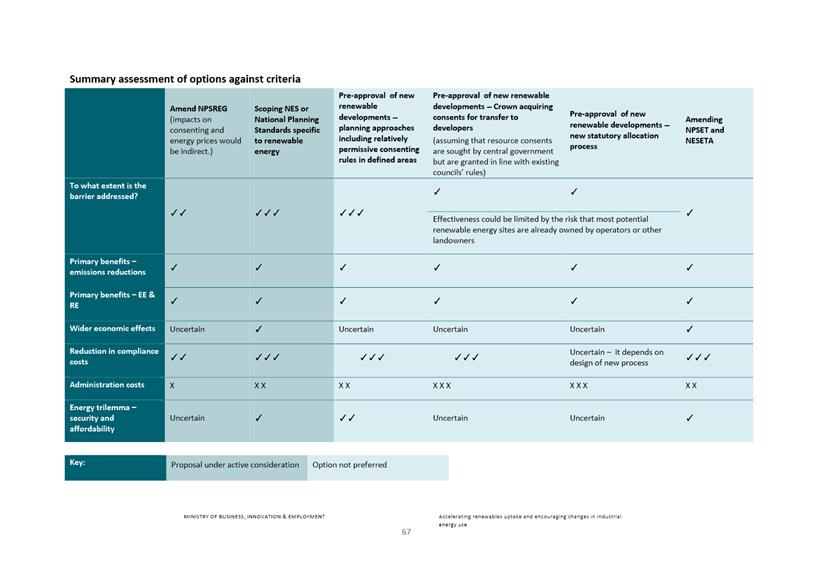
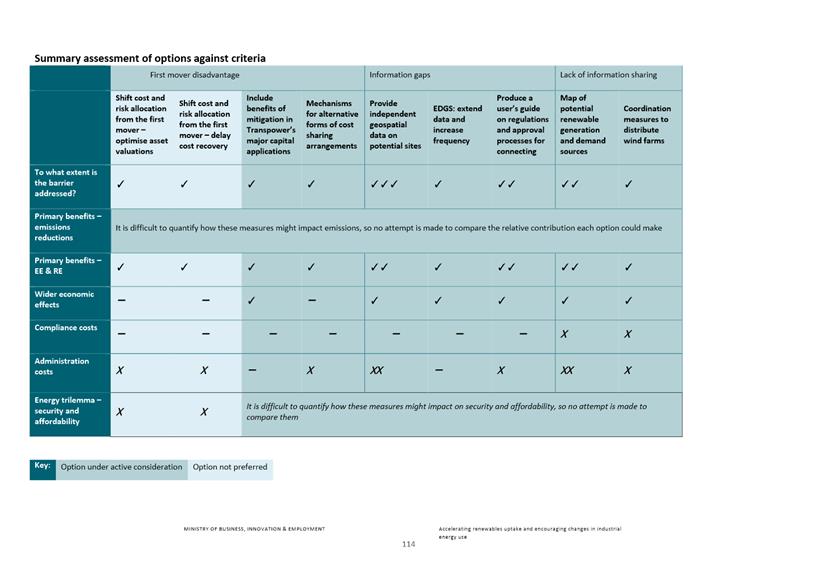
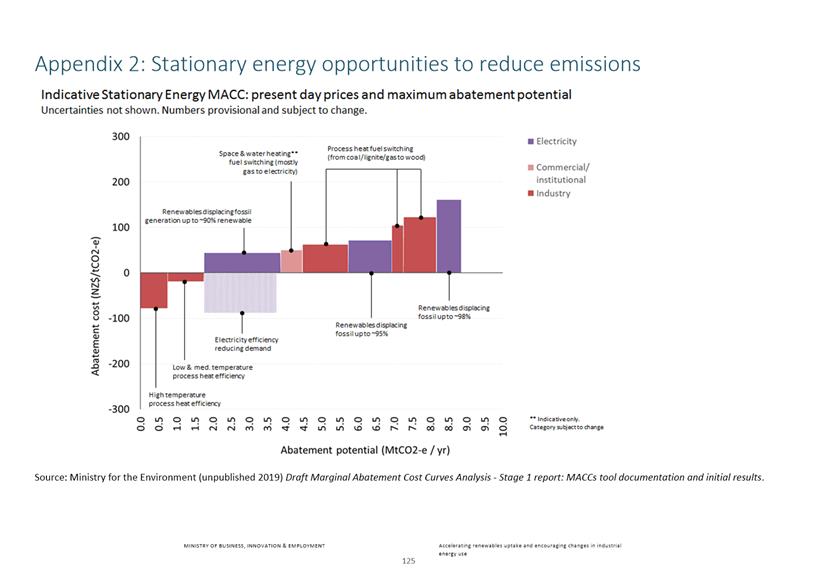
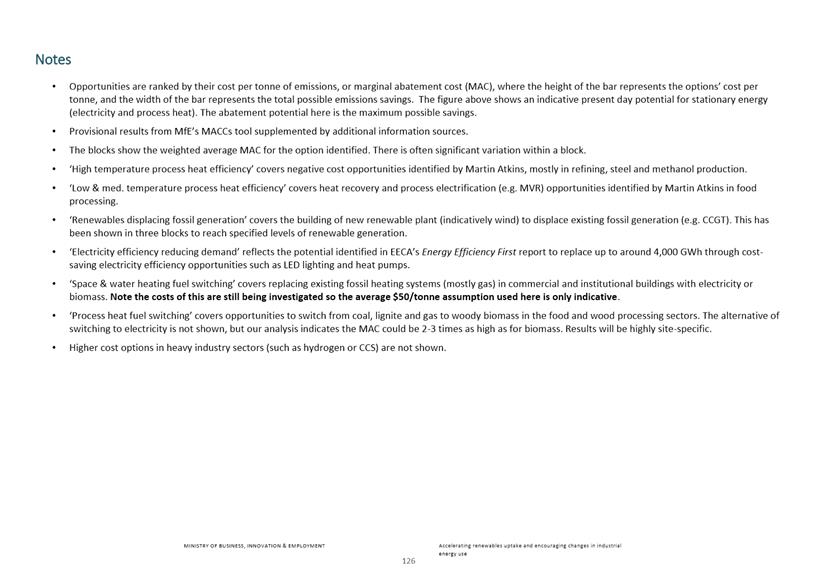
|

|
Council
24 February 2020
|
DCC submission on the Justice Committee
Inquiry into the 2019 Local Elections
Department: Civic and Corporate Policy
EXECUTIVE SUMMARY
1 This
report seeks consideration and approval of a draft submission (Attachment A) to
the Justice Committee on the
Inquiry into the 2019 Local Elections.
|
RECOMMENDATIONS
That the Council:
a) Approves the
draft Dunedin City Council submission, with or without amendments, to the
Justice Committee on its Inquiry into the 2019 Local Elections.
b) Authorises the
Mayor to finalise the submission.
|
BACKGROUND
2 Following
each local election, Government holds an inquiry into any matters arising from
that election to investigate whether there are changes that need to be made to
the law or administrative processes following the election. Any person or
agency can make a submission.
3 The
Justice Committee is now seeking feedback on its inquiry into the 2019 local
elections.
4 The
terms of reference for the inquiry include consulting stakeholders and the
wider public about the recommendations in the Justice Committee’s report
on the 2016 local elections, with particular reference to:
· The
recommendation that the Government consider giving responsibility for running
all aspects of local elections to the Electoral Commission;
· The
recommendation that the Government consider encouraging or requiring the same
voting system to be used in all local elections; and
· Feedback
on the committee’s recommendations on foreign interference.
5 For
information purposes, a copy of Chapter 2 of the Justice Committee’s
report on the inquiry into the 2016 local elections is at Attachment B.
Note is made that Chapter 1 discusses the 2017 General Election.
6 The
closing date for submissions is 29 February 2020.
DISCUSSION
7 The
DCC has an opportunity to input into the inquiry into the 2019 Local Elections
by making a submission to the Justice Committee.
8 The
DCC has also contributed to the development of the submission made by the
Society of Local Government Managers (SOLGM).
9 The
draft submission in Attachment A is focused primarily on the DCC’s
position on the recommendations given in the Justice Committee’s report
on the Inquiry into the 2017 General Election and 2016 Local Elections.
OPTIONS
Option
One (Recommended Option) – Submit to the Justice Committee on its Inquiry
into the 2019 Local Elections
10 Approve
the DCC submission to the Justice Committee on its Inquiry into the 2019
Local Elections.
Advantages
· Enables the DCC to contribute to the conversation with Government
about future responsibilities and roles in relation to running local elections.
· Represents an opportunity to engage with Government about the
process which enables democratic local decision making, in alignment with the
purpose of local government as outlined in the Local Government Act.
Disadvantages
· There are no identified disadvantages for this option.
Option
Two – Do not submit to the Justice Committee on its Inquiry into the 2019
Local Elections
11 Do
not approve the DCC submission to the Justice Committee on its Inquiry
into the 2019 Local Elections.
Advantages
· There are no identified advantages for this option.
Disadvantages
· The DCC misses an opportunity to bring local perspective to the conversation
with Government about future responsibilities and roles in relation to running
local elections.
NEXT STEPS
12 If
the Council approves the draft submission, with or without amendments, it will
be sent to the Justice Committee for consideration by 29
February 2020.
Signatories
|
Author:
|
Sharon Bodeker - Team Leader Civic
Sophie Lascarides - Policy Analyst
|
|
Authoriser:
|
Sandy Graham - General Manager City Services
|
Attachments
|
|
Title
|
Page
|
|
⇩a
|
Attachment A - Draft
DCC submission to 2019 local elections inquiry
|
559
|
|
⇩b
|
Attachment B - Chapter
2, Inquiry into 2016 elections
|
561
|
|
SUMMARY OF CONSIDERATIONS
|
|
Fit with purpose
of Local Government
This proposal directly relates to
democratic local decision making and action by, and on behalf of communities.
|
|
Fit with strategic
framework
|
|
Contributes
|
Detracts
|
Not applicable
|
|
Social Wellbeing Strategy
|
☐
|
☐
|
☒
|
|
Economic Development Strategy
|
☐
|
☐
|
☒
|
|
Environment Strategy
|
☐
|
☐
|
☒
|
|
Arts and Culture Strategy
|
☐
|
☐
|
☒
|
|
3 Waters Strategy
|
☐
|
☐
|
☒
|
|
Spatial Plan
|
☐
|
☐
|
☒
|
|
Integrated Transport Strategy
|
☐
|
☐
|
☒
|
|
Parks and Recreation Strategy
|
☐
|
☐
|
☒
|
|
Other strategic projects/policies/plans
|
☒
|
☐
|
☐
|
The submission has been developed in line
with the broader goals and objectives of the strategic framework.
|
|
Māori Impact Statement
The submission has no direct known
impacts for tangata whenua.
|
|
Sustainability
The submission has no direct known
impacts for sustainability
|
|
LTP/Annual Plan /
Financial Strategy /Infrastructure Strategy
There are no known impacts for current
levels of service and/or performance measures resulting from a decision to
approve the draft submission.
|
|
Financial
considerations
There are no financial impacts on the DCC
from a decision to approve the draft DCC submission.
|
|
Significance
This decision has been assessed under the
Council’s Significance and Engagement Policy as being of low
significance.
|
|
Engagement –
external
There was no external engagement.
|
|
Engagement -
internal
Staff from Civic and Corporate Policy have contributed to
the development of this submission.
|
|
Risks: Legal /
Health and Safety etc.
There are no known risks.
|
|
Conflict of
Interest
There are no known conflicts of interest.
|
|
Community Boards
The submission may be of interest to
Community Boards.
|
|

|
Council
24 February 2020
|
Triennial Agreement 2020-22
Department: Civic
EXECUTIVE SUMMARY
1 Under
Section 15 of the Local Government Act 2002, the six local authorities within
the Otago region must enter into an agreement containing protocols for
communication and coordination. Triennial Agreements enable local
authorities to give better effect to their core purposes under the Local
Government Act by adopting a regional approach where appropriate to deliver
seamless local government service.
2 The
new Triennial Agreement for the period 2020-2022 is required to be adopted by
all the local authorities within Otago, in identical format no later than 1
March 2020. The Otago Local Authorities’ Triennial Agreement
2020-22 (the Triennial Agreement) is being presented to all the other local
authorities in the region for their consideration and adoption.
3 This
purpose of this report is to present the Triennial Agreement, at Attachment A,
for adoption by Council, including terms of reference for the Otago Mayoral
Forum, which is included as an Appendix to the Triennial Agreement.
|
RECOMMENDATIONS
That the Council:
a) Approves the
Otago Local Authorities’ Triennial Agreement 2020-22.
b) Authorises the
Mayor to sign the Otago Local Authorities’ Triennial Agreement 2020-22
on behalf of the Dunedin City Council.
|
BACKGROUND
4 The
Local Government Act 2002 (section 15) requires all local authorities within a
region to enter into a triennial agreement not later than 1 March after each
triennial election.
5 The
purpose of a triennial agreement is to ensure that appropriate levels of
communication, co-ordination and collaboration are maintained between local
authorities within the region. Agreements must include:
· protocols
for communication and co-ordination between councils,
· the
process by which councils will comply with section 16 of the Act, which applies
to significant new activities proposed by regional councils, and
· processes
and protocols through which all councils can participate in identifying,
delivering and funding facilities and services of significance to more than one
district.
6 Triennial
agreements may also include commitments to establish joint governance
arrangements to give better effect to the matters set out in paragraph 5 above.
7 A
triennial agreement may be varied by agreement between all the local authorities
within a region and remains in force until local authorities ratify a new
agreement.
DISCUSSION
8 The
Triennial Agreement at Attachment A was adopted by the Otago Mayoral Forum on
Friday 29 November 2019.
9 The
Triennial Agreement includes terms of reference for the Otago Mayoral Forum and
mandates it as the primary mechanism for implementing the Triennial Agreement
in Otago (the Triennial Agreement, paragraph 9).
10 The
Triennial Agreement (paragraph 11) also mandates the Chief Executives Forum.
11 While
a non-statutory body, the Otago Mayoral Forum is the primary mechanism to give
effect to the Triennial Agreement. The Otago Mayoral Forum’s terms
of reference forms part of the Triennial Agreement and makes explicit that
decisions of the Otago Mayoral Forum are not binding on member councils.
12 The
Otago Mayoral Forum is supported by the Otago Chief Executives Forum, which is
also mandated by the Triennial Agreement.
OPTIONS
13 As
this report is for administrative purposes, no options are presented.
NEXT STEPS
14 The
Triennial Agreement for the local authorities of the Otago region is signed by
the Mayor on behalf of Council.
Signatories
|
Author:
|
Sharon Bodeker - Team Leader Civic
|
|
Authoriser:
|
Sandy Graham - General Manager City Services
|
Attachments
|
|
Title
|
Page
|
|
⇩a
|
Otago Triennial
Agreement 2020-22
|
579
|
|
SUMMARY OF CONSIDERATIONS
|
|
Fit with purpose
of Local Government
This decision enables democratic local
decision making and action by, and on behalf of communities.
|
|
Fit with strategic
framework
|
|
Contributes
|
Detracts
|
Not applicable
|
|
Social Wellbeing Strategy
|
☐
|
☐
|
☒
|
|
Economic Development Strategy
|
☐
|
☐
|
☒
|
|
Environment Strategy
|
☐
|
☐
|
☒
|
|
Arts and Culture Strategy
|
☐
|
☐
|
☒
|
|
3 Waters Strategy
|
☐
|
☐
|
☒
|
|
Spatial Plan
|
☐
|
☐
|
☒
|
|
Integrated Transport Strategy
|
☐
|
☐
|
☒
|
|
Parks and Recreation Strategy
|
☐
|
☐
|
☒
|
|
Other strategic projects/policies/plans
|
☐
|
☐
|
☒
|
|
|
Māori Impact
Statement
There are no known impacts for Tangata Whenua.
|
|
Sustainability
There are no known implications for sustainability.
|
|
LTP/Annual Plan /
Financial Strategy /Infrastructure Strategy
There are no implications identified.
|
|
Financial
considerations
There are no known financial implications.
|
|
Significance
This matter is considered of low significance in terms of
the Council’s Significance and Engagement Policy.
|
|
Engagement –
external
The Triennial Agreement has been discussed by the
Mayors/Chair and Chief Executives of the Otago region.
|
|
Engagement -
internal
There has been no internal engagement.
|
|
Risks: Legal /
Health and Safety etc.
There are no identified risks.
|
|
Conflict of
Interest
There are no known conflicts of interest.
|
|
Community Boards
There are no implications for Community Boards.
|
|

|
Council
24 February 2020
|
Resolution to Exclude the
Public
That the Council excludes
the public from the following part of the proceedings of this meeting (pursuant
to the provisions of the Local Government Official Information and Meetings Act
1987) namely:
|
General subject of the matter to be considered
|
Reasons
for passing this resolution in relation to each matter
|
Ground(s) under
section 48(1) for the passing of this resolution
|
Reason for
Confidentiality
|
|
C1
Confirmation of the Confidential Minutes of Ordinary Council meeting -
10 December 2019 - Public Excluded
|
S7(2)(h)
The
withholding of the information is necessary to enable the local authority to
carry out, without prejudice or disadvantage, commercial activities.
S7(2)(i)
The
withholding of the information is necessary to enable the local authority to
carry on, without prejudice or disadvantage, negotiations (including
commercial and industrial negotiations).
S7(2)(a)
The
withholding of the information is necessary to protect the privacy of natural
persons, including that of a deceased person.
|
.
|
|
This resolution is made in
reliance on Section 48(1)(a) of the Local Government Official Information and
Meetings Act 1987, and the particular interest or interests protected by
Section 6 or Section 7 of that Act, or Section 6 or Section 7 or Section 9 of
the Official Information Act 1982, as the case may require, which would be
prejudiced by the holding of the whole or the relevant part of the proceedings
of the meeting in public are as shown above after each item.
































































































































































































